

Undergraduate Prospectus 26/27





Undergraduate Prospectus 26/27


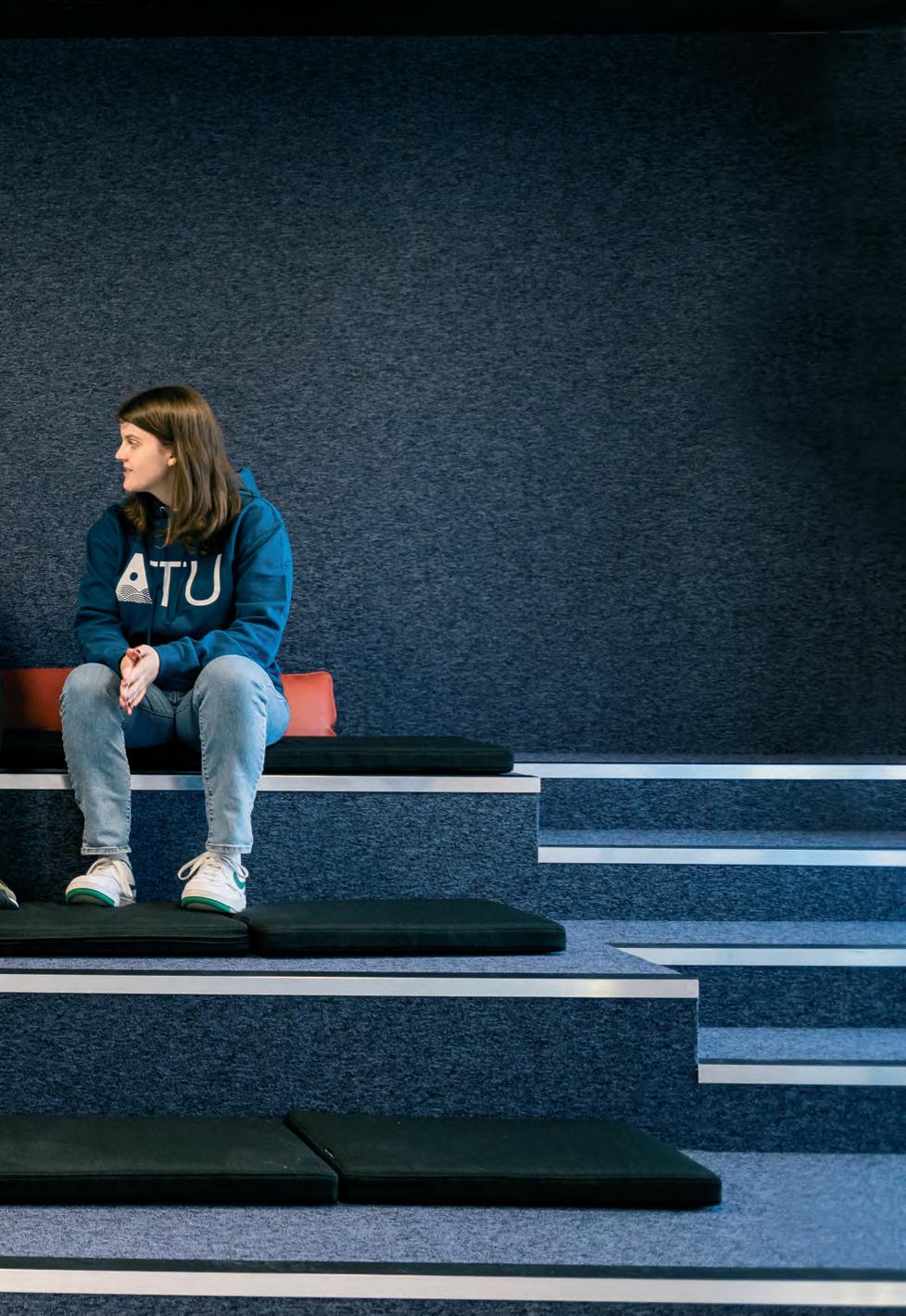
Business
AU601
AU501
AU401
AU600
AU607
AU602
AU502
AU605
AU604
AU603
AU503
AU631
AU531
AU429
AU628
AU630
AU629
CAO
Code
Design, Creative Arts and Teacher Education
AU618 Art 8 838 110
AU518 Art 7 513 110
AU615 Film and Documentary 8 321 111
AU616 Communications, Media 8 303 112 and Storytelling
AU620 Art and Design and 8 410 113 Communication Graphics
AU519 Design (Common Entry) 7 271 115
AU624 Product Design 8 310 116
AU622 Interior Design 8 319 117
AU623 Graphic Design and Illustration 8 339 118
AU621 Textile and Fashion Design 8 326 119
AU617 Animation and Game Design 8 401 120
Furniture Design, Technology and Teacher Education
AU680 Education (Design, Graphics 8 400 123 and Construction)
AU683 Furniture Design, Making and 8 409 125 Technology (Common Entry)
AU583 Furniture Design, Making and 7 320 125 Technology (Common Entry)
AU681 Furniture Design and Manufacture 8 400 126
AU682 Furniture Making and 8 403 127 Architectural Woodworking
Health Sciences, Wellbeing and Society
AU696 Applied Social Care 8 309 131
AU593 Applied Social Care 7 251 131
AU694 History and Geography 8 280 133
AU699 Outdoor and Environmental 8 330 134 Education (Common Entry)
AU590 Outdoor Education 7 183 135
AU693 Geography and Outdoor Education 8 352 136
AU690 General Nursing 8 341 138
AU691
AU698 Psychology
AU695
AU491
AU606
Business
AU300
Engineering and Technology (continued)
AU262 Computing with Cybersecurity
and Digital Forensics
AU261 Computing
AU354
AU351 Electronic Engineering
AU350
AU251
AU391
AU290
AU390
AU190
AU370
AU372
AU373 Pharmaceutical and
AU270 Science (Common Entry)
AU371 Agriculture (Common Entry)
AU272
AU271
AU172
AU171
AU170
AU374
AU173
AU174
AU380
AU381
AU382
AU375
AU220
AU904
AU804
AU956
Engineering and Design (continued)
AU848 Games Development 7 257 269
AU927 Creative Design 8 312 270
AU821 Creative Design 7 231 270
AU928 Fine Art 8 371 271
AU822 Fine Art 7 371 271
AU926 Interior Architecture and Design 8 401 273
AU820 Interior Architecture and Design 7 270 274
AU925 Architecture 8 440 275
AU931 Performing Arts 8 309 276
AU823 Performing Arts 7 229 276
AU929 Writing and Literature 8 306 278
AU930 Writing and Literature (Online) 8 305 278
AU965 Science (Common Entry) 8 402 279
AU730 Science (Common Entry) 6 168 279
AU967 Occupational Safety and Health 8 310 282
AU856 Occupational Safety and Health 7 246 282
AU966 Environmental Science with Ecology 8 339 284
AU855 Environmental Science with Ecology 7 280 284
AU969 Biomedical Science 8 351 285
AU858 Biomedical Science 7 262 285
AU970 Forensic Investigation and Analysis 8 317 287
AU859 Forensic Investigation and Analysis 7 260 287
AU973 Clinical Measurement Physiology 8 465 288
AU971 Health Science and Physical Activity 8 321 289
AU861 Health Science and Physiology 7 273 291
AU972 Human Nutrition 8 341 292
AU862 Human Nutrition 7 281 292
AU976 Pharmaceutical Science with 8 300 293 Drug Development
AU857 Pharmaceutical Science with 7 241 293 Drug Development
AU975 Pharmacy 9 NEW 294
Education, Home Economics, Food Business and Nursing
AU985 Home Economics and Biology 8 510 297
AU986 Home Economics and 8 424 298 Religious Education
AU987 Home Economics and Irish 8 429 299
AU987 Eacnamaíocht Bhaile agus Gaeilge 8 429 300
AU988 Home Economics 8 475 301
AU989 Nutrition, Food and
304 Business Management
AU990 Home Economics
AU991 General Nursing 8 346 306
AU992 Intellectual Disability Nursing 8 282 308
Access Programme
DIRECT Access for Higher Education 6 DIRECT 310 (Access Programme) ENTRY
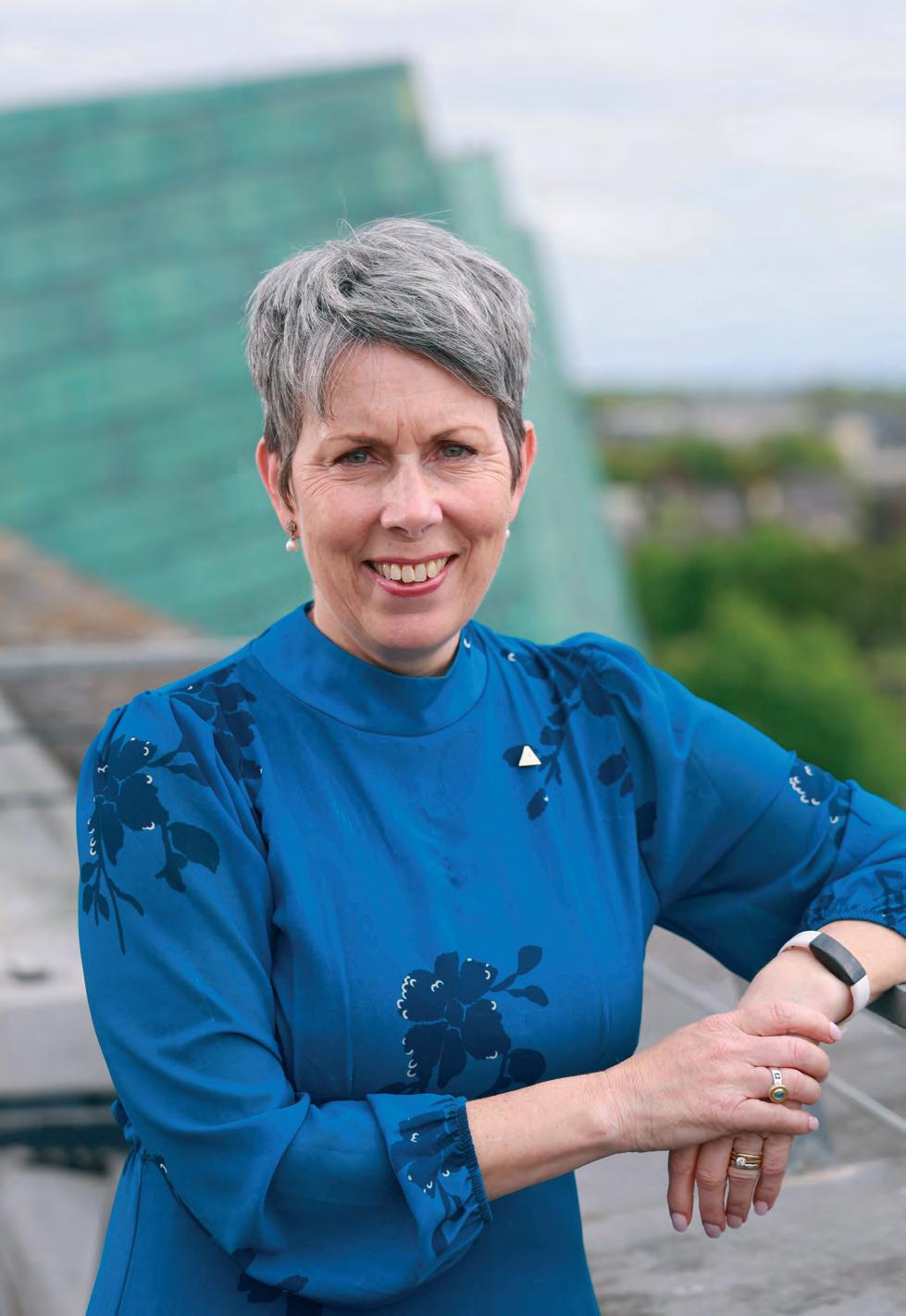
As one university serving this vibrant and diverse region, Atlantic Technological University (ATU) offers an outstanding higher education experience enriched by strong community connections, dynamic learning environments and a focus on real-world impact.
With 30,400 students and over 8,500 graduates each year, ATU provides exceptional opportunities for study, research and personal growth. Our programmes span a wide range of disciplines — from pre-degree to doctoral level — ensuring there’s a path for every learner, whatever their goals.
We are also proud to support a growing international student community, now almost 3,000 strong, as part of our globally connected and inclusive campus culture.
ATU’s strength lies in collaboration — with research partners, with regional and national employers, and with our local communities. Our emphasis on applied learning and research-informed teaching empowers students to become critical thinkers, creative problemsolvers and lifelong learners.
From Donegal to Galway, from Mayo to Sligo, our campuses offer not only academic excellence but also stunning landscapes and welcoming towns and cities.
Whether you’re stepping into higher education for the first time or returning to advance your career, you’ll find the support, expertise and opportunities you need at ATU.
Your future is here.
Dr Orla Flynn Uachtarán/President Ollscoil Teicneolaíochta an Atlantaigh Atlantic Technological University
Maidir le hOllscoil



Atlantic TU has a student population of over 30,400 learners, spanning more than 840 academic programmes from pre-degree to doctoral level. ATU’s strength lies in our collaborative ethos, realising our shared goals by elevating and championing success.
ATU offers an exceptional higher educational experience. Building on the foundations of applied learning, our university focuses on research-informed teaching. We empower learners to realise their full potential, developing responsible citizens, critical thinkers, innovators and problem solvers equipped for life-long learning.
At Atlantic TU we have a proud tradition of industry engagement, through collaborative research and providing programmes at undergraduate and postgraduate levels that meet employers’ skills requirements.
Our students develop as global citizens, recognising and building awareness of the opportunities and roles we play in developing sustainable global economies. From collaborative international research to overseas study and work placement opportunities, ATU students are part of a global community with a mindset that reaches far beyond our shores.

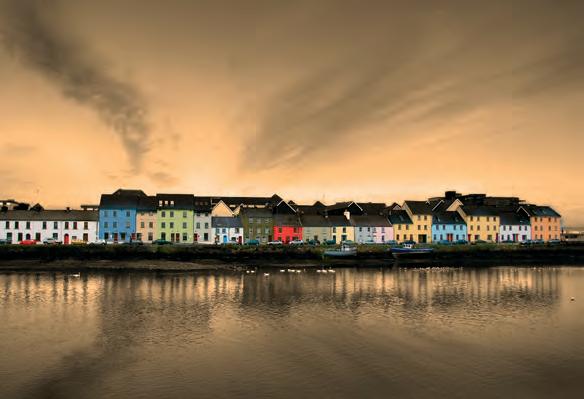
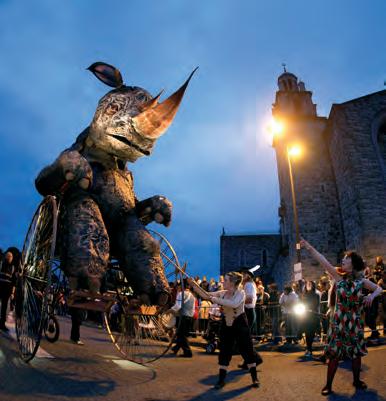

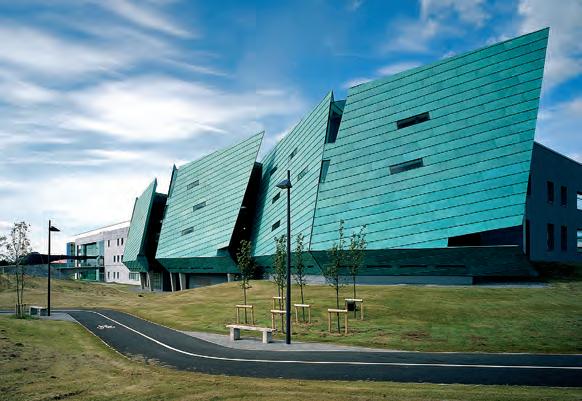
Galway is a cosmopolitan city that is world-renowned for its friendliness and community vibrancy. It is enriched with energy, amazing nightlife, a booming music scene and a fantastic schedule of annual festivals.
A prominent gourmet destination, Galway offers everything from Michelin-star dining and contemporary restaurants to quirky cafés and street food. Trendy cocktail bars, traditional Irish bars and latenight venues with international artists, ensure you will always find a lively night out. With several cinemas to choose from alongside weekly arts and cultural events, quiet night options are plentiful too. Shopping lovers can find the perfect look at high street retailers or independent boutiques. Finally, with events including the Galway Races, Galway International Arts Festival and the Galway Christmas Markets, there is always an opportunity for some fun and festivals.
Galway captivates with its enchanting beauty nestled along the west coast of Ireland. Its breath-taking views of the Atlantic Ocean and Galway Bay offers opportunities for beach excursions, sea swimming, or leisurely strolls along the famous Salthill promenade.
Merlin and Barna Woods along with the city Riverside Walk provide idyllic surroundings for land-based adventures.
A modern on-campus sports hall offers a wide variety of sports ranging from basketball to badminton and cricket to cheerleading. Our state-of-the-art High-Performance Unit (HPU) facilitates programmes for elite level athletes, whilst a fitness studio offers daily exercise classes. Outdoors, we have a GAA pitch with access to additional pitches locally. We also have arrangements made with several sports clubs. This means our students have access to facilities including FAI approved 3G Astroturf and grass pitches at Mervue United AFC, a fully floodlit GAA facility at Liam Mellows GAA Club and a 200m five lane synthetic running track at O’Sullivan Park.
There are several purpose-built student villages located close to ATU’s Galway City campus.
Glasán glasan.com
Ceann Bóirne ceannboirne.com
Cúirt Na Rásaí cuirtnarasai.com
Students may also choose from numerous digs and private rental options.
For information on all the accommodation options, please contact the Students’ Union at atustudentpad.ie
Please note student villages are owned and run by private operators and not by ATU.

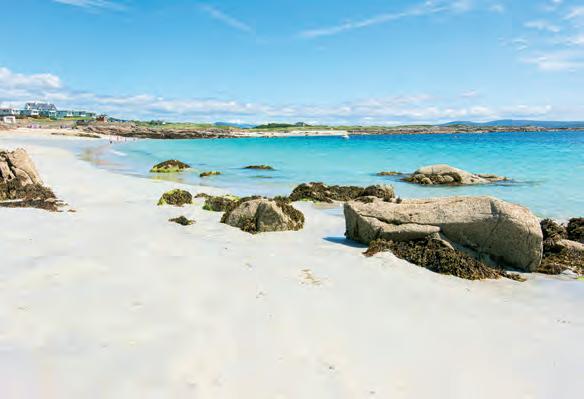


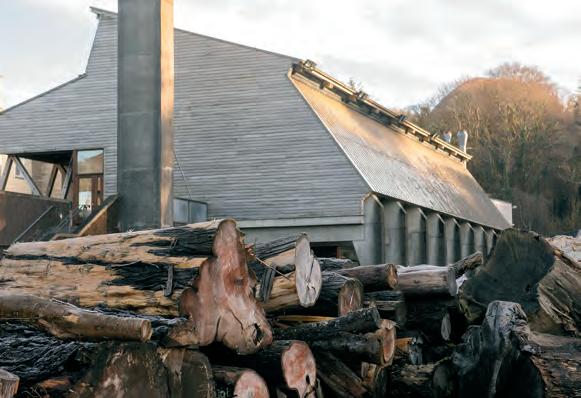
Located in the beautiful village of Letterfrack, ATU’s Connemara campus is the National Centre for Excellence in Furniture Design and Technology. Renowned for its live traditional Irish music, Letterfrack is also surrounded by beautiful coastal destinations.
There is an excellent choice of places to eat and drink in Letterfrack including cosy pubs, restaurants, coffee shops and a hotel. Clifden, which is often referred to as the capital of Connemara, is only 15 minutes away and is the largest town west of Galway City. This thriving town is home to shops, cafes, fine dining restaurants and lots of quaint Irish pubs. There are regular bus services to Letterfrack, with daily connections to Clifden and Galway City available.
Letterfrack is overlooked by the majestic Diamond Hill and Connemara National Park. This park covers almost 3,000 hectares of scenic mountains which are part of the famous Twelve Bens range. The main entrance to Connemara National Park is in the village and is the starting point for an array of stunning walks. Beautiful coastal destinations such as Inishbofin and Cleggan are also within easy access of Letterfrack.
Purpose-built student accommodation, Áras Ghuaire, is located within one-minute walking distance of ATU’s Connemara campus. To contact Áras Ghuaire please go to letterfrackaccommodation.com
To find out about private rental and digs options, please contact the Students’ Union at atustudentpad.ie
Please note student accommodation are owned and run by private operators and not by ATU.
Students have access to local sports facilities including a grass football pitch, floodlit astroturf pitch, fully equipped gym and a tennis court. Those looking to explore the great outdoors have a huge range of options to choose from, with pursuits available on land and sea. Scenic walks and cycles, horse riding, angling and sea swimming offer ideal opportunities for relaxation. The more adventure orientated individual may find the perfect option in mountain climbing, abseiling, surfing, windsurfing or scuba diving.

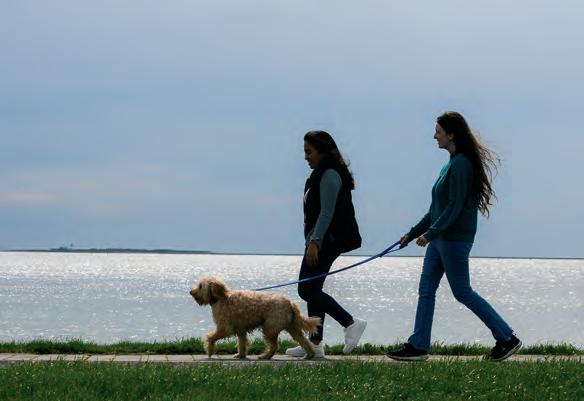
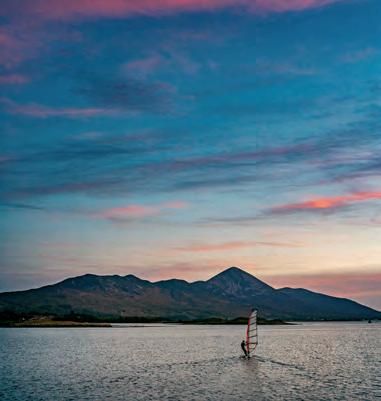
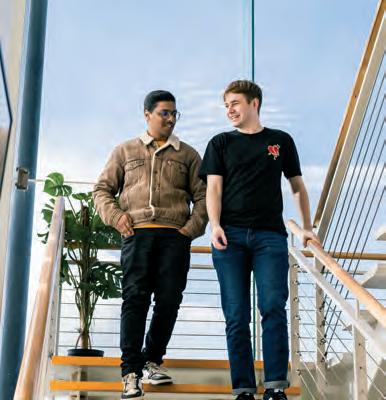
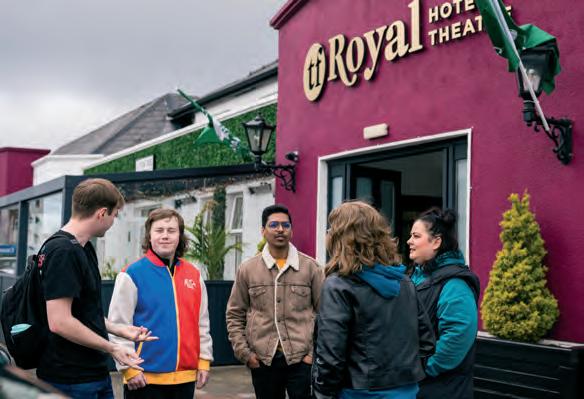
With a population of over 13,000, Castlebar is one of Ireland’s fastest growing towns and home to ATU’s Mayo campus. Whether you want to immerse yourself in an energetic town or explore beautiful countryside, Castlebar offers an unforgettable student experience.
Castlebar is a shopper’s heaven, with unique boutiques, high-street brands and everything in between. Food options range from quirky cafés to award winning restaurants, so there is something to suit every taste. Also, be sure to check out one of the weekly farmers markets. Established musicians frequent pubs, late bars and cocktail bars for those looking to dance the night away. For a quieter night out, a luxury seven screen cinema has all the latest blockbusters. The Royal Theatre and Event Centre, a leading entertainment venue in the west of Ireland, regularly plays host to top music artists, comedians, plays and major events. Castlebar is very accessible with a comprehensive daily bus and train service.
The stunning grounds of Turlough Park and the nature trail at Raheens Wood are the perfect settings to get away from it all, whilst a range of water sports on Lough Lannagh offer a chance to try something new. Croaghmoyle and Nephin mountain ranges provide fantastic opportunities for hillwalking, mountain hiking and exploration. Regular bus services mean the award-winning seaside town of Westport is within easy reach. Alternatively, hop on a bike and explore The Great Western Greenway which extends from Castlebar onwards to Westport.
There are numerous accommodation options within easy access of ATU’s Mayo campus. These include private rentals, digs and purpose-built student accommodation. For more information on accommodation please contact the Students’ Union at atustudentpad.ie Contact details for Hawthorn Village, the purposebuilt student accommodation, can be found at hawthornvillage.ie Please note student villages are owned and run by private operators and not by ATU.
On-campus sports facilities include an indoor climbing wall, soccer pitch and running track. Students also have access to a range of local facilities. These include an eight-lane pool at Lough Lannagh leisure complex, indoor courts at Castlebar Tennis Club and boxing facilities at Castlebar Boxing Club. ATU’s Mayo campus is recognised as one of the leading institutes in the country for outdoor adventure activities. Beaches, rivers and mountains provide the perfect environment for a range of outdoor activities.
An Creagán
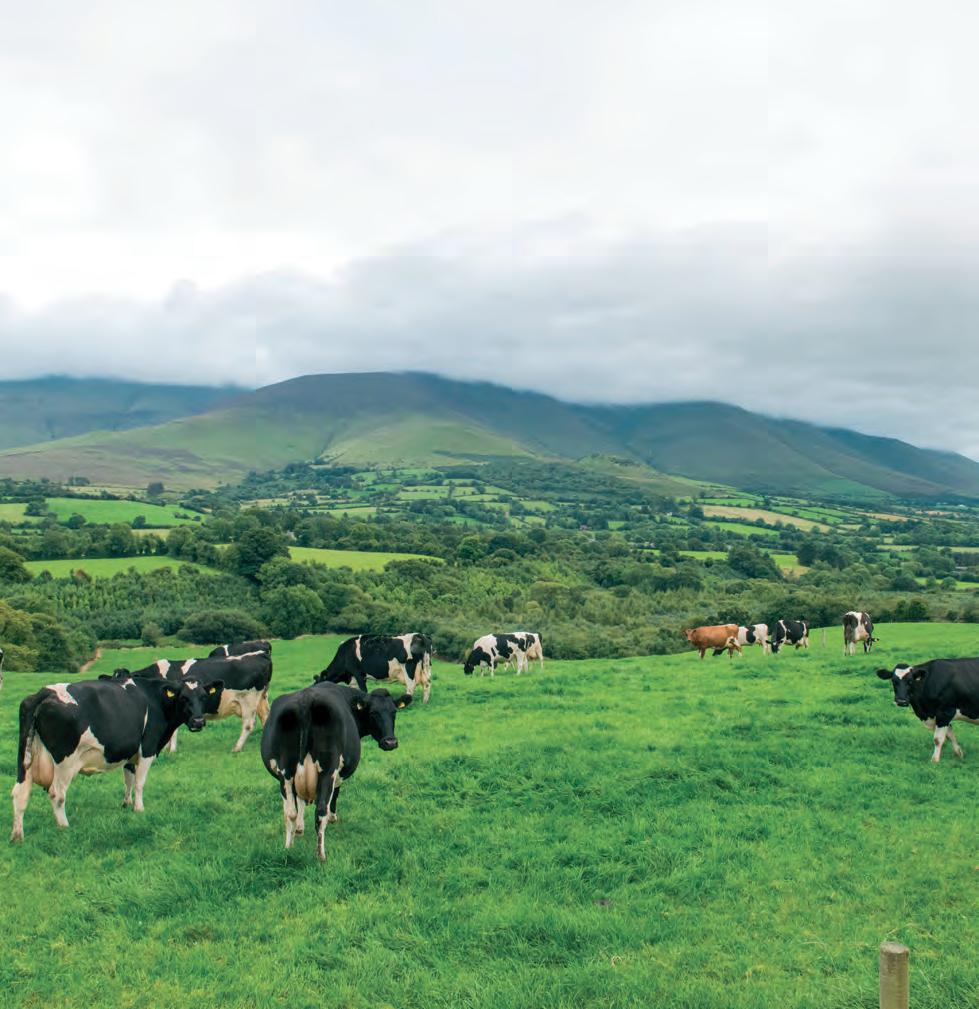


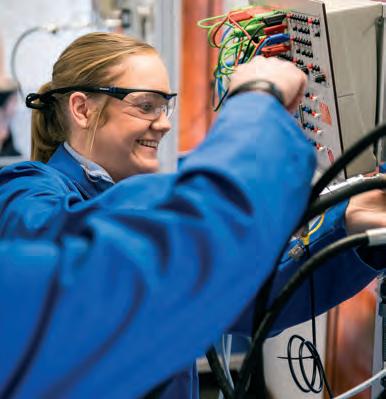
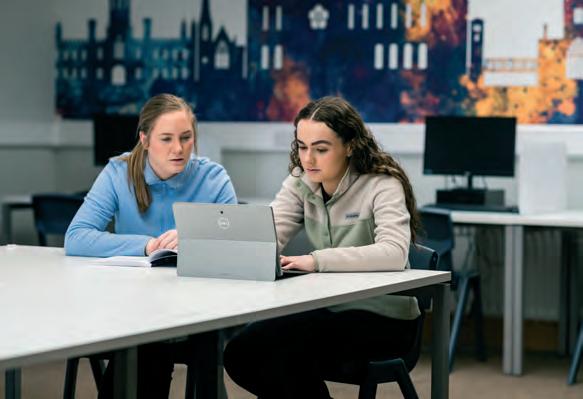
Home to the first agricultural college in Ireland, Mountbellew is a growing market town located 45 kilometres from Galway City. This busy town is where students spend their first two years of study before attending ATU’s Galway City campus in Year 3 and Year 4.
With a population of almost 1,000, Mountbellew has several shops, small businesses, restaurants and coffee shops. Local pubs regularly host live music and entertainment, with a warm welcome everpresent. Daily bus services to Galway ensure the energetic city is never too far away.
Mountbellew Demesne includes a wooded area with forest walks and picnic areas. The Demense loop trail is a 2.2km walk or cycle trail which navigates through trees and flora. The area is also home to a wide diversity of wildlife species, whilst Mountbellew Lake is a sanctuary for waterfowl including ducks, pheasants and swans. The area is also filled with interesting historical buildings such as old walled gardens, a flour mill, a boat house and a forge.
There is a range of private rental and digs accommodation available to students. For more information on Mountbellew accommodation options please email mac@atu.ie for available local listings or contact the Students’ Union at atustudentpad.ie
Please note student accommodation are owned and run by private operators and not by ATU.
Students have access to a variety of local sports facilities at Moylough Sports Ground. These include a GAA pitch, soccer pitch, handball alley and a tennis court, whilst Mountbellew Golf Club is home to an 18-hole golf course. Natural facilities allow for several outdoor options, ranging from fishing on the River Shiven to cycling the Demesne loop trail.
Dún na nGall
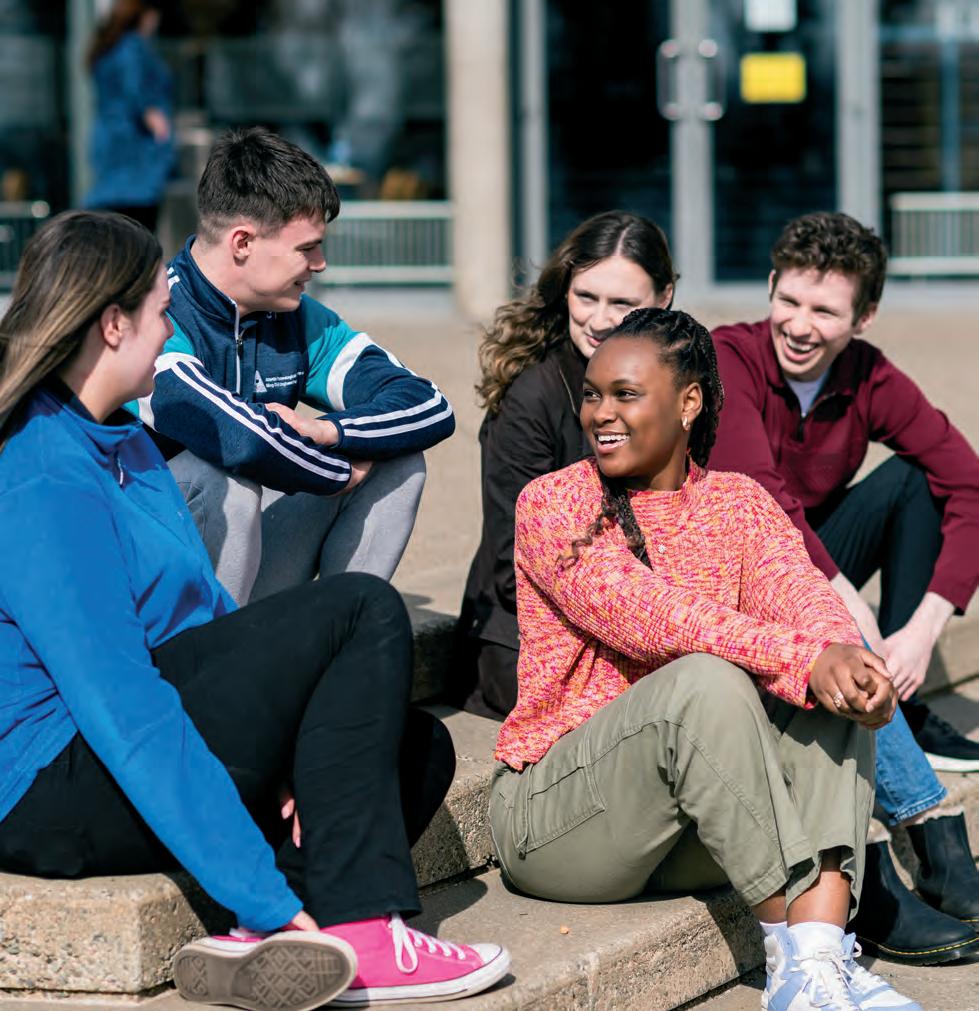

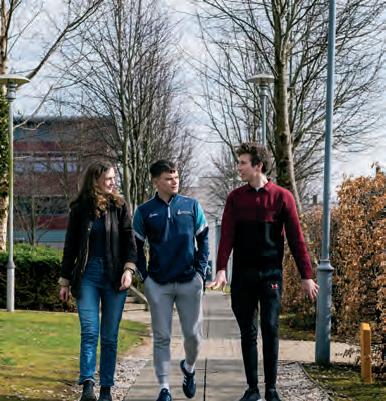


Donegal has two campuses, one based in Letterkenny and another based in Killybegs. Donegal is renowned for its stunning beaches, welcoming and relaxed atmosphere, and not forgetting the most beautiful accent in Ireland. It’s easy to see why the Donegal campuses are attracting more students than ever before.
The Letterkenny campus is in the heart of Letterkenny town centre. Letterkenny is a lively town, offering excellent shopping, a vibrant nightlife and great opportunities for part-time work, sport, culture and fun. There are plenty of much-loved student haunts such as pubs, music venues, nightclubs and restaurants. In addition, you’ll find an 8-screen cinema and the Aura Leisure Complex, which houses a 25m pool, tartan track and gym. For arts and cultural enthusiasts there is the Arena 7 Entertainment Complex, An Grianán and a Regional Cultural Centre which incorporates an art gallery, an auditorium and full cinema facilities. The Letterkenny campus includes the following facilities:
• Educational and support facilities, including general purpose and specialised teaching facilities, research facility, administrative, technical and academic staff accommodation, library, 4 dining areas/restaurants, meeting rooms and lecture theatres
• An Dánlann: sports/student services building comprising large sports/assembly hall, fitness suite, changing facilities, students’ union and student services centre, dining facilities and storage space
• External Sports Facility: floodlit sand-based natural grass playing pitch
The Killybegs campus is located in Ireland’s premier fishing port which is rich in tradition and heritage. Its picturesque location boasts spectacular scenery and harbour views, surrounded by breathtaking beaches and close to Europe’s highest accessible sea cliffs – Sliabh Liag. Students experience small class sizes and a personal approach to learning in a comfortable and welcoming setting. The campus has an impressive reputation for delivering exceptional academic programmes in culinary arts, hospitality and tourism.
Dún na nGall



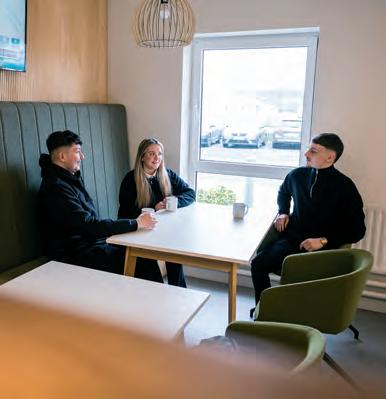

Donegal is one of the most affordable counties to live, work and travel around. The cost of living is considerably lower than the national average and the region offers a variety of affordable student accommodation. There is no on-campus accommodation, however, there are options for digs, houses to rent on a shared basis, and in Letterkenny there are also a number of apartment complexes built specifically for the student market. Both campuses are quite central and most accommodation is within a ten-minute walk of each of the campuses. Each year, the Students’ Union (SU) compiles and updates a list of student accommodation. The list is sent out automatically to students who receive an offer from Donegal and is also available online from early August of each year. Students are advised to begin the accommodation search early as demand can be high, visit atusudonegal.ie to find out more.
ATU Donegal’s sporting teams compete in the higher education and university competitions throughout the sporting calendar. Sport in the Donegal campuses has gone from strength to strength in recent years under the leadership of Michael Murphy, Head of Sport.
In addition to competitive sports the campus offers health and fitness advice, recreation courses, wheelchair sports and community activities. Both our Letterkenny and Killybegs campuses offer gym facilities which are free to use for all students. They offer daily exercise classes to students who like to work within a small group setting. Current facilities include an on-campus floodlit pitch and indoor training facility, multi-purpose sports centre and a modern fitness suite.
Funding has been secured for the design of a sports and activity campus, the Letterkenny Regional Sports-Activity Hub. The project will see the creation of a high-quality, multi-pitch sports facility and community hub suitable for university students as well as local and regional sports teams and the wider community.



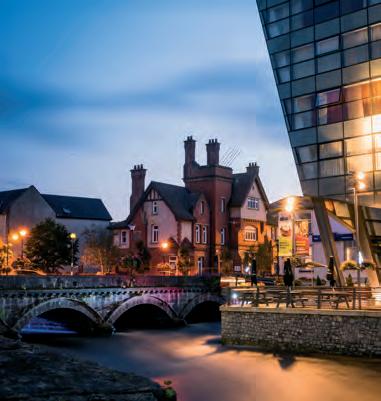

Sligo combines a vibrant urban centre with stunning natural beauty. The perfect setting for an unforgettable student experience. With an added community feel throughout, it’s easy to see why Sligo is such a popular university destination.
This 72-acre campus combines modern buildings, state-of-the-art facilities and landscaped grounds. A bright, contemporary feel runs through everything from the lecture halls to the library and cafés to chill-out zones. The campus is just a ten-minute walk from Sligo town centre, whilst beaches, mountains and countryside are all a short trip away. Sligo is easily accessible by road, rail and air, with numerous return bus services stopping on campus daily throughout the year. This Green Flag campus is also home to Sligo’s only Starbucks.
ATU’s St Angela’s campus is just a short drive from Sligo town centre, served by many bus links and has ample parking. Students benefit from small class sizes and a personal approach to learning in a comfortable and welcoming setting. All programmes offer practical learning, and placements are integrated into each of the degrees, allowing great insight into future sectors and industries. Students enjoy a learning experience that will empower them on both a personal and professional level which secures their employability on graduation.
From sushi, vegan and tapas to Mexican, Italian and Thai, Sligo’s thriving culinary scene ensures there is something to suit every taste and budget. There are nightlife options for every mood, so whether you are looking for a traditional Irish pub or a trendy cocktail bar, a live music venue or an energetic nightclub, you will find it here. A ten-screen cinema has all the latest blockbusters whilst The Hawk’s Well Theatre, The Model and The Factory host a diverse range of arts and entertainment weekly. For the shopping enthusiast, independent shops are nestled in between popular high street brands, catering for everything from clothes to computers and vintage to vinyl.
Famous for its connection to W.B. Yeats, Sligo is also home to a range of literary and cultural options. Music festivals take place in Sligo throughout the year, with some of the world’s biggest acts performing.
World class beaches at Strandhill and Rosses Point or the tranquil beauty of Lough Gill, provide the perfect place to get away from it all. Sligo’s rural landscape includes the world-famous Benbulben Mountain, the Queen Maeve trail on Knocknarea, woodland walks such as Hazelwood and Slish Wood, megalithic sites in Carrowkeel, the beautiful wilderness of the Ox Mountains and so much more.

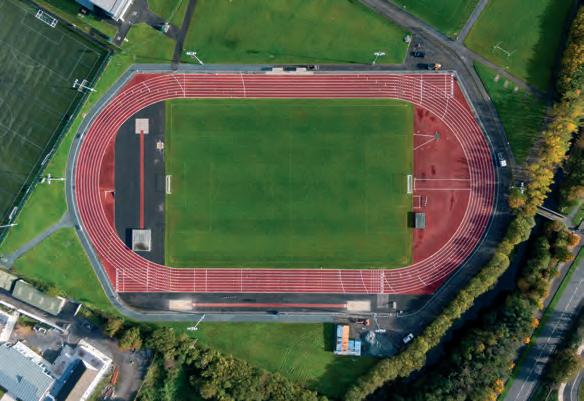
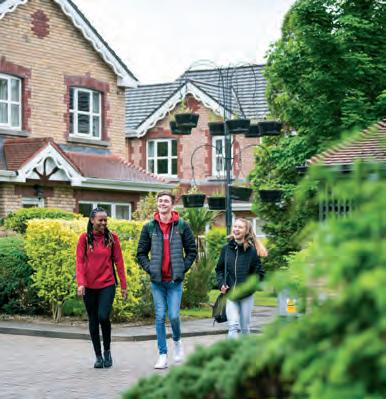

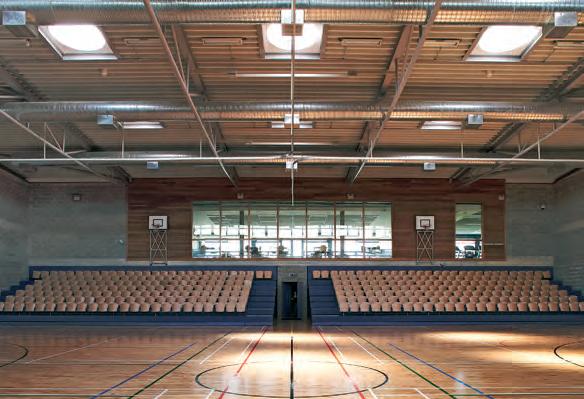
With a diverse range of options available, Sligo has the perfect accommodation to suit every individual. The cost of student accommodation is also much more affordable than many of Ireland’s other university towns and cities, with this also reflected in the cost of living. There are several purpose-built student villages in Sligo, all within easy access of both campuses. Some student villages offer a laundry service, whilst others have smart TV’s and free Netflix. Digs accommodation is popular with students moving away from home for the first time, as they live with a local family and meals may be provided. With an excellent selection of private apartments and houses, private rental is popular with students wishing to live with friends. Whilst most students live close to campus, some choose the hustle and bustle of Sligo town centre or the stunning natural beauty of Strandhill or Rosses Point.
At the centre of our campus sports facilities is the Knocknarea Arena. This sporting hub is home to a multi-purpose sports hall, state-of-theart fitness suite and specialised exercise studios. Outdoors, students have access to an international standard eight-lane tartan-surface running track with throwing and jumping facilities. Our 3G astroturf pitch is fully floodlit, whilst our fully floodlit grass pitches include a championship standard GAA pitch and FAI certified soccer pitch. Off-campus, students can avail of various sporting facilities at heavily discounted rates. These include a 25m indoor heated swimming pool at Sligo Regional Sports Centre plus a variety of indoor and outdoor courts at Sligo Tennis Club. Sligo’s stunning location also lends itself to outdoor options ranging from golf, water sports and horse riding to hill walking, mountain biking and cycling.
Gateway ApartmentsLakewood Letting gatewayapartments.ie
Gateway ApartmentsM&C Property mcp.ie/gateway-apartments
Ard Nua ardnua.com
Uni Rooms @ Ard Nua unirooms.ie
Yeats Village yeatsvillage.net
Clarion Village clarionvillagesligo.com
The Grove Student Complex thegrovesligo.ie
Lake Isle Luxury Apartments lila.ie
St. Angela’s Lakeside Aparthotel sala.ie
Visit atussu.ie for the full list of accommodation options available.
Please note student villages are owned and run by private operators and not by ATU.

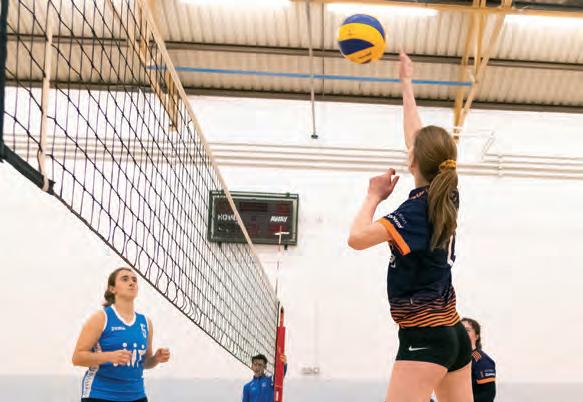
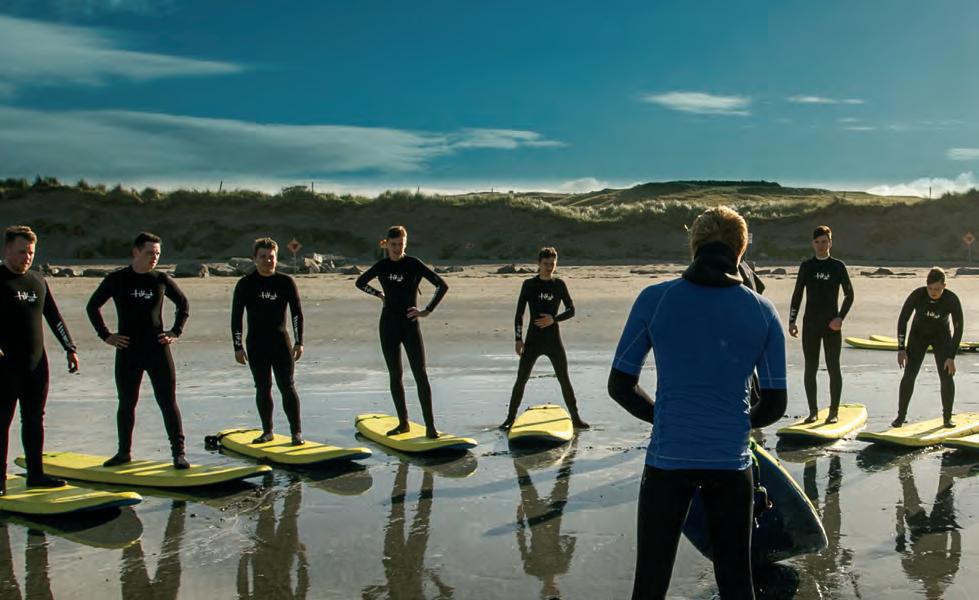
Clubanna agus Cumainn
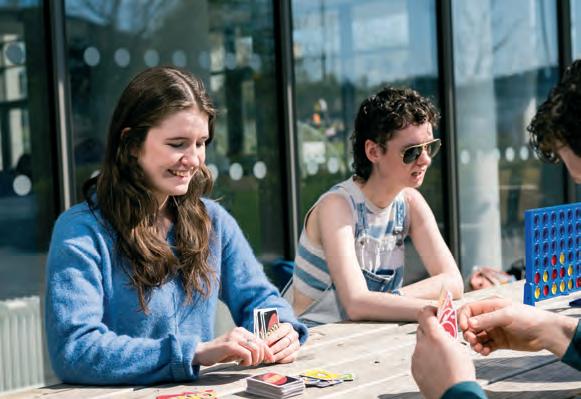
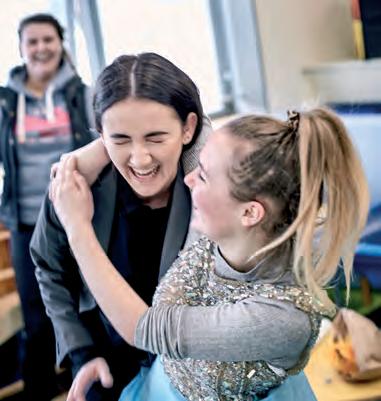
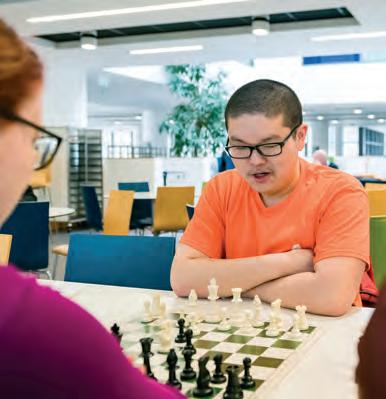

Joining a club or society is a great way to meet people with similar interests, try out something new or pursue your passion. We encourage students to join at least one club or society, and with a huge variety to choose from, ATU has something for everyone.
University life is more than just study. It is also about having fun and making friends. Clubs and societies play a big role in this. Joining one can often be the start of a new passion or a lifelong friendship.
We have a huge selection of clubs and societies to choose from. These cover everything from frisbee to fine art and music to motorsport. Also, new clubs and societies are formed every year which means you can even start your own.
Clubs and societies days are held across our campuses early in the university year. This is an opportunity to sign up to as many of them as you like. ATU subsidise clubs and societies so that they are free, as are most of the activities they offer.
Clubs and societies are great fun, but did you know they offer more than that? Teamwork, participation and personal development are qualities that will impress employers. You may even discover a talent you never knew you had.
Clubs*
American Football
Athletics
Badminton
Basketball
Boxing
Chess
Cricket
Equestrian
GAA
Golf
Karate
Rowing
Rugby Soccer
Surf
Swimming
Table Tennis
Volleyball
Societies*
Ag Science
Animation
Astronomy
Bushcraft
Cheerleading
Dance
Debate
DJ
Drama
Environmental
Eurovision
Fashion
Games
Harry Potter
International
Law
LGBTQ+
Literature
Mature
Neurodiversity
Politics
Robotics
Rock Climbing
Skate
Tea
Vegan
*Clubs and societies available will vary across individual campuses.
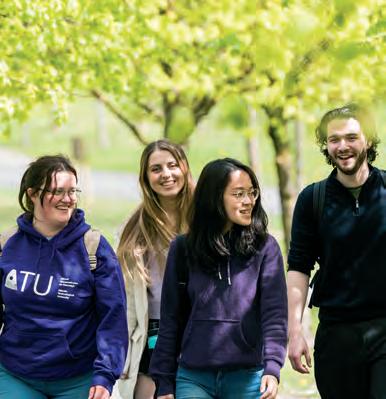


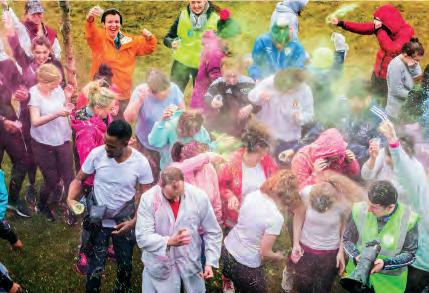
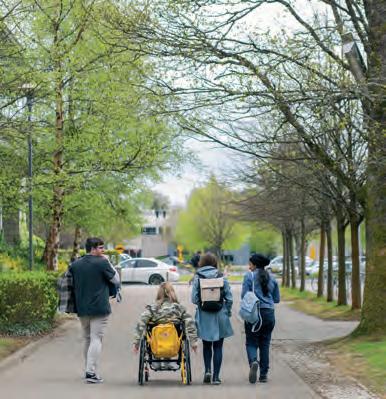


ATU Students’ Union (ATUSU) is a democratic organisation run by students, for students. As soon as you become an ATU student, you automatically become a member of a Students’ Union (SU).
ATUSU attend important university meetings to ensure that students are the focus of every decision made.
Whilst they organise lots of fun events throughout the year, the Students’ Union are also a valuable source of support. The supports they offer range from helping with any academic concerns you might have, to assisting in your search for the perfect accommodation. If you need to talk, their door is always open.
The Students’ Union organise campaigns on important issues such as mental health, sexual health and exam stress. They also organise events to help you settle into university life and make sure you have an unforgettable experience. Check out the campaigns and events calendar on this page for an idea of what to expect.
You could become your class representative. Class reps are the spokesperson for each individual class and are elected by their fellow classmates. They are the first point of contact for the Students’ Union. Class reps acquire lots of new skills such as negotiation, organisation, leadership and advocacy.
Below is an example of the types of campaigns and events the Students’ Union organise.
Freshers’ Week
Rainbow Week
Silent Disco
Mental Health Weeks
Sexual Health Weeks
Sports and Awards Ball
Road Safety and Travel Week
Healthy Living Week
Day at the Races
Diversity Week
Exam De-stress Weeks
*Campaigns and events will vary across individual campuses.
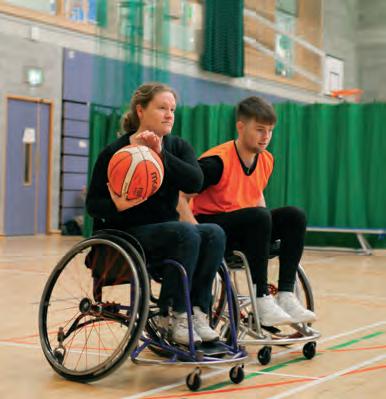
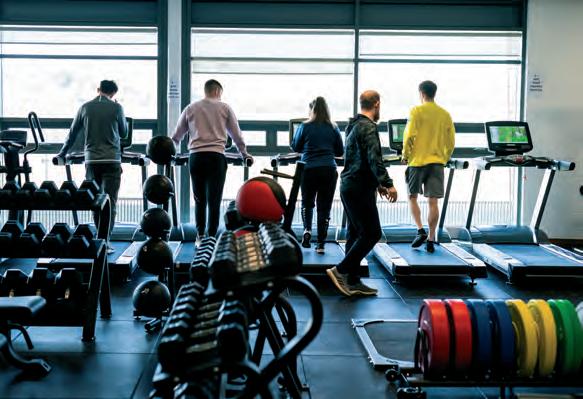

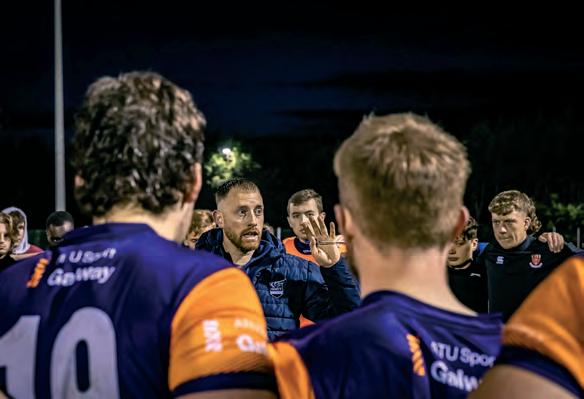

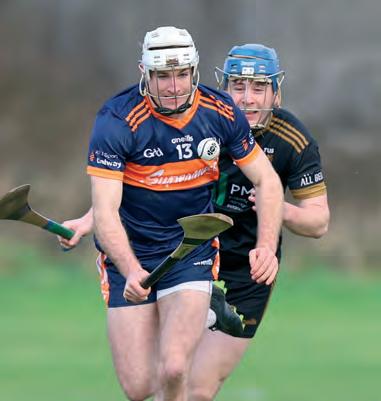
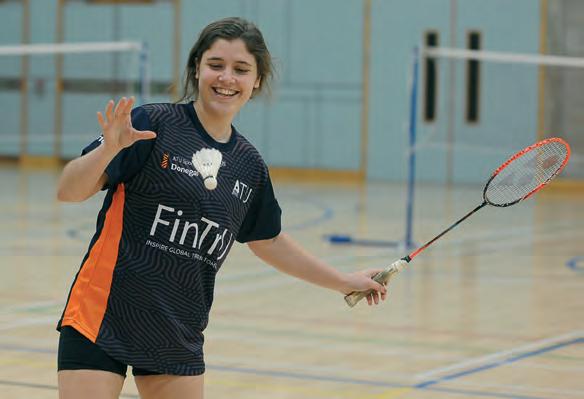
Sport and physical activity play an important role in campus life at ATU. Our belief is that sport is for everyone. We understand the positive impact it can have on an individual’s physical and mental health. That is why we have a wide range of activities to suit everyone. Whether you are an elite level athlete, a talented amateur or someone who is looking to keep fit and healthy, we have something to suit all abilities and interests.
Develop your talent with the help of our top-class coaches and get the supports needed to excel in your chosen sport. Students may represent ATU at a national or international level, whether that is individually or as part of a team. Elite level athletes are encouraged to apply for an ATU Sports Scholarship. For more information or to apply for an ATU Sports Scholarship, please visit atu.ie/sports-scholarships
No matter what your sport is or what level you compete at, you can continue to do so at ATU. Our sports clubs range from basketball to badminton, karate to kayaking and everything in between. This is a great way to try out something new, meet new people or participate in a sociable environment with a competitive edge.
If you just want to have some fun and keep active, we have something for you. Exercise classes such as spinning and yoga, fully equipped fitness suites and stunning local walks are just some of the ways ATU will help you stay fit and healthy.
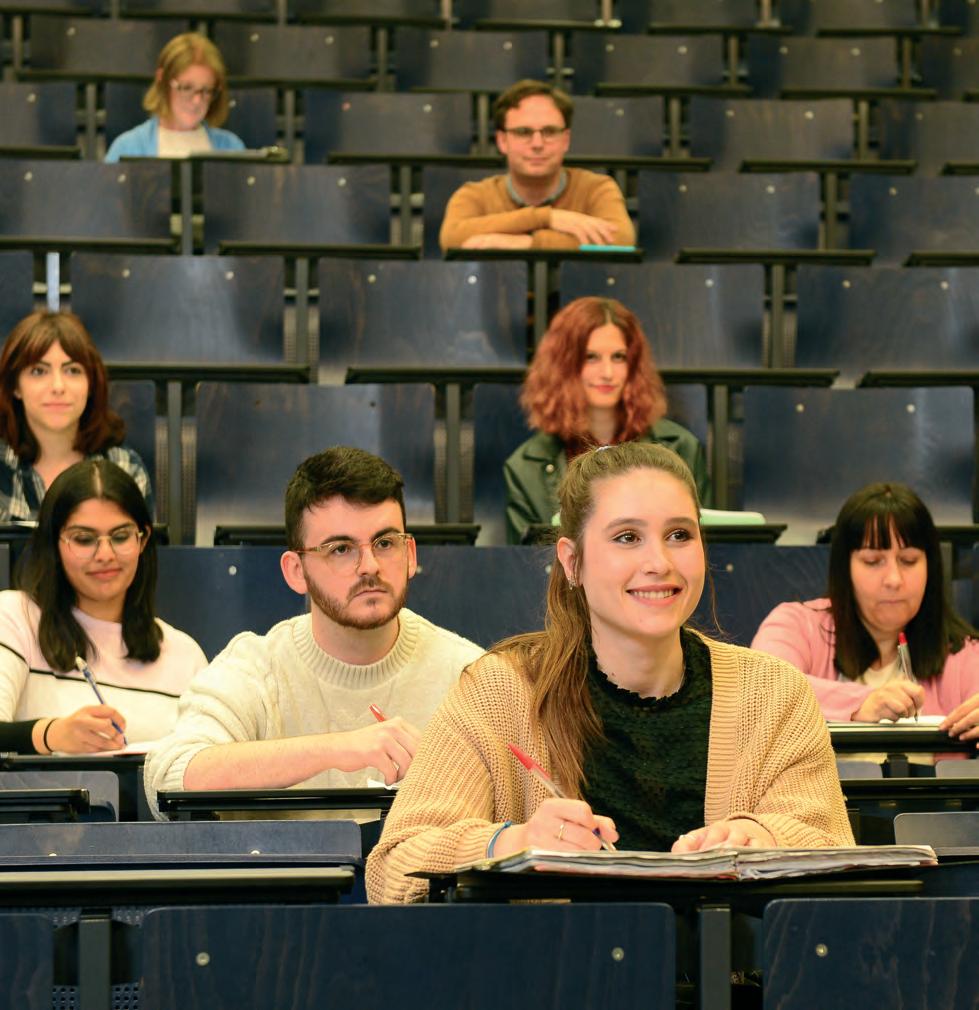
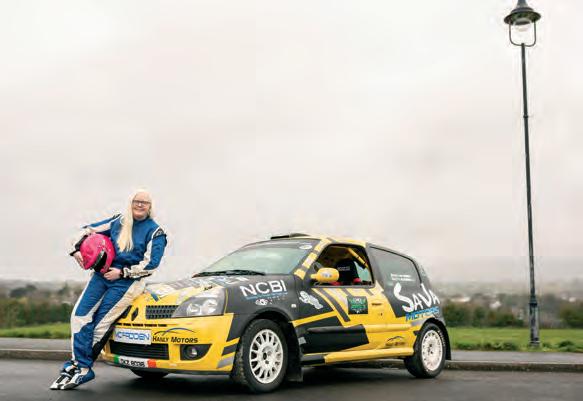
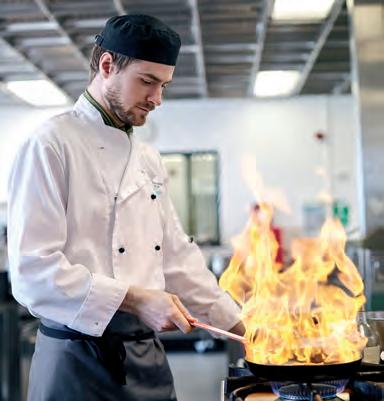
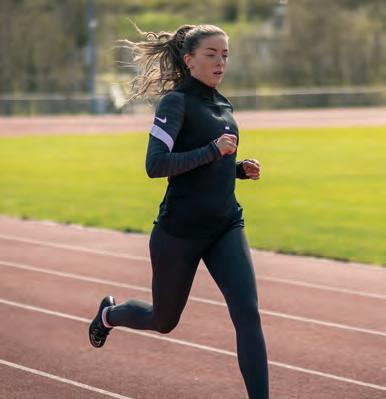

We know that funding studies can often be a concern. That is why we provide additional financial support to hundreds of students each year. We recognise student talents in a range of areas, from academic results to sporting achievements. We also help support students who need financial assistance and ensure they have the means to succeed.
ATU Sports Scholarship programme provides supports to talented student athletes in recognition of their need to balance both sporting and academic commitments. Our sports scholarships include financial benefits of up to €3,000 per academic year. Non-financial benefits include free or reduced rate access to sports facilities, access to sports science supports, free ATU branded sports scholarship gear plus lots more. For more information or to apply for an ATU Sports Scholarship, please go to atu.ie/sports-scholarships
This is a funding scheme targeted at students who are socioeconomically disadvantaged and who are from groups that have low participation rates in higher education.
The Student Assistance Fund (SAF) provides funding to students whose participation in higher education would be at risk as a direct result of financial difficulty. Funding is available towards costs relating to rent, transport, books, materials, food, utilities, childcare and medical costs.
For more information on the scholarships and bursaries available across all ATU campuses, please visit atu.ie/scholarships
Sanctuary Scholarship
Ireland Healthcare Scholarship
Dearcán Foundation
Scholarship
Non-EU Scholarship
Galway Wind Park Scholarships
Google Insight Scholarship
Uversity Scholarship
Education and Training
Bursary Scheme
AbbVie Scholarship
*Additional campus specific scholarships and bursaries may also be available.



We have invested heavily in our learning facilities and academic supports to ensure our students are fully supported throughout their academic journey.
Our innovative and friendly maths support centres offer the extra support that many students need. Services include consultations, tutorials, computer-based tutorials, access to relevant text materials and the option to submit maths problems for correction. Students can access these facilities on a one-to-one basis, as a small group or online.
Students of all abilities can benefit from our academic writing supports. These include getting started with assignments, effective notetaking, report writing, avoiding plagiarism, successful writing in exams and the writing process which includes generating ideas, drafting, revising and editing. Students can access these facilities on a one-to-one basis, as a small group or online.
Our Access and Widening Participation service provides a range of supports and services for students applying to ATU and attending degrees within the university. Our supportive service, which includes personal, academic and financial supports, helps students realise their educational potential regardless of their background or age.
Learning support tutors provide tailored supports such as study skills, essay planning, time management and exam preparation to eligible students following a needs assessment. These supports, offered on a one-to-one or group basis, facilitate academic development, participation and progression. Learning support tutors work with assistive technology specialists to ascertain appropriate technology for students.
ATU’s dedicated professional Disability and Learning Support Service (DLSS) offers an individual support plan tailored to the specific needs of the student and a range of pre and post entry supports for students with disabilities. Following a needs assessment, types of support offered include learning support, transition supports, advocacy, coaching, planning and organisational support, reasonable accommodations for examinations and assistive technology.
Assistive Technology helps students overcome barriers such as communication difficulties, mobility issues, sensory impairments and cognitive and learning difficulties. ATU offers a range of Assistive Technology supports to eligible students following a needs assessment. These supports include mainstream and specialised hardware and software to support access to learning.
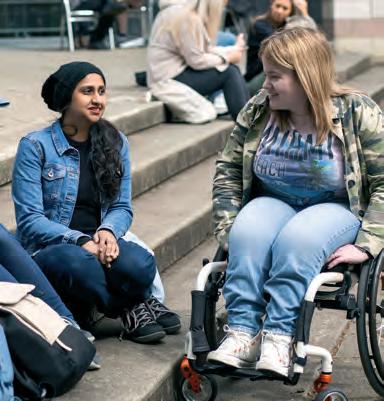
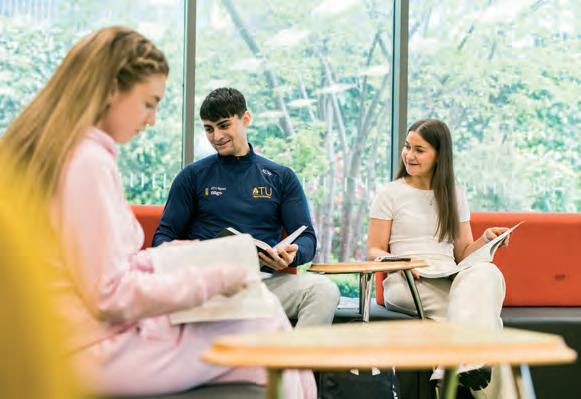


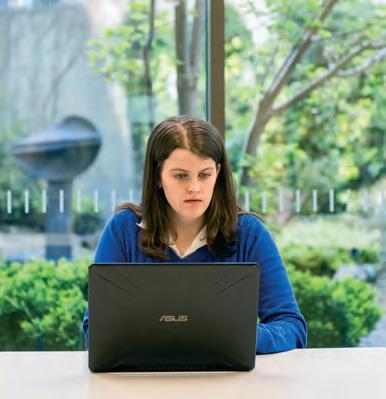
With student supports including a comprehensive induction and free health and counselling services, our teams help with any concerns or worries you may have. If it’s important to you, it’s important to us.
The health service teams across ATU provide free on-campus or offcampus medical care and health promotion information to students. The teams, which are made up of doctors and nurses, can help with the diagnosis and treatment of health problems, alongside providing services such as issuing prescriptions and repeat prescriptions.
The professional counselling service is free of charge to all students resident in Ireland. Our experienced teams will help and support students with any area of concern that might arise; be that academic, personal, financial, mental health or otherwise.
The Chaplaincy and Pastoral Care team are always there to listen. They provide emotional and spiritual support to students during their time at ATU. The team also promote cultural understanding, offer volunteering opportunities, organise social events, build community and much more. The service is available to students of all faiths and those who have none.
We know that the transition to university is an exciting time but a nerve-wracking one too. Our comprehensive induction and welcome programmes ensure the transition is both easy and fun. During induction, students receive their timetables, meet their classmates and lecturers, learn about supports and services, get their questions answered, go on a campus tour and lots more.
Screening questionnaires are also carried out with first year students to identify their preferred learning style and any supports they may need. ATU’s #First5Weeks welcome programme ensures continued support into the academic year.
Our Careers teams are passionate about finding every student a career and future they will love. They advise on career options and postgraduate studies whilst also assisting with CV and interview skills. The teams have well established links with local, national and international employers. Throughout the year they organise a range of workshops, careers fairs and employer talks.
ATU students have free Office 365 to download to their own devices plus free unlimited One Drive data storage, allowing them to study from anywhere in the world at any time. Students can also access a range of free modern technologies and free high-speed Wi-Fi on our campuses.
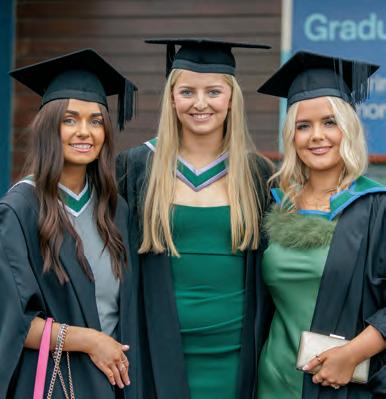



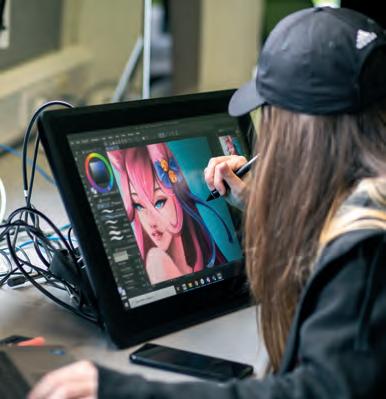
There are multiple ways to achieve your career goals. A degree from ATU will open lots of doors, allowing you to follow numerous career paths. Your future can take you anywhere and we can help take you there.
It is not always easy to know exactly what area to study. It is even more difficult to decide what area to specialise in. That is why our flexible common entry programmes are so popular. Common entry allows students to understand where their true passion lies. Students study a broad range of subjects before choosing what area to specialise in. Please view our programme pages for more information on the common entry options available across our campuses.
Some of our degrees have a direct path into teaching, with built in school placements providing experience teaching in supportive classrooms and environments. Many of our honours degree programmes also meet Teaching Council subject requirements. Students who pursue this route are required to complete a Professional Master of Education (PME) after they graduate to become a fully qualified teacher.
There is never just one way to accomplish your goals. Here at ATU, we want to help each student achieve these goals. If you dream of a career in a certain profession, there may be alternative routes you are not aware of. For example, our health science programmes have routes into allied health professions. Our schools liaison teams are always available to discuss alternative routes which can help you fulfil your dreams.
Many of our degrees have the added bonus of professional accreditation. Professional accreditation is a kitemark of quality that demonstrates a programme meets or exceeds standards developed by experts in the profession. The benefit to our graduates is increased employability. It gives employers confidence knowing that an individual has reached the industry standard. Throughout the programme pages in this prospectus, you will see all the professional accreditations.
CAO applicants can apply for up to 20 programmes, ten at Level 8 and ten at Level 6/7. The ladder system allows progression through these levels and beyond. For example, we have seen students progress from Level 6 higher certificate up to PhD Level 10. If a programme of interest is available at all levels, we recommend students include all levels on their application. This increases the chances of an offer. Level 6 points are normally much less than their Level 8 equivalent.




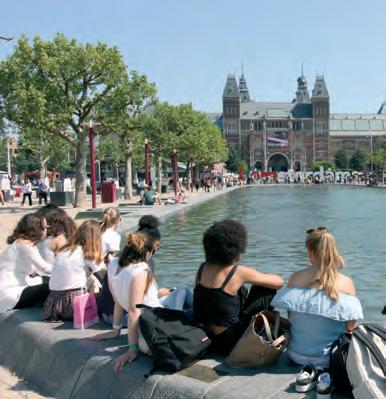


If you are looking for an unforgettable experience during your time at ATU, then studying abroad might just be for you. We encourage students to consider the option of spending a year, a semester or even a small part of a semester at one of our partner universities. With locations across Europe and the world, your dream destination might be closer than you think.
Time spent studying abroad will look great on your CV and further enhance your employability. It demonstrates your confidence and ambition. These are valuable skills that can give you an edge with future employers. In the internationalised job market, employers are increasingly looking for graduates who have a demonstrated ability to succeed in an international environment.
You will go on a journey of personal development as you step out of your comfort zone. You will gain new knowledge and develop language skills, whilst also having the option to study fully through English. There will be opportunities to travel to new destinations. You will take in world famous scenery and landmarks, all whilst you immerse yourself in a new culture.
ATU Global is on hand to make this happen. Not only will they help you make this dream a reality, they will fully support you for the duration of your time away.
Erasmus+ offers financial grants to students who wish to study abroad. These grants are in addition to, and independent from, other educational supports such as SUSI.

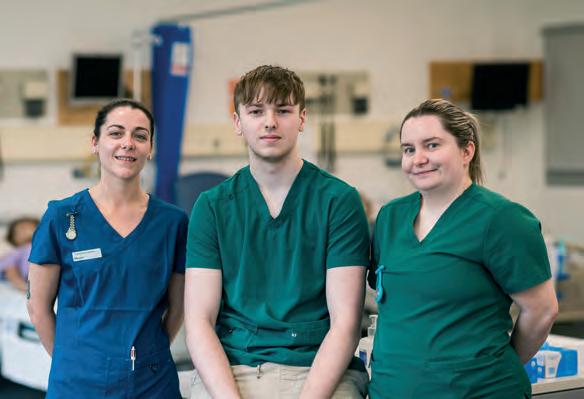

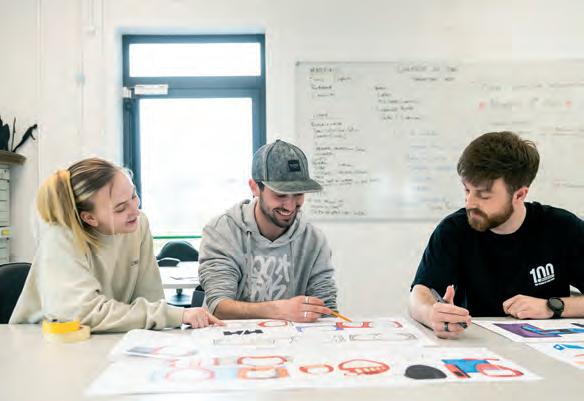
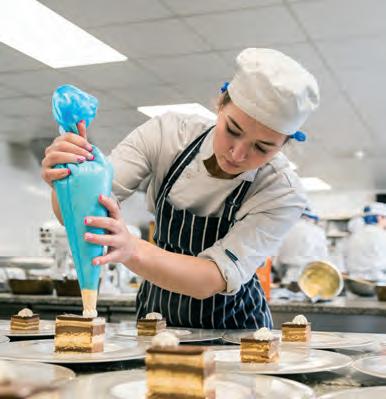

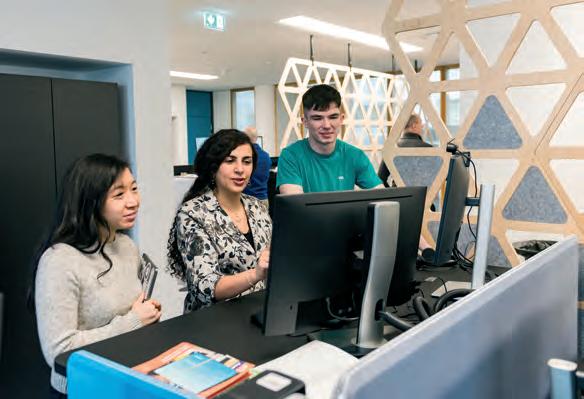
Socrúchán Oibre
The opportunity to translate academic knowledge into a hands-on employment experience is why we are so passionate about work placement. From start-ups to social care, teaching to technology, our varied placement options mean you will find something to suit you and your career aspirations. Although you will not be on campus during work placement, we are still here to fully support you.
Real-world experience makes you much more employable. It will look great on your CV and gives you real-life examples to reference in an interview.
As we have seen many times before, leaving a good impression during work placement can often lead to job offers. Translating book knowledge into a working situation is a valuable skill employers look for.
Even if you don’t get a job offer, the networks you build through work colleagues and industry experts can create all sorts of employment opportunities.
You will gain an insight into something you are passionate about. This can reinforce your career path choices. It can also highlight new career opportunities you may not have known were an option. Or it could fuel a desire to progress your studies to the next level.
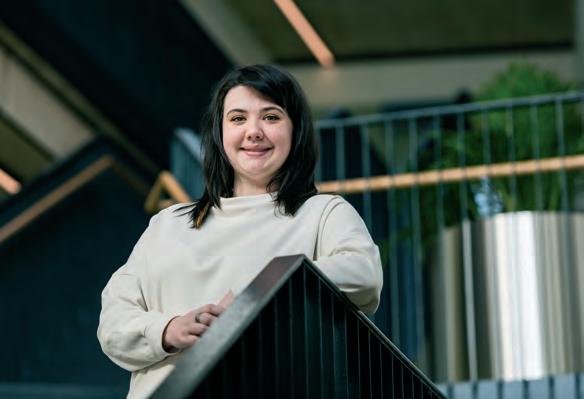
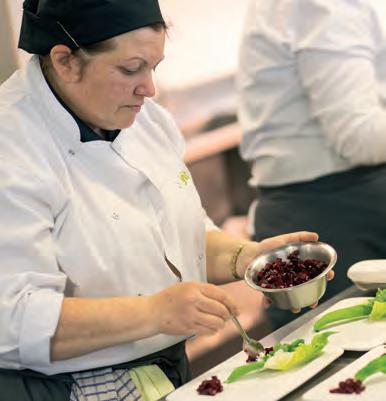
Iarrthóirí Lánfhásta
Returning to education takes courage. We welcome hundreds of new mature students each academic year. Whether you want to gain a new qualification for your career or study something you have always been passionate about, we have the supports in place to help you succeed.
We understand that the first essay, assignment or report can be a challenge. We have several supports available including maths support and academic writing support.
We pride ourselves on the welcoming and supportive environment our academic staff create. Not just a number, they are always on hand to help with any questions you may have.
There are several grants and scholarships which may be available to mature students. These include the Back to Education Grant, 1916 Bursary Fund and Uversity Scholarships. For more information, please visit atu.ie/scholarships
Clubs and societies are a great way to make new friends, try out something new or pursue your passion. With a huge range to choose from, we have something for everyone.
Mature applicants are required to be over 23 on January 1st of the calendar year of application. For more information on entry requirements, please go to page 325.
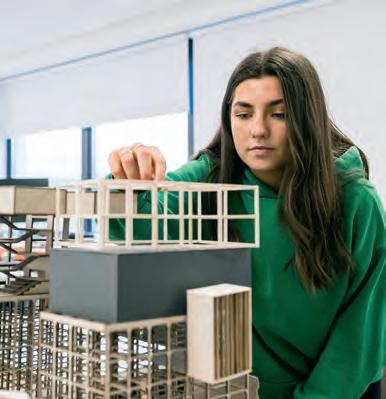

Not all students will take the same path, but we believe all students can reach the same destination. Each year we welcome lots of new students to ATU based on their Further Education and PLC awards. We fully support them on their academic journey which will ultimately lead to their dream career.
Many students do not qualify for a university degree based on their Leaving Certificate results. An award from a Further Education and Training (FET) or Post-Leaving Certificate (PLC) course can often be the perfect stepping-stone to securing a university place.
Applicants must present a full major award at QQI Level 5 or higher for entry into Year 1. Applicants with awards at QQI Level 6 may be considered for advanced entry into Year 2. For more information, please go to page 321.
A quota of places on ATU programmes are reserved annually for QQI accredited applicants to ensure that they are fairly represented in our student numbers. Offers are issued in Round Zero which is usually in early August.
Our welcoming environment, supportive lecturers and staff, and range of student supports will help make the transition to university life an easy one.
Tertiary degree programmes allow students to spend Year 1 of their degree in an ETB before completing their studies at an ATU campus. For more information, please visit atu.ie/tertiarydegrees
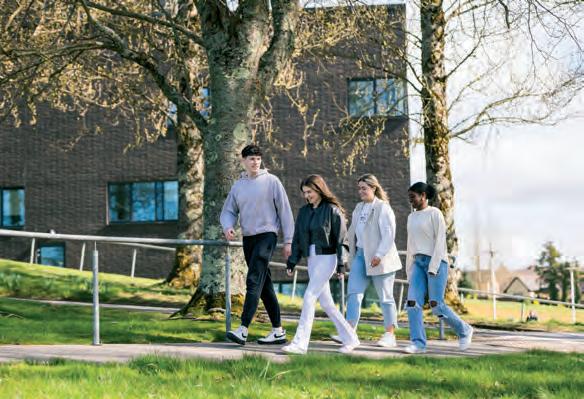
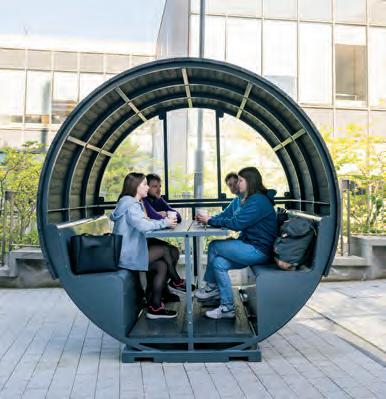
Iarrthóirí ó Thuaisceart Éirinn
Each year we are proud to welcome a new cohort of Northern Irish students. With a top-class education guaranteed, a simple application process and all the financial benefits that come along with it, we can see why more and more Northern Irish students are choosing to study at ATU.
At a maximum of €3,000 per year, the student contribution fee is significantly less than in Northern Ireland and the UK. Fees in the Republic of Ireland are considerably cheaper than in Northern Ireland and the UK.
Northern Irish students can apply for a fee grant through Ireland’s awarding authority, SUSI (Student Universal Support Ireland). Unlike student loans, fee grants do not have to be paid back. For more information, please visit susi.ie
Students can apply to the Student Loans Company for a student contribution loan. Students may also be entitled to a maintenance loan which will help with living costs. For more information, please visit studentfinanceni.co.uk
CAO applications open on November 5th. The application process is very straight forward with no personal statement required. For more information or to apply, please visit cao.ie
To view our entry requirements and how the points system works, please go to page 321. Should you have any questions, please email admissions@atu.ie


Iarrthóirí Idirnáisiúnta
Our campuses attract students from across the globe. We pride ourselves on being friendly and welcoming, so asking questions and meeting new people could not be easier.
From your first day through to graduation, we will make you feel welcome and part of the ATU family. Our campuses cover much of the Wild Atlantic Way, which means you can look forward to stunning landscapes, breath-taking views and exciting outdoor adventures.
ATU is home to students from over 100 countries worldwide, giving us diverse and vibrant campuses. Throughout your studies you will meet students from different backgrounds and cultures, offering you new perspectives and inspiring new interests.
Our dedicated international offices will help with the admissions process and support you throughout your time in ATU. Please go to page 325 for our international offices contact information.
Joining an international society is a great way to make new friends. Throughout the year they arrange field trips, nights out and weekends away.
The quality of the experience at Atlantic TU is equally matched by the quality of the degree. From successful careers to exciting further studies, our graduates have taken their qualifications across the globe.
1 Roisin Murphy
BSc (Hons) in Intellectual Disability Nursing Registered ID Nurse Melbourne, Australia
2 Conor Fennell BEd (Hons) in Home Economics and Religious Education Principal at Katherine High School Northern Territory, Australia
3 Roisin Hession
BEd (Hons) in Home Economics and Biology Post-Primary School Teacher New Zealand
4 Adam Neely
BSc (Hons) in Quantity Surveying Senior Quantity Surveyor, Laing O’Rourke, Sydney, Australia
5 Odhran Doherty BSc (Hons) in Agriculture Assistant Farm Manager Almarai, Saudi Arabia
6 Amira Amiran LLB (Hons) Senior Associate, EY Kuala Lumpur, Malaysia
7 Brian McDermott BSc (Hons) in General Nursing Registered Nurse Abu Dhabi, UAE
8 Glenn Gallagher BSc (Hons) in Chemical and Pharmaceutical Science AES Operator, ALS Dubai, UAE
20
25 Ian Nell
BEng
Industrial
26 Caroline Joire
27
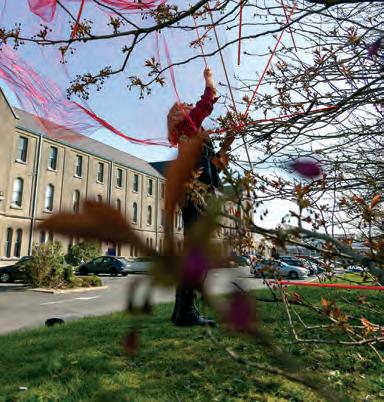
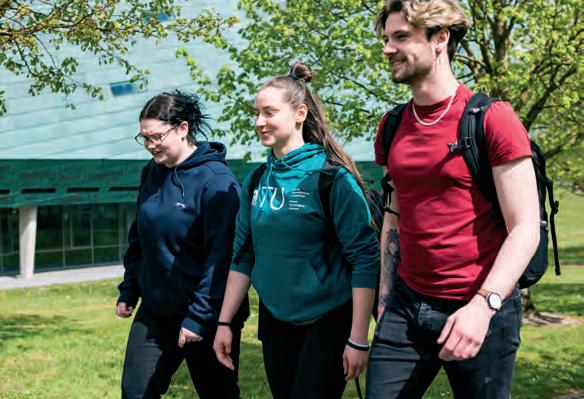

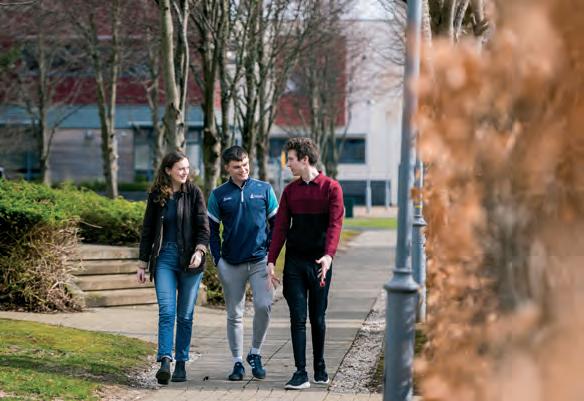

Our prospectus programme pages are packed full of information. If you require further information, please visit our website or contact us via email. We have included these details on each page. We have also included Minimum Entry Requirements and any Additional Entry Requirements on each page. For more information on Minimum Entry Requirements, please go to page 320 or email admissions@atu.ie
As a multi-campus university, ATU offers a diverse range of programmes. Students can follow their passion, find their career path and engage in a vibrant university community. With an emphasis on applied learning, small class sizes and a supportive environment, students get an unforgettable university experience and graduate career ready. Campus
Galway City, Dublin
Campas Chathair na Gaillimhe, Bóthar Bhaile Átha Cliath
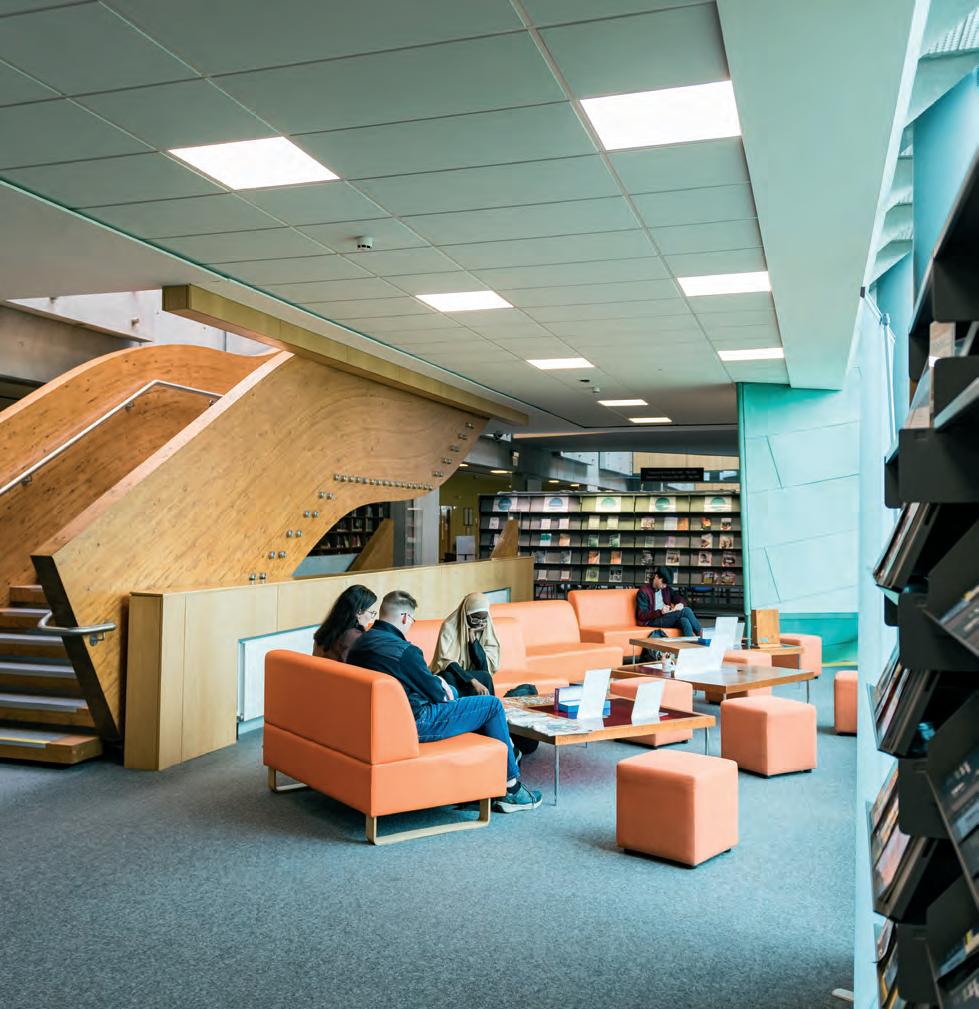
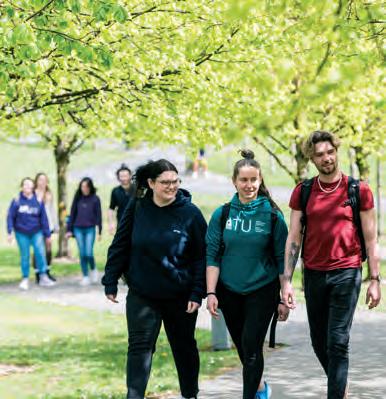
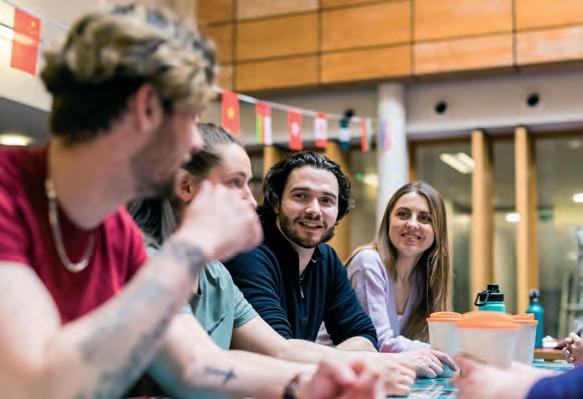
The ATU Galway City, Dublin Road campus offers undergraduate programmes across a wide range of disciplines, in addition to postgraduate, part-time and professional development programmes.
The Galway City, Dublin Road campus, located on the east side of Galway city, is one of the city’s iconic landmarks by its three distinctive sail-shaped copper panels on the building front. This vibrant campus welcomes students to study a variety of programmes, including business, science, computing, engineering, culinary arts, hospitality and tourism.
Students have access to state-of-the-art lecture theatres, labs, machine halls, robotic labs, training kitchens, restaurants, and bars. Our award-winning library offers quiet study spaces, free WiFi, computing, and printing facilities. The IT Centre has 188 workstations, a fully equipped training room, a multimedia studio and technical support services.
Students are the focus of the learning experience, and we empower them to be successful at third level and in their future careers. From day one, we offer a range of supports, which include a first five weeks programme, a learning and innovation skills module, a community engagement module and an employability resources toolkit.
The Galway City, Dublin Road campus is home to research centres in the fields of heritage, marine and medical technologies. Our Innovation Hubs support new business start-ups. 60% of our postgraduate students avail of learning and networking opportunities at our iHubs facility, where they receive project support from enterprise partners.
The Galway City, Dublin Road campus offers offers language and culture modules in French, German, Spanish and Gaeilge across various programmes in:
• Business (Business, Marketing and Sales, Entrepreneurship, Finance and Economics)
• Tourism and Hospitality (International Tourism Management, Heritage, International Hotel and Hospitality Management, Event Management with Public Relations, Culinary Arts)
Studying a language opens doors to travel, new cultures and communication skills.
It provides Erasmus+ and placement opportunities, enhancing job prospects in the global economy.
With skilled language lecturers, ATU offers a unique learning approach, international trips and events, and opportunities for career growth and personal development.
The Bachelor of Business (Honours) is a four-year Level 8 business programme. It provides students with a broad-based business education as it covers a wide range of business and management subjects. The programme focuses on developing professional skills and competencies essential for a successful career in business. With practical and relevant course content, students are well-prepared to take advantage of diverse career opportunities in today’s dynamic business environment.
atu.ie/AU601
4 Years
280 (Level 8 2024)
Minimum Entry Requirements
140 Places
Erasmus+
Kevin McDonagh
Programme Chair kevin.mcdonagh@atu.ie
Colm Kelleher
Programme Co-ordinator colm.kelleher@atu.ie
The programme incorporates practical assessments and projects which are aimed at cultivating a range of skills including interpersonal, management, analytical and critical thinking. Business is a great degree choice due to the exciting and varied career options. With a wide range of courses on offer at undergraduate and post-graduate level, business students at ATU Galway can embrace the flexibility a degree in Business offers, all while enjoying the vibrant student city of Galway.
This programme prepares students for employment in a wide range of business areas, including management functions of industrial, commercial, and public enterprises, accounting, financial services, marketing and sales, human resources, and IT services.
ATU Level 8 qualifications are recognised worldwide for postgraduate entry.
Business degrees at the Galway City, Dublin Road campus are designed to have the flexibility to switch from one business programme to another if a student changes their mind about what they want to study.
At ATU Galway, students explore a range of business areas during the first part of their degree. Students can move between any of the following programmes at the end of their second year:
• Business
• Business in Marketing and Sales
• Business with Entrepreneurship
• Business in Finance and Economics
Alternatively, students can move from the Accounting and Digital Accounting degree to any of the above four-degree courses after one year.
Or
Move into the Accounting degree from any of the above four degree courses after two years, provided specific accounting subjects have been taken.
Also, students can move between Business Information Systems and any of the above four degree courses after Year 1.
Year 1
• Principles of Economics
• Fundamentals in Financial and Management Accounting
• Computer Applications
• Management Principles and Business Environment
• Fundamentals of Entrepreneurship
• Principles of Marketing
• Sustainability
• Academic and Professional Skills
Year 2
• Business Law and Legal Studies
• Management Information Systems
• Business Communications
• Human Resource Management
• Applied Macroeconomics
• Organisational Behaviour
• Applied Marketing and Sales
• Statistics for Business
• Human Resource Development
Year 3
• Sales Management
• Financial Management
• Digital Business
• Operations Management
• Business Ethics and Corporate Governance
• Business Communications and Negotiations
• Project Management
Year 4
• Strategic Management
• Research Methods
• Critical Thinking
• Project
• Supply Chain Management
• Sustainable Development and the Circular Economy
• People Management
Additional elective modules are available throughout the programme.
AU501 | Level 7 | Bachelor of Business
AU401 | Level 6 | Higher Certificate in Business
Our business programmes provide comprehensive education and practical skills, offering a solid foundation in various functional areas of business. Students engage with core business modules like economics, accounting, IT, management, organisational behaviour, entrepreneurship, marketing, sustainability, law and human resource management through expert lecturers, blending academic knowledge with industry experience.
atu.ie/AU501
atu.ie/AU401
2/3 Years
224 (Level 7 2024)
162 (Level 6 2024)
120 Places Minimum Entry Requirements
Erasmus+
Kevin McDonagh Programme Chair kevin.mcdonagh@atu.ie
Colm Kelleher Programme Co-ordinator colm.kelleher@atu.ie
These programmes include practical assessments and projects designed to develop interpersonal, management, analytical, and critical thinking skills. A business degree offers exciting and diverse career opportunities. ATU Galway provides a wide range of undergraduate and postgraduate courses, allowing students to enjoy the flexibility of a business degree while experiencing the vibrant student life in Galway city.
These programmes prepare students for employment in a wide range of business areas in the accounting, financial services, marketing, human resource and management functions of industrial, commercial and public enterprises.
Students successfully completing the Higher Certificate in Business can progress, through an internal progression route, to Year 3 of the Bachelor of Business (Level 7). Similarly, students who successfully complete the Bachelor of Business (Level 7), can apply to progress to Year 4 of the Bachelor of Business (Level 8 Honours).
At ATU Galway, students explore a range of business areas during the first part of their degree. Students can move between any of the following programmes at the end of their second year:
• Business
• Business in Marketing and Sales
• Business with Entrepreneurship
• Business in Finance and Economics
Alternatively, students can move from the Accounting and Digital Accounting degree to any of the above four degree courses after one year. Or
Move into the Accounting degree from any of the above four degree courses after two years, provided specific accounting subjects have been taken.
Also, students can move between Business Information Systems and any of the above four degree courses after Year 1.
Year 1
• Principles of Economics
• Fundamentals in Financial and Management Accounting
• Computer Applications
• Management Principles and Business Environment
• Fundamentals of Entrepreneurship
• Principles of Marketing
• Sustainability
• Academic and Professional Skills
Year 2
• Business Law and Legal Studies
• Management Information Systems
• Business Communications
• Human Resource Management
• Applied Macroeconomics
• Organisational Behaviour
• Applied Marketing and Sales
• Statistics for Business
• Human Resource Development
Year 3 (Level 7)
• Sales Management
• Financial Management
• Digital Business
• Operations Management
• Business Ethics and Corporate Governance
• Business Communications and Negotiations
• Project Management
Elective modules, including languages, are available throughout the programme.
Business degrees at the Galway City, Dublin Road campus are designed to have the flexibility to switch from one business programme to another if a student changes their mind about what they want to study.
Accountants are essential for every business, offering expert advice and managing financial activities. This programme provides a direct pathway to a career in professional accounting and opportunities in business, including financial services and management consulting. Programme lecturers are highly qualified professional accountants, many of whom are examiners for professional bodies. ATU maintains close links with professional bodies and industry, ensuring the programme is regularly updated to meet professional and employer requirements.
• Academic and Professional Skills
• Management Principles and Business Environment
• Information Technology (ACCT)
• Cloud Computing Infrastructure and Services
• Business Mathematics
• Principles of Economics
• Introduction to Business Analytics
• Financial Accounting (ACCT)
• Management Accounting 1
3 Years
310 (Level 8 2024)
Minimum Entry Requirements
40 Places
Niamh Fennell Programme Chair niamh.fennell@atu.ie
This programme prepares students for employment in the professional accounting industry, including accounting firms and financial services employers and multinational companies. There are many different types of accounting roles including financial accounting, management accounting, auditing, and tax accounting. Today accountants play a strategic role within businesses. Accountants frequently move into higher management positions quickly, so accounting careers can be many and varied, including financial controller roles, senior business management roles and even the chief executive role.
ATU Level 8 qualifications are recognised worldwide for postgraduate entry. Most graduates will progress directly into the later stages of professional accountancy exams with professional bodies such as: ACCA, Chartered Accountants Ireland or Irish Taxation Institute, while working as part of a structured traineeship with an employer.
The Level 8 degree is designed to meet the Teaching Council requirements for the teaching of Accounting to Leaving Certificate level following the completion of a Professional Master of Education (PME).
Accounting degrees at the Galway City, Dublin Road campus are designed to have the flexibility to switch from one accounting programme to another if a student changes their mind about what they want to study.
This programme has excellent professional body recognition and exemptions for graduates, meaning this three year accounting degree provides a quick route to becoming a qualified accountant. With over 1,000 accounting job openings in Ireland and continued demand, graduates enjoy excellent career prospects. This qualification from ATU is internationally recognised, making skills acquired valuable both in Ireland and abroad. atu.ie/AU600
• Management Accounting
• Financial Management (managerial finance)
• Computerised Accounting Packages
• Financial Management (investment decisions)
• Business Analytics
• Financial Reporting
• Taxation
• Corporate and Business Law
• Taxation
• Principles of Strategic Management
• Corporate Reporting
• Audit and Assurance
• Corporate Finance and Management Accounting
• Corporate Governance
• Professional Development
In addition to the mandatory modules listed, elective modules are available in Year 3.
This is a four-year Level 8 programme blending traditional accounting skills with advanced digital technology. It prepares students for careers in accounting, decision making, digital auditing, business and data analytics, blockchain, and more. The curriculum is future-proof, addressing current and emerging industry demands. Lectures are delivered by experienced professional accountants and digital technology experts with strong industry connections. The programme includes a work placement to provide practical experience. Graduates gain critical knowledge and skills highly sought after in today’s business environment.
atu.ie/AU607
4 Years
348 (Level 8 2024)
Minimum Entry Requirements
30 Places
Work Placement
Michelle Burke Programme Chair michelle.burke@atu.ie
This programme enables graduates to pursue further studies and gain work experience to become professional accountants in various sectors. Specialisations include management accounting, systems accounting, digital auditing, and IT roles like process design, business analytics, data analytics, blockchain, and application support. The degree offers a well-rounded combination of accounting, business, and digital skills, equipping graduates to become future business leaders.
Applicants do not need to have previously studied accounting, business, honours maths or computing. There is no requirement for skills in computing or IT. We focus on teaching our students how to apply and analyse the various information technology tools commonly used in business.
This programme has excellent professional body recognition and exemptions for graduates.
Chartered Accountants Ireland (CAI) - all ‘CAP1’ exams and three of the four CAP2’ exams- the only university in the country offering this at undergraduate level.
Association of Chartered Certified Accountants (ACCA) - all ‘Applied Knowledge’ exams and five of the six ‘Applied Skills’ exams.
ATU Level 8 qualifications are recognised worldwide for postgraduate entry.
This programme is designed to meet the Teaching Council requirements for the teaching of Accounting to Leaving Certificate level following the completion of a Professional Master of Education (PME).
Year 1
• Academic and Professional Skills
• Management Principles and Business Environment
• Information Technology (ACCT)
• Cloud Computing Infrastructure and Services
• Business Mathematics
• Principles of Economics
• Introduction to Business Analytics
• Financial Accounting (ACCT)
• Management Accounting 1
Year 2
• Business Process Modelling
• Financial Management 1 Managerial Finance
• Blockchain
• Management Accounting 2 & 3
• Digital Accounting Decision Making
• Taxation 1
• Financial Reporting
• Corporate and Business Law
Year 3
• Taxation 2
• Business Analytics
• Computerised Accounting Packages
• Database for Accounting Information Systems
• Decision Theory and Data Visualisation
• Financial Management 2
• Artificial Intelligence for Digital Accounting
• Work Placement
Year 4
• Advanced Financial Reporting
• Performance Management
• Intelligent Systems
• Systems Analysis and Design
• Risk Management, Internal Audit and Internal Control
• Systems Project
• Strategic Finance
• Corporate Governance
• Business Strategy and IS
• Taxation 3
AU602 | Level 8 | Bachelor of Science (Honours)
AU502 | Level 7 | Bachelor of Science
These programmes combine Information Systems (IS) and Business modules to equip graduates with the skills needed for various career paths. As students progress, they gain proficiency in integrating IS into various business settings and in developing and implementing internet and mobile technologies. Topics covered include enterprise systems, social media, e-commerce websites, cybersecurity and cloud computing.
atu.ie/AU602
atu.ie/AU502
3/4 Years
307 (Level 8 2024)
253 (Level 7 2024)
Minimum Entry Requirements
50 Places
Work Placement
Ronan MacGearailt Programme Chair ronan.macgearailt@atu.ie Erasmus+
In Year 3 of their studies, students have the option to pursue a work placement, participate in the Erasmus+ programme for studying abroad, or take modules on campus. For work placements, students can choose organisations based on their interests or preferred geographical locations. To date, those opting for the Erasmus+ programme have had opportunities to study at universities in France, Germany, and the Netherlands.
Graduates gain employment in diverse roles including business managers, IT / IS business analysts, data analysts, systems analysts, web developers, applications support and testing, cloud analyst, solutions architect, or IT project managers. Graduates have gained employment with both indigenous business and multinationals such as HP, SAP, Dell, Accenture, Metlife, Fidelity Ireland and many others. There is a growing skills shortage in this area, thus graduates of this programme are in high demand.
Upon successfully completing Year 3, (Level 7) students can then apply internally for Year 4 (Level 8). ATU Level 8 qualifications are recognised worldwide for postgraduate entry. The Level 8 degree is designed to meet the Teaching Council requirements for the teaching of Computer Science to Leaving Certificate level following the completion of a Professional Master of Education (PME).
With a work placement in Year 3, students get a chance to try out their newfound skills in a professional working environment.
Business degrees at the Galway City, Dublin Road campus are designed to have the flexibility to switch from one business programme to another if a student changes their mind about what they want to study.
Year 1
• Principles of Economics
• Fundamentals in Financial and Management Accounting
• Computer Applications
• Management Principles and Business Environment
• Academic and Professional Skills
• Fundamentals of Entrepreneurship
• Principles of Marketing
• Sustainability
Year 2
• Project Management
• Management Information Systems
• Business Process Modelling
• Visual Design
• Principles of IS
• Advanced Computer Applications
• Statistics for Business
• Database Management Systems
• Internet Technology
• Creative Digital Media
• Dynamic Web Development
• Advanced Programming
Year 3
• Cybersecurity and Data Governance
• Digital Business
• Business Analytics
• Data Modelling
• Web Design Workflow
• Industrial Placement
Year 4 (Level 8)
• Systems Analysis and Design
• Artificial Intelligence for Business
• Business Intelligence
• Enterprise Applications
Additional elective modules are available throughout the programme.
This programme nurtures students’ creativity and sharpens their business analytics skills, empowering them to launch their own ventures or drive innovation within existing organisations. Students build a strong foundation in core business principles while deepening their entrepreneurial knowledge, confidence, and capabilities. Successful entrepreneurs must be able to communicate their vision, listen to feedback, inspire teams, and engage investors and partners. This degree helps students develop those essential skills. Graduates are well-equipped to pursue fulfilling careers both in Ireland and internationally.
Year 1
• Principles of Economics
• Fundamentals in Financial and Management Accounting
• Computer Applications
• Management Principles and Business Environment
• Academic and Professional Skills
• Fundamentals of Entrepreneurship
• Principles of Marketing
• Sustainability
Year 2
• Business Law and Legal Studies
4 Years
303 (Level 8 2024)
30 Places Minimum Entry Requirements
Work Placement
Eilis McNulty Programme Chair eilis.mcnulty@atu.ie Erasmus+
This applied programme collaborates with businesses and Enterprise Ireland. It is for students looking to work as a dynamic entrepreneur in their own business or as an innovative business executive in enterprise. Small class sizes facilitate group work, project work and the development of practical and digital skills, ensuring an excellent career path in business or enterprise. Students can pursue their own enterprise interests through work placement opportunities in Year 4. Much of the final year will be delivered offcampus with a number of innovative modules planned for online delivery.
Graduates can create their own employment in a start-up business of their own or build a career as an impactful and innovative executive in business and enterprise. Graduate careers may include working as a start-up business owner, business manager, business development officer, inventor, business consultant or manager of innovation and change.
ATU Level 8 qualifications are recognised worldwide for postgraduate entry.
The Level 8 degree is designed to meet the Teaching Council requirements for the teaching of Business to Leaving Certificate level following the completion of a Professional Master of Education (PME).
Applicants for this programme are not required to have previously studied entrepreneurship, accounting, finance, economics or business.
Business degrees at the Galway City, Dublin Road campus are designed to have the flexibility to switch from one business programme to another if a student changes their mind about what they want to study. atu.ie/AU605
• Management Information Systems
• Business Communications
• Human Resource Management
• Applied Marketing and Sales
• Statistics for Business
• Applied Macroeconomics
• Organisational Behaviour
• Human Resource Development
Year 3
• Financial Management
• New Venture Creation
• Project Management
• Digital Business
• Operations Management
• New Venture Planning
• Business Communications and Negotiations
• Planning and Decision Making for Entrepreneurs
Year 4
• Strategic Management
• Eco and Social Enterprise
• Commercialising Technology and Innovation
• Work Placement
• Research Methods
• Project
In addition to the mandatory modules listed, elective modules including languages, are available throughout the programme.
Daniel Collins
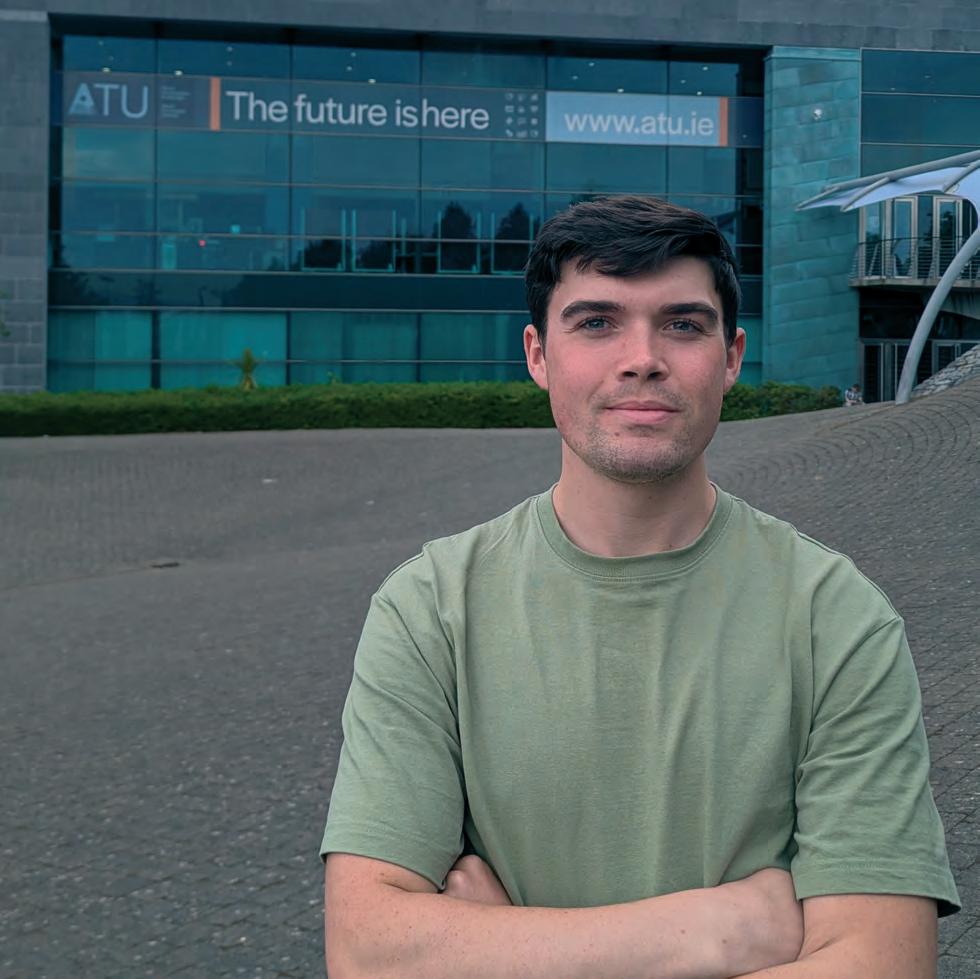
I’m a 26-year-old Irish traveller and one of the first in my family to attend thirdlevel education.
I chose ATU because of its strong reputation for practical, hands-on learning, which is not found in other universities within Ireland. I really appreciated the small, interactive lectures, as they allowed for direct engagement with lecturers and quick clarification of any questions. The course also offers flexibility; you can specialise in areas like Accounting, Economics or remain in General Business. A highlight for me was the opportunity to study abroad for a semester in Valencia, Spain. It broadened my perspective and added real value to both my education and my fluency in the Spanish language.
This programme is ideal for students interested in areas such as business finance, decision-making, investment principles, and the analysis of bonds and shares within an economic context. Lecturers on this programme are highly qualified, experienced financiers and economists. They have designed the curriculum in collaboration with industry leaders to ensure it meets real-world business needs. The semester-long business placement in Year 3 helps student's employability and ensures they follow the career path that best suits their strengths and interests. Graduates can look forward to excellent career opportunities in this field of study.
atu.ie/AU604
4 Years
310 (Level 8 2024)
25 Places Minimum Entry Requirements
Work Placement
Marie Finnegan Programme Chair marie.finnegan@atu.ie Erasmus+
This degree offers a direct pathway into a full-time career in financial services or in the economics profession. This degree is for students who would like to focus on a career in the financial services industry, avail of work placement in Year 3, gain extra accreditation through the digital academy, including qualifications such as Microsoft accreditation at different levels. This programme facilitates the completion of Qualified Financial Advisor and Investment Foundation exams for accreditation.
Prior knowledge of business, accounting, economics or entrepreneurship is not needed to apply to this programme.
Graduates are in high demand by small firms, large companies (BNP Paribas, Northern Trust, State Street), and government agencies both domestically (e.g., Central Bank) and internationally (e.g., US Federal Reserve). Graduates pursue fulfilling careers across various sectors, including financial services, guiding established enterprises, executive positions, and traditional business roles.
ATU Level 8 qualifications are recognised worldwide for postgraduate entry. This degree was designed around Qualified Financial Advisor (QFA) qualification. Upon completion of this Level 8 degree, graduates can sit for the QFA qualification based on the core content mastered in their degree programme. This gives graduates a unique selling point when marketing themselves for their ideal job. This programme is designed to meet the Teaching Council requirements for the teaching of Business to Leaving Certificate level following the completion of a Professional Master of Education (PME).
Business degrees at the Galway City, Dublin Road campus are designed to have the flexibility to switch from one business programme to another if a student changes their mind about what they want to study.
Year 1
• Principles of Economics
• Fundamentals in Financial and Management Accounting
• Computer Applications
• Management Principles and Business Environment
• Academic and Professional Skills
• Fundamentals of Entrepreneurship
• Principles of Marketing
• Sustainability
Year 2
• Business Law and Legal Studies
• Management Information Systems
• Business Communications
• Human Resource Management
• Applied Marketing and Sales
• Statistics for Business
• Applied Macroeconomics
• Organisational Behaviour
• Human Resource Development
Year 3
• Financial Services 1Loans and Pensions
• Financial Management 1Managerial Finance
• Irish Taxation Environment
• Business Analytics
• Quantitative Techniques
• Applied Microeconomics for Business
• Work Placement
Year 4
• Research Methods and Project
• Global Financial Markets and Institutions
• Financial Management 2Investment Decisions
• Econometrics
• Economic Evaluation Methods
• Financial Services 2 - Investment and Planning
• Financial Management 3Corporate Finance
• Ireland in the Global Economy
• Ethics and Corporate Governance
In addition to the mandatory modules listed, elective modules including languages, are available throughout the programme.
AU603 | Level 8 | Bachelor of Business (Honours)
AU503 | Level 7 | Bachelor of Business
Developed with business and marketing experts, these degrees cultivate creative talent and skills in research, digital proficiency, data analysis, ethics, and strategic thinking. They prepare students for careers as marketing and sales professionals in the digital age. Industry links offer expert guest speakers, real-world projects, and excellent work placements in Year 3.
atu.ie/AU603
atu.ie/AU503
3/4 Years
307 (Level 8 2024)
251 (Level 7 2024)
Minimum Entry Requirements
60 Places
Work Placement Erasmus+
Lorna Moynihan Programme Chair lorna.moynihan@atu.ie
Designed in collaboration with business and industry, these degrees develop students’ creativity through practical project work, group work and continuous assessment and numerous other skills leading to an exciting marketing or management career. These programmes are for students with an interest in digital business, social media marketing, market research and buyer behaviour.
Graduates apply their creative talent and skills through marketing and sales, to ensure the success of businesses and organisations, developing exciting and rewarding careers in areas such as marketing management, selling and sales management, brand management, international marketing management, marketing communications, digital and online marketing and business analyst.
Upon successfully completing Year 3, (Level 7) students can then apply internally for Year 4 (Level 8). ATU Level 8 qualifications are recognised worldwide for postgraduate entry.
The Level 8 degree is designed to meet the Teaching Council requirements for the teaching of Business to Leaving Certificate level following the completion of a Professional Master of Education (PME).
The industrial placement in Year 3, helps to boost employability. The small class size facilitates group work, project work and the development of practical and digital skills.
Business degrees at the Galway City, Dublin Road campus are designed to have the flexibility to switch from one business programme to another if a student changes their mind about what they want to study.
Year 1
• Principles of Economics
• Fundamentals in Financial and Management Accounting
• Computer Applications
• Management Principles and Business Environment
• Academic and Professional Skills
• Fundamentals of Entrepreneurship
• Principles of Marketing
• Sustainability
Year 2
• Business Law and Legal Studies
• Management Information Systems
• Business Communications
• Human Resource Management
• Applied Marketing and Sales
• Statistics for Business
• Applied Macroeconomics
• Organisational Behaviour
• Human Resource Development
Year 3
• Digital Business
• Marketing and Sales Management
• Market Research
• Digital Marketing
• Integrated Marketing Communications
• Consumer Behaviour
• Work Placement
Year 4 (Level 8)
• Strategic Management
• Global Marketing and Sales Strategy
• Brand Management
• Multi-channel Retail Strategy
• Professional Development for Marketers
• Marketing Analytics
• Strategic Marketing Practice
• Services Marketing
Additional elective modules are available throughout the programme.
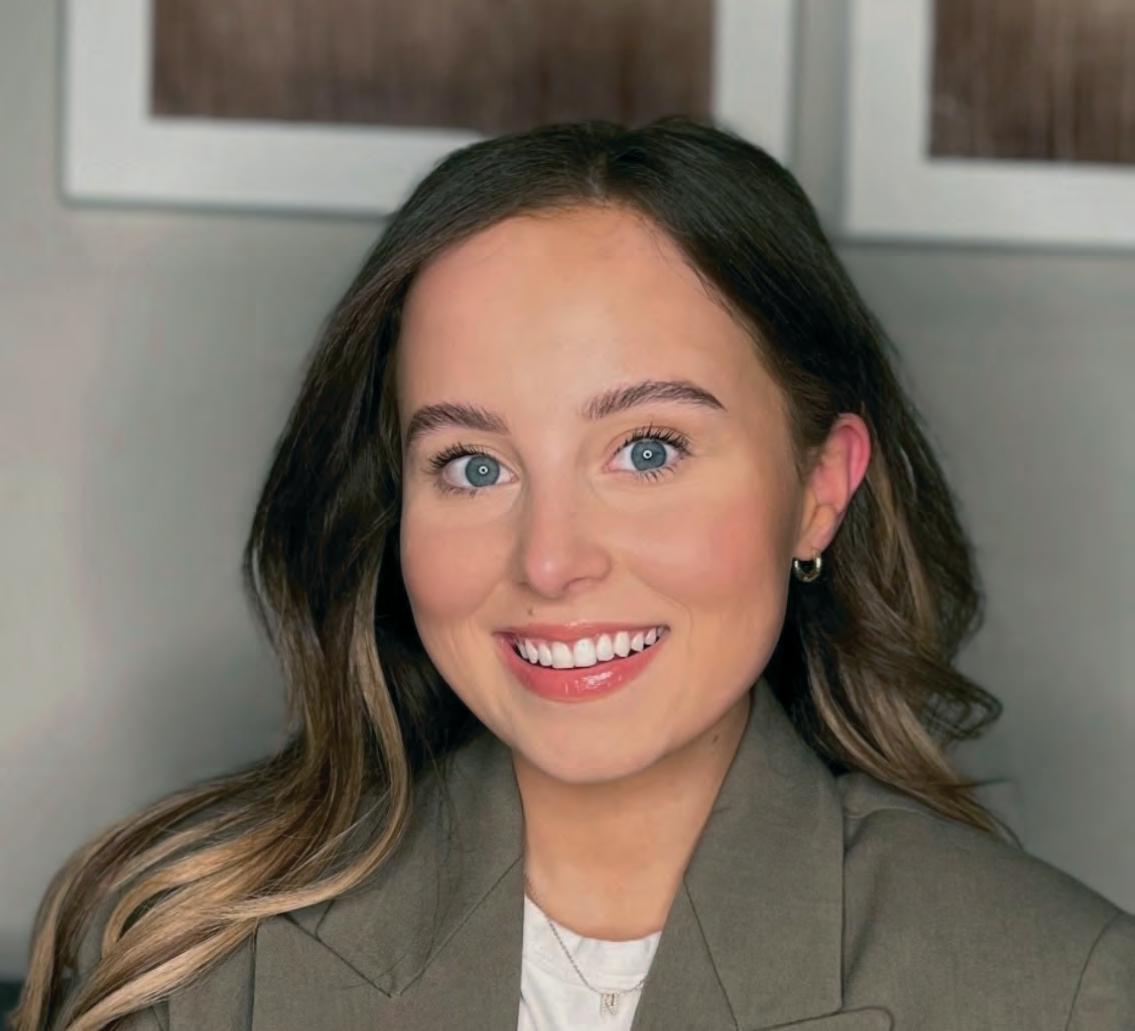
I grew up around a family business, so I’ve always had an interest in the world of business. Over time, I realised I really enjoyed the creative side and loved working with people. This naturally led me to marketing.
I began helping with social media marketing in my teens, and it quickly felt like something I wanted to pursue long term. The combination of marketing and sales in this course was a big plus, as it provided a well-rounded view of the industry.
When I researched ATU, I was particularly drawn to the programme and its wide range of modules. I could also see that there were numerous opportunities to gain hands-on experience, which was very important to me.
AU631 | Level 8 | Bachelor of Arts (Honours)
AU531 | Level 7 | Bachelor of Arts
These programmes are for students who want to shape the future of food and become Ireland’s top culinary graduates and food entrepreneurs. Students will develop an appreciation for sustainable gastronomy, understand the importance of ethical food sourcing and local ingredients, and embrace contemporary food trends. They will develop key skills in food product development and food entrepreneurship, leading to exciting career opportunities.
atu.ie/AU631
atu.ie/AU531
3/4 Years
281 (Level 8 2024)
232 (Level 7 2024)
Minimum Entry Requirements
64 Places
Work Placement Erasmus+
Galway International Hotel School Office gihs.galwaymayo@atu.ie
Sustainability principles have been embedded within our programmes as a core ethos. The learning on this course reflects and challenges industry trends and ensures students are equipped with a broad range of practical and academic modules to enhance their employability across the broader food industry. Graduates from this programme enter a field with an extensive range of exciting career opportunities, both at home and abroad.
Graduates of these programmes have excellent employment opportunities, in all aspects of the food industry in Ireland and internationally. Graduate opportunities include employment in professional kitchens, in food compliance and safety, food styling, food enterprise development, food production management, food manufacturing, and postgraduate research.
Upon successfully completing 3 years of study, (Level 7) students can apply internally for Year 4 (Level 8). ATU Level 8 qualifications are recognised worldwide for postgraduate entry.
Guest speakers from leading industries are a regular feature of these programmes. Field trips include visits to top local and national restaurants, Michelinrecommended eateries, food tours, breweries, farms, and food producers. In the fourth year, students can visit an internationally renowned gastronomic destination as part of their International Study Tour module.
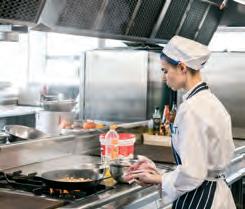
Year 1
• Culinary Skills and Service
• Sustainable Food Practices
• The Art of Pastry, Baking and Desserts
• Introduction to Food Science and Nutrition
• Academic and Professional Skills
• Preparation for Work Placement
• Summer 12-week work placement
Year 2
• Creative Cooking and Service
• The Art of Pastry and Baking
• Food Science and Technology
• Food for Health and Well-being
• Workplace Culture
• Modern Gastronomy
• Placement Reporting and Reflection
Year 3
• Work Based Learning –30-week Industry Placement
• Food Product Innovation
• Food Safety Management Systems
• Sensory and Consumer Science
• Advanced Food Science –Food Processing
• Fundamentals of Food Microbiology and Analysis
Year 4 (Level 8)
• International Study Tour
• Applied Research Project
• Strategic Industry Management Seminars
• Sustainable Food Packaging
• Food Legislation or Regulatory Affairs
• Advanced Food Science – Food commodities and Ingredients
• Flavour Science
• Sensory Analysis for New Food Product Development
• Food Product Development
Additional elective modules are available throughout the programme.
This programme provides students with the key skills, knowledge and competencies required to work as chefs in a professional kitchen. Designed for students interested in shaping the future of food, learners will acquire and develop both theoretical knowledge and specialised culinary skills through creative and technical competencies, all within a realistic learning environment. Students will gain an understanding and appreciation for gastronomy, the importance of sourcing ethically produced food, respecting local ingredients and traditions, while embracing contemporary food trends.
atu.ie/AU429
2 Years
216 (Level 6 2024)
Minimum Entry Requirements
32 Places
Work Placement
Galway International Hotel School Office gihs.galwaymayo@atu.ie
This recently redesigned culinary programme reflects industry trends and modern technology, equipping students for successful careers in the food industry. Sustainability principles are core to the programme, addressing climate action through responsible sourcing and reduced waste. Students learn from both practical and academic modules to enhance employability across diverse career opportunities. Year 1 and 3 work placements develop skills relevant to chosen pathways.
Graduates will have excellent employment opportunities, in all aspects of the food industry in Ireland and abroad. Graduates can be employed as Commis-Chef and with relevant industry experience, may progress to become Chef de Partie, Sous-Chef or Head Chef in a professional kitchen.
Guest lectures and field trips are at the core of the teaching on the programme and are attached to many modules to enhance the application of the learning. Field trip destinations include local and nationally profiled restaurants of best practice, Michelin-recommended restaurants, food tours, breweries, farms and food producer visits and Bia Innovator campus.
Year 1
• Culinary Skills and Service
• Sustainable Food Practices
• The Art of Pastry, Baking and Desserts
• Introduction to Food Science and Nutrition
• Academic and Professional Skills
• Preparation for Work Placement
• Summer 12-week work placement
Year 2
• Creative Cooking and Service
• The Art of Baking, Pastry and Desserts
• Food Science and Technology
• Food for Health and Well-being
• Workplace Culture
• Modern Gastronomy
• Placement Reporting and Reflection
• Work Based Learning – 30-week Industry Placement
(Students progressing into Year 3 will undertake a 30-week international industry work placement following successful completion of Year 2).
In addition to the mandatory modules listed, elective modules including languages, are available throughout the programme.
Level 6 graduates may apply internally for Year 3 of the Level 7 programme, Bachelor of Arts in Gastronomy Science and Food Innovation. Level 7 graduates may apply internally for Year 4 of the Level 8 programme, Bachelor of Arts (Honours) in Gastronomy Science and Food Innovation.
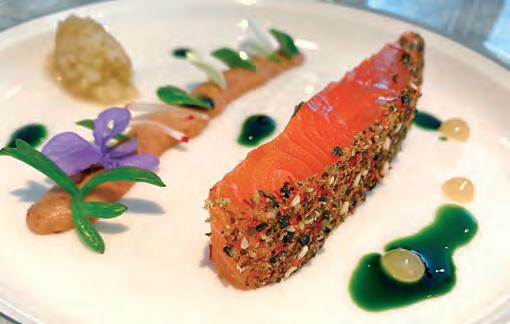
• International Tourism Management
• International Hotel and Hospitality Management
• Event Management with Public Relations
The Tourism, Hospitality, and Event Management industries form the largest service sector worldwide, offering a multitude of career opportunities. The common entry programme in these fields is designed to give students the opportunity to experience an introduction to the vast and diverse nature of each industry. Following first year, students have the flexibility to then stream into the Level 8 programme of their choice within their chosen discipline. This structure ensures that graduates are well-prepared for successful and varied careers.
atu.ie/AU532
3 Years
224 (Level 7 2024)
Minimum Entry Requirements
50 Places
Work Placement
Erasmus+
Galway International Hotel School
gihs.galwaymayo@atu.ie

The common entry programme invites students to discover the aspects of the Tourism, Hospitality and Event Management that they excel at and enjoy the most. More than half of the student’s time will be spent in practical subjects, learning the diverse skills required to work in these global industries. This allows for specialisation from Year 2 into the area of most interest to the student.
Our graduates are in high demand, with exciting career opportunities worldwide. They possess a range of specific and transferable skills, enabling them to enter their preferred industry. Depending on your chosen degree, roles vary from marketing, finance, HR, management, PR and entertainment enterprises, conferences and convention centres, non-profit organisations, tourism organisations, hotels, arts, and music festivals, visitor attractions, tourism agencies, transport operators, tour guiding, visitor information centres, and much more.
• Industry Skills
• Introduction to Hotel, Hospitality and Tourism Industry
• Introduction to Event Industry
• Introduction to Public Relations
• Essentials of Business
• Information and Digital Technologies
• Academic and Professional Skills
Additional elective modules are available throughout the programme.
After successfully completing Year 1, students progress into Year 2 of one of the following programmes:
• International Tourism Management
• International Hotel and Hospitality Management
• Event Management with Public Relations
ATU Level 8 qualifications are recognised worldwide for postgraduate entry including a MSc. in Sustainable Tourism and Event Management (Level 9) in ATU Galway.
Students will experience a range of field trips and guest speakers in the first year to further inform them on future career opportunities.
The travel and tourism industry is exciting and diverse. This programme is designed to equip students with the necessary skills, knowledge, and experience to pursue a successful management or business career in both the domestic and international tourism industry. The integrated work placement enables students to apply and develop skills and knowledge at both operational and supervisory management levels, giving first-hand experience of the challenges, demands, and rewards of working in this exciting and ever-changing industry.
atu.ie/AU628
4 Years
289 (Level 8 2024)
Minimum Entry Requirements
25 Places
Work Placement
Erasmus+
Galway International Hotel School Office gihs.galwaymayo@atu.ie
The inclusion of the Fáilte Ireland Certified Regional and National Guiding Certificates greatly enhances the employability of graduates of the programmes. In addition, students will learn to use the Galileo international travel booking system, used by tour operators across the globe.
Graduates of this programme can pursue successful careers in the Fáilte Ireland Graduate Programme, visitor attractions, tourism agencies, transport operators, tour guiding, visitor information centres, festival and event management and hospitality operations in Ireland and overseas.
ATU Level 8 qualifications are recognised worldwide for postgraduate entry.
Field trips are at the core of teaching on the programme, linking with modules to enhance the application of learning. Destinations include the Aran Islands, Connemara, Dublin, Clonmacnoise, Newgrange, the Burren and the Cliffs of Moher. International study tour destinations in Year 4 vary each year, and have included Lisbon, Rome, Switzerland, and Berlin.
Students who successfully complete the Regional Guiding and National Guiding modules can be certified with Fáilte Ireland Regional and National Guiding Certificates.

Year 1
• Industry Skills
• Introduction to Hotel, Hospitality and Tourism Industry
• Introduction to Event Industry
• Introduction to Public Relations
• Essentials of Business
• Information and Digital Technologies
• Academic and Professional Skills
Year 2
• Regional Guiding
• International Tourism Geography and Travel Trade
• Financial Accounting
• Marketing Principles
• International Tourism Impacts and Trends
• Management Principles
• Business and Consumer Law
• Work Based Learning (30-week Industry Placement)
• National Guiding
• Management Accounting
• Human Resource Management
• Services Marketing
• Tourism Economics
Year 4
• International Study Tour
• Applied Research Project
• Strategic Industry Management Seminars
• Sales and Marketing Management
• Tourism Policy, Planning and Strategies
• Tourism Transport Management
• Sustainable Hospitality and Tourism Management
Additional elective modules are available throughout the programme.
This programme is designed to equip students with the necessary skills, knowledge and experience to pursue a successful career in management and business in both the domestic and international hotel and hospitality industry. Teaching is delivered through a range of practical and academic modules, supported by regular field trips. The integrated work placement enables students to apply and develop skills and experience at both operational and supervisory management levels, experiencing first-hand the challenges and rewards of working in this exciting industry.
atu.ie/AU630
4 Years
288 (Level 8 2024)
25 Places Minimum Entry Requirements
Work Placement
Erasmus+
Galway International Hotel School Office gihs.galwaymayo@atu.ie
Field trips are at the core of the teaching on the programme to enhance the practical application of learning. Destinations include Ashford Castle, Adare Manor, Guinness Storehouse, Jameson Distillery, Airbnb, etc. International Study Tour destinations (Year 4) vary each year and have included Lisbon, Rome, Switzerland, and Berlin.
Graduates will have excellent employment opportunities, at various levels of employment, in all aspects of the hospitality and tourism industry at home and abroad. Alternatively, graduates may specialise in specific areas such as marketing, finance, human resources, operations management to name but a few within the service industries.
ATU Level 8 qualifications are recognised worldwide for postgraduate entry.
Year 4 students participate in the annual IHI Management Games, competing against students from various Irish colleges. ATU students have been regular winners of the competition in recent years.
Year 1
• Industry Skills
• Introduction to Hotel, Hospitality and Tourism Industry
• Introduction to Event Industry
• Introduction to Public Relations
• Essentials of Business
• Information and Digital Technologies
• Academic and Professional Skills
Year 2
• Menu Management and Contemporary Service Techniques
• Rooms Division Management
• Financial Accounting
• Marketing Principles
• Fundamentals in Culinary Skills
• Culinary Skills for Hospitality Managers
• Management Principles
• Business and Consumer Law
• Work Based Learning (30-week Industry Placement)
• Strategic Management for Hospitality
• Management Accounting
• Human Resource Management
• Services Marketing
• Tourism Economics
• International Study Tour
• Applied Research Project
• Strategic Industry Management Seminars
• Hotel Revenue and Distribution Management
• Sales and Marketing Management
• Employee Resourcing
• Performance Management and Decision Making
• Strategic Decision-Making
Additional elective modules are available throughout the programme.
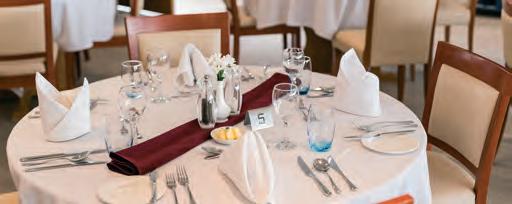
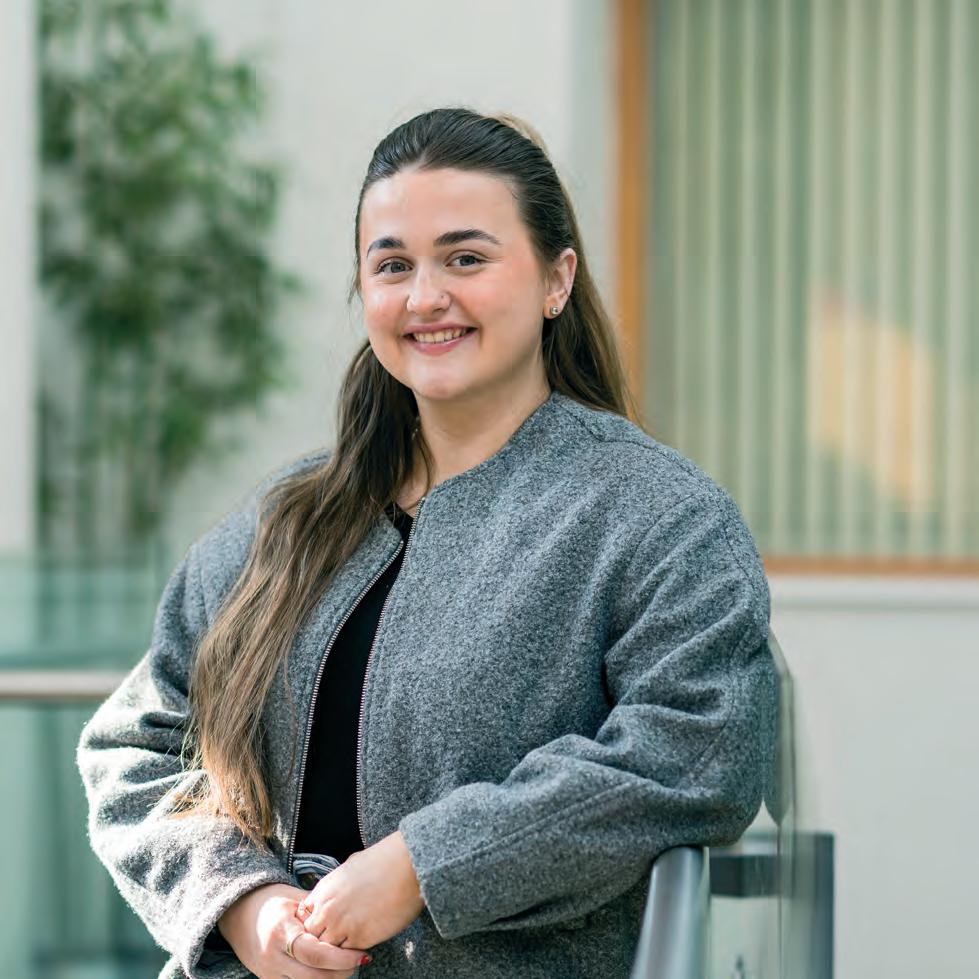
While exploring college courses, I came across International Hotel and Hospitality Management at ATU. I attended an open day and met past students and lecturers, which really sealed the deal for me. Now I’m in the second year of that same programme and enjoying every day of it!
It’s inspiring to learn from people who were once in my shoes, picking up tips and habits that I know I’ll carry into the future. For my first-year placement, I was at The Lodge at Ashford Castle, where I gained valuable knowledge and met some of the kindest people. These are connections I know will stay with me for years to come.
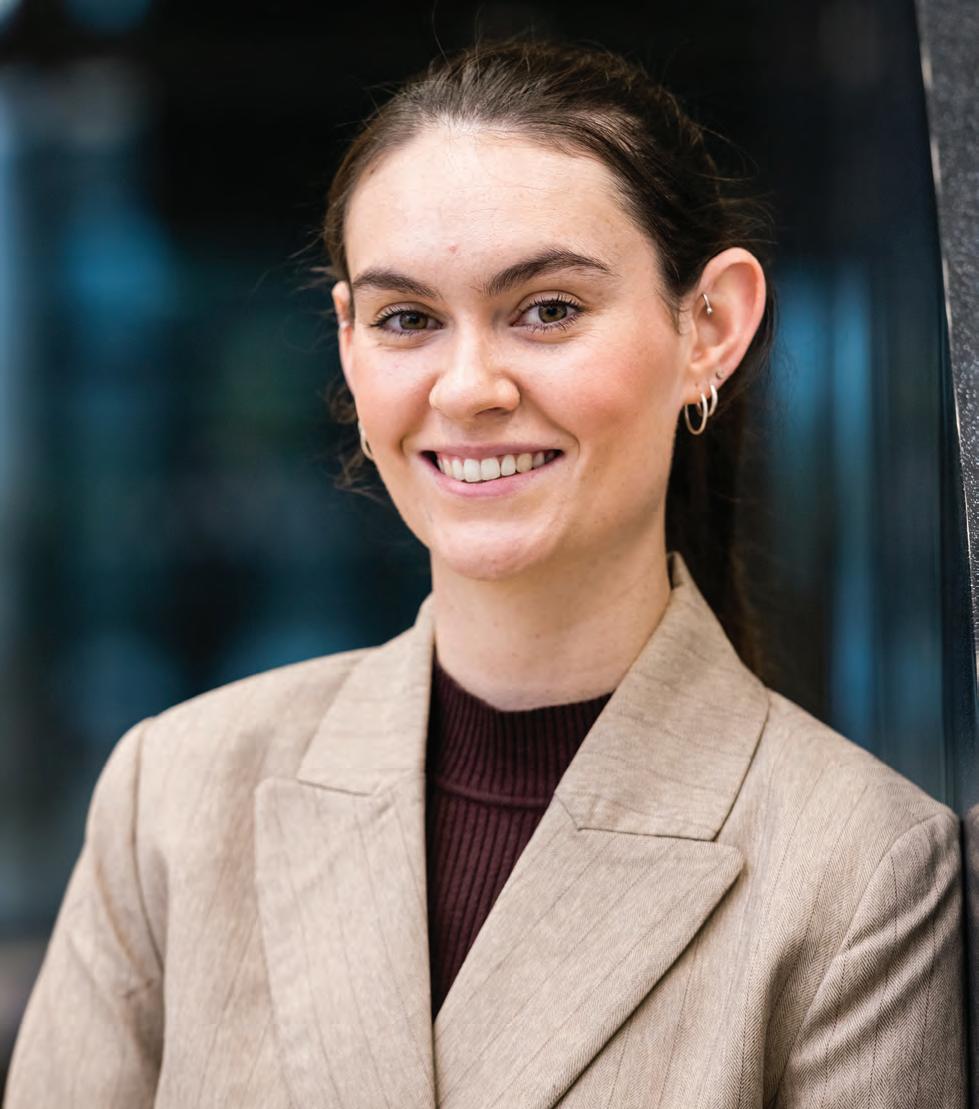
I loved the small class sizes. I knew I wouldn’t do as well in a large lecture hall, being one of a hundred students, so the smaller class suited my learning style much better.
There was also a mix of theory and practical classes, so I wasn’t just learning — I was learning by doing. The lecturers were always so helpful, and it was clear they wanted the best for their students.
This programme is designed to provide relevant and professional education for students on all aspects of the planning, marketing and management of events and public relations in this multifaceted industry. Graduates pursue successful careers in management and business in both the domestic and international event management industry. The integrated work placement enables students to apply and develop skills and experience at both operational and supervisory management levels, experiencing first-hand the challenges and rewards of working in this exciting and ever-changing industry.
atu.ie/AU629
4 Years
280 (Level 8 2024)
25 Places Minimum Entry Requirements
Work Placement
Erasmus+
Galway International Hotel School Office gihs.galwaymayo@atu.ie
Students will engage in a variety of field trips and events, both at home and abroad including the Galway International Arts Festival, Connacht Rugby, Aviva Stadium, Croke Park, Ploughing Championships, Dublin – Guinness Storehouse, Jameson Distillery, Airbnb, etc. International Study Tour destinations (Year 4) vary each year and have included Lisbon, Rome, Switzerland, and Berlin.
Graduates can expect to find employment in a variety of event, PR and entertainment enterprises; including conferences and convention centres, charitable non-profit organisations, national and regional tourism organisations, hotels, public relations firms, event management agencies, sports and leisure centres, community development organisations, arts and music festivals, multinational companies and public sector organisations.
ATU Level 8 qualifications are recognised worldwide for postgraduate entry.
Galway is regarded as the festival capital of Ireland, with a year-round calendar filled with vibrant events. Students of this course regularly partake and volunteer in these events throughout the year, giving valuable experience to support the learning on the programme.
Year 1
• Industry Skills
• Introduction to Hotel, Hospitality and Tourism Industry
• Introduction to Event Industry
• Introduction to Public Relations
• Essentials of Business
• Information and Digital Technologies
• Academic and Professional Skills
Year 2
• Workplace Culture
• Food for Health and Wellbeing
• Conference and Exhibition Management
• Financial Accounting
• Marketing Principles
• Public Relations Techniques
• Event Risk Management
• Event Management
• Management Principles
• Business and Consumer Law
Year 3
• Work-Based Learning – 30-week Industry Placement
• Event Planning Management
• Public Relations Management
• Management Accounting
• Human Resource Management
• Services Marketing
• Tourism Economics
Year 4
• International Study Tour
• Applied Research Project
• Strategic Industry Management Seminars
• Sales and Marketing Management
• Event Strategy and Policy
• International Perspectives of Festival and Events
• Performance Management and Decision Making
• Public Relations Project
• Event Project Management
In addition to the mandatory modules listed, elective modules including languages, are available throughout the programme.
The travel and tourism industry is exciting and varied. This programme equips students with the skills, knowledge, and experience needed for a successful tourism career. Through integrated work placements, students experience the industry’s challenges, demands, and rewards first-hand. They also participate in numerous field trips, which support university-based learning activities, providing practical, hands-on experience that compliments their academic studies.
atu.ie/AU426
2 Years
214 (Level 6 2024)
Minimum Entry Requirements
40 Places
Galway International Hotel School Office gihs.galwaymayo@atu.ie Work Placement
Upon completion of this programme, you will be capable of undertaking a wide range of roles within the tourism industry both at home and abroad. The programme will also provide a foundation for the development of entrepreneurial activities. The inclusion of modern European languages will also aid students’ mobility within the European Union and further afield.
Students who successfully complete Year 2 will graduate with a Level 6 Higher Certificate in Tourism. They can then apply internally for entry into Year 3 of the Level 8 BA (Hons) in International Tourism Management. Students who successfully complete Year 3 can progress to Year 4 of the Level 8 to gain a BA (Hons) in International Tourism Management.
Field trips are at the core of teaching on the programme, linking with modules to enhance the application of learning.
Destinations include the Aran Islands, Connemara, Dublin, Clonmacnoise, Newgrange, the Burren and the Cliffs of Moher.
Following the successful completion of Year 1, students on this programme may choose to transfer to other programmes within the same discipline, Event Management with Public Relations or International Hotel and Hospitality Management. The student would transfer at the same level and may need to take a ‘bridging module’ in Year 2 in lieu of the elective choices.

• Industry Skills
• Introduction to Hotel, Hospitality and Tourism Industry
• Introduction to Event Industry
• Introduction to Public Relations
• Essentials of Business
• Information and Digital Technologies
• Academic and Professional Skills
Year 2
• Regional Guiding
• International Tourism Geography and Travel Trade
• International Tourism Impacts and Trends
• Financial Accounting
• Marketing Principles
• Management Principles and Practice
• Business and Consumer Law
• Summer 12-week international work placement (for students progressing into Year 3)
Additional elective modules are available throughout the programme.
Students who successfully complete the Regional Guiding and National Guiding modules can be certified with Fáilte Ireland Regional and National Guiding Certificates.

Heritage is anything from the past that people identify with, or something handed down through generations. Heritage is also concerned with how the past shapes the present and future. This programme is designed to equip students with the knowledge, skills, and experience for a rewarding career in the heritage sector or related areas. The programme’s focus is applied, dynamic, and multidisciplinary – drawing insights from heritage and related fields such as archaeology, history, geography, ecology, literature, tourism, digital heritage, and museology.
atu.ie/AU625
4 Years
337 (Level 8 2024)
Minimum Entry Requirements
25 Places
Work Placement
Erasmus+
Programme Chair
Dr Mark Mc Carthy
mark.mccarthy@atu.ie
Students learn through a lively and practical hands-on learning experience. In-person lectures and classroom discussions are supplemented by field trips to heritage sites and museums throughout Ireland and Berlin, Germany. Learning also takes place by means of library work, labs, and online Virtual Learning Environments (VLEs). Research-informed teaching, Work-Integrated Learning (WIL), and the United Nations Sustainable Development Goals (SDGs) are important aspects of this programme.
Diverse career opportunities exist in the heritage sector and beyond, including: archaeology, archives, biodiversity, business, civic trusts, government departments, creative and cultural industries, conservation and restoration, digital media, environmental consultancies, family history centres, genealogy, guiding, heritage (agencies, centres, and consultancies), hospitality, journalism, lecturing, libraries, local and regional authorities, museums, national parks, NGOs, planning, research, rural and community development, start-up enterprises, teaching (primary and post-primary), and tourism.
Level 8 graduates are eligible to apply for many postgraduate programmes worldwide, including the Professional Master of Education (for primary or post-primary teacher training) and ATU’s Level 9 MA and Level 10 PhD in Heritage Studies (by Research).
Students can study abroad for one or two semesters with our partners in Europe and the USA. Students who successfully complete the Regional Guiding and National Guiding modules can be certified with Fáilte Ireland Regional and National Guiding Certificates.

Year 1
• Ireland’s Linguistic Traditions
• Irish and European History, 400-1200
• Earth Processes and Landforms
• Information Technology for Heritage Studies
• Academic and Professional Skills
• Rural Field Studies
• Reading Irish Literature
• Introduction to Archaeology and Built Heritage
• Irish and European History, 1200-1600
Year 2
• Irish Folklore
• Biogeography and Natural History
• Modern Irish History and Memory
• Digital Heritage Tools
• Urban Field Studies
• Later Modern International History and Memory
• European History Field Studies
• History of Art and Design
• Archaeology and Built Heritage of Rural Ireland
Year 3
• Museology: Principles and Practice
• Ireland’s Literary Heritages
• Digital Heritage Tools
• Irish Local History and Genealogy
• Ecology and Environmental Sustainability
• Irish Artefactual Archaeology
• and Heritage
• Museums: Management and Design
• Geographic Information Systems
• Research Methods
• Historical Geography
Year 4
• Dissertation
• Geography, Planning and Climate Heritage
• Digital Surveying and Field Evidence
• Irish Traditional Music: History and Heritage
• Irish Historiography
• Heritage Tourism
• Irish Cinematic History and Cultural Identity
• Curatorial Practice and Project Management
Additional elective modules are available throughout the programme.
Heritage is anything from the past that people identify with, or something handed down through generations. Heritage is also concerned with how the past shapes the present and future. This programme is designed to equip students with the knowledge, skills, and experience for entry-level positions in the heritage sector or related areas. The programme’s focus is applied, dynamic, and multidisciplinary – drawing insights from heritage and related fields such as archaeology, history, geography, folklore, literature, tourism, and information technology.
atu.ie/AU425
2 Years
250 (Level 6 2024)
Minimum Entry Requirements
25 Places
Work Placement
Programme Chair
Dr Mark Mc Carthy mark.mccarthy@atu.ie
Students learn through a lively and practical hands-on learning experience. In-person lectures and classroom discussions are supplemented by field trips to heritage sites and museums throughout Ireland and Berlin, Germany. Learning also takes place by means of library work, labs, and online Virtual Learning Environments (VLEs). Research-informed teaching and the United Nations Sustainable Development Goals (SDGs) are important aspects of this programme.
This programme will appeal to students seeking a shorter period of study for operational roles in the heritage sector and related areas, including: OPW Heritage Guide (at heritage sites), Tour Guide (with coach and walking tour companies), General Operative Archaeologist; Library Assistant; Local Authority Clerical Officer; and Research Assistant (on projects in heritage, public history, and community archaeology).
Students who successfully complete Year 2 will graduate with a Level 6 Higher Certificate in Heritage. They can apply internally for entry into Year 3 of the Level 8 BA (Hons) in Heritage. Students who successfully complete Year 3 can then progress to Year 4 of the Level 8 to gain a BA (Hons) in Heritage.
Students who successfully complete the Regional Guiding and National Guiding modules can be certified with Fáilte Ireland Regional and National Guiding Certificates.

• Ireland’s Linguistic Traditions
• Irish and European History, 400-1200
• Earth Processes and Landforms
• Information Technology for Heritage Studies
• Academic and Professional Skills
• Rural Field Studies
• Reading Irish Literature
• Introduction to Archaeology and Built Heritage
• Irish and European History, 1200-1600
• Irish Folklore
• Biogeography and Natural History
• Modern Irish History and Memory
• Digital Heritage Tools
• Urban Field Studies
• Later Modern International History and Memory
• European History Field Studies
• History of Art and Design
• Archaeology and Built Heritage
Additional elective modules are available throughout the programme.
BA (Hons) Gastronomy Science and Food Innovation Eliška
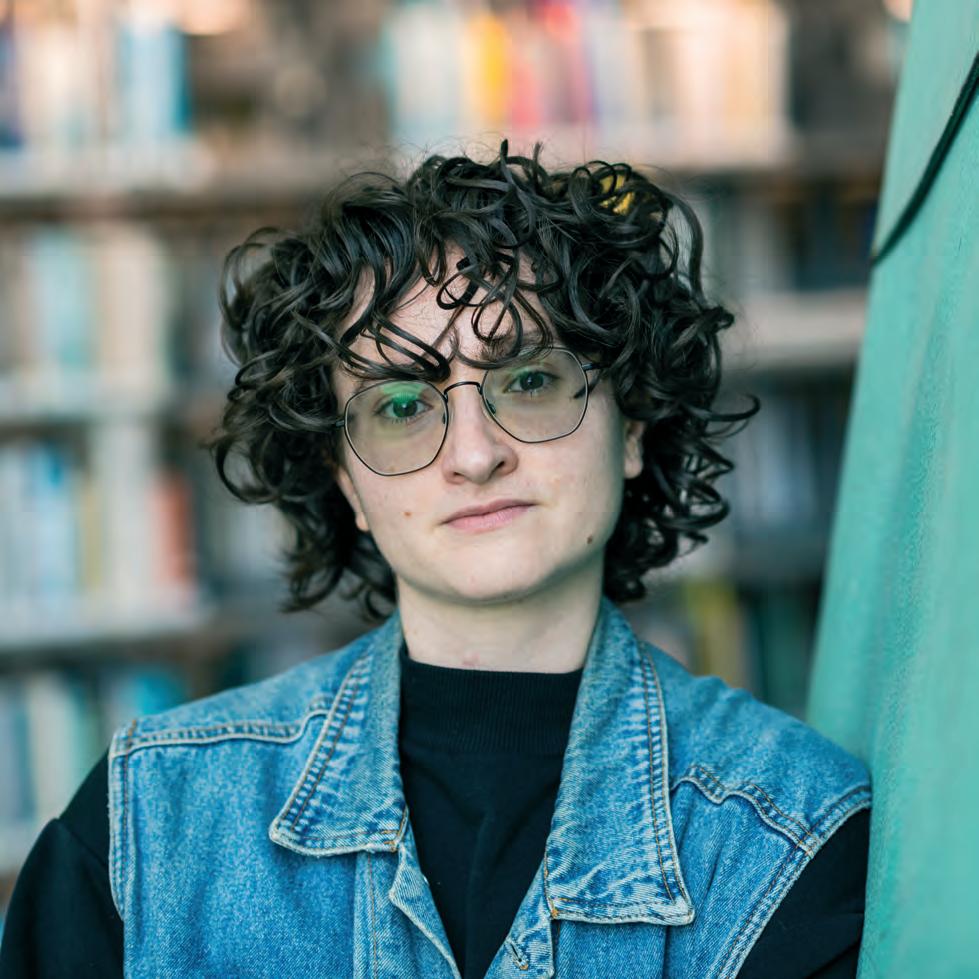
I’ve always been a foodie. I chose ATU because it offers a broad range of modules focusing on different aspects of Gastronomy, which was perfect for someone like me who wasn’t completely sure about my future career path. I also appreciated that the programme included two work placements, providing me with the opportunity to gain hands-on experience in the industry during my studies.
ATU provides a supportive environment where you can grow both academically and personally. The lecturers are approachable, the sense of community is strong, and there are plenty of opportunities to get involved, whether through work placements, events, or competitions. If you’re open to learning and getting involved, you’ll make the most out of your time here.
AU637 | Level 8 | Bachelor of Science (Honours)
AU537 | Level 7 | Bachelor of Science
An Architectural Technologist is a highly skilled technical design professional. This Chartered Institute of Architectural Technologists (CIAT) and Royal Institute of the Architects of Ireland (RIAI) accredited programme delivers a practical, applied learning experience, encouraging a strong work ethic in all years. A studio environment is used to deliver the practical modules using 2D and 3D modelling to develop sustainable design solutions.
atu.ie/AU637
atu.ie/AU537
3/4 Years
327 (Level 8 2024)
255 (Level 7 2024)
Minimum Entry Requirements PLUS
• O6/H7 Maths
40 Places
Work Placement
Gerard Nicholson Programme Chair gerard.nicholson@atu.ie
Students take part in a full semester placement in Year 3. This enables students to put the skills learned in the classroom into professional work practice.
This programme responds to the rapidly developing technical environment of architecture worldwide, developing strong analytical and research skills. It equips learners with a strong, flexible and adaptable skill set which is suited to a variety of careers in architectural private practices, industry, research, design and consulting teams or academia.
Upon successfully completing Year 3, Level 7 students can apply internally to study Year 4 of the Level 8 programme to gain a BSc (Hons) in Architectural Technology qualification.
ATU offer a wide range of postgraduate programmes. ATU qualifications are recognised worldwide for further study and postgraduate entry.
The Level 8 programme is professionally accredited by the Royal Institute of the Architects of Ireland (RIAI), the Chartered Institute of Architectural Technologists (CIAT) and the Chartered Association of Building Engineers (CABE) provides worldwide recognition.



Year 1
• Detail and Design Studio 1
• Architectural Technology and Services 1
• Computer Aided Design (CAD) 1
• Construction Materials
• History of Western Architecture
• Architectural Graphics and Communication 1
• Mathematics
• Academic and Professional Skills
Year 2
• Detail and Design Studio 2
• Architectural Technologies and Services 2
• Building Information Modelling and Computer Aided Drawing 2
• History and Conservation of Irish Architecture
• Building Surveying
• Structural Element Design
• Architectural Graphics and Communication 2
Year 3
• Detail and Design Studio 3
• Advanced Architectural Technologies
• Building Information Modelling (BIM) 3
• Environmental Building Systems
• Professional Practice and Law
• Work Placement (Semester 6)
Year 4 (Level 8)
• Detail and Design Studio 4
• Innovative Architectural Technologies
• Professional Practice – Contract and Procurement
• Building Information Modelling (BIM) 4
• Technical Research Paper
Additional elective modules may be available throughout the programme.
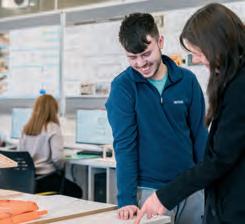
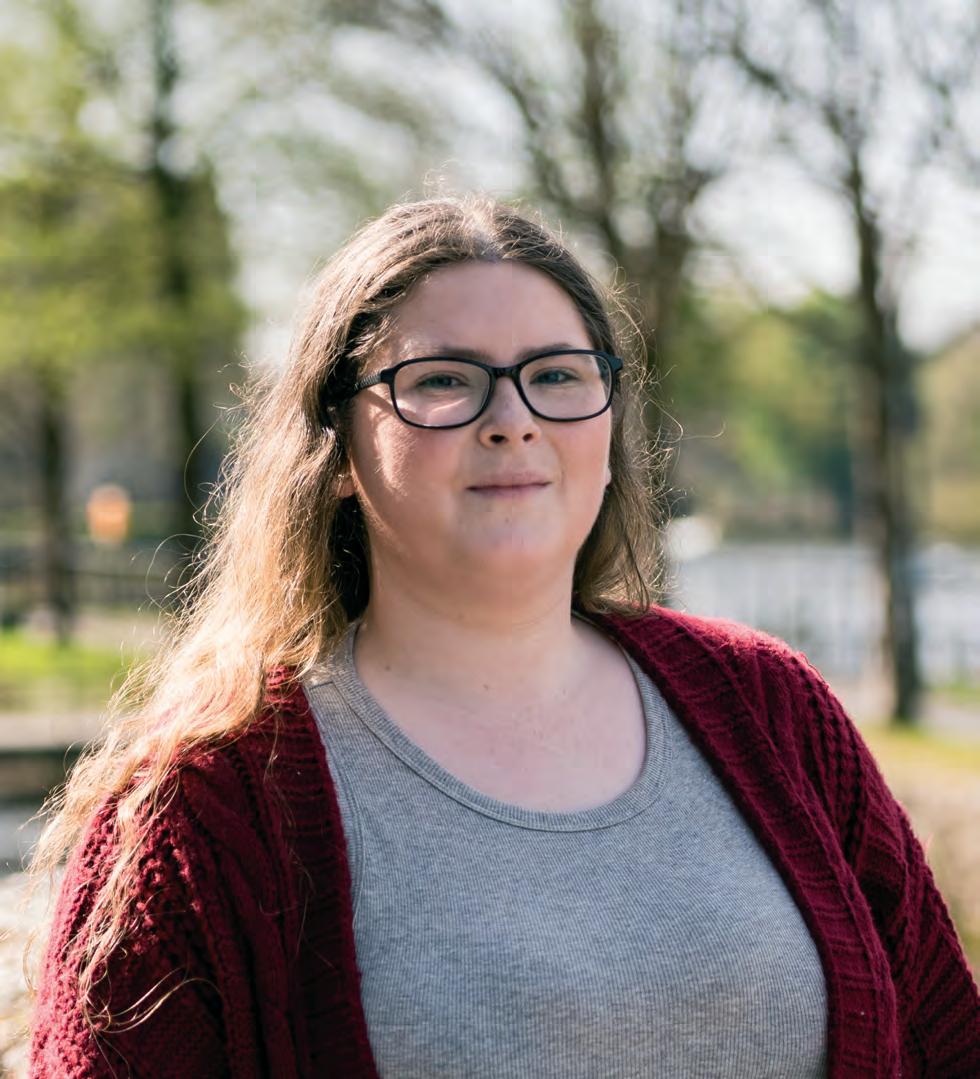
I chose ATU because it was closer to home, and I was drawn to the welcoming environment and the support offered by student services.
Another reason was the people I met during the Open Day. They gave a campus tour and shared useful information about the university and their own student experiences. The tour guide was a current student, which I found especially helpful.
AU638 | Level 8 | Bachelor of Engineering (Honours)
AU538 | Level 7 | Bachelor of Engineering
Civil Engineering is probably the most recognisable type of engineering, as its impact is visible to us every day. It focuses on designing, building, and maintaining the infrastructure that supports modern life, from roads and bridges to water systems and buildings. Civil engineers play a vital role in shaping, enhancing, and protecting the environment we live in, ensuring that the spaces we rely on for living, working, and transportation are safe, efficient, and sustainable.
atu.ie/AU638
atu.ie/AU538
3/4 Years
410 (Level 8 2024)
302 (Level 7 2024)
• O4/H7 Maths
48 Places Minimum Entry Requirements PLUS
Work Placement Erasmus+
Dr Noelle Jones Programme Chair noelle.jones@atu.ie
Civil Engineers have a creative, diverse, and challenging career, making a real contribution to the needs of both modern and developing societies worldwide. Graduates of Civil Engineering are in high demand in the profession in Ireland and worldwide. The Level 8 programme is accredited by the professional body of Engineers Ireland (EI) as an Associate Engineer (AEng). The honours degree is also accredited by the Chartered Association of Building Engineers (CABE). In addition, it is fully recognised by the Chartered Institute of Building (CIOB) and provides professional recognition worldwide.
Graduates of Civil Engineering will possess the technical and managerial skills necessary to enter professional careers in industry, research, design and consulting teams or academia.
Upon successfully completing Year 3, Level 7 students can apply internally to study Year 4 of the Level 8 programme to gain a BEng (Hons) in Civil Engineering qualification.
ATU offers a wide range of postgraduate programmes. ATU qualifications are recognised worldwide for further study and postgraduate entry.
The Level 8 programme is professionally accredited by the CIOB, CABE and associate accreditation with Engineers Ireland.
Year 1
• Surveying for Civil Engineering
• Construction Technology and Building Services
• CAD
• Health and Safety in the Built Environment
• Structural Mechanics
• Mathematics for Civil Engineering 1
• Engineering Science and Chemistry
• Construction Materials and Concrete Technology
• Academic and Professional Skills
• Geomechanics and Ground Construction Technology
• Surveying for Civil Engineering
• Mathematics for Civil Engineering 2
• Structural Design and Detailing
• Infrastructural Engineering
• Water Analysis and Protection
• Civil Engineering Measurement and Procurement
• CAD/BIM
• Hydraulics 1
• Public Health Engineering
• Surveying and Digital Terrain Modelling
• Structural Analysis and Design
• Construction Management Law and Procurement
• Mathematics for Civil Engineering 3
• Work Placement (Semester 6)
Year 4 (Level 8)
• Integrated Project
• Advanced Civil Engineering Software
• Engineering Hydrology
• Structural Scheme Design


• Environmental Engineering
• Geotechnical Engineering
• Environmental and Energy Sustainability
• Project Management
• Hydraulics 2
Additional elective modules may be available throughout the programme.
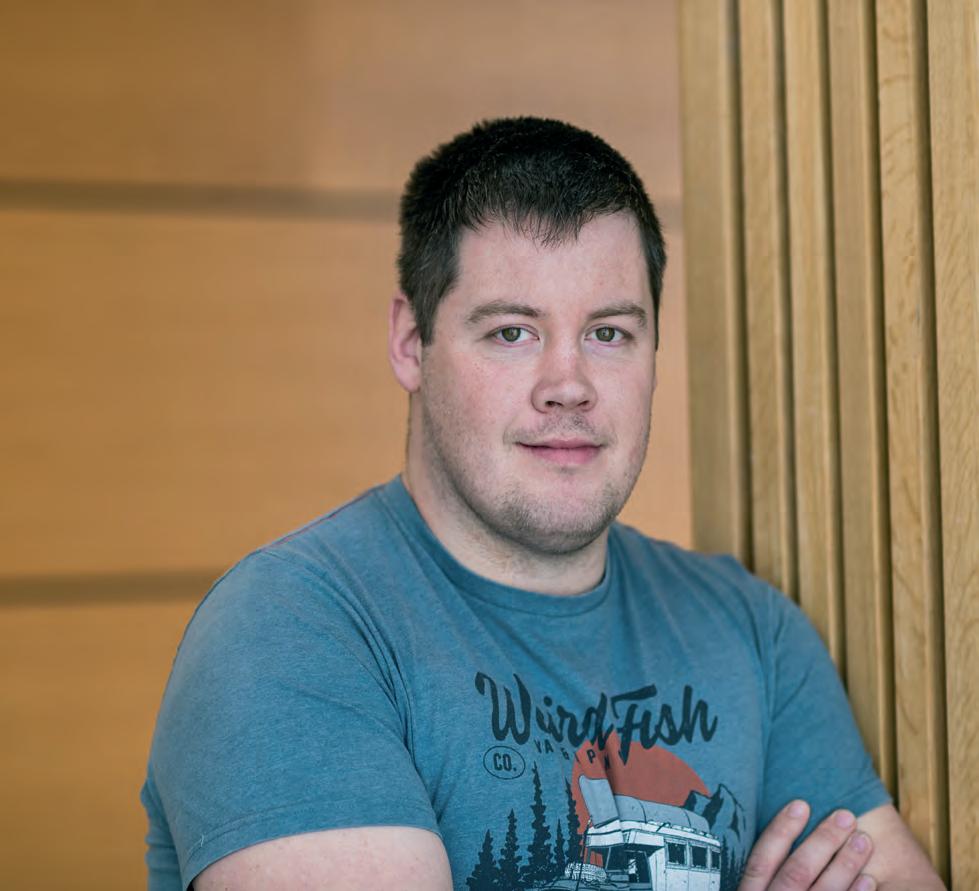
I’m a mature student who previously worked as a machine operator and groundworker before returning to education 12 years after finishing secondary school in 2009. After speaking with past graduates, I felt that the Civil Engineering course at ATU would suit me, given my practical background and the direction I wanted to take in my career.
I was worried about returning to maths, but a short conversation with the lecturer settled my nerves. Her guidance really helped me stay focused and work hard, and I eventually achieved strong grades in the subject. My advice is to focus on your continuous assessment — submit good work and build up your marks throughout the semester. It really helps take the pressure off when exams come around.
AU535 | Level 7
Construction Management is a rewarding career that turns designs into real buildings, roads, or bridges. Managers efficiently organise people, materials, and equipment. They possess strong communication and people skills to direct projects. A five-month work placement in Year 3 offers students firsthand industry experience, showcasing the profession’s challenges and opportunities.
atu.ie/AU635
atu.ie/AU535
3/4 Years
332 (Level 8 2024)
262 (Level 7 2024)
Minimum Entry Requirements PLUS
• O6/H7 Maths
48 Places
Work Placement
Michelle Fahey Programme Chair michelle.fahey@atu.ie
Our Construction Management graduates are educated and trained to be well-organised professionals who can control, direct, lead and motivate the range of people and organisations involved in construction projects.
There are great career prospects in Ireland and across the world. Graduates work on-site and in professional office environments with building and civil engineering contractors and project management practices.
Upon successfully completing Year 3, Level 7 students can apply internally to study Year 4 of the Level 8 programme for the BSc (Hons) in Construction Management qualification.
ATU offers a wide range of postgraduate programmes. ATU qualifications are recognised worldwide for further study and postgraduate entry.
The programme is accredited by the Chartered Associate of Building Engineers (CABE). In addition, the Level 8 programme is fully recognised by the Chartered Institute of Building (CIOB) and has professional recognition.


• Construction Technology 1
• Building Services 1
• CAD/BIM 1
• Land Surveying 1
• Building Economics 1
• Structures for Construction
• Academic and Professional Skills
• Building Science and Materials
• Mathematics
• Construction Technology 2
• Building Services 2
• CAD/BIM 2 Construction
• Land Surveying 2
• Building Economics 2
• Site Management 1
• Structural Design and Detailing
• Integrated Project
• Environmental Management for Construction
• Building Performance and Technology
• Building Services 3
• Construction Finance and HRM
• Innovation and Enterprise in the Built Environment
• Building Economics 3
• Site Management 2
• Work Placement (Semester 6)
Year 4 (Level 8)
• Digital Systems
• Sustainability and Circular Economy in the Built Environment
• Construction Law and Industrial Relations
• Financial Evaluation
• Development Evaluation
• Building Economics 4
• Project Management
• Dissertation
Additional elective modules may be available throughout the programme.
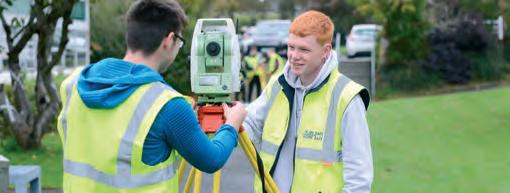
AU636 | Level 8 | Bachelor of Science (Honours)
AU536 | Level 7 | Bachelor of Science
A quantity surveyor combines the roles of accountant, solicitor, and building manager, excelling in cost planning, estimating, procurement, tendering, and contract administration. A four-month work placement in Year 3 offers practical learning. Graduates gain qualifications to become professional quantity surveyors, with specialisations that give them a competitive edge in the job market.
atu.ie/AU636
atu.ie/AU536
3/4 Years
351 (Level 8 2024) 251 (Level 7 2024)
• O6/H7 Maths
48 Places Minimum Entry Requirements PLUS
Lisa Dooley Programme Chair lisa.dooley@atu.ie Work Placement
Graduates of the Level 8 programme are provided with the academic qualification necessary to commence the process of becoming a Professional Quantity Surveyor (Chartered Surveyor). The programme provides highly sought-after specialisations, giving its graduates a clear edge in the employment market.
Graduates can find opportunities in Ireland and across the world in building, civil engineering, or building services consultancy, working on-site or in professional roles, with contractors, facilities management, insurance companies, local authorities, government departments, property divisions of the banking sector, and utility providers.
Upon successfully completing Year 3, Level 7 students can apply internally to study Year 4 of the Level 8 programme to gain a BSc (Hons) qualification.
ATU offers a wide range of postgraduate programmes. ATU qualifications are recognised worldwide for further study and postgraduate entry.
The Level 8 programme is fully accredited at Professional Level by the Society of Chartered Surveyors Ireland (SCSI), The Royal Institution of Chartered Surveyors in the UK (RICS) and the Chartered Association of Building Engineers (CABE).


Year 1
• Quantity Surveying Practice and Procedures
• Building Measurement
• Construction Technology 1
• Building Services 1
• Building Information Modelling for Surveyors 1
• Law for the Built Environment
• Academic and Professional Skills
• Financial and Economic Management
• Mathematics
Year 2
• Applied Measurement and Estimating
• Procurement Studies
• Contract Accounts Administration
• Construction Technology 2
• Building Services 2
• Health Safety and Site Management
• Project/QS Computer Applications
• Cost Studies 1
• Building Information Modelling for Surveyors 2
Year 3
• Advanced Measurement
• Building Performance and Technology
• Building Services 3
• Contracts (Private Sector)
• Cost Management of Civil Works
• Cost Studies 2
• Work Placement (Semester 6)
Year 4 (Level 8)
• Cost Management of Building Services
• Capital Works Management Framework
• Construction Project Management
• Sustainability and the Circular Economy
• Dissertation
Additional elective modules may be available throughout the programme.
Students learn about the Internet of Things, mobile technologies, designing for a sustainable world, artificial intelligence, virtual reality, autonomous vehicles and medical technologies. Our innovative learning environment includes team and problem-based learning. Most of the contact time is spent in practical and project work. Lecturers work closely with the students to nurture their technical, personal, and professional development. No experience necessary, just an enquiring mind and an interest in technology.
atu.ie/AU642
atu.ie/AU542
3/4 Years
309 (Level 8 2024)
250 (Level 7 2024)
Minimum Entry Requirements PLUS
• O4/H7 Maths
72 Places
Work Placement
Erasmus+
Dr Carine Gachon Head of Department carine.gachon@atu.ie
ATU Galway organises student work placement in the top companies in the world who just happen to be in our region. Many students take their first job on graduation with the company where they did their placement.
Our alumni have successfully secured positions in renowned companies such as Cisco, Intel, IBM, Ericsson, HP, Analog Devices, SAP, Avaya, Genesys, Valeo, Jaguar Land Rover, Boston Scientific, Medtronic, Thermo King and ATU.
A qualification as a Software and Electronic Engineer is a passport to work anywhere in the world. Graduates work with the leaders in software, computers, the Internet, medical technology, autonomous cars, sustainability, and telecommunications. Engineers can assume various roles including product design, technical support, research, management, sales, and education. As an engineer, you possess an entrepreneurial spirit, and the possibilities for your career are boundless with this degree.
Upon successfully completing Year 3, Level 7 students can apply internally to study Year 4 of the Level 8 programme to gain a BEng (Hons) in Software and Electronic Engineering qualification.
ATU offer a wide range of postgraduate programmes. ATU qualifications are recognised worldwide for further study and postgraduate entry.
Year 1
• Electronic Circuits
• Web Technologies
• Electrical Theory
• Introduction to C Programming
• Internet Technology
• C/C++ Programming
• Academic and Professional Skills
• Mathematics
• Project Build and Test
Year 2
• Computer Engineering
• Smart Teams
• Computer Engineering
• Internet Technology
• Analog Devices
• Object Oriented Programming
• Internet of Things Project
• Mathematics
• Electronic Design Automation
Year 3
• Machine Learning with Python
• Applied Linux
• System on Chip Design and Verification
• Embedded Systems
• Continuous Integration and Delivery
• Work Placement (Jan – August)
Year 4 (Level 8)
• C++ Programming
• Full Stack Development
• Mobile App Development
• Cloud Computing
• Embedded Real-Time Operating Systems
• Digital Signal Processing
• Medical Electronics
• Continuous Integration and Delivery
• Enterprise and Innovation
• Project Engineering
Additional elective modules may be available throughout the programme.
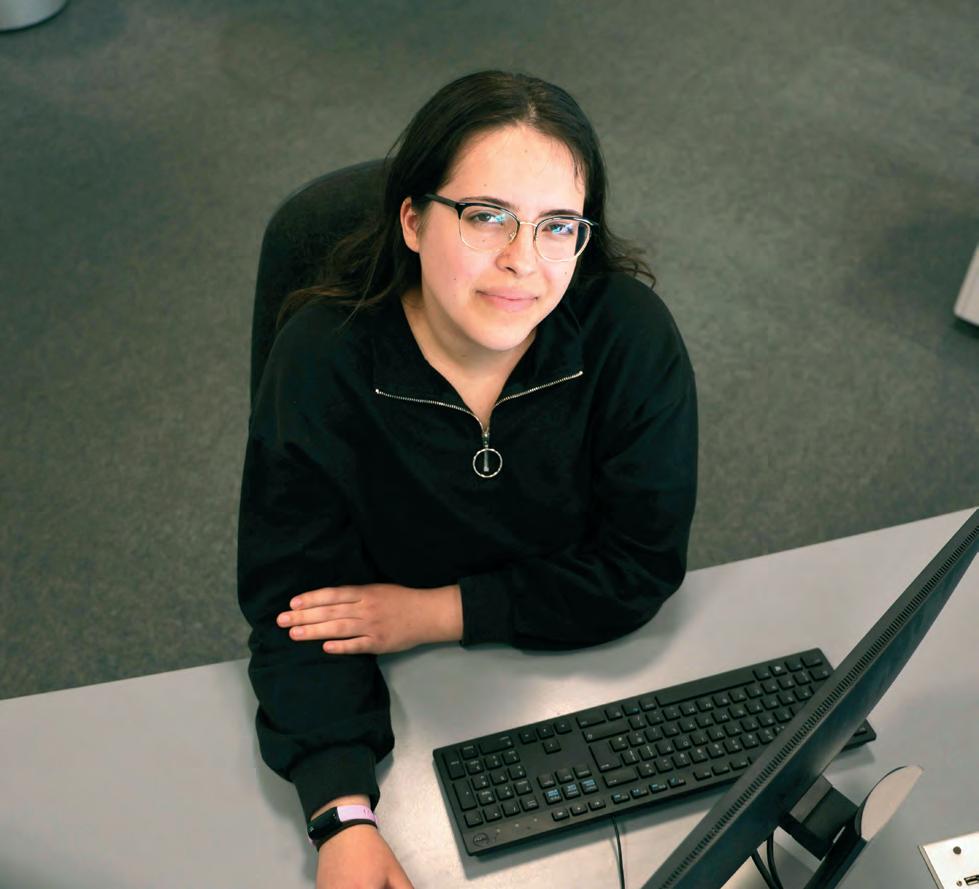
Transitioning into my course initially posed challenges, but bonding with classmates eased my mind. After exploring multiple career paths, my interest in technology ignited during my involvement with CoderDojo, especially in software development. Opting for Computer Science for my Leaving Cert and CAO application felt right, despite early uncertainties.
I love the practical aspect of my course. As a hands-on learner, the balance between lab work and lectures at ATU suits me perfectly. Building and programming projects like my RoboCar have been immensely rewarding.
ATU’s lively student life, with events at Union Square and diverse clubs, enriches my experience. The feedback from lecturers, support from the Math Support Centre and completing the many practical projects have all contributed to building my confidence to work in this exciting and diverse industry.
AU649 | Level 8 | Bachelor of Engineering (Honours)
AU549 | Level 7 | Bachelor of Engineering
• Agricultural Engineering
• Biomedical Engineering
• Energy Engineering
• Manufacturing Engineering Design
• Mechanical Engineering
• Automation and Robotics
The Common Entry Engineering degree programme introduces students to various engineering fields and fundamental skills, aiding in an informed programme choice in second year based on aptitude and skill. Upon completing the one-year programme, students will be eligible to transfer into Year 2 of the following programmes: Agricultural Engineering, Biomedical Engineering, Energy Engineering, Manufacturing Engineering Design, Mechanical Engineering, or Automation and Robotics Engineering.
atu.ie/AU649
atu.ie/AU549
3/4 Years
462 (Level 8 2024)
321 (Level 7 2024)
Minimum Entry Requirements PLUS • O6/H7 Maths
Note: Special Regulations may apply to progression to specific disciplines from Year 2
70 Places
Dr Aoife O’Brien Programme Chair aoife.obrien@atu.ie Work Placement
Students are introduced to various engineering disciplines through our programmes in Agricultural, Biomedical, Energy, Manufacturing, Mechanical, Automation and Robotics Engineering.
In Year 1, students complete mandatory modules along with taster modules to better understand each discipline. This helps make informed decisions when choosing the preferred field. The common entry programme lets students try before deciding their engineering specialism.
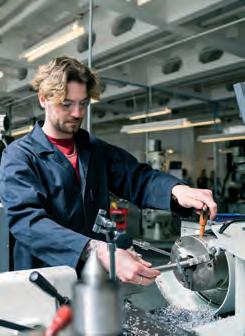
• Academic and Professional Skills
• Computer Aided Design 1
• Manufacturing Engineering 1
• Electrical Science
• Engineering in Business
• +Elective taster modules in each discipline
Students choose and transfer into one of the following degrees:
• Agricultural Engineering
• Biomedical Engineering
• Energy Engineering
• Manufacturing Engineering Design
• Mechanical Engineering
• Automation and Robotics
Students move to their chosen specialised area from Year 2. Special Regulations may apply to progression to specific disciplines from Year 2.
Our engineering graduates of Agricultural, Biomedical, Energy, Manufacturing, Mechanical, and Automation and Robotics Engineering can pursue careers in research, development, design, and project management. They find opportunities in sectors like biotechnology, renewable energy, agritech, automation, healthcare, and advanced manufacturing, both in Ireland and internationally.
A major new STEM building is currently under construction on the Galway City, Dublin Road campus that will provide state of the art lecture theatres, seminar rooms and laboratories to support science and engineering based programmes such as these.
This degree combines engineering principles from various engineering disciplines, such as mechanical, electrical, civil, and chemical engineering with agricultural sciences. Graduates design and develop innovative farm equipment, machinery, technology, and systems for sustainable agriculture. Ideal for those passionate about farming and engineering. The programme emphasises practical learning with weekly classes, workshop practice, individual and group projects and national and international paid work placements.
atu.ie/AU648
4 Years
334 (Level 8 2024)
Minimum Entry Requirements PLUS • O4/H7 in Maths
10 Places
Work Placement
Joint Programme Chairs
Alan Connors alan.connors@atu.ie
Enda Kennedy enda.kennedy @associate.atu.ie
This programme is delivered in the Galway City, Dublin Road campus with provided bus transportation to the Mountbellew campus for scheduled classes. Students are advised to seek accommodation in Galway City.
Students can enter into Year 2 of this programme via the Engineering Common Entry route AU649 (Level 8).
This programme is also available for study at Level 7 through the BEng in Engineering (Common Entry) route AU549.
Agricultural Engineering graduates perform and supervise engineering tasks related to agricultural land, buildings, machinery, and equipment. Career opportunities include maintaining and designing agricultural machinery, developing drainage systems, researching environmentally friendly crop production on farms and in labs, and conducting environmental impact evaluations.
ATU Level 8 qualifications are recognised worldwide for postgraduate entry.
The Department of Mechanical and Industrial Engineering collaborates with local industries, offering graduates funded research opportunities for MSc, MEng, or PhD programmes.
The Level 8 programme meets the educational requirements for ‘Trained Farmer Status’ for the purpose of farm inheritance, grant aids, and tax exemptions. To comply with the requirements, students are required to complete an additional 5 credit subject per year.
Year 1
• Animal and Crop Production Science
• Agronomy and Animal Husbandry
• Computer Aided Design
• Electrical Science
• Agricultural Technology
• Engineering Science
• Mathematics
• Manufacturing Engineering
• Academic and Professional Skills Year 2
• Mechanics and Dynamics of Machines
• Mathematics
• Farm Management, Safety and Law
• Grassland Production
• Farm Animal Health and Planning
• Thermodynamics
• Mechanics and Properties of Materials
• Computer Aided Design
• Power Hydraulics
• Manufacturing Engineering and Statics and Dynamics
Year 3
• Food Science, Technology and Quality Assurance
• Animal Nutrition and Breeding
• Dry Stock Production
• Work Experience for Agricultural Engineers (five months)
• Machine Design
• Advanced Manufacturing Processes
• Heat Transfer
• Power Hydraulics
• Dairy Production
• Engineering Design
• Programming for Embedded Controllers
Year 4
• Mechanical Power Transmission
• Sustainable Farming and the Environment
• Soil Science and Nutrient Management
• Manufacturing Automation
• Reliability and Maintenance
• Electrical Machines
• Computer Aided Engineering
• Smart Agri Systems
• The Engineer in Society
• Automation and Control
• Agricultural Engineering Major Project
Additional elective modules may be available throughout the programme.
AU647 | Level 8 | Bachelor of Engineering (Honours)
AU547 | Level 7 | Bachelor of Engineering
Biomedical Engineers combine learning from Engineering with Biology and Medicine, and apply the learned principles to healthcare systems, developing life-enhancing equipment and technologies, such as vascular stents, artificial limbs, pacemakers, lasers for eye surgery, and contact lenses. These degrees are for students who would like an exciting career in Engineering that will save or improve people's lives.
atu.ie/AU647
atu.ie/AU547
3/4 Years
392 (Level 8 2024)
300 (Level 7 2024)
Minimum Entry Requirements PLUS • O4/H7 Maths
45 Places
Work Placement
Dr Liam Morris Programme Chair liam.morris@atu.ie
The programme focuses on the integration of engineering and human physiology, biomedical product and system design, automation, validation, quality and regulatory affairs.
Graduates find employment in biomedical engineering related disciplines nationally and internationally, in areas such as medical device research and design, surgical design, new product design and development, product or process validation and project management.
Careers include working as an automation engineer, research and development engineer, quality engineer or sales engineer.
Upon successfully completing Year 3, Level 7 students can apply internally to study Year 4 of the Level 8 programme to gain a BEng (Hons) in Biomedical Engineering qualification after which many postgraduate opportunities are available at ATU and other universities worldwide.
The team behind this programme collaborates regularly with local industries, offering graduates funded research opportunities for MSc, MEng, or PhD programmes specifically in the areas of biomedical engineering.
Students may also enter into Year 2 of this programme via the Engineering Common Entry route AU649 Level 8 or AU549 Level 7.
Paid work placement opportunities are available nationally and internationally in companies like Stryker, Medtronic and Boston Scientific.
Ireland is home to 250+ medical technology companies employing over 25,000 people. Some 80% of the world’s heart stents, 50% of ventilators, and 33% of contact lenses, are produced here in Ireland.
Year 1
• Mathematics
• Computer-Aided Design
• Academic and Professional Skills
• Electrical Science
• Engineering in Business
• Anatomy and Physiology for Engineers
• Engineering Science
• Applied Biology of the Cell
• Introduction to Manufacturing Engineering
• Mathematics
• Manufacturing Automation (Pneumatics)
• Anatomy and Physiology for Engineers
• Fluid Mechanics
• Mathematics
• Mechanics and Properties of Materials
• Medical Image Generation of Anatomical Structures and Functions
• Statics and Dynamics
• Quality and Regulatory Affairs
• Project Management and Project
Year 3
• Instrumentation and Control
• Manufacturing Automation III
• Machine Design
• Lean Six Sigma
• Biomechanics of Soft Tissues
• Biomechanics of Hard Tissues
• Biomaterials
• Engineering Work Experience (five months)
Year 4 (Level 8)
• Medical Devices
• Major Project
• Computer-Aided Engineering
• The Engineer in Society
• Intellectual Property and Knowledge Management
• Advanced Mechanical Engineering
• Six Sigma Engineering
• Automation and Control
Additional elective modules may be available throughout the programme.

I’ve always been fascinated by biology, technology, and healthcare. In secondary school, I developed a keen interest in understanding how medical devices and innovations can improve patient lives. This curiosity led me to explore various fields, and eventually, I decided to pursue Biomedical Engineering. ATU’s strong reputation and blend of theoretical and practical learning, with a strong emphasis on hands-on experience, was a major draw.
I’ve enjoyed the supportive staff, practical skills, and vibrant student life, participating in events, leadership programmes, and career services. My goal is to excel in Biomedical Engineering and contribute to innovative medical solutions. Completing my placement with Boston Scientific as a Co-op Manufacturing Engineer was an invaluable learning experience, applying my knowledge into practice to help patients worldwide.
Energy Engineering encompasses energy harvesting, conversion, management, storage, efficiency, modelling, sustainability, and compliance, driven by the goal of Net Zero carbon emissions by 2050. If you seek an exciting career in improving energy production and consumption, this degree is for you. This programme integrates mechanical, energy, manufacturing, and environmental principles to equip you with skills to tackle global energy challenges.
atu.ie/AU646
4 Years
328 (Level 8 2024)
• O4/H7 Maths
15 Places Minimum Entry Requirements PLUS
Christoph Schellenberg Programme Chair christoph.schellenberg @atu.ie
These programmes offer practical learning with access to dedicated energy teaching and research labs. They include laboratory classes, individual and group projects, and work placements in companies like ThermoKing, Unitherm Heating Systems, ESB and EirGrid.
Graduates are employed in a wide diversity of engineering-related disciplines, both nationally and internationally. Destinations include building energy management, building information modelling services, research and development, energy manager, project managers, energy assessors and consultants, energy network managers and controllers. HVAC mechanical services, energy efficiency and recovery, energy distribution and with start-up companies.
ATU Honours Level 8 qualifications are recognised worldwide for postgraduate entry. The Department of Mechanical and Industrial Engineering collaborates with local industries, offering graduates funded research opportunities for MSc, MEng, or PhD programmes specifically in the areas of biomedical engineering and energy engineering.
Energy engineers play a crucial role in tackling the pressing challenge of sustainable energy production and meeting the growing energy demand. With an expected 19% increase in global energy demand from 2020 to 2040, radical changes in the energy mix are necessary to meet greenhouse gas reduction targets, such as a 55% decrease by 2030.
Students can enter into Year 2 of this programme via the Engineering Common Entry route AU649 (Level 8).
It is also available for study at Level 7 through AU549 BEng in Engineering (Common Entry).
Year 1
• Mathematics
• Computer-Aided Design
• Academic and Professional Skills
• Electrical Science
• Mechanical Dissection
• Engineering Science
• Manufacturing Engineering
• Introduction to Energy Systems
Year 2
• Renewable Energy Technologies
• Statics and Dynamics
• Building Information Modelling (BIM)
• Fluid Mechanics
• Mathematics
• Mechanics and Dynamics of Machines
• Manufacturing Automation
• Mechanics and Properties of Materials
• Thermodynamics
Year 3
• Electrical Energy Technologies
• Programming for Embedded Controllers
• Heat Transfer
• Machine Design
• Thermofluids
• Thermodynamics Systems
• Instrumentation and Control
• Building Energy Performance
• Professional Practice for Energy Engineers
• Computer-Aided Engineering
• Integrated Energy Systems
• Wind and Wave Energy
• Nuclear Engineering and Electrochemical Technology
• Energy Management
• Plant Engineering
• Electrical Machines
• The Engineer in Society
• Major Project
• Reliability and Maintenance
Additional elective modules may be available throughout the programme.
This degree produces high-quality manufacturing engineering graduates to support local, national, and international industries. Students gain transferable skills for rewarding careers. If you enjoy collaborative work and are interested in designing, implementing, and managing optimal manufacturing processes, this degree is ideal, helping Ireland’s manufacturing industry grow and compete internationally.
atu.ie/AU650
4 Years
319 (Level 8 2024)
Minimum Entry Requirements PLUS • O6/H7 Maths
10 Places
Work Placement
Dr David Gorman Programme Chair david.gorman@atu.ie
This programme is very practical with weekly lab classes, workshop practice, individual and group projects as well as company-based work experience. In addition, tuition is given on the latest CAD packages and leading-edge CNC turning and milling machines. Students will learn how to work together in teams to accomplish specified goals and targets, develop problemsolving skills, being creative and innovative, and gain experience in six sigma and project management methodologies.
Graduates will have the skills and experience necessary to build a career in manufacturing engineering design, quality engineering, lean / six sigma engineering, production and process engineering, operations management and maintenance, process improvement, supply chain engineering and project management.
ATU Honours Level 8 qualifications are recognised worldwide for postgraduate entry.
The Department of Mechanical and Industrial Engineering collaborates with local industries, offering graduates funded research opportunities for MSc, MEng, or PhD programmes.
Manufacturing is the biggest employer in Irish industry. According to the European Commission, the industry is the backbone of the European economy, accounting for 80% of Europe’s exports and private innovations, and providing high skilled job opportunities.
Students can enter into Year 2 of this programme via the Engineering Common Entry route AU649 (Level 8).
This programme is also available for study at Level 7 through AU549 BEng in Engineering (Common Entry).
Year 1
• Manufacturing Engineering Mathematics
• Manufacturing Engineering
• Engineering Science for Manufacturing
• Computer-Aided Design
• Academic and Professional Skills
• Engineering in Business
• Mechanical Dissection
• Electrical Science
Year 2
• Manufacturing Automation (Pneumatics)
• Maintenance and Safety
• Metrology
• Lean Manufacturing
• Quality and Regulatory Affairs
• Manufacturing Engineering Mathematics
• Manufacturing Engineering
• Manufacturing Design of Fixtures
• Project Management and Project
Year 3
• Polymer Processing Technology
• Engineering Software Systems
• Advanced Manufacturing Processes
• Six Sigma Quality
• Manufacturing Process Planning
• Robotics and Control
• Operations Management
• Engineering Work Experience
Year 4
• Product and Service Development
• Energy Management
• Operations Modelling and Simulation
• Lean Enterprise Engineering
• Innovation and Enterprise
• Supply Chain Engineering
• Six Sigma Engineering
• The Engineer in Society
• Smart Manufacturing
• Major Project
Additional elective modules may be available throughout the programme.
Professional Accreditation
AU645 | Level 8 | Bachelor of Engineering (Honours)
AU545 | Level 7 | Bachelor of Engineering
In these degrees students will learn how machines and other mechanical systems work and how they are designed and controlled. This covers a vast range of products and systems from transportation, and power generation to medical devices. These programmes are very practical and more than 50% of the time is spent in laboratories, workshops and completing group and individual projects. Students are taught the latest techniques for computeraided design and simulation.
atu.ie/AU645
atu.ie/AU545
3/4 Years
430 (Level 8 2024)
303 (Level 7 2024)
• O4/H7 Maths
50 Places Minimum Entry Requirements PLUS
Dr Denis O’Mahoney Programme Chair denis.omahoney@atu.ie Work Placement
In Year 3, students can avail of work placements in companies like Caragh Precision, Glanua, Medtronic, ThermoKing, Xerotech and Boston Scientific.
Mechanical Engineers envision and create solutions. Many of our graduates have careers in component/product design, energy utilisation equipment, safety and reliability, automobile design, materials development, and mechanical design in aerospace, biomedical, ICT, process, pharmaceutical, manufacturing industries, and gas turbine design.
Upon successfully completing Year 3, students can apply internally to study Year 4 of the Level 8 programme to gain a BEng (Hons) in Mechanical Engineering qualification after which many postgraduate opportunities are available at ATU and worldwide.
The Department of Mechanical and Industrial Engineering collaborates with local industries, offering graduates funded research opportunities for MSc, MEng, or PhD programmes.
Mechanical Engineering is one of the oldest branches of engineering, which combines physics, engineering, design and the sciences to analyse, design, and manufacture mechanical engineering systems. Due to the vast range of engineering systems studied, mechanical engineers are highly trained, skilled, and competent to take on a variety of careers in industry, education, and public services.
Students may enter into Year 2 of this programme via the Engineering Common Entry route AU649 Level 8 or AU549 Level 7.
Year 1
• Mathematics
• Engineering Science
• Mechanical Dissection
• Electrical Science
• Engineering in Business
• Academic and Professional Skills
• Computer-Aided Design
• Manufacturing Engineering
Year 2
• Manufacturing Engineering
• Computer-Aided Design
• Statics and Dynamics
• Fluid Mechanics
• Mathematics
• Manufacturing Automation (Pneumatics)
• Mechanics and Dynamics of Machines
• Thermodynamics
• Mechanics and Properties of Materials
Year 3
• Heat Transfer
• Machine Design
• Advanced Manufacturing Processes
• Numerical Methods and Programming
• Engineering Design
• Instrumentation and Control
• Manufacturing Automation
• Professional Practice for Mechanical Engineers (five months)
• Electrical Energy Technologies
• Six Sigma
Year 4
• Computer-Aided Engineering
• Major Project
• Automation and Control
• Advanced Mechanical Engineering
• The Engineer in Society
• Reliability and Maintenance
Additional elective modules may be available throughout the programme.
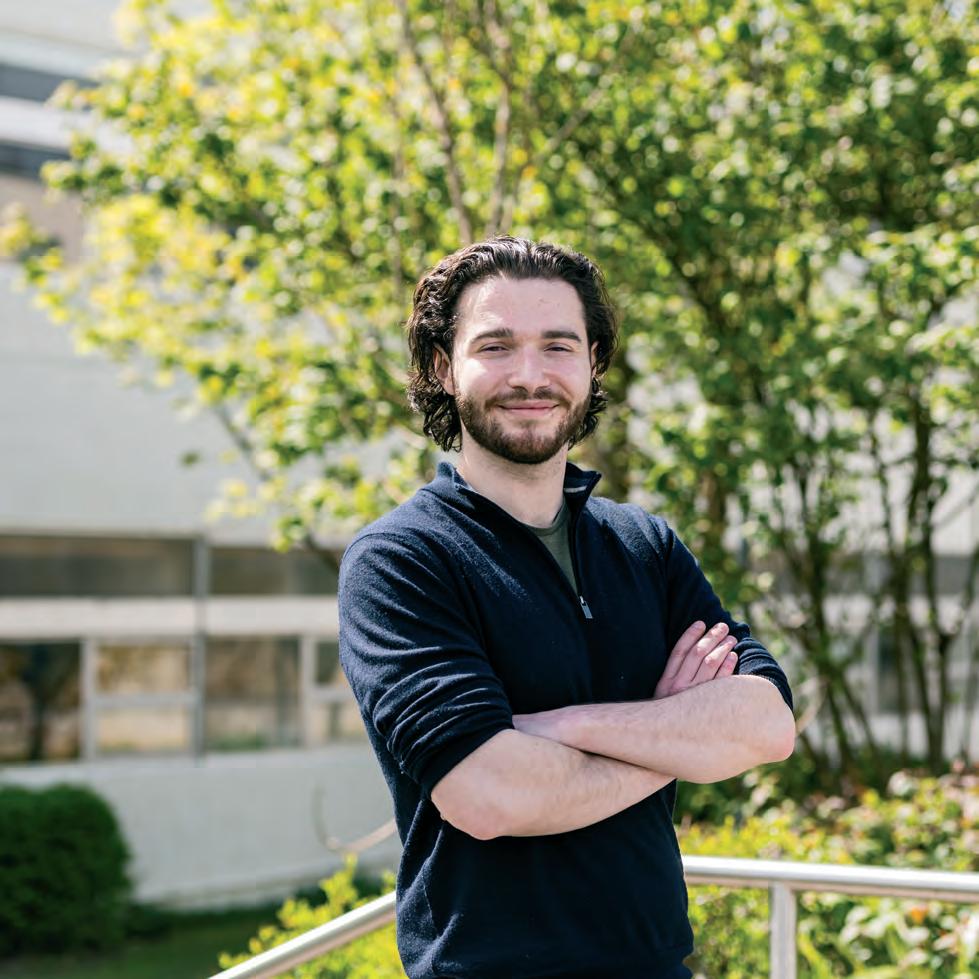
I was studying science in another university, but I knew I always had a keen interest in engineering, so I applied to study Mechanical Engineering in ATU. Academically, the material was manageable, especially with prior knowledge, but adjusting to the university lifestyle and being self-accountable was a challenge initially. I love the hands-on modules, particularly CAD and manufacturing.
For my work placement, I worked with Medesign in ATU iHubs where they offer a full range of medical device design solutions from concept to manufacture. I now feel significantly more developed as an engineer, equipped to innovate and generate new ideas. The abundance of clubs, societies, and academic support has really enhanced my university experience too.
AU656 | Level 8 | Bachelor of Science (Honours)
AU556 | Level 7 | Bachelor of Science
• Applied Freshwater and Marine Biology
• Applied Biology and Biopharmaceutical Science
• Chemical and Pharmaceutical Science
• Physics and Instrumentation
• Forensic Science and Analysis*
These common entry science degrees offer flexibility, providing a core foundation in key disciplines during the first year. Ideal for undecided students, it allows for specialisation after Year 1 in fields such as Applied Freshwater and Marine Biology, Physics and Instrumentation, Chemical and Pharmaceutical Science, Applied Biology, and Biopharmaceutical Science. Forensic Science and Analysis is also a degree award option from the Level 8 programme.
atu.ie/AU656
atu.ie/AU556
3/4 Years
350 (Level 8 2024)
280 (Level 7 2024)
Minimum Entry Requirements
32 Places
Work Placement
Dr Ian O’Connor Head of Department of Natural Resources and the Environment ian.oconnor@atu.ie
A common entry route is a great choice for students who are unsure which area of science is for them. These programmes allow students to gain a deeper understanding of what each pathways entails and discover how science degrees at ATU prioritise practicals, projects and placements.
Students from this common entry pathway progress to the degree specialisation of choice. After 3 years of study, Level 7 students can join Level 8 students in Year 4 to gain an honours degree. Many postgraduate options are available in each specialism at Level 9 and Level 10 at ATU and other universities worldwide.
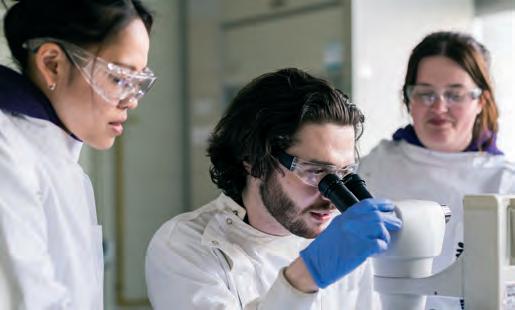
Year 1
• Biology
• Chemistry
• Physics
• Mathematics
• Academic and Professional Skills
Year 2 +
Students choose one of the following specialisms:
• Applied Freshwater and Marine Biology
• Applied Biology and Biopharmaceutical Science
• Chemical and Pharmaceutical Science
• Physics and Instrumentation
• Forensic Science and Analysis*
Additional elective modules may be available throughout the programme.
A major new STEM building is currently under construction on the Galway City, Dublin Road campus that will provide state-of-the-art lecture theatres, seminar rooms and laboratories to support science and engineering based programmes such as these.
Year 1 involves the study of a range of common science subjects. From Year 2, students progress to their degree award specialism (subject to the availability of places).
*Forensic Science and Analysis is a degree award option from the Level 8 AU656 Science (Common Entry). It is not an option from Level 7 AU556.
There is no need to have studied chemistry, biology or physics at Leaving Certificate, as the fundamentals of all science subjects are delivered in Year 1.
AU655 | Level 8 | Bachelor of Science (Honours)
AU555 | Level 7 | Bachelor of Science
Students will study a range of modules in Freshwater and Marine Biology at home and abroad. This is an applied biology programme with an emphasis on practicals, projects and placement. These programmes focus on Freshwater and Marine Biology of organisms, populations, communities and ecosystems. The sustainable development of renewable resources in the face of the rapidly expanding population and developing economy is a consistent theme throughout these programmes.
atu.ie/AU655 atu.ie/AU555
3/4 Years
400 (Level 8 2024)
300 (Level 7 2024)
64 Places Minimum Entry Requirements
Work Placement
Dr Ian O’Connor Head of Department of Natural Resources and the Environment ian.oconnor@atu.ie
Students on this programme complete numerous field trips from seashores to lakes, rivers and wetlands within Ireland and abroad to locations such as Spain.
Graduates from our programmes are equipped to undertake scientific, technical, or managerial roles in positions related to Freshwater and Marine Biology. Many work in state agencies nationally and internationally as well as industry and environmental organisations. Graduates can also continue their studies to Level 9 Master and Level 10 Doctoral level in Ireland or other international universities.
Upon successfully completing Year 3, Level 7 students can apply internally for Year 4 to complete the Level 8 honours degree.
Level 8 graduates can progress to MSc programmes within ATU, such as MSc Applied Marine Conservation, MSc Conservation Behaviour, or PhD / MSc by Research at the Marine and Freshwater Research Centre in ATU Galway City (mfrc-atu.ie).
ATU Honours Level 8 qualifications are recognised worldwide for postgraduate entry.
Students may enter Year 2 of this programme via the Science (Common Entry) route AU556 for Level 7 or AU656 for Level 8.
Ireland’s wetland habitats are home to numerous plant and animal species. They form an important network of habitats for many species on migration and will be central to restoring biodiversity and mitigation of our carbon emissions. Ireland’s marine environment is roughly ten times the size of its landmass with a wide range of habitats and species. The ocean has a fundamental role in our climate, food, and future energy supply.
Year 1
• Biology
• Chemistry
• Physics
• Mathematics
• Academic and Professional Skills
Year 2
• Experimental Design and Statistics
• Botany and Zoology
• Biology and Culture of Aquatic Species
• Field and Laboratory Techniques
• Limnology and Oceanography
Year 3
• Ecological Techniques
• Ecology of Aquatic Environment
• Environmental Monitoring and Assessment
• Fisheries Monitoring and Assessment
• Identification Skills for Biologists
• Professional Development Plan
• Professional Practice (Placement - eight weeks)
Year 4 (Level 8)
• Aquatic Animal Behaviour
• Advances in Aquatic Biology and Ecology
• Biodiversity and Conservation
• GIS in Applied Freshwater and Marine Biology
• Advanced Data Analysis
• Aquatic Resource Management
• Project Methods and Preparation
• Applied Ecological Modelling
• Environmental Legislation
• Project Data Management
• International Field Course
• Research in Applied Freshwater and Marine Biology
Additional elective modules may be available throughout the programme.
AU670 | Level 8 | Bachelor of Science (Honours)
AU569 | Level 7 | Bachelor of Science
These programmes prepare graduates for roles in Ireland’s pharmaceutical, biomedical, and healthcare sectors, with avenues in environmental protection, food safety, regulatory agencies, and research. The professional qualifications they gain boost career advancement, leading to managerial positions. Many secure job opportunities even before completing their final exams, while others pursue postgraduate research or higher degrees.
atu.ie/AU670
atu.ie/AU569
3/4 Years
378 (Level 8 2024)
289 (Level 7 2024)
Minimum Entry Requirements PLUS • Garda Vetting
64 Places
Work Placement
Dr Mary McMahon
Programme Chair mary.mcmahon@atu.ie
Graduates have excellent career opportunities in the pharmaceutical, biomedical and healthcare sectors, in such areas as the development of new medicines, biomedicines, quality assurance, regulatory affairs, quality control, validation studies, management, research and development, the food industry, biotechnology sector, forensic science, consultancy, marketing, scientific publishing and education.
Upon successfully completing Year 3, Level 7 students can apply internally to study Year 4 of the Level 8 BSc (Hons) Applied Biology and Biopharmaceutical Science programme.
ATU offers a wide range of postgraduate programmes. ATU qualifications are also recognised worldwide for further study and postgraduate entry.
Ireland is a centre of excellence for numerous pharmaceutical and biotechnology companies. Wyeth, for example, has opened the biggest biotechnology campus in the world, and many more companies are opening biotech facilities in Ireland.
Students may enter Year 2 of this programme via the Science (Common Entry) route AU556 for Level 7 or AU656 for Level 8.
Work placement is undertaken in Year 4 as part of the research project module in companies operating within the Life Sciences sector or with research groups within ATU.
Year 1
• Biology
• Chemistry
• Physics
• Mathematics
• Academic and Professional Skills
Year 2
• Biochemistry
• Analytical Techniques
• Molecular Biology
• Data Modelling and Statistics
• Quality Management
• Microbiology
• Fundamental Immunology
• Biological Aspects of Water Pollution
Year 3
• Spectrophotometric Methods of Analysis
• Applied Enzymology and Immunology
• Microbiological Quality Control
• Quality Management
• Advanced Molecular and Biochemical Techniques
• Pharmaceutics
• Chromatography
• Pharmaceutical Microbiology
• Scientific and Professional Communication
• Introduction to Pharmacology and Drug Delivery Systems
• Project
Year 4 (Level 8)
• Biopharmaceutical Science
• Molecular Pharmacology
• Regulatory Compliance for Biotherapeutics
• Statistical Methods for Manufacturing
• Bioprocessing Technology
• Biopharmaceutical Analysis
• Advanced Pharmaceutical and Healthcare Microbiology
• Advanced Immunology, Biotherapeutics and Vaccines
• Molecular Biology
• Research Project/Work Placement
Additional elective modules may be available throughout the programme.
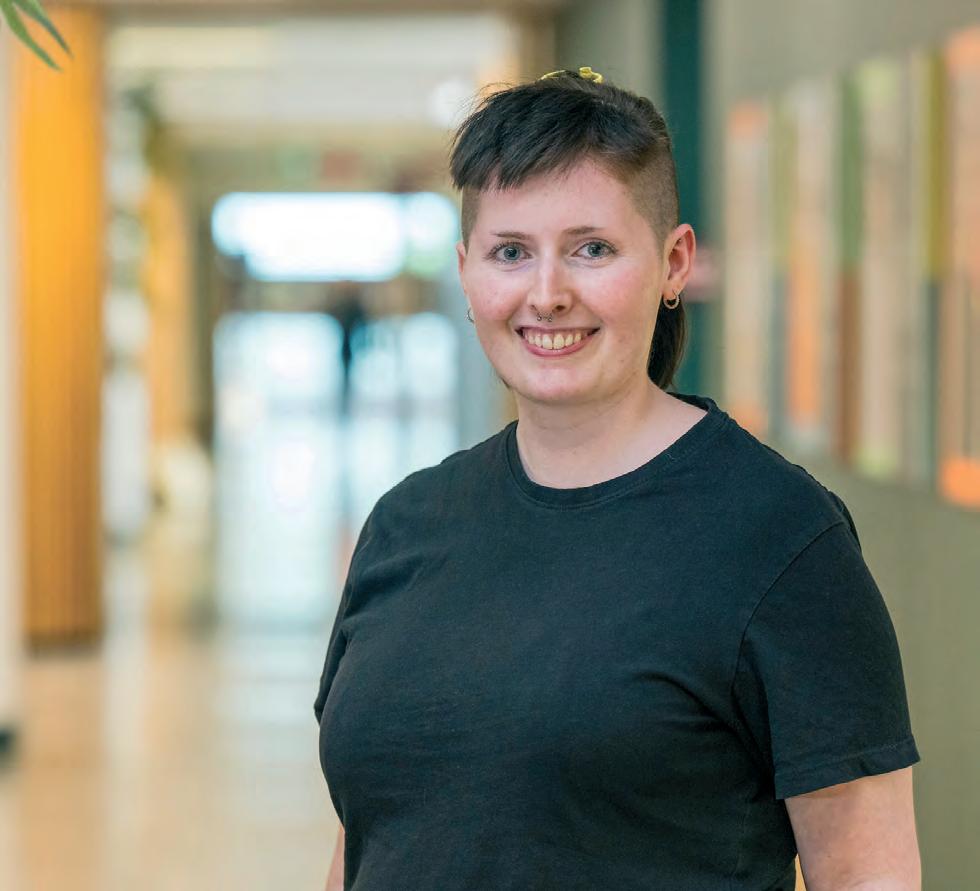
I chose ATU because I knew the class sizes would be smaller. I was less worried about starting university, knowing there wouldn’t be as many people as in a typical class setting. Thinking long-term, I felt that ATU would better prepare me for the workplace. I had also heard great things about ATU from people who had studied engineering and other STEM programmes.
I never expected to study physics, since I hadn’t done it before college, but it ended up being my favourite subject. I found myself enjoying the topics, and even the harder questions didn’t feel overwhelming for long because the learning environment was so supportive. Another reason I chose this programme was that I saw how it became increasingly applied and practical year after year.
This programme focuses on the practical application of chemistry, teaching students to discover new medicines and ensure they are safe and of high quality. Emphasising practical work and projects, the programme prepares graduates for immediate employment in the pharmaceutical, chemical, biomedical, and biotechnology sectors. Graduates are also in demand for roles in quality management, regulatory affairs, and research, or can pursue postgraduate studies.
atu.ie/AU668
4 Years
367 (Level 8 2024)
Minimum Entry Requirements PLUS • Garda Vetting
16 Places
Work Placement
Dr Emer Quirke Programme Chair emer.quirke@atu.ie
Graduates fill vacancies in research and development, quality assurance and regulatory departments within the pharmaceutical, biomedical and research sectors. They also find employment in accreditation, validation and sales and marketing associated with these and other related industries. Opportunities also exist in area such as process development and operations, organic synthesis, and analysis.
ATU offers a wide range of postgraduate programmes. ATU qualifications are also recognised worldwide for further study and postgraduate entry.
Students can enter into Year 2 of this programme via AU656 Science (Common Entry) Level 8.
This programme is also available for study at Level 7 through AU556 BSc in Science (Common Entry).
There is no need to have studied chemistry for the Leaving Certificate, as the fundamentals of all science subjects are delivered in Year 1.
Year 1
• Biology
• Chemistry
• Physics
• Mathematics
• Academic and Professional Skills
Year 2
• Microbiology
• Analytical Forensics
• Data Modelling and Statistics
• Organic Chemistry
• Inorganic Chemistry
• Good Manufacturing Practice, Standards and Quality Systems
• Physical Chemistry
• Analytical Techniques
• Biological Chemistry
• Instrumentation
• Computing and Scientific Communications
• Spectrophotometric Methods of Analysis
• Chromatographic Methods
• Electrochemical and Pharmacopoeia Methods
• Organic Chemistry
• Inorganic and Physical Chemistry
• Computing for Chemists
• Industry Placement (six months)
Year 4
• Analytical Chemistry
• Inorganic Chemistry
• Medicinal Chemistry
• Organic Chemistry
• Physical and Computational Chemistry
• Research Project
Additional elective modules may be available throughout the programme.
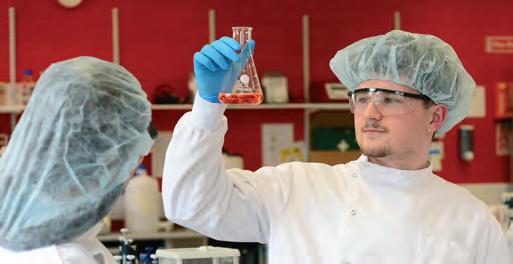
AU675 | Level 8 | Bachelor of Science (Honours)
AU575 | Level 7 | Bachelor of Science
The progression of modern technology relies on fundamental physics research and the development of instrumentation, driving innovation across science and engineering. These programmes aim to engage those interested in fundamental science and offer rewarding career opportunities. Throughout these programmes, there is a strong emphasis on practical work and projects. These projects generally reflect student interests, including medical instrumentation, drone-based remote measurements, electronic musical equipment, and solar cell investigation.
atu.ie/AU675
atu.ie/AU575
3/4 Years
347 (Level 8 2024)
376 (Level 7 2022)
32 Places Minimum Entry Requirements PLUS • Garda Vetting
Work Placement
Gareth Roe, Head of Department of Computer Science and Applied Physics gareth.roe@atu.ie
A Physics and Instrumentation degree offers diverse career opportunities. Graduates are in demand for high-earning roles in sectors like pharmaceuticals, medical devices, electronics, biotechnology, green energy, and marine industries. Careers include calibration technician and medical physicist. Key skills developed include problem-solving and project management, which are transferable to many jobs beyond physics.
Upon successfully completing Year 3, Level 7 students can apply internally to study Year 4 of the Level 8 BSc (Hons) Physics and Instrumentation programme.
ATU offer a wide range of postgraduate programmes. ATU qualifications are also recognised worldwide for further study and postgraduate entry.
Students may enter Year 2 of this programme via the Science (Common Entry) route, AU556 for Level 7 or AU656 for Level 8.
Over 90% of graduates are in full-time employment within three months of graduation. Graduates of this programme have gone on to work with NASA.
There is no need to have studied physics at Leaving Certificate, as the fundamentals of all science subjects are delivered in the first year.
Year 1
• Biology
• Chemistry
• Physics
• Mathematics
• Academic and Professional Skills
Year 2
• Physics
• Electronic Instrumentation
• Control and Instrument Systems
• Programming
• Technical Project
• Mathematics
• Astronomy and Astronomical Optics*
• Green Energy Technologies*
* Students can elect to undertake a module relevant to Marine Instrumentation or Computation
Year 3
• Relativity, Electromagnetism and Quantum
• Advanced Electronic Instrumentation
• Robotics, Automation and Modelling
• Metrology, Standards and Calibration
• Mechanics and Thermodynamic
• Signals and Computerised Instrument Systems
• Medical Instrumentation
• Instrument Design Team Project
• Mathematics
• Work Placement (three to six months) or project.
Year 4 (Level 8)
• Electromagnetism
• Solid State Semiconductor Physics
• Applied Optics and Optoelectronics
• Control and Instrument System Modelling and Design
• Spectroscopy and Microscopy
• Signal and Image Analysis
• Physics and Instrumentation Laboratories
• History and Philosophy of Science
• Final Year Project
Additional elective modules may be available throughout the programme.
This multidisciplinary programme allows students to study the development of modern forensic science and put into practice the analysis of DNA, forensic chemistry, forensic biology, computer forensics, expert witness, crime scene examination, and much more. Practical laboratory skills form a significant part of the experience, which benefits students during their six-month placement. Key skills including judgement and decision making, time management, project management are also cultivated. Graduates of this programme are strong contenders to thrive in any laboratory workplace.
atu.ie/AU669
4 Years
380 (Level 8 2024)
Minimum Entry Requirements PLUS
• Garda Vetting
32 Places
Work Placement
Dr Eadaoin Tyrrell Programme Chair eadaoin.tyrrell@atu.ie
This degree is accredited by The Chartered Society of Forensic Sciences, an internationally recognised professional body with members in over 60 countries. It is one of only three forensic programmes in the technological university sector to have this full professional accreditation.
Graduates will find work in forensic science, analytical and pharmaceutical sciences, the biotechnology and biomedical sectors and in environmental forensics.
ATU Honours Level 8 qualifications are recognised worldwide for postgraduate entry.
Students may enter Year 2 of this programme via AU656 Level 8 BSc (Hons) in Science (Common Entry).
There is no need to have studied chemistry at Leaving Certificate, as the fundamentals of all science subjects are delivered in Year 1.
Year 1
• Biology
• Chemistry
• Physics
• Mathematics
• Academic and Professional Skills
Year 2
• Introduction to Forensic Science
• Analytical Forensics
• Forensic Legal Studies
• Data Modelling and Statistics
• Organic Chemistry
• Inorganic Chemistry
• Forensic DNA
• Analytical Techniques
• Computer Forensics
• Forensics and Analytical Quality Management
• Physical Chemistry
Year 3
• Trace Evidence Collection and Analysis
• Chromatographic Methods
• Computer Forensics
• Spectrophotometric Methods of Analysis
• Organic Chemistry
• Forensic DNA
• Placement (six months)
Year 4
• Electrochemical and Pharmacopoeia Methods
• Forensic Evidence Evaluation
• Forensic Chemistry
• Research Methods for Forensic Science
• Computer Forensics
• Environmental Forensics
• Forensic Project
• Analytical Chemistry
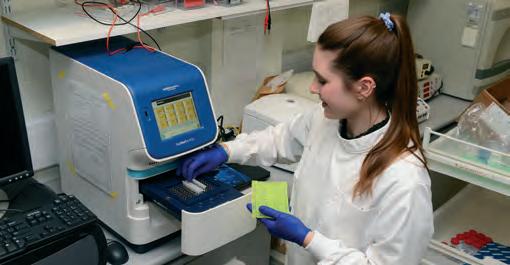


I am a second-year student at the Galway City, Dublin Road campus studying Forensic Science and Analysis. I grew up reading Nancy Drew books and loved watching Detective Conan (Case Closed). To this day, I still try to figure out ‘whodunnit’ while watching mystery investigation shows.
When I researched forensic science courses in Ireland, ATU came highly recommended. I enjoy how hands on the programme is. There’s a lot of practical work, which helps prepare me to work in a laboratory setting if I choose to do so in the future.
I love the variety of the course modules. This year, I’m studying topics that include elements of chemistry, physics and biology, while also learning about Irish law, quality control and computer forensics. This diversity of modules broadens my potential career opportunities for the future.
Medical Science is the study of investigative laboratory procedures and technologies that are required for the diagnosis of disease and the monitoring of therapy. This programme will provide students with a solid foundation in the basic sciences together with appropriate skills and knowledge to practice medical laboratory science. Graduates are specifically qualified to work in modern hospital laboratories in the investigation, diagnosis and monitoring of medical conditions and disease.
atu.ie/AU671
4 Years
490 (Level 8 2024)
Minimum Entry Requirements PLUS
• Physics or Chemistry or Biology or Physics with Chemistry or Agricultural Science
• O5/ H7 in Maths
• Garda Vetting
• Health Screening
• Fitness to Practice
36 Places
Work Placement
Dr Eleanor Rainsford Programme Chair eleanor.rainsford@atu.ie
In Year 3, students are required to complete 1,000 hours of structured practice placement as student medical scientists. This work experience provides students with an in-depth knowledge of hospital laboratory systems. During this placement, students receive a generous, non-means-tested allowance by the Health Service Executive. Placement locations are geographically dispersed; therefore, students may have to make alternative living arrangements when they are on placement.
This programme is approved by CORU, allowing graduates to practice as medical scientists in hospitals. It is also accredited by the Academy of Clinical Science and Laboratory Medicine (ACSLM) in Ireland and by the Institute of Biomedical Science (IBMS) in the UK. Successful completion of the course and IBMS registration training enables students to apply for Biomedical Scientist registration and work in the UK. Graduates have diverse career opportunities in medical research, pharmaceuticals, and biomedicine, in public/private labs as well as biomedical science positions globally.
ATU Honours Level 8 qualifications are recognised worldwide for postgraduate entry. ATU Galway has developed a Master of Science in Medical Science that is suitable for graduates of this programme (or equivalent programmes) who wish to study medical science at an advanced level.
This programme is one of only three of its type in Ireland that has the recognition to enable graduates to practice as medical scientists in hospitals.
Admitted students must undergo healthcare screening and Garda vetting. Practice placements may require specific vaccinations. Professional programmes include practical training in a professional environment and adhere to fitness to practice policies.
Year 1
• Academic and Professional Development
• Professional Practice in Medical Science
• Cell Biology/Genetics
• Physics for Medical Science
• Chemistry
• Mathematics and Statistics
• Human Physiology
• Microbiology
Year 2
• Statistics
• Human Physiology
• Medical Microbiology
• Transfusion Science
• Scientific and Professional Communication
• Cellular Pathology
• Molecular Biology
• Biochemistry
• Immunology
• Haematology
• Clinical Chemistry
Year 3
• Analytical Techniques/ Instrumentation
• DNA Technology/ Molecular Diagnostics
• Quality Management
• Applied Immunology
• Practice Placement
Year 4
• Pathophysiology and Epidemiology
• Clinical Immunology
• Research Project
• Electives
Option A: Clinical Chemistry, Medical Microbiology OR
Option B: Cellular Pathology, Haematology, Transfusion Science
This programme is approved by CORU and accredited by ACSLM and IBMS.

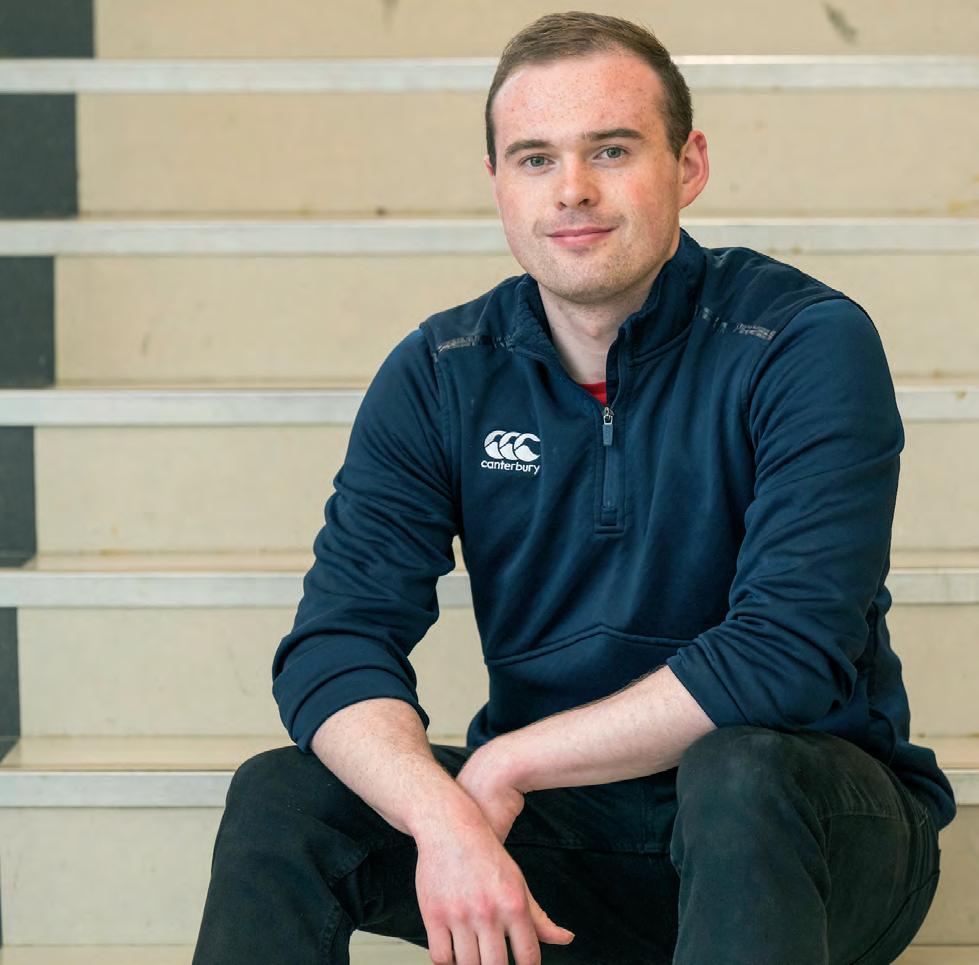
In secondary school, I always had a fascination with science. My passion was especially driven by curiosity about the biological processes of the human body. What makes up the contents of a cell? How do cancers and diseases develop?
I wished to pursue medical knowledge that could answer these kinds of questions while also preparing me for a professional role in healthcare. Medical Science was the course that fulfilled these goals. It offered a clear path into an accredited profession, working in medical laboratories as a medical scientist, while also providing additional career prospects in research or industry.
This exciting degree is the first of its kind in the West of Ireland. Public Health Nutrition focuses on the promotion of good health through nutrition and the primary prevention of nutrition-related illness in the population. Students on this programme will develop, implement and evaluate nutrition policies and programmes. They will apply scientific knowledge to understand the impact of food and diet on health and well-being and students will work to improve the diet, nutrition and health of individuals and communities.
atu.ie/AU663
4 Years
357 (Level 8 2024)
Minimum Entry Requirements PLUS
• Garda Vetting
32 Places
Work Placement
Dr Evelyn Hannon
Programme Chair evelyn.hannon@atu.ie
This degree includes a 12-week professional work placement in Year 3.
Career opportunities in this field are rapidly developing for graduates who understand the connections between nutrition and public health. Graduates can work in advisory positions focused on weight management, healthy eating, and food safety, as well as in health promotion and health improvement roles. They may also engage in project delivery or advisory work with government agencies, research and data analysis, the food industry, school nutrition initiatives, and international public health organisations.
ATU Honours Level 8 qualifications are recognised worldwide for postgraduate entry. Graduates will be eligible to pursue research MSc/PhD courses in Nutrition and related areas as well as taught masters’ courses in cognate areas. ATU developed a number of taught Masters courses for Public Health Nutrition graduates.
The BSc (Hons) in Public Health Nutrition is accredited with the Association for Nutrition (AfN).
An AfN accredited degree programme sets graduates apart in the job market, giving them an edge over non-accredited graduates. It signifies professionalism, quality, and assures employers that graduates have acquired necessary competencies and adhere to ethical standards.
Association for Nutrition (AfN)
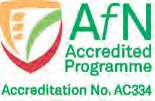
Year 1
• Academic and Professional Skills
• Mathematics/Statistics
• Chemistry
• Anatomy and Physiology
• Fundamentals of Biomechanics
• Cell Biology/Genetics
• Principles of Food and Nutritional Science
Year 2
• Human Nutrition and Metabolism
• Human Physiology
• Food Science and Technology
• Nutrition, Physical Activity and Health
• Evaluating the Evidence for Public Health Nutrition
• Molecular Biology
• Immunology
• Biochemistry
3
• Nutrition through the Life Cycle
• Personal and Professional Development for Nutritionists
• Applied Research Methods
• Community Nutrition and Food Policy
• Professional Placement
Year 4
• Clinical Nutrition
• Health Promotion
• Current Research in Sport, Exercise and Nutrition
• Advanced Food Science – Food Commodities and Ingredients
• Nutrition Controversies
• Research Project in Public Health Nutrition
• Global Perspectives in Nutrition
• Nutritional Epidemiology
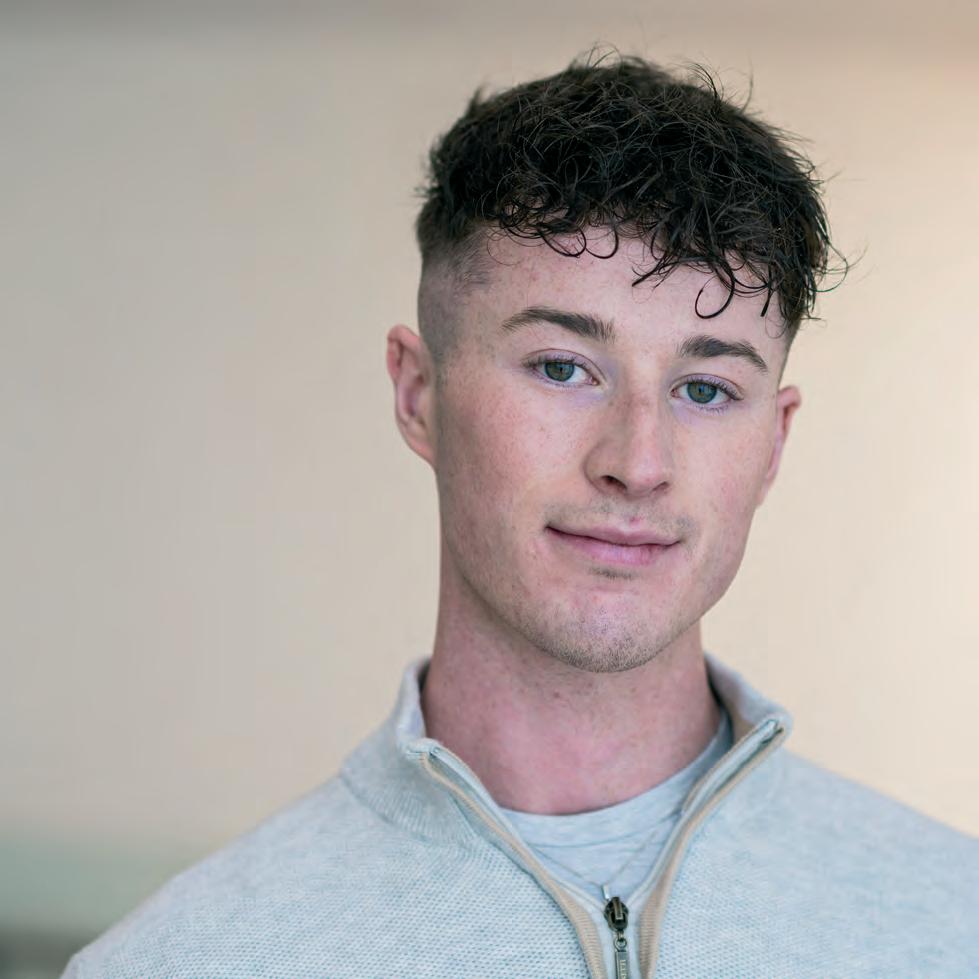
I chose this course because I have a personal interest in nutrition. I’m also passionate about health and fitness, particularly how proper nutrition supports strength, muscle growth, and weight loss.
Travelling to Australia for my work placement was an amazing opportunity, and I’m so grateful to have had the chance to do it. I met incredible people in the field of nutrition, collaborated with them on a published paper, and have stayed in touch for future opportunities. My time in Australia was unforgettable, and I highly recommend it to anyone considering doing their placement there.
During this programme, students will learn how to apply scientific principles in order to understand and enhance sport and exercise performance, health, nutrition and well-being. It will prepare students to work in the world of sport, helping athletes and teams achieve optimum performance. It will also prepare students to work in the health sector, helping individuals to manage or prevent lifestyle-related chronic diseases through training and physical activity.
atu.ie/AU662
4 Years
356 (Level 8 2024)
Minimum Entry Requirements PLUS
• Garda Vetting
48 Places
Work Placement
Damien Costello Head of Department of Sport, Exercise & Nutrition damien.costello@atu.ie
Students can expect a strong focus on practical learning, work placement and projects. Much of the learning will take place in specialised classrooms and our dedicated performance analysis laboratory. Students will develop a thorough understanding of the three main disciplines of sport and exercise science: physiology, psychology, and biomechanics.
The demand for sport and exercise scientists continues to grow, with ever-increasing job opportunities within the health sector, recreational and competitive sport. Graduates will be able to work in areas such as professional sports clubs and organisations, national sporting associations, governing bodies and other related sporting agencies, public sports and recreation facilities, local authorities, education, exercise referrals, health sector and private health and fitness clubs.
ATU Honours Level 8 qualifications are recognised worldwide for postgraduate entry.
This programme is accredited with the Register of Exercise Professionals (REPS) Ireland. It is also designed to fulfil the initial requirements for the British Association of Sport and Exercise Sciences (BASES) accreditation. BASES is an internationally recognised standard, leading to exciting and varied career opportunities for graduates.
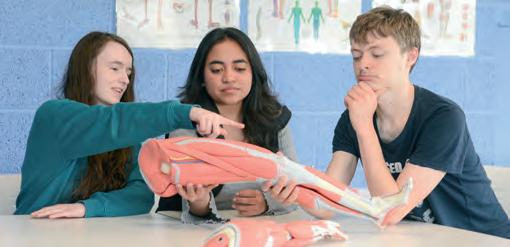
Year 1
• Academic and Professional Skills
• Mathematics/Statistics
• Chemistry
• Cell Biology/Genetics
• Anatomy and Physiology
• Fundamentals of Biomechanics
• Fundamentals of Sport and Exercise Science
• Sport and Exercise Physiology
• Human Nutrition and Metabolism
• The Biomechanics of Human Movement
• Nutrition, Physical Activity and Health
• Introduction to Sports Psychology
• Research Methods for Sport and Exercise Science
• Exercise Instruction
• Applied Sport and Exercise Psychology
• Sport and Exercise Pedagogies
• Sport and Exercise Biomechanics
• Advanced Laboratory Technique for Sport and Exercise Science
• Sport and Exercise Prescription and Training
• Applied Sport and Exercise Nutrition
• Sports Management
• Contemporary Issues in Sport and Exercise Science
• Applied Sport and Exercise Physiology
• Current Research in Sport, Exercise and Nutrition
• Research Project in Sport and Exercise Science
• Professional Skills Sport and Exercise
• Science Placement (12 weeks)
Additional elective modules may be available throughout the programme.
This programme is accredited with the Register of Exercise Professionals (REPS) Ireland.
This programme is ideally suited to individuals who are passionate about playing or coaching sport or want a career in the sporting or fitness industry. It is a practically applied coaching degree, with a variety of sporting opportunities, populations, and environments where students will put theory into practice. Students will have the opportunity to complete a number of coaching accreditations with National Governing Bodies such as the FAI, GAA, and Athletics Ireland.
atu.ie/AU664
4 Years
318 (Level 8 2024)
• Garda Vetting
32 Places Minimum Entry Requirements PLUS
Dr Denise Martin Programme Chair denise.martin@atu.ie Work Placement
Special Features
This programme will provide students with the required theory and practical knowledge to meet the Teaching Council requirements to undertake the Professional Master of Education (PME) programme to become a secondary school teacher of Physical Education (PE).
Graduates can pursue diverse roles such as professional coaches, sports development officers, fitness instructors, health promotion, researchers, and more. Opportunities span national and international spheres, including governing bodies like Athletics Ireland and FIFA. They can work in government agencies academic institutions, private health clubs, sports management firms and even explore the sports technology sector with global leaders like Orreco and StatsPerform.
Further Study Options
Students who successfully complete this programme can then apply for MSc in Strength and Conditioning, MSc in Sport Nutrition, MSc Physical Education (PME).
ATU Honours Level 8 qualifications are recognised worldwide for postgraduate entry.
During their first year, students must complete a first aid course and safeguarding course to be able to participate in placements in Year 2.
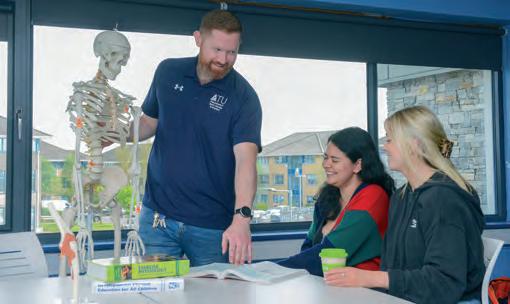
Year 1
• Academic and Professional Skills
• Introduction to Fundamental Motor Skills and Behaviour
• Sociology of Sport and Coaching
• Anatomy and Physiology
• Fundamentals of Sport and Exercise Science
• Mathematics and Statistics
• Coaching Science/Education 1
– Athletics and Team Sports Year 2
• Understanding Coaching Practice
• Sport and Exercise Pedagogies
• Coaching Science/Education 2
• Micro Coaching
• Coaching Children and Youths
• Nutrition, Physical Activity and Health
• Placement 1 – National School (Semester 2)
• Introduction to Sports Psychology
• Exercise Instruction
• Introduction to Adapted Physical Activity
Year 3
• Placement 2 – Disability and Inclusivity (Semester 1)
• Ethical Issues in Sport
• Talent Development and Coaching
• Performance Analysis for Coaches
• Adventure Activities – Leading in the Outdoors
• Introduction to Sport Marketing
• Research Methods for Sport Coaching
• Sport and Exercise Prescription and Training
Year 4
• Placement 3 – Industry (Semester 1)
• Sports Management
• Contemporary Issues and Advances in Sport Coaching
• Athlete and Performance Monitoring
• Group Dynamics, Athlete and Coach Welfare in Sport
• Research Project in Sports Coaching
Additional elective modules may be available throughout the programme.
AU677 | Level 8 | Bachelor of Science (Honours)
AU577 | Level 7 | Bachelor of Science
Studying Computing and Digital Media offers opportunities in computational problem-solving, programming, networking, software testing, and practical applications including 2D/3D graphics, animation, gaming, dynamic web, video production, and database technologies. Hands-on experience with software toolkits and a diverse skillset, including communication, creativity, problem-solving, and attention to detail, equips students to excel in current and emerging tech fields.
atu.ie/AU677
atu.ie/AU577
3/4 Years
300 (Level 8 2024)
254 (Level 7 2024)
Minimum Entry Requirements
72 Places
Valerie Butler Programme Chair valerie.butler@atu.ie
Computing and Digital Media programmes place strong emphasis on practical skills. Students work individually and in groups on diverse project themes. Led by passionate, student-centred, and teaching-focused academic staff, students receive guidance and mentorship throughout their studies. Practical classes are limited in size to ensure personalised attention. The on-campus, interactive environment fosters creative thinking, interpersonal and project management skills. Students gain practical experience and develop the competencies required to excel in tech careers.
Graduates can anticipate fantastic career opportunities in the thriving technology sector. With a comprehensive skillset in Computing and Digital Media, they are primed for roles in software development, the games industry, digital marketing, multimedia production, and tech project management. Their adaptability prepares them for future jobs yet to be realised, driving innovation in an ever-evolving tech landscape. The possibilities are endless, making this an exciting and future-proof career path.
Upon successfully completing Year 3, Level 7 students can apply internally to study Year 4 of the Level 8 BSc (Hons) Computing and Digital Media programme.
ATU offers a wide range of postgraduate programmes. ATU qualifications are also recognised worldwide for further study and postgraduate entry.
Year 1
• Introduction to Digital Graphics and Design
• Web Design & Development
• Software Development
• Essential Mathematics for Computing
• Academic and Professional Skills
• Social Computing
• Computer Technology
• Digital Narratives
Year 2
• Audio Video Design & Production
• 3D Modelling & Animation
• Applied Digital Media
• Object Oriented Computing
• UX Design Principles
• Database Development
• IT Professional Skills
• Essential Networking
Year 3
• Interaction Design
• Digital Marketing
• Project Management
• Dynamic Web Development Framework
• System Analysis Methods
• Work Placement
Year 4 (Level 8)
• 3D Game Design and Development
• Virtual and Augmented Reality
• Mobile Applications Development
• Data Analytics and Visualisation
• Secure Web Applications
• Software Testing
• Advanced Topic Seminars
• Portfolio
• Final Year Project
Additional elective modules may be available throughout the programme.
Software development focuses on solving problems, designing and implementing new applications, and enhancing skills in communication, leadership, and management. Programmes emphasise practical programming skills, problem-solving, and applying computer science theory to real-world issues. Students become proficient in languages like Java and C#, learning to design, create, and test software solutions in a world increasingly shaped by AI, sustainability, mobility, connectivity, heterogeneity, and Big Data.
atu.ie/AU676
atu.ie/AU576
3/4 Years
341 (Level 8 2024)
263 (Level 7 2024)
Minimum Entry Requirements
96 Places
Work Placement
Erasmus+
Gareth Roe Head of Department of Computer Science and Applied Physics gareth.roe@atu.ie
These programmes are highly practical with an emphasis on “learning by doing”.
Graduates can look forward to excellent career opportunities in software development roles with both indigenous and multinational companies.
The career opportunities of a Software Development graduate are varied. Students may pursue postgraduate studies and/or find employment in roles such as a software developer, IT support, IT developer, games adviser or an application programmer.
Upon successfully completing Year 3, Level 7 students can apply internally to study Year 4 of the Level 8 BSc (Hons) Computing in Software Development.
ATU offers a wide range of postgraduate programmes. ATU qualifications are also recognised worldwide for further study and postgraduate entry.
Over the last 10 years, 90%+ of graduates have found employment in the ICT industry within six months of completing the programme.
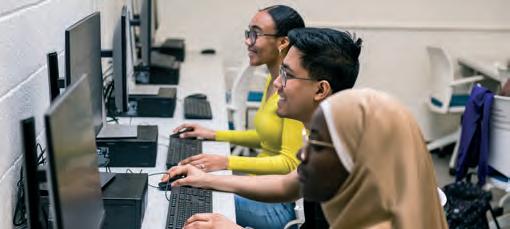
Year 1
• Graphic User Interface and Web Development
• Software Design and Program Development
• Essential Mathematics for Computing
• Computer Technology
• Introduction to Digital Graphics & Design
• Academic and Professional Skills
Year 2
• Software Design and Program Development
• Systems Analysis Methods
• Applied Networking Technologies
• Data Structures and Algorithms
• IT Professional Skills
• Procedural Programming
• Database Development
• Software Quality and Testing
• Front End Web Development
• Cross-Platform Application Development
Year 3
• Operating Systems
• Data Representation
• Web Applications Development
• Writing Secure Software
• Database Management Systems
• Software Internship / Professional Practice
• Object Oriented Programming
• Graphics Programming
Year 4 (Level 8)
• Advanced Cross-Platform Application Development
• Research Methods in Comp and IT
• Advanced Software Design
• Gesture Based UI Development
• Applied Project and Minor Dissertation
• Artificial Intelligence
• Distributed Systems
• Software Engineering
• Emerging Technologies
• Computational Theory
Additional elective modules may be available throughout the programme.
Campas Chathair na Gaillimhe, Bóthar Pháirc an Tobair
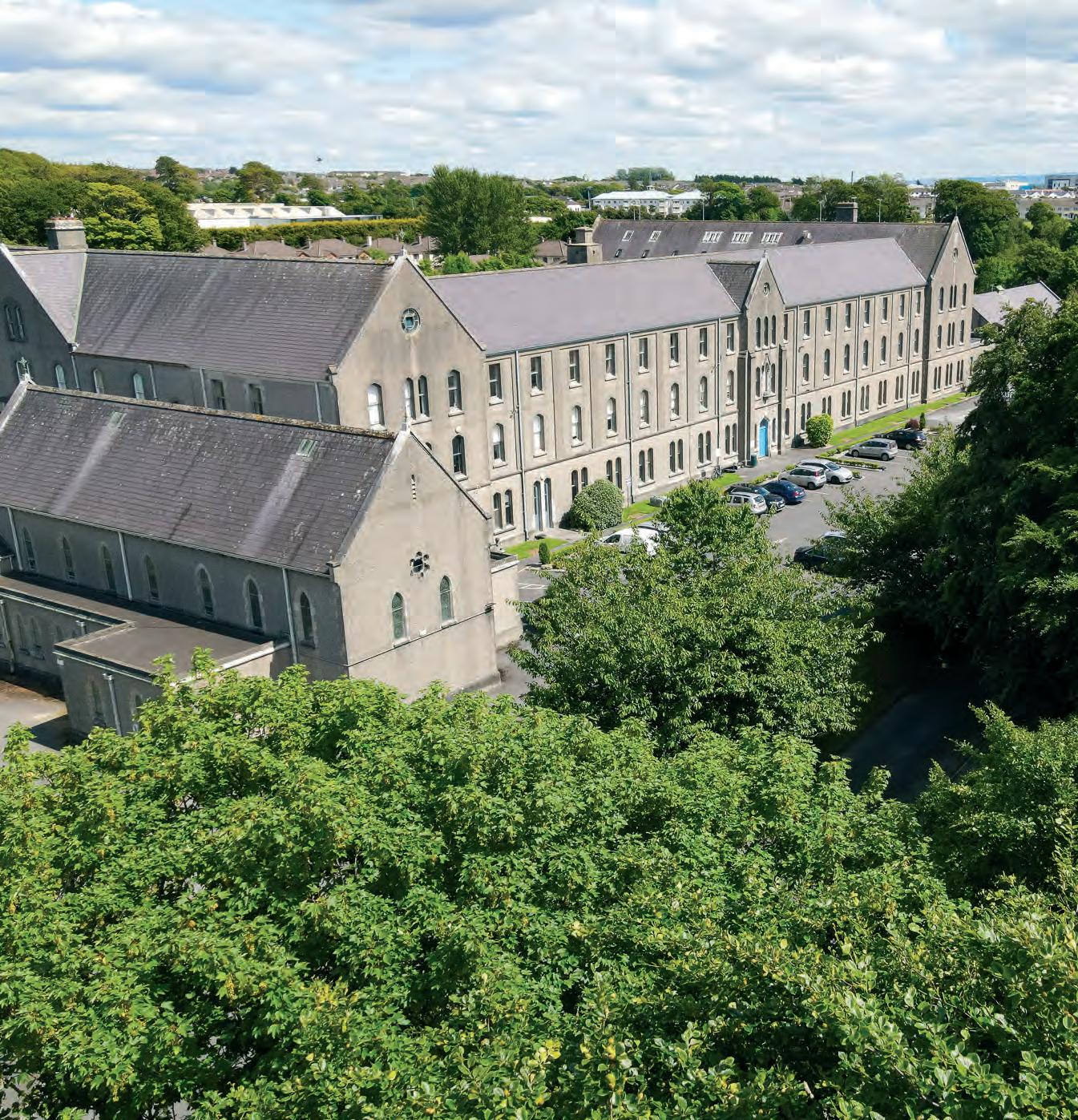


The Galway City, Wellpark Road campus offers undergraduate programmes across a wide range of disciplines, in addition to postgraduate, part-time and professional development programmes.
Located on the east side of Galway City, the Galway City, Wellpark Road campus is a vibrant hub for creativity and home to numerous creative enterprises. This dynamic campus offers a wide array of programmes, including art, design, graphic design and illustration, product design, interior design, textile and fashion design, film and documentary, communications, media, and storytelling, animation and game design, and post primary teaching (Art, and Design & Communication Graphics).
The Wellpark Road campus has specialised creative spaces which include edit suites, virtual production studio, art and design studios, several PC computer labs, animation studios, XR studio, recording studio, sculpture & ceramic workshops, drawing studios, textile workshops, prototyping workshops, and digital fab labs. The distinctive library provides quiet study spaces, free Wi-Fi, computing, and printing facilities.
Students are the focus of the learning experience, and we empower them to be successful at third level and in their future careers.
The Galway City, Wellpark Road campus is home to the CREW Innovation Hub supporting new business start-ups.
This campus offers language and culture module in Gaeilge as part of the Film and Documentary degree. With skilled language lecturers, ATU offers a unique learning approach, opportunities for career growth and personal development.
Students on the Design programmes can avail of Erasmus+ and placement opportunities, enhancing job prospects in the global economy.
All initial teacher education programmes include school placement experiences in postprimary schools.
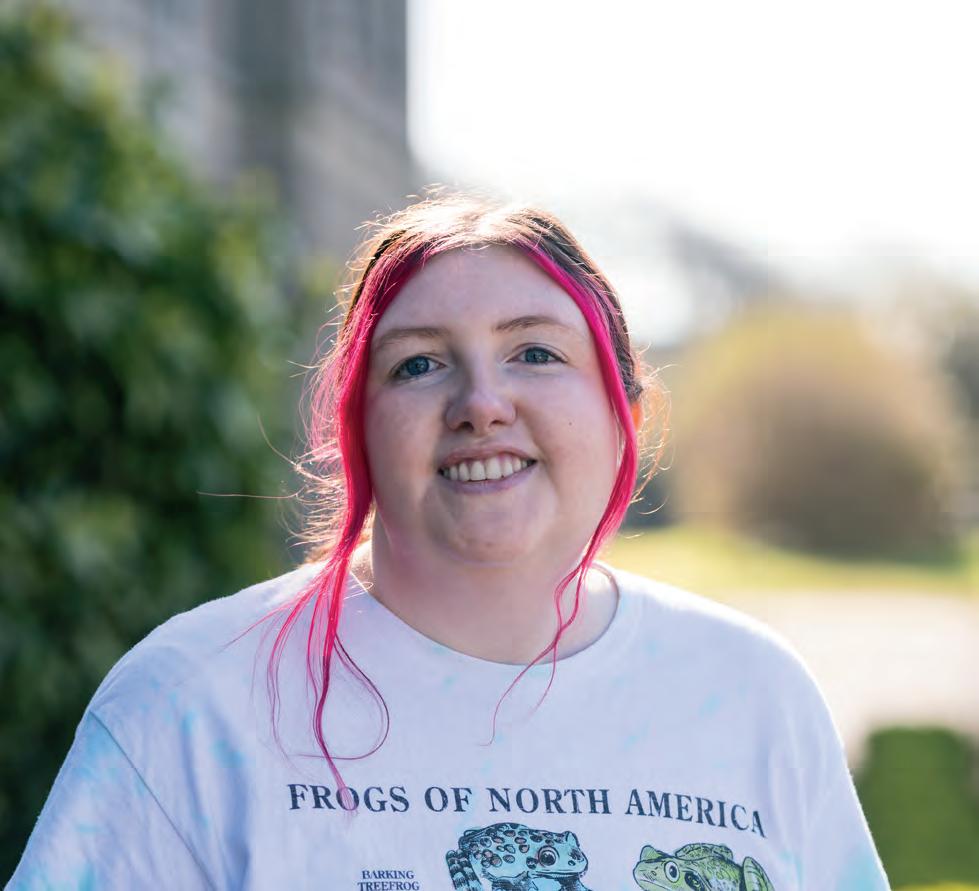
I’ve always found fulfilment in the process of making and creating, often preferring hands-on, creative activities over physically demanding work or traditional academic study. This inclination played a central role in my decision to pursue a course that nurtures and develops my artistic talents.
What I’ve enjoyed most about my course is the wide range of options and opportunities it offers for both creative and technical exploration. When I began the programme, I didn’t anticipate learning skills such as welding, yet it has unexpectedly become my preferred medium. The diversity of the curriculum has helped me to discover new interests and expand my creative practice in ways I hadn’t imagined before.
AU618 | Level 8 | Bachelor of Arts (Honours)
AU518 | Level 7 | Bachelor of Arts
These art degrees are dynamic and visually driven programmes. Students are challenged to address traditional, contemporary, conceptual, conventional, and experimental approaches to thinking, making, performing, and writing about art in today’s world. Skills are delivered in ceramics, sculpture, digital media, drawing, filmmaking, painting, photography, printmaking, professional practice and curation in tandem with academic research and writing skills in art history and critical theory.
atu.ie/AU618
atu.ie/AU518
3/4 Years
838* (Level 8 2024)
513* (Level 7 2024)
Year 1
• 2D, 3D & contextual studies/ studio
• Photography and Digital Media
• Drawing Colour and Structure
• Critical Theory
• History of Art 1: Introduction
• Academic and Professional Skills
Year 2
• Interdisciplinary Drawing
• Critical Theory
• History of Art 2: Modernism Matters
Year 3
• Visual Culture
• Professional Practice (Exhibition)
• Exhibiting Contemporary Art
Year 4 (Level 8)
* Visual Arts e-portfolio
40 Places Minimum Entry Requirements PLUS
Katherine West Programme Chair katherine.west@atu.ie Erasmus+
Learners are exposed to a myriad of technical and creative possibilities within their modules through lectures, workshops, demonstrations, seminars, tutorials and visits to exhibitions, galleries, and museums.
Graduates of this programme can pursue careers as artists, painters, sculptors, printmakers, or ceramicists. They can also explore roles in digital art, art education, blogging, cultural commentary, art criticism, photography, printmaking, arts administration, public art, community arts, museum or gallery assistance, educational roles, exhibition guiding, or arts research.
Level 7 graduates may apply internally for Year 4 of the Level 8 programme. ATU Level 8 qualifications are recognised worldwide for postgraduate entry. This programme is designed to meet the Teaching Council requirements to undertake the two-year Professional Master of Education (PME) to become a secondary school teacher of Art.
* The points listed above include additional points awarded for the portfolio which are added to the Leaving Certificate points. Details of the ePortfolio can be found on the programme webpage, atu.ie/AU618 or atu.ie/AU518.
• Critical Theory: Research Methods and Dissertation
• Sustaining Practice
Additional elective modules are available throughout the programme.
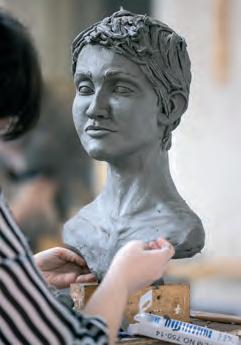
The Film and Documentary programme provides students with specialised knowledge of the history, theory and practical working of documentary and filmmaking. Students learn through lectures and projects, gaining expertise in screenwriting, cinematography, editing, production design, audio, and VFX. The programme includes practical assignments, and team collaborations, emphasising storytelling, technical proficiency, and critical analysis. Industry professionals regularly deliver seminars, preparing students for careers in film and media. Graduates emerge with a comprehensive portfolio and the ability to create impactful visual narratives.
atu.ie/AU615
3 Years
321 (Level 8 2024)
Minimum Entry Requirements
48 Places
Jill Beardsworth Programme Chair jill.beardsworth@atu.ie
The practical and technical skills options include such specialist areas as screenwriting, editing, sound, production design, cinematography and VFX (visual effects).
Graduates will acquire specialist skills, positioning them well for the competitive film and documentary industry, both nationally and internationally. Career paths include screenwriting, script editing, research, editing, post-production coordination, sound recording, sound design, production design, cinematography, visual effects, directing, producing, production management, assistant directing, location management, and more.
ATU Level 8 qualifications are recognised worldwide for postgraduate entry.
Organisations on campus, who contribute to the programme, include Ardán (A platform for creative talents in Film, TV, Games and Animation), RTE, UNESCO City of Film, CREW (Creative Enterprise West), WRAP (Western AudioVisual Producers) fund and Creative Europe.
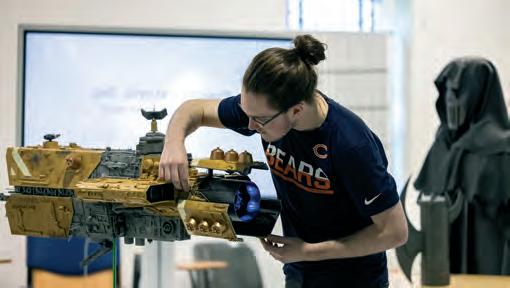
Year 1
• Screen Writing
• Editing
• Production Design
• Production Practice
• Broadcasting Theory
• Film Studies: An Introduction
• Academic and Professional Skills
• VFX
• Audio
• Cinematography
• Film Practice 1: Documentary
Year 2
• Production Practice
• Film Practice 2: Fiction
• Documentary Studies
• Visual and Critical Studies
Year 3
• Dissertation: Media
• Production Practice: Entrepreneurship
• Production Practice: Project Management
• Small Screen Studies
• Film Studies: Critical Approaches
Additional elective modules are available throughout the programme.
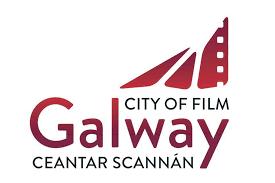
Crafting stories with the power to change how we think, feel and act is central to Communications, Media and Storytelling. In the age of social media and smartphones, people are receiving and reacting to more stories and information than ever before from a variety of platforms. With subjects including photography, camera, audio, editing, podcasting, web design and the use of social media. This programme offers students the vital skills necessary to develop and deliver stories through various media platforms.
atu.ie/AU616
3 Years
303 (Level 8 2024)
Minimum Entry Requirements
24 Places
Jim Vaughan Programme Chair jim.vaughan@atu.ie
The programme is aimed at students who wish to pursue a career in the digital communications area. It will include key subjects that inform the digital media sphere, including local journalism, marketing and advertising, advocacy, campaigning, community awareness and digital communication.
Students learn how to create trustworthy, accurate content, script writing and presentation for the digital age, by ethically mastering and utilising different digital communication platforms.
Graduates are equipped to work in a variety of industries and sectors including public, community, NGOs, education, corporate relations and creative agencies.
Career opportunities could include working as content creators, scriptwriters, photographers and photojournalists, podcasters, and bloggers. Graduates also find employment in commercial and industrial enterprises, film production, the news industry, and radio, TV and print industries.
ATU Level 8 qualifications are recognised worldwide for postgraduate entry.
This is a degree for the digital information era, aimed at those who want to work in the media and communication industry in a wide range of capacities. These could include marketing, advertising, community or public relations, news reporting, citizen journalism, blogging, influencing, etc.
Year 1
• Cinematography
• Editing
• Audio
• Academic and Professional Skills
• Marketing Principles
• Culture and Society
• Website Design and Social Media Presence
• Digital Storytelling 1: Imagery
• Introduction to Public Relations
• Broadcasting Theory
• Film Making with DSLR
• Community Voices: Online Hub
• Digital Storytelling 2: Writing in Context
• Culture and Society
• Technical Production Skills
• Visual and Critical Studies
• Public Relations, Community Engagement and Advocacy
Year 3
• Other Voices: Online Hub
• Fieldwork: Local Stories
• Ethics and the Digital Age
• Dissertation: Media
• Social Web/Digital Media Strategy
• Production Practice: Entrepreneurship
• New Media and Technologies
The demand for digital content creators with titles such as Content Coordinator, Writing Consultant, Podcaster and Blogger is growing. The global influencer market is worth $33 billion in 2025. It is expected to continue to grow to $35 billion by 2033.
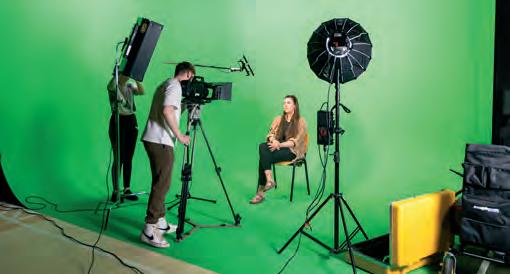
This teacher education programme qualifies graduates to teach both Art and Design and Communication Graphics (DCG) in Irish post-primary schools. Students will develop their creative skills and learn to apply emerging technologies to enable them to master the subjects of Art and DCG. Education theory and practice of teaching are core elements of the programme and students are given an opportunity each year during school placement to develop their teaching skills in supportive and inclusive school environments.
atu.ie/AU620
4 Years
410 (Level 8 2024)
Minimum Entry Requirements PLUS
• H5 in Art or DCG
• O6/H7 Maths
• Fitness to Practice
• Garda Vetting
20 Places
Work Placement
John Langan Programme Chair john.langan@atu.ie
A career in teaching is highly stimulating and rewarding. Teachers make a real impact on young people's lives. The subjects of Art and DCG allow pupils to express themselves creatively and the teacher plays an important role in nurturing their pupil's passion for these subjects. Through our expert staff and small class groups, the programme will provide all the structures, resources and facilities for graduates to become subject experts and excellent teachers. Learning on this programme is combined with practical skill-based assignments, applied technology, educational theory and professional teaching practice, providing a rich and varied learning experience for students.
Graduates of this programme will be qualified to teach Art and Design and Communication Graphics to Senior Cycle honours level. They can also teach Visual Art and Graphics at Junior Cycle level. Graduates will also have a suite of skills that are highly sought-after in other fields of work including design, 3D modelling and visual and graphic communication.
On completion of this course, graduates can apply for postgraduate programmes in related areas.



• Academic and Professional Skills
• Design Process
• Creative DisciplinesArt and Design
• Technical Graphics
• School Placement 1 (1 week)
• Visual Culture and Critical Studies
• Art Elements and Design Principles (Drawing - 2D and3D)
• Graphics and Computer Applications
• Visual Culture and Critical Studies
• Education Projects 2 (Art, Design and Technology)
• Design Process
• Creative DisciplinesArt and Design
• Theory of Teaching and Learning
• School Placement 2 (3 weeks)
• Creative DisciplinesArt and Design
• School Placement 3 (1 Semester)
• Curriculum and Assessment
• Education for Inclusivity and Diversity
• Education Studies
• Education Projects 3 (Art, Design and Technology)
• Applied Graphics
• Creative DisciplinesArt and Design
• School Placement 4 (1 Semester)
• Advanced Graphics
• Professional Studies
• Practitioner Research
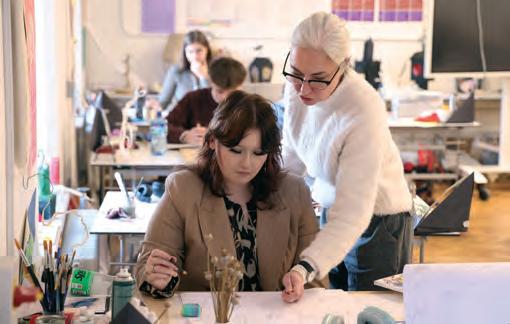
Riona Vielreicher
BEd (Hons) in Art and Design & Communication Graphics

I am a second-year student, studying to become an art and graphics teacher at post-primary level. After many conversations with different people, it became clear to me that I wanted to be a teacher. Art has always been a major passion of mine, and the idea of passing that on to future students excited me.
Graphics, on the other hand, was never a subject I was formally taught, but I often spent my free time working on projects that used graphic design skills. The programme I’m studying is the only one in Ireland that offers this subject combination. I didn’t pick ATU for that reason alone. I visited Galway City briefly before applying and fell in love with the city. I could easily see myself living here full-time.
• Product Design
• Interior Design
• Graphic Design and Illustration
• Textile and Fashion
This common entry pathway in Design allows students to explore various design disciplines before focusing on their preferred specialist area in the second semester. In Year 2, they transfer to Product Design, Graphic Design and Illustration, Interior Design or Textile and Fashion Design, subject to availability. The programme explores both traditional and digital design skills across all four disciplines. Students learn methods and techniques to research, develop and realise their creative vision as a designer.
atu.ie/AU519
3 Years
271 (Level 7 2024)
Minimum Entry Requirements
40 Places
Work Placement
Tina Byrne Programme Chair tina.byrne@atu.ie Erasmus+
Students will develop real-world design skills through links created with industry, in the form of live projects and placement.
Design is a high-growth industry sector, offering graduates exciting career opportunities. Graduates are on a pathway to become interior designers, product designers, graphic designers, illustrators and fashion and textile designers, in addition to a vast array of other design roles within each discipline.
• Academic and Professional Skills
• Design Studio
• Introduction to Design Pathways
• Design History and Theory
• Photography
• Digital Media
• Core Studio (Interior Design/ Graphic Design and Illustration/ Product Design/ Textiles for Fashion)
Students choose and transfer into one of the following degrees:
• Product Design
• Graphic Design and Illustration
• Interior Design
• Textiles and Fashion Design
Level 7 graduates from each degree speciality can apply internally for Year 4 to achieve a Level 8 award. ATU Level 8 qualifications are recognised worldwide for postgraduate entry.
Employers value our design graduates for their creative problem solving, excellent communication skills, IT literacy, flexibility, teamwork skills and visual presentation skills.
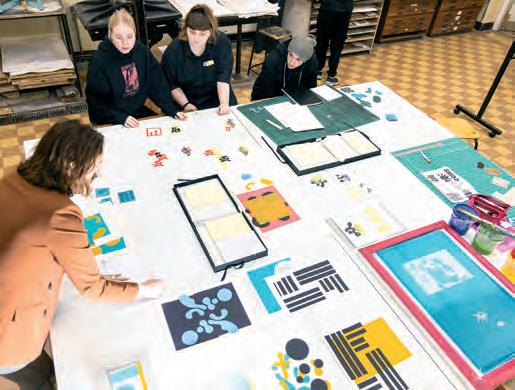
This Product Design programme provides students with the creative and technical skills needed to shape the products of tomorrow. Students dive into key areas such as manufacturing design, production methods, ergonomics, and human-centred innovation, learning how to create solutions that are both functional and user-friendly. The programme blends practical and theoretical learning, while a strong emphasis is placed on ethical and sustainable design, preparing students to make a positive impact in a rapidly evolving industry.
atu.ie/AU624
4 Years
Minimum Entry Requirements
20 Places 310 (Level 8 2024)
Work Placement
Erasmus+
Kenneth Nevin Programme Chair kenneth.nevin@atu.ie
Product Design graduates can progress to careers as product/ industrial designers, CAD specialists within design practices and threedimensional designers.
Many Product Designers collaborate in design teams with other designers to develop products and cross over into diverse areas such as user experience design (UX), theatre film and TV design, 3D computer design, graphic design or interior design.
ATU Level 8 qualifications are recognised worldwide for postgraduate entry.
A Level 7 Common Entry route is available for this programme. AU519 allows students to explore various design disciplines before focusing on their preferred specialist area, subject to space availability.
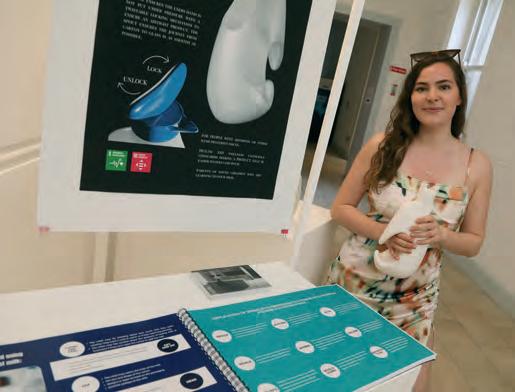
Year 1
• Academic and Professional Skills
• Design Studio
• Introduction to Design Pathways
• Design History and Theory
• Photography
• Digital Media
• Core Studio (Product Design)
Year 2
• Digital Tools
• Design Thinking and Theory
• Additive Manufacturing Design, Methods, and Processes
• Subtractive Manufacturing Design, Methods and Processes
• Ergonomics and Human-Centred Design
Year 3
• Contemporary Design Theory
• Advanced Digital Tools
• Professional Practice and Projects
Year 4
• Project Management and Costing
• Dissertation
• Entrepreneurship and Professional Practice
• Product Design and Innovation
• Human Centred Product Development
The degree features a full year of professional practice (with some online tuition) that can be experienced as a year-long industry placement, or a combination of placement and international exchange, or on-campus industry projects that link with industry partners nationally and internationally.
This degree offers flexibility after the first semester of Year 1 to transfer to one of our other design programmes; Interior Design, Product Design, Graphic Design and Illustration or Textile and Fashion Design.
Year 1
The Interior Design programme offers a creative and practical pathway for students passionate about transforming spaces into functional, beautiful, and meaningful environments. This degree blends artistic expression with technical knowledge, preparing students to design interiors that enhance how people live, work, and interact. Students learn about the design of interior spaces, 3D modelmaking, ergonomics and human-centred design, interior design, surface, materials and finishes.
atu.ie/AU622
4 Years
319 (Level 8 2024)
20 Places Minimum Entry Requirements
Work Placement
Erasmus+
Lynne O Loughlin Programme Chair lynne.oloughlin@atu.ie
Interior Designers can go on to specialise in areas such as a retail store designer, office designer, home interior designer, film and set designer, hotel and restaurant designer, exhibition and display designer, interior stylist or CAD technician.
ATU Level 8 qualifications are recognised worldwide for postgraduate entry.
The programme features a full year of professional practice (with some online tuition) that can be experienced as a year-long industry placement, a combination of placement and international exchange, or on-campus industry projects that link with industry partners nationally and internationally.
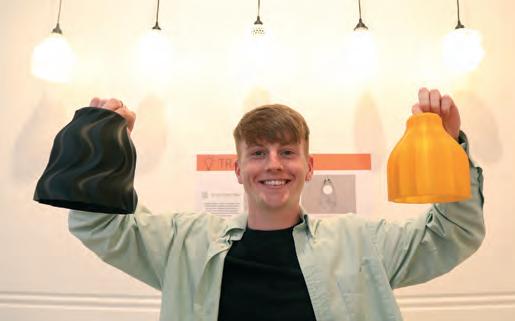
• Academic and Professional Skills
• Design Studio
• Introduction to Design Pathways
• Design History and Theory
• Photography
• Digital Media
• Core Studio (Interior Design)
Year 2
• Digital Tools
• Design Thinking and Theory
• Interior Design - 3D Modelmaking and Building Regulations
• Ergonomics and Human-Centred Design
• Textile and Surface Design
Year 3
• Contemporary Design Theory
• Advanced Digital Tools
• Professional Practice and Projects
Year 4
• Project Management and Costing
• Dissertation
• Entrepreneurship and Professional Practice
• Interior Design - Surfaces, Materials and Finishes
• Interior Design - Integrated Interior Design Project
• Building Information Modelling (Interior Design)
A Level 7 Common Entry route is available for this programme. AU519 allows students to explore various design disciplines before focusing on their preferred specialist area, subject to space availability. Successful graduates may progress to Year 4 to obtain their Level 8 award.
This degree offers flexibility after the first semester of Year 1 to transfer to one of our other design programmes; Interior Design, Product Design, Graphic Design and Illustration or Textile and Fashion Design.
Year 1
The Graphic Design and Illustration programme is a vibrant and hands-on course that empowers students to become visual storytellers and creative problem-solvers. It blends traditional and digital techniques to help students communicate ideas, evoke emotion, and influence audiences through powerful visual design. With a strong focus on creativity, innovation, and real-world application, this programme equips students with the skills and confidence to thrive in the fast-paced world of visual communication.
atu.ie/AU623 4 Years 20 Places 339 (Level 8 2024)
Minimum Entry Requirements
Graphic Designers and Illustrators can also go on to specialise in areas such as publishing, branding, user experience design, motion graphics, packaging, or advertising. Graduate careers include working as a digital designer, UX/UI designer, illustrator, art director and many more.
Work Placement
Erasmus+
Emma Hogan Programme Chair emma.hogan@atu.ie
ATU Level 8 qualifications are recognised worldwide for postgraduate entry.
The programme features a full year of professional practice (with some online tuition) that can be experienced as a yearlong industry placement, or a combination of placement and international exchange, or oncampus industry projects that link with industry partners nationally and internationally.
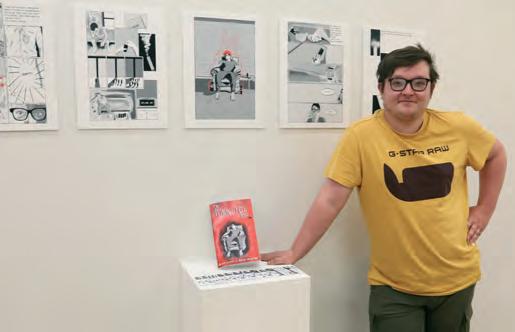
• Academic and Professional Skills
• Design Studio
• Introduction to Design Pathways
• Design History and Theory
• Photography
• Digital Media
• Core Studio (Graphic Design and Illustration)
Year 2
• Digital Tools
• Design Thinking and Theory
• Visual Communications
• Illustration
• Typography
Year 3
• Contemporary Design Theory
• Advanced Digital Tools
• Professional Practice and Projects
Year 4
• Project Management and Costing
• Dissertation
• Entrepreneurship and Professional Practice
• Visual CommunicationsMajor Project
• Advanced Digital Design
• Book Arts for Design
A Level 7 Common Entry route is available for this programme. AU519 allows students to explore various design disciplines before focusing on their preferred specialist area, subject to space availability. Successful graduates may progress to Year 4 to obtain their Level 8 award.
This degree offers flexibility after the first semester of Year 1 to transfer to one of our other design programmes; Interior Design, Product Design, Graphic Design and Illustration or Textile and Fashion Design.
Year 1
The Textile and Fashion Design programme offers a vibrant and hands-on learning experience for students passionate about fashion, textiles, and innovative design. This degree blends artistic exploration with technical expertise, preparing students to create original, sustainable, and trend-aware fashion and textile pieces. With a strong focus on creativity, innovation, and sustainability, this programme empowers students to shape the future of fashion and textiles.
atu.ie/AU621
4 Years
326 (Level 8 2024)
Minimum Entry Requirements
20 Places
Tony Magner Programme Chair tony.magner@atu.ie Erasmus+
Fashion and Textile Designers can go on to specialise in areas such as surface design, accessory design, pattern cutting, stylist, costume design and retail merchandising.
ATU Level 8 qualifications are recognised worldwide for postgraduate entry.
The programme features a full year of professional practice (with some online tuition) that can be experienced as a yearlong industry placement, or a combination of placement and international exchange, or oncampus industry projects that link with industry partners nationally and internationally.

• Academic and Professional Skills
• Design Studio
• Introduction to Design Pathways
• Design History and Theory
• Photography
• Digital Media
• Core Studio (Textiles for Fashion)
Year 2
• Digital Tools
• Design Thinking and Theory
• Fashion Concepts
• Textile and Surface Design
• Woven Textile Design and Practice
• Accessory Design
Year 3
• Contemporary Design Theory
• Advanced Digital Tools
• Professional Practice and Projects
Year 4
• Project Management and Costing
• Dissertation
• Entrepreneurship and Professional Practice
• Fashion Textile Research and Development
• 3D Construction
• Textile Fabrication
• Fashion Directions
A Level 7 Common Entry route is available for this programme. AU519 allows students to explore various design disciplines before focusing on their preferred specialist area, subject to space availability. Successful graduates may progress to Year 4 to obtain their Level 8 award.
This degree offers flexibility after the first semester of Year 1 to transfer to one of our other design programmes; Interior Design, Product Design, Graphic Design and Illustration or Textile and Fashion Design.
The Animation and Game Design programme is focused on world-building, both narratively and artistically, providing the skills and techniques necessary to create truly immersive worlds, environments and characters. Students will use 2D art and 3D modelling software, become versed in narrative design theory, learn advanced level design techniques and many more skills. These skills are widely sought after by a wide range of industries today or for those wishing to design and produce their own animated films and video games.
atu.ie/AU617
3 Years
401 (Level 8 2024)
Minimum Entry Requirements
48 Places
Gary Dempsey Programme Chair gary.dempsey@atu.ie
Graduates could be employed in various roles such as a game designer, level designer, narrative designer, environment artist, character artist, technical artist, background artist, layout artist, storyboard artist, 3D modeller, 3D/2D animator, character designer, production and direction.
ATU Level 8 qualifications are recognised worldwide for postgraduate entry.
Ireland’s animation industry is a steadily expanding international success story, whilst digital gaming is a sector that has seen exponential global growth in the past decade.
Animation is currently worth over €100m annually to the Irish economy, having doubled its growth since 2014 and with 85% of the output for overseas companies. In the video games segment, the number of users in Ireland is expected to reach 3.6 million by 2030.
Year 1
• Academic and Professional Skills
• Editing
• Digital Tools for Games and Animation
• Animation Studio & Theory
• Drawing
• Game Design Studio and Theory
• 3D Modelling
• VFX
• Screen Writing
Year 2
• 3D Modelling
• Drawing
• Audio for Games and Animation
• Digital Narrative for Games and Animation
• Visual and Critical Studies
Year 3
• Production Practice: Project Management
• Production Practice: Entrepreneurship
• Portfolio
• Critical and Contextual Studies
• Dissertation: Media
Additional elective modules are available throughout the programme.
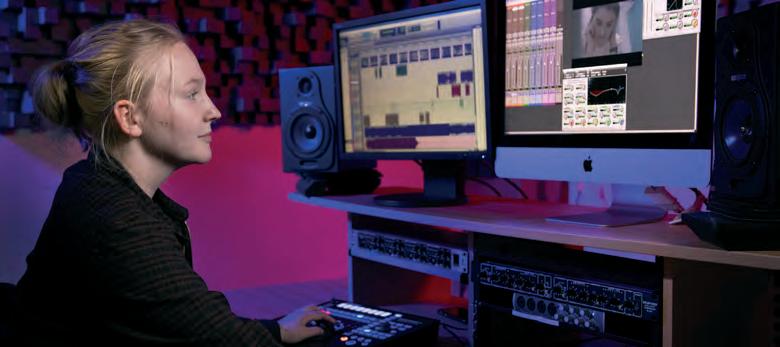
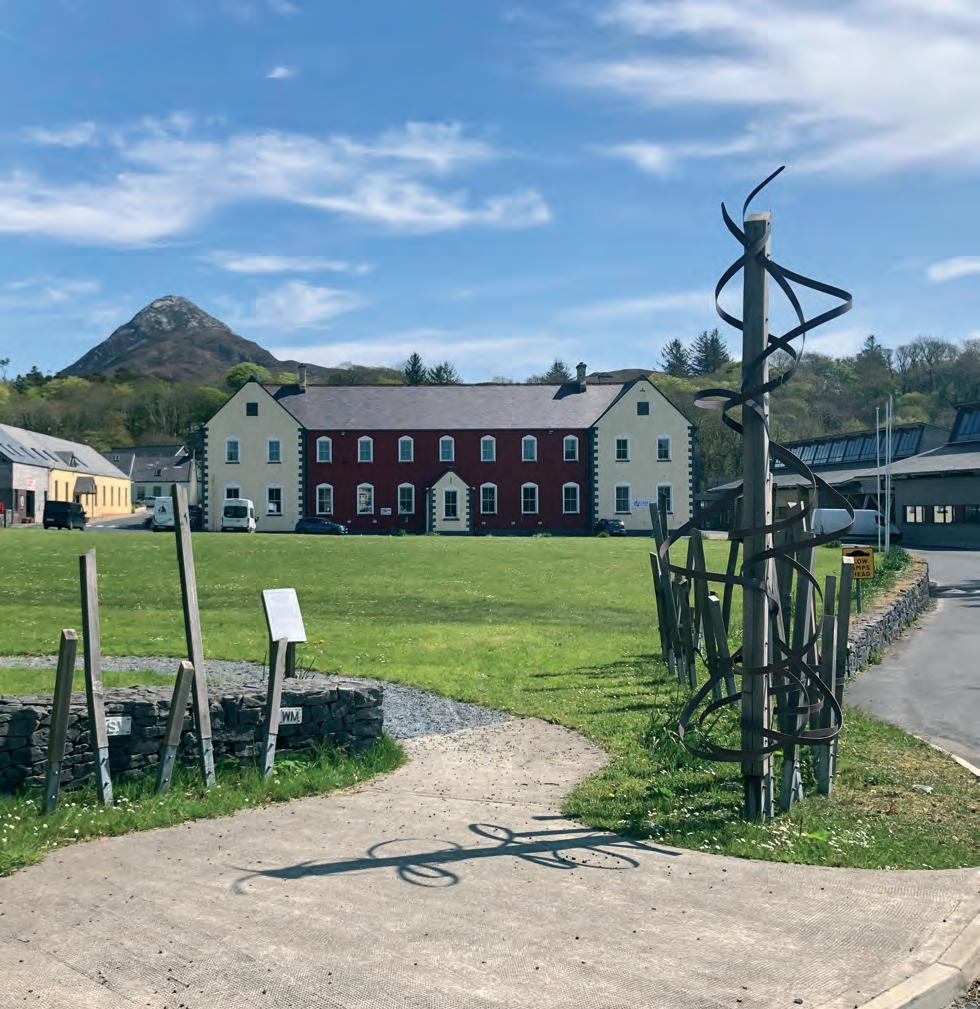
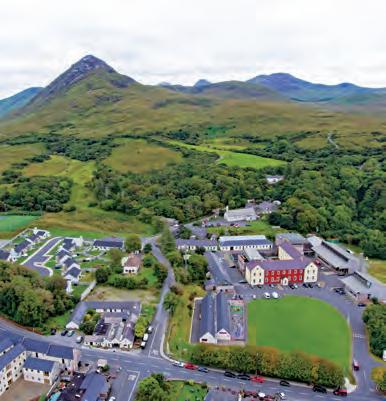
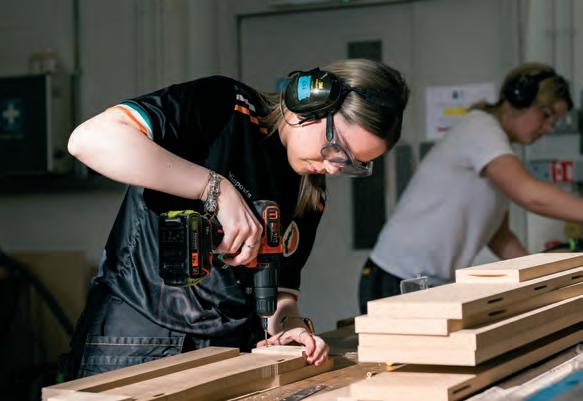
The ATU Connemara Campus is regarded both nationally and internationally as a leading provider of third-level programmes in furniture design and technology, and teacher education (design, graphics and construction).
Students benefit from learning their skills in state-of-the art facilities. Our machine halls and bench rooms are fully equipped and include CNC equipment, laser cutting technology, sawmill and drying kiln, computer labs with specialist CAD software, along with a range of other specialist wood processing machinery.
Our students frequently top award lists nationally and internationally. These include design and craft, IrelandSkills and WorldSkills, undergraduate and wood marketing awards.
Students regularly get to showcase their work at local, national and regional levels. This not only highlights their talent, it also allows students to engage with potential employers.
All students undertake a year long work placement in Year 3 as part of the industry-focused programmes, including overseas placement opportunities. Through placements, students broaden their understanding of how enterprises operate and deepen their knowledge through practice in a work environment. School placement in all four years for those on the Bachelor of Education degree provides experience of the classroom and the role of the teacher.
As a result of ATU Connemara Campus’ reputation and award-winning students, graduates are highly sought after within industry and boast an exceptional 100% record of employment upon graduation.
This teacher education programme enables graduates to teach both Construction Studies and Design & Communication Graphics (DCG) in Irish post-primary schools. Students will develop their creative and technical skills and learn to apply emerging technologies to enable them to master these subjects. Education theory and practice of teaching are core elements of the programme, and students develop their teaching skills during their placement in supportive and inclusive school environments. Year 1 and 2 are delivered at ATU's Connemara campus in Letterfrack. This programme requires students to undertake training on, and the use of, industrial woodworking equipment and machinery which is physically demanding.
atu.ie/AU680
4 Years
400 (Level 8 2024)
Minimum Entry Requirements PLUS
• H5 in DCG or Construction Studies
• O6/H7 Maths
• Garda Vetting
• Fitness to Practice
40 Places
Kevin Maye Programme Chair kevin.maye@atu.ie School Placement
Teachers make a real impact on young peoples’ lives and a career in teaching is highly stimulating and rewarding. Construction Studies and DCG are highly creative and technological subjects. The teacher plays an important role in nurturing their puplis’ interest and passion for these areas. Learning on this programme is combined with practical skill-based assignments, educational theory and professional practice, providing a rich and varied learning experience for students.
Graduates of this course will be qualified to teach Construction Studies and Design and Communication Graphics to Leaving Certificate Higher Level. They can also teach Graphics and Wood Technology at junior cycle level. Graduates will also have a suite of skills that are highly sought-after in other fields of work including construction, design, 3D modelling and visual and graphic communication.
On completion of this course, graduates can apply for postgraduate programmes in related areas.
First-year students must purchase tools, safety and design kits upon registering for this course which is sourced and specified by ATU (contact connemara.galwaymayo @atu.ie for more details)
Year 1
• Academic and Professional Skills
• Design Process
• Projects
• Manufacturing Skills
• Technical Graphics
• School Placement (one week)
• Materials and Technique
Year 2
• Graphics and Computer Applications
• Education Projects
• Manufacturing Skills
• Design Process
• Applied Technology
• Theory of Teaching and Learning
• School Placement 2 (three weeks)
Year 3
• Architectural Design
• School Placement 3 (one semester)
• Curriculum and Assessment
• Education for Inclusivity and Diversity
• Education Studies
• Education Projects
• Applied Graphics
Year 4
• School Placement 4 (one semester)
• Advanced Graphics
• Professional Studies
• Building Services and Technology
• Practitioner Research



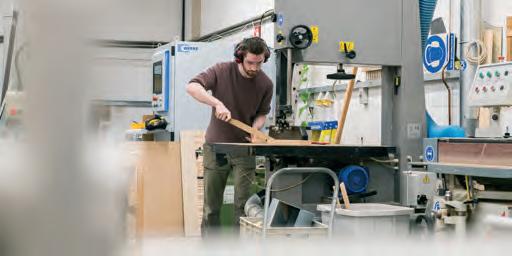
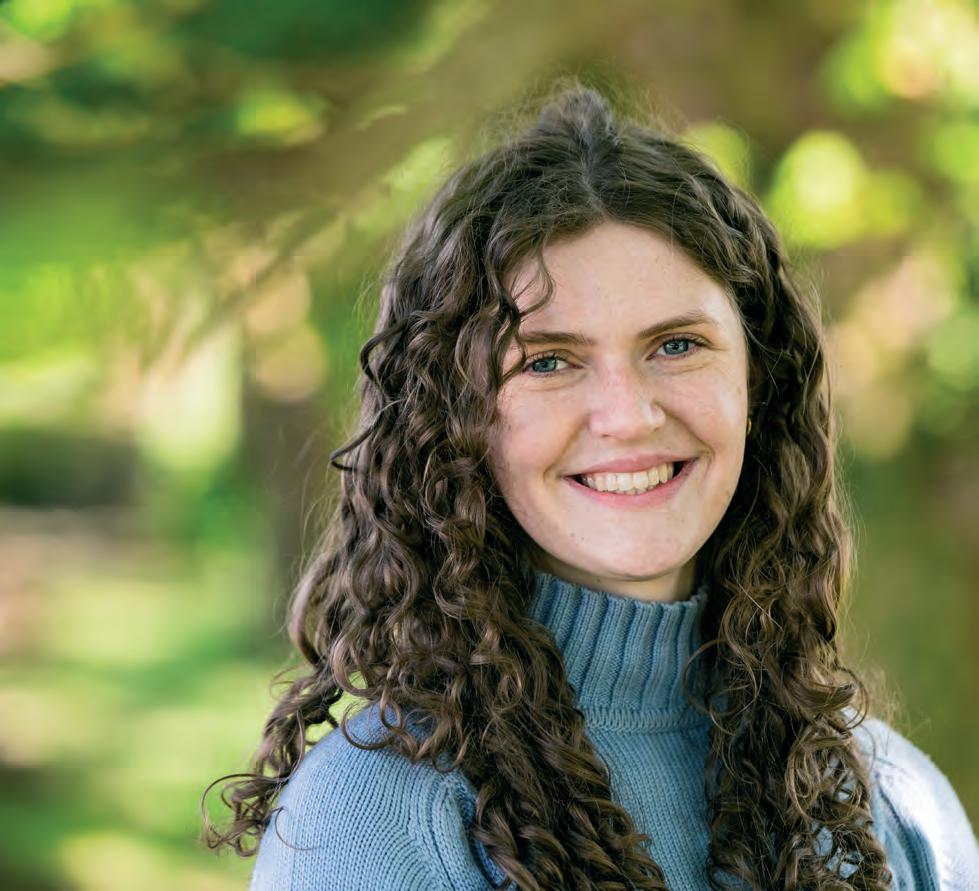
When my dad retired, he opened a woodworking shop, and I helped him out after school. I immediately fell in love with woodworking and knew it was what I wanted to do for the rest of my life. ATU was the only university I found during my research that offered a BSc in Furniture Making with hands-on woodworking.
The university also provided strong support for international students during the application process. My advice is to do your research and be clear about what you want to achieve during your time at university. ATU has so much to offer, and the lecturers in ATU's Connemara campus genuinely care about each student’s project and goals. It truly is a supportive learning environment for students.
AU683
AU583
• Furniture Design and Manufacture
• Furniture Making and Architectural Woodworking
These programmes are designed for those interested in pursuing an exciting career in the furniture and wood manufacturing industry. Students first develop skills in a wide range of furniture manufacturing techniques and computeraided design software. In the second year, students choose their preferred degree option. In the third year, a year-long work placement is undertaken in a company in Ireland or overseas. In Year 4, students further develop their technical, research and management expertise to allow them to pursue management roles within the furniture industry.
atu.ie/AU683 atu.ie/AU583
3/4 Years
409 (Level 8 2024)
320 (Level 7 2024)
Minimum Entry Requirements
40 Places
Work Placement
Erasmus+
Dr Kate Dunne Programme Chair kate.dunne@atu.ie
All students undertake a common first year before deciding which degree option to take. Subjects are designed to provide students with an introduction to furniture design and making techniques, materials, and equipment.
Currently there is 100% graduate employment for those wishing to enter the wood and furniture manufacturing industry following study in ATU Connemara campus. There is a very strong demand for our graduates who have a range of specific and transferrable skills which allows them to enter the segment of industry that most appeals to them, ranging from craft-based workshops to modern furniture manufacturers, both in Ireland and internationally.
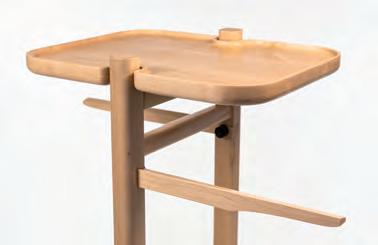
Year 1
• Projects
• Manufacturing Skills
• Design Elements
• CAD and Workshop Calculations
• Materials and Techniques
• Academic and Professional Skills
Year 2 +
Students choose and transfer into one of the following degrees:
• Furniture Design and Manufacture
• Furniture Making and Architectural Woodworking
In Year 1 the programme begins with an introduction to furniture design, making and technology and an exploration of each discipline. Towards the end of Year 1, students will be given presentations about their options for their degree pathway in Year 2, they can meet with current students, have discussions with their lecturers, review their academic results and assess their suitability for each degree option.
Students then select their preferred pathway, subject to places being available, choosing a degree option in:
• Furniture Design and Manufacture or
• Furniture Making and Architectural Woodworking
This programme is for a student who likes to solve problems using creative techniques and is interested in learning a range of skills to design and make contemporary and innovative furniture products. Students get an opportunity to develop skills in both traditional and advanced manufacturing techniques and learn how to apply the design process from concept through to fully finished furniture projects. Initially focusing on hand and power tools, students acquire skills to utilise a range of woodworking machinery including CNC technology.
atu.ie/AU681
4 Years
400 (Level 8 2024)
Minimum Entry Requirements PLUS
• O6/H7 Maths
20 Places
Work Placement
Erasmus+
Jeremy Madden Programme Chair jeremy.madden@atu.ie
Students take part in a year-long industry placement in Year 3 of this programme.
Currently, there is 100% graduate employment for those wishing to enter the wood and furniture manufacturing industry following study in ATU Connemara. There is a strong demand for our graduates who have a range of specific and transferable skills which allow them to enter the segment of the industry that most appeals to them, ranging from craft-based workshops to modern furniture manufacturers, both in Ireland and internationally.
The Level 8 qualification from this programme is recognised worldwide for postgraduate entry. Many of our graduates have progressed on to do their masters by research, a masters in design innovation or similar and also for those who wish to teach, a Professional Master of Education (PME).
Students can choose this programme directly or after completing Year 1 of the Common Entry route through AU683 for Level 8 or AU583 for Level 7, subject to places being available.
Year 1
• Projects
• Manufacturing Skills
• Design Elements
• CAD and Workshop Calculations
• Materials and Techniques
• Academic and Professional Skills
Year 2
• Design and Manufacture Projects
• Design Elements
• Manufacturing Skills
• Computer Aided Design
• Advanced Materials and Sustainability
• Business Environment
• Applied Science and Testing
Year 3
• Industry Placement (one year)
• Computer Aided Design and Manufacture
• Product Development and Marketing
Year 4
• Advanced CAD and BIM
• Commercial Design
• Project Management
• Professional Design Practice
• Entrepreneurship and Professional Skills

This programme is for students who enjoy woodworking and wish to pursue a professional career in furniture making, architectural joinery, or wood manufacturing industries. Through structured projects, students develop skills and knowledge to enable them to make furniture, architectural joinery and wood products to the highest standards using a range of traditional and advanced manufacturing technologies. The programme integrates the use of a wide range of CAD/CAM software and equipment, introduces metalworking and upholstery techniques, and develops a complementary set of professional skills as a key element of student learning. This programme requires students to undertake training on, and the use of, industrial woodworking equipment and machinery which is physically demanding.
atu.ie/AU682
4 Years
403 (Level 8 2024)
Minimum Entry Requirements PLUS
• O6/H7 Maths
10 Places
Work Placement
Erasmus+
Seán Garvey Programme Chair sean.garvey@atu.ie
Students take part in a year-long industry placement in Year 3 of this programme.
Currently, there is 100% graduate employment for those wishing to enter the wood and furniture manufacturing industry following study in ATU Connemara. There is a strong demand for our graduates who have a range of specific and transferable skills which allow them to enter the segment of the industry that most appeals to them, ranging from craft-based workshops to modern furniture manufacturers, both in Ireland and internationally.
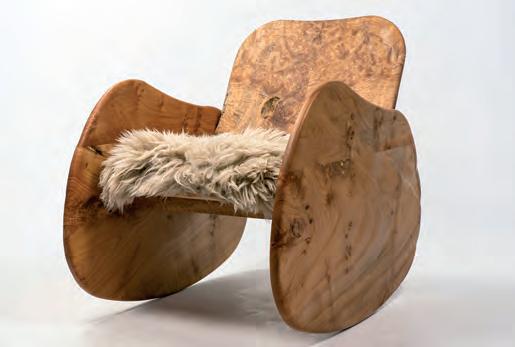
Year 1
• Projects
• Manufacturing Skills
• Design Elements
• Computer-Aided Design
• Materials and Techniques
• Academic and Professional Skills
• Maker Projects
• Joinery and Panel Processing,
• Metal Skills and Upholstery
• Manufacturing Skills
• Computer-Aided Design
• Business Environment
• Applied Science and Testing
Year 3
• Industry Placement (one year)
• Computer-Aided Design and Manufacture
• Enterprise Operations
Year 4
• Advanced CAD and BIM
• Manufacturing Management
• Project Management
• Professional Maker Practice
• Entrepreneurship and Professional Skills
The Level 8 qualification from this programme is recognised worldwide for postgraduate entry. Many of our graduates have progressed on to do their masters by research, a masters in design innovation or similar and also for those who wish to teach, a Professional Master of Education (PME).
Students can choose this programme directly or after completing Year 1 of the Common Entry route through AU683 for Level 8 or AU583 for Level 7, subject to places being available.

I’ve always been really interested in working with my hands and have a strong passion for woodwork, so I thought this programme would be a perfect fit for both. One thing that stood out to me was how it felt separate from the typical city university atmosphere. It offered a completely different experience from what most students go through.
I especially enjoyed the hands-on, practical elements that were part of every module, and I found learning genuinely interesting and engaging. My advice is to dive straight in and figure things out as you go. If you enjoy working hard and doing something you love, this course can be a truly rewarding experience.
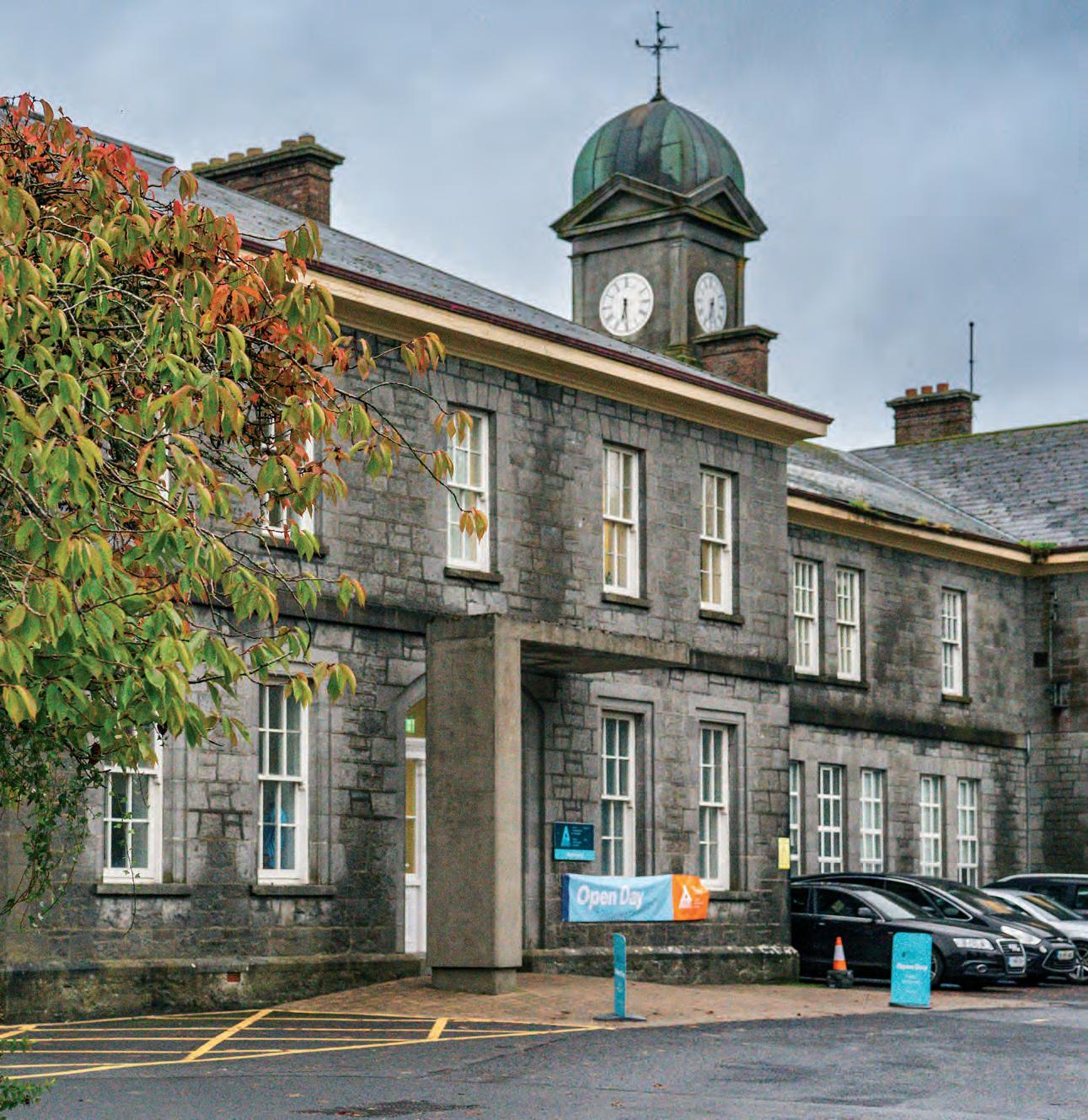
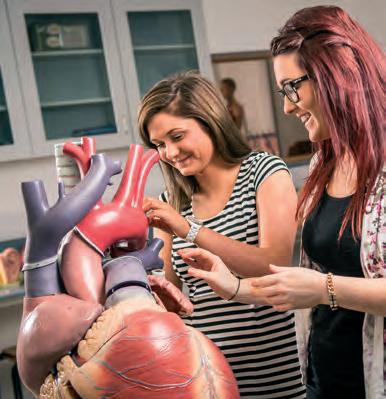
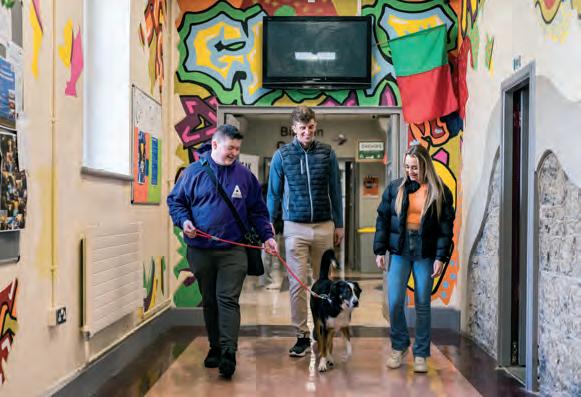
Located in Castlebar, ATU’s Mayo campus is a responsive and dynamic campus with a population of approximately 1,000 students. We offer undergraduate programmes in health, well-being and society, in addition to a range of part-time, online and postgraduate courses.
Since opening in the west wing of St Mary’s Hospital in 1994, the entire building has been sensitively restored to retain as much of its original architecture as possible, whilst also providing the modern facilities and services required for our students to prosper. State-ofthe-art learning facilities include a nursing clinical skills lab, sensory room, heritage lab, computer labs and library.
Our undergraduate programmes have a strong practical ethos and aim to strike a balance between theory and practice. One of our key strengths lies in our smaller class sizes, providing a personal one-toone approach to learning.
Our expert academic staff offer innovative approaches to teaching and learning that will support students to achieve their very best. Programme content and work placements ensure graduates are equipped for the challenges and opportunities of the modern workplace.
In 2011, the Mayo campus was awarded the Green Flag by An Taisce on behalf of the Foundation for Environmental Education (FEE). Initiatives include the development of a sanctuary garden on campus, a forest walk, native tree planting and a “Save our Swifts” project.
AU696 | Level 8 | Bachelor of Arts (Honours)
AU593 | Level 7 | Bachelor of Arts
Social care work in Ireland, now regulated by CORU, is a rewarding and impactful profession. Students in this field develop critical thinking, understand human interactions, and respond professionally to social care needs. Graduates gain insight into inequality and its effects on social justice and human rights, acquiring skills to empower and support vulnerable and oppressed individuals and groups.
atu.ie/AU696
atu.ie/AU593
3/4 Years
309 (Level 8 2024)
252 (Level 7 2023)
Minimum Entry Requirements PLUS • Garda Vetting
60 Places
Work Placement
Dr Jarka Velartova Programme Director jarka.velartova@atu.ie
Dr Teresa Fahy Programme Chair teresa.fahy@atu.ie
Our small class sizes help enrich students’ understanding of what is involved in an authentic and therapeutic relationship driven by a person-centred approach. Placement takes place for a full semester in Year 2 and Year 3 with 800 hours of practice in various social care settings.

This programme prepares students for professional social care employment. As CORU registered social care workers, graduates are in high demand across various sectors. They pursue careers as social care workers, leaders, and managers in public, private, community, and voluntary sectors, working with children, older adults, people with disabilities, and other marginalised groups. Employment opportunities include roles in family support services, children’s services, mental health recovery, homeless services, disability services, residential services and advocacy.
ATU Level 8 qualifications are recognised worldwide for postgraduate entry. Graduates can progress to Masters and postgraduate programs in various fields, including social work, social care, health care, teaching, occupational therapy, and human rights. They may also pursue a Level 10 PhD in research.
In First Year, students join the Learning Together Project, collaborating with individuals who have disabilities in lectures and activities. The programme also features personalised guest lectures by experts, including social care providers and those with lived experience, enhancing the educational experience.
This degree has been approved by CORU. Successful graduates can register with CORU under the protected title Social Care Worker.
Year 1
• Academic and Professional Skills
• PC Applications
• Introduction to Social Care
• Exploring Values
• Introduction to Sociology
• Introduction to Psychology
• Legal Frameworks for Social Care
• Reflective Personal Development
• Group Activities for Social Care Practitioners
• Professional Practice and Communication Skills in Applied Social Care
• Creativity in Social Care
• Computer Applications
• Professional Practice 1 (12-Week Block)
• Social Care Theory and Practice
• Applied Social Theory
• Advocacy in Social Care
• Introduction to Health Promotion
• Philosophy of the Self
Year 3
• Professional Practice 2 (14-Week Block)
• Preparation for Social Care Practice
• Pedagogical Practice and Social Care
• Regulatory Framework
• Developmental Psychology
• Social Research and Evaluation Methods
• Professional Practice and Communication Skills
Year 4 (Level 8)
• Social Theory
• Ethics for Social Care
• Relationships in Social Care
• Health Promotion: Theory and Principles
• Human Rights
• Child Care
• Contemporary Issues in Mental Health Recovery
• Addiction and Care
Additional elective modules may be available throughout the programme.
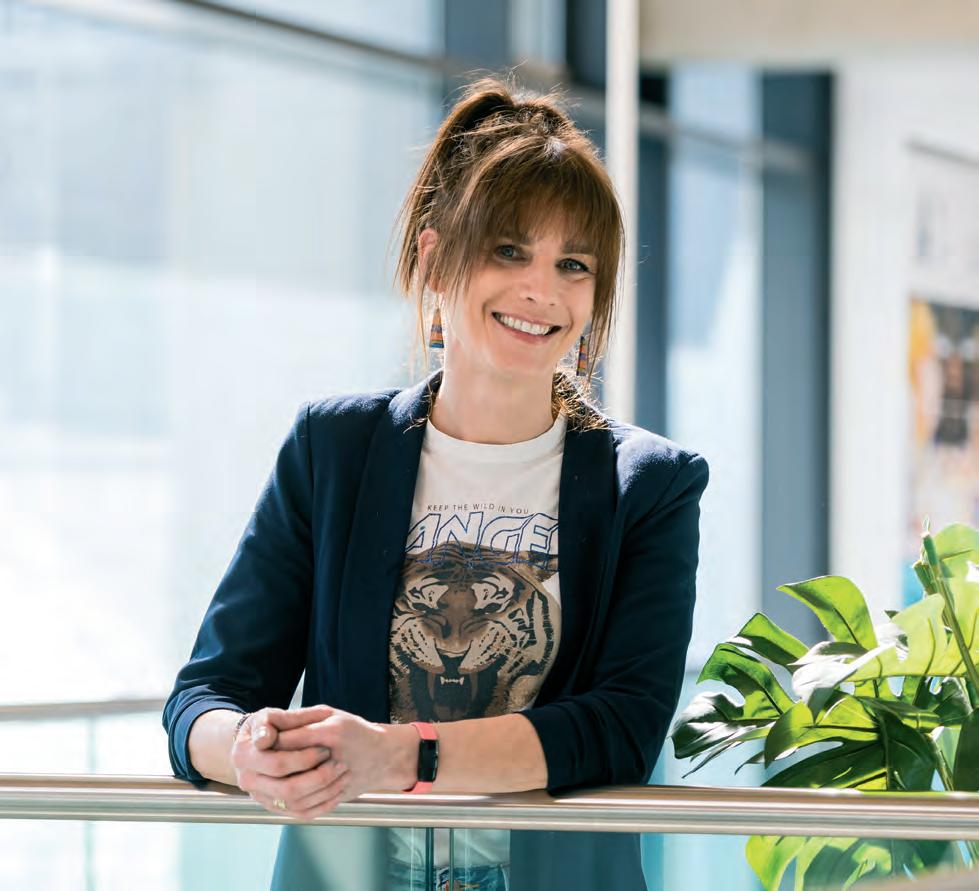
One of the main reasons I chose to study Social Care was that I knew the degree would open many doors for me. I knew I wanted to work directly with people and children, building relationships, but I was unsure which area of Social Care would suit me best. My work placement provided me with the answer.
In the third year, I had the opportunity to work with Tusla. I was also fortunate to gain experience in the disability sector. I loved both areas, as they offered unique insights and challenges, helping me develop new skills and knowledge that are essential for adapting to other areas within social care.
Year 1
This programme offers exceptional teaching and is ideal for anyone passionate about history, geography, archaeology, or wildlife. It provides graduates with a range of transferable skills in digital media, mapping and communications that are valued by employers. Students learn in the classroom, in our customised lab, through practical sessions and field trips. Additionally, they have the chance to gain real-world experience through placements with relevant host organisations.
atu.ie/AU694
3 Years
280 (Level 8 2024)
Minimum Entry Requirements
12 Places
Dr Fiona White
Programme Chair fiona.white@atu.ie Work Placement
Field trips are an important part of the student experience, taking learning into the landscape to reinforce classroom activities. Students will have the opportunity to visit a range of sites of historical, archaeological and geographical importance as part of their studies.
Graduates may become secondary school teachers in both History and Geography, subject to completing the Professional Master of Education (PME). Graduates have found employment as arts administrators, museum curators and education officers, in conservation and research posts in environmental agencies. Graduates have also pursued careers in archaeology, family history and genealogy centres, libraries, civil service, tourism, and established their own businesses.
ATU Level 8 qualifications are recognised worldwide for postgraduate entry.
Graduates have progressed to postgraduate study at masters and doctoral level in areas including history, archaeology, geography, environmental science, rural development, architectural conservation, arts management, and geographical information systems.
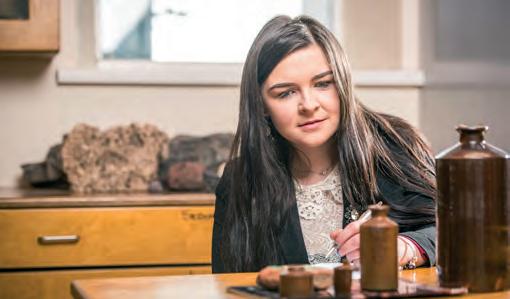
• Irish History
• Folklore, Folklife and Oral History
• Society and Environment
• Earth Processes
• PC Applications
• Academic and Professional Skills
Year 2
• Local History
• Archaeology
• Natural Environment
• Geographies of Rural Development
• Genealogy
• Digital Media
• Work Experience
Year 3
• European History
• Ecology
• Sustainable Tourism
• Built Environment
• Research Methods
• Digital Mapping and Multimedia
• Introduction to Research
• Community, Agency and Sustainability
• Environmental Geography
• Archaeology
Year 4
• European History
• Geographical Information Systems
• Imagining Ireland
• Archaeology
• Modernism
• Dissertation
• Environmental Management and Sustainability
• Heritage Tourism and Museums
• Human Geography: Society and Space
• Dissertation
Additional elective modules are available throughout the programme.
Degree Award Options:
• Outdoor Education
• Outdoor Education with Therapeutic Applications
• Geography and Outdoor Education
These degree programmes have award options in Outdoor Education (General), Outdoor Education with Therapeutic Applications and Outdoor Education with Geography. These degrees provide a distinctive mix of academic study and adventure sports training. Students delve into outdoor education’s therapeutic, developmental, and educational facets, alongside learning about Ireland’s natural and cultural landscape, health, fitness, group facilitation, recreation management, teaching, and psychology. Weekly adventure sports sessions in Mayo’s mountains and coastline lead to National Governing Body Adventure Sports leadership qualifications.
atu.ie/AU699
4 Years
330 (Level 8 2024)
Minimum Entry Requirements PLUS
• Ability to swim 50m to take part in water sport activities
24 Places
Work Placement
Erasmus+
Orla Prendergast Programme Chair orla.prendergast@atu.ie
Students undertake weekly field trips and practical work to build a deep connection with nature and the local landscape. The programme offers elective modules specialising in the therapeutic health benefits of nature and adventure.
The Outdoor Education programmes meet the demand for professionals in outdoor education centers, forest schools, nature kindergartens, adventure therapy, environmental education, eco-tourism, and outdoor recreation and resource management.
ATU Level 8 qualifications are recognised worldwide for postgraduate entry.
ATU run a Masters in Outdoor Education, Sustainability and Wellbeing. Graduates can also apply for master’s programmes ranging from environmental science, counselling, rural and community development, youth work, geographical information systems and sustainability.
Study abroad options at Western Carolina University, USA, offers a year of parks and recreation studies in the Appalachian Mountains. Exciting adventure sports opportunities include whitewater kayaking.
Year 1
• Adventure Activities Personal Skills
• Earth Processes
• Understanding the Human Body
• Health and Fitness
• Professional Practitioner Development
• Information Technology
• Academic and Professional Skills
Year 2
• Adventure Activities Learning to Lead
• Emergency Procedures
• Risk Management
• Facilitation and Leadership
• Nature in Ireland
• Work Experience (1 month)
• Exploring Values (E)
• Geographies of Rural Development (E)
Year 3
• Adventure Activities Leading Outdoor
• Education and Teaching
• Outdoor Development Training
• Advanced Emergency Procedures
• Developmental Psychology
• Ecology
• Community, Agency and Sustainability
• Irish Cultural Landscape
Year 4
• Experiential Education Expeditions
• Experiential Learning
• Coaching and Performance in Sport
• Applied Sociology
• Dissertation
• Environment Management and Sustainability
Additional elective modules are available throughout the programme.
Quick Fact
Erasmus+ exchanges are also available with University of Galva in Sweden and two universities in Norway.
This degree combines an exciting mix of academic study and adventure sports skills training. Students will build an understanding of the therapeutic, developmental, and educational role of outdoor education and students will study the Irish natural and cultural landscape, health and fitness, group facilitation, recreation management as well as teaching and psychology. One day a week is spent on adventure sports practicals in Achill, Connemara, and Wild Nephin National Park.
atu.ie/AU590
3 Years
183 (Level 7 2024)
Minimum Entry
Requirements PLUS
• Ability to swim 50m to take part in water sport activities
• Garda Vetting
30 Places
Work Placement
Erasmus+
Orla Prendergast Programme Chair orla.prendergast@atu.ie
Students undertake weekly field trips and practical work outside the classroom. Building a deep connection with nature and the local landscape are key themes on the programme.
Elective modules allow a specialisation that focuses on the therapeutic health benefits of nature and adventure in Level 8 qualifications.
Graduates find employment as instructors in both adventure and outdoor education centres, and other organisations offering adventure sports as part of their programmes. The Outdoor Education programmes respond to the increasing demand for professionals in forest schools, nature kindergartens, adventure and nature therapy, environmental education, ecotourism and natural resource management.
Students can choose this programme directly, or after completing Year 1 of the Common Entry route through AU699 for Level 8 subject to places being available. The selection of module options over the years of study, allows award options in Outdoor Education (General), Outdoor Education with Therapeutic Applications and Outdoor Education with Geography.
Upon successfully completing Year 3, Level 7 students can apply internally for Year 4 of the Level 8 in Outdoor Education (Common Entry) with Outdoor Education (General), Outdoor Education with Therapeutic Applications or Outdoor Education with Geography, depending on the electives chosen.
ATU Level 8 qualifications are recognised worldwide for postgraduate entry.
Year 1
• Adventure Activities Personal Skills
• Earth Processes
• Understanding the Human Body
• Health and Fitness
• Professional Practitioner Development
• Information Technology
• Academic and Professional Skills
• Adventure Activities Learning to Lead
• Emergency Procedures
• Risk Management
• Leadership and Facilitation
• Nature in Ireland
• Work Experience (Semester 2 - 1 month)
• Adventure Activities Leading Outdoor
• Outdoor Education
• Contemporary Outdoor Learning
• Advanced Emergency Procedures
• Developmental Psychology
• Ecology
• Community, Agency and Sustainability
• The Irish Cultural Landscape
Additional elective modules are available throughout the programme..
Study abroad opportunities include Western Carolina University, USA, for parks and recreation, and Erasmus+ exchanges with the University of Gävle in Sweden and two universities in Norway, all offering excellent adventure sports and educational experiences.
Students gain a range of National Governing Body Adventure Sports leadership qualifications.
Students engage in field trips and practical work outside the classroom. Mayo’s mountains and the wild Atlantic coast provide an ideal setting for fieldwork. One day a week is dedicated to developing leadership skills in adventure sports. Key course themes include fostering a deep connection with nature and the local landscape.
atu.ie/AU693
4 Years
352 (Level 8 2024)
Minimum Entry Requirements PLUS
• Ability to swim 50m to take part in water sport activities
24 Places
Orla Prendergast Programme Chair orla.prendergast@atu.ie Work Placement
Students engage in field trips and practical work outside the classroom. Mayo’s mountains and the wild Atlantic coast provide an ideal setting for fieldwork. One day a week is dedicated to developing leadership skills in adventure sports. Key course themes include fostering a deep connection with nature and the local landscape.
Students can choose this programme directly or after completing Year 1 of the Common Entry route through AU699 for Level 8 or AU590 for Level 7, subject to places being available.
Graduates can pursue careers in environmental management, nature conservation, geographical information systems, countryside recreation, trail design, rural and community development, environmental education, and eco/ adventure tourism.
The therapeutic, educational, and developmental aspects of outdoor education are well recognised within many sectors in Ireland, such as schools, youth organisations and social care settings.
ATU Level 8 qualifications are recognised worldwide for postgraduate entry. Graduates may progress to the Professional Master of Education (PME) to teach geography at second level.
ATU offers a Level 9 MSc in Experiential Outdoor Education, Nature, and Well-Being. In addition, graduates may choose from a range of Level 9 options, ranging from environmental science, rural and community development, geographical information systems, sustainability, philosophy, and youth work.
Students can study parks and recreation for a year at Western Carolina University, USA, in the Appalachian Mountains. They can also spend a semester studying arctic ecology at the University of Gävle, Sweden, and participate in exchanges with two universities in Norway.
Year 1
• Adventure Activities Personal Skills
• Earth Processes
• Developing the Professional Practitioner in Outdoor Education
• Health and Fitness
• Understanding the Human Body
• Information Technology
• Academic and Professional Skills
• Society and Environment
Year 2
• Nature in Ireland
• Adventure Activities Learning to Lead
• Leadership and Facilitation
• Risk Management
• Emergency Procedures
• Geographies of Rural Development
• Work Experience
Year 3
• Adventure Activities: Leading in the Outdoors
• Ecology
• Digital Mapping and Multimedia
• Sustainable Tourism
• Community, Agency and Sustainability
• Advanced Emergency Procedures
• Outdoor Education: Theory and Practice
• The Irish Cultural Landscape
• Developmental Psychology
• Environmental Geography
Year 4
• Experiential Learning
• Coaching and Performance Enhancement
• Educational Expeditions
• Environmental Management and Sustainability
• Geographical Information Systems
• Imagining Ireland
• Human Geography: Society and Space
• Research Methods and Dissertation
• Applied Sociology
Additional elective modules may be available throughout the programme.
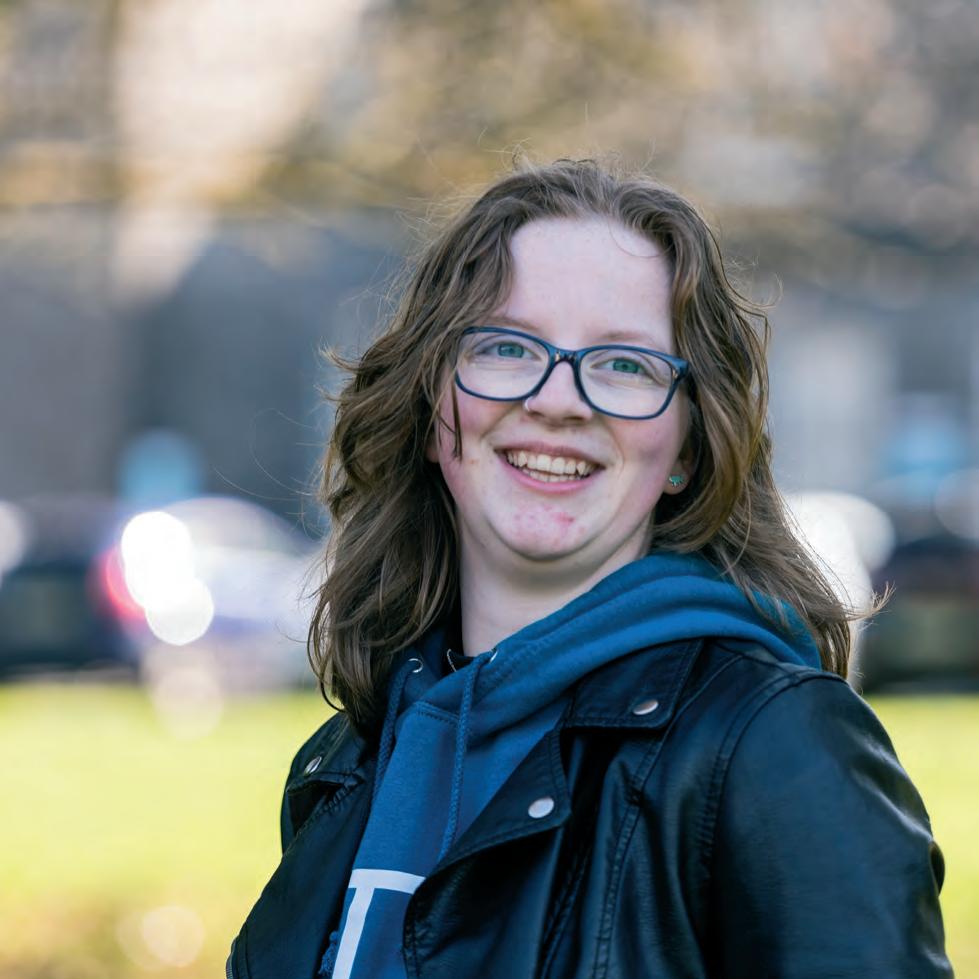
I originally wanted to study environmental science or marine science, but I decided a little adventure would be a great way to spend a few years. I was never fully set on going to university. Even though I was doing well academically in school, I wanted a break, or at least something more than just academics.
While filling out my CAO, I came across ATU’s outdoor education course, which is offered on the Mayo campus. I love that I can learn about the historical, cultural and geographical aspects of different areas, as well as the science of the body — all through unconventional experiences like kayaking while exploring the landscape, field trips to study rock types, and even fitness tests to better understand our body’s response to exercise. There are so many aspects of this programme that I genuinely wanted to explore for myself.
The BSc (Hons) in General Nursing programme offers an opportunity to study to become a general nurse, exploring core fundamentals of nursing whilst also experiencing some specialities. The programme is supported by clinical skills laboratories where students can avail of taught sessions and consolidate their learning with practice. All clinical areas are supported by a link lecturer and students are also supported on clinical placement with a named preceptor. All places are offered subject to satisfactory Garda vetting clearance and health screening.
atu.ie/AU690 4 Years
341 (Level 8 2024)
Minimum Entry Requirements PLUS
• Biology or Chemistry of Physics or Physics with Chemistry or Agricultural Science.
• Garda Vetting
• Health Screening
46 Places
Work Placement
Margaret Tobin Programme Chair margaret.tobin@atu.ie
There are clinical placements throughout the four years of the programme. In Year 4 students will undertake a 36-week paid internship, giving valuable experience and preparing students for their role as a registered nurse. It also incorporates allocated hours for reflection.
Graduates will be qualified to work in many health and community settings, acute hospital settings, community care and residential settings. Students may further their studies within a specialist area. Some of the further study opportunities available at ATU include the MSc in Palliative and End of Life Care, the MSc in Quality and Safety in Healthcare, and the MSc in Quality and Safety in Social Care.
ATU Level 8 qualifications are recognised worldwide for postgraduate entry.
The Nursing and Midwifery Board of Ireland (NMBI) provide a lot of information for potential applicants on its website. Check out the information booklet “Nursing, A Career For You”, a link is available from our programme webpage at atu.ie/AU690.
We reserve up to 5% of places for QQI/FET award holders.

Year 1
• The Nature of Nursing
• Fundamental Nursing Knowledge and Skills
• Self-development and Interpersonal Skills
• Social Science Perspectives
• Biological Science for Fundamental Nursing Knowledge and Skills
• Academic and Professional Skills
• Practice Placement 1
Year 2
• Integrated Community Care
• Sociology Applied to Nursing and Healthcare
• Nursing Research and Informatics
• Psychology and its Application to Nursing
• Biological Science for Nursing the Adult with Major Illness
• Nursing Care of the Adult with Major Illness
• Practice Placement 2
Year 3
• Acute Presentations in Nursing Practice
• Oncology, End of Life and Palliative Care
• Person-Centred Care
• Philosophy and Ethics: Theory and Application
• Legal and Accountable Nursing Practice
• Enquiry in Nursing practice
• Promoting Health
• Practice Placement 3
Year 4
• Clinical practice and Patient Safety
• Development of Management and Interpersonal Skills
• Quality and Patient Safety in Nursing
• Professional Practice in Health Care
• Change and Education in Nursing Practice
• Research Skills in Nursing practice
• Internship (36- week paid placement)
Additional elective modules may be available throughout the programme.
This four-year BSc (Hons) in Mental Health Nursing is offered in conjunction with Health Service Partners West and the Nursing and Midwifery Board of Ireland (NMBI) in response to the changing mental health needs of the Irish population. The role of the mental health nurse is to foster the health and well-being of individuals experiencing changes in their mental health status. All places are offered on this programme subject to satisfactory Garda vetting clearance and health screening.
atu.ie/AU691
4 Years
278 (Level 8 2024)
Minimum Entry Requirements PLUS
• Biology or Chemistry of Physics or Physics with Chemistry or Agricultural Science
• Garda Vetting
• Health Screening
26 Places
Work Placement
Mark Johnston Programme Chair mark.johnston@atu.ie
There are clinical placements throughout the four years of the programme. In Year 4 students will undertake a 36-week paid internship, giving valuable experience and preparing students for their role as a registered nurse.
Successful completion of the course and registration as a mental health nurse with NMBI is nationally and internationally recognised. Due to the evolving role of the mental health nurse in modern mental health care systems, many nurses now choose to specialise in areas including addictions, forensic care and child and adolescent mental health services. Nursing graduates may seek promotional opportunities in clinical practice, management, education and research.
ATU Level 8 qualifications are recognised worldwide for postgraduate entry.
The Nursing and Midwifery Board of Ireland (NMBI) provide a lot of information for potential applicants on its website. Check out the information booklet “Nursing, A Career For You”, a link is available from our programme webpage at atu.ie/AU691.
We reserve up to 5% of places for QQI/FET award holders.

Year 1
• The Nature of Nursing
• Mental Health Nursing Practice Studies 1
• Psychosocial Approaches in Mental Health Care
• Academic and Professional Skills
• Biological Science for Fundamental Nursing Knowledge and Skills
• Personal Professional Development for Mental Health Nursing 1
• Social Science Perspectives
• Practice Placement
• Mental Health Nursing Practice Studies 2
• Nursing Research and Informatics
• Psychology and its Application to Nursing
• Biology in Mental Illness
• Sociology Applied to Nursing and Healthcare
• Personal and Professional Development for Mental Health Nursing 2
• Practice Placement 2
• Nursing Care of the Adult with a serious mental illness
• Mental Health Nursing Practice Studies
• Rights Based Practice and Ethics for Mental Health Nursing
• Enquiry in Nursing Practice
• Personal and Professional Development for Mental Health Nursing 3
• Practice Placement 3
• Personal and Professional Development for Mental Health Nursing 4
• Mental Health Nursing Practice Studies 4
• Advanced Skills for Mental Health Nursing
• Internship (36- week paid placement)
• Quality and Patient Safety in Nursing
• Research Skills in Nursing Practice
Additional elective modules may be available throughout the programme.
This four-year Level 8 degree programme provides graduates with a broad and comprehensive foundation in Psychology, the study of human behaviour and the mind. Students will explore a wide range of engaging topics central to psychological research, including conflict resolution, language acquisition, decision-making, memory, addiction, and recovery.
atu.ie/AU698
4 Years
349 (Level 8 2024)
Minimum Entry Requirements PLUS
• Garda Vetting
30 Places
Work Placement
Dr Elaine Mc Hugh Programme Chair elaine.mchugh@atu.ie
The degree provides a strong foundation for further training as a professional psychologist in disciplines such as clinical psychology, counselling, educational psychology, sports psychology, and neuropsychology. Students will be equipped with transferable skills that can be used in a variety of people-focused careers (e.g. Human Resources, market research and media).
Graduates from the programme may apply for Masters programmes or conversion programmes in the subject of psychology, as well as other level 9 courses in related social science disciplines.
ATU Honours Level 8 qualifications are recognised worldwide for postgraduate entry.
You will focus on psychology throughout the entirety of your degree, giving you a strong foundation that will pave the way for your future in the discipline.
A major attribute of this programme is the work placement in Year 3, providing hands-on experience of the application of psychology.
In Year 4, students complete a research project in their chosen area of interest – integrating knowledge gained across the four years.
This programme is accredited by the Psychological Society of Ireland (PSI).
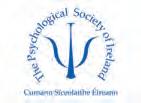
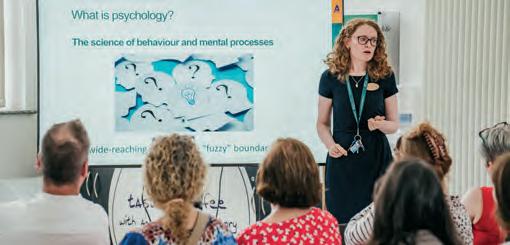
Year 1
• Academic and Professional Skills
• Psychology: An Introduction
• Introduction to Social Psychology
• Introduction to Research in Psychology
• Introduction to Individual Differences
• Foundations of Developmental Psychology
• Behaviour and Cognition
Year 2
• Cognitive Psychology
• Biological Psychology
• Individual Differences: Abnormal Psychology
• Developmental Psychology II: Middle Childhood
• Social Psychology: Psychology of Conflict
• Research Ethics
• Research Statistics
• Having Helpful Conversations
Year 3
• Biological Psychology
• Developmental Psychology: Ageing
• Social Psychology: Organisational Psychology
• Research Ethics
• Quantitative Research Methods
• Reflective Practice
• Practice Placement Module
Year 4
• Individual Differences: Cross Cultural Psychology
• Cognitive Psychology: The Psychology of Consciousness
• Applied Health Psychology
• Individual Differences: Intelligence
• Psychological Approaches
• Applied Research Project
Additional elective modules may be available throughout the programme.
This degree provides experiences, knowledge and insights into early childhood education and care. Early childhood educators work with children from infancy to primary school. Our programme aims to develop well-informed, articulate professionals who are passionate about early childhood education and care. There is a strong focus on play and learning, the close relationship to nature and outdoor experiences and children’s rights to participation. This firm academic foundation is cemented by a strong emphasis on the practical application of theory.
atu.ie/AU695
4 Years
308 (Level 8 2024)
Minimum Entry Requirements PLUS
• Garda Vetting
• QQI applicants with a Level 6 major award may be eligible for direct entry into Year 2 on Mayo and Galway City campuses.
15 Places
Graduates can pursue careers as early years practitioners, room leaders, or managers in ECEC settings, or as practitioners, team leaders, or managers in social care services. Research graduates may work as assistant researchers in agencies or academic institutions, while other opportunities exist in early years specialisation and with organisations like Better Start or government departments.
ATU Honours Level 8 qualifications are recognised worldwide for postgraduate entry.
Year 1
• Academic and Professional skills
• Psychology and Child Development
• Importance of Play and Creativity
• Language, Literacy and Numeracy
• Building and Managing Interpersonal Relationships
• Exploring Curriculum
• Pedagogy
• Health, Safety and Wellbeing
• Practice Development 1 –Quality and Practice
• Early Childhood Law
• Supporting Enquiry to enact the Curriculum
• Sociological Discourses
• Childhood Development and Learning (under threes)
• Reframing Disabilities and Inclusive Practice
• Diversity and Equality
• Research with Children
• Learning Environments
• Practice Development 2 –Quality and Practice
• Leadership and Governance
• Trends in Early Childhood Education and Care
• Introduction to Business Management
Joanne Doherty
Programme Chair
joanne.doherty@atu.ie Work Placement
Students spend 12 hours weekly in practice placement, linking theory to practice with ongoing support from an experienced educator.
The Level 8 award in Early Childhood Education and Care meets the requirements for Core Funding previously known as Higher Capitation funding by the Department of Children, Equality, Disability, Integration and Youth (DCEDIY).
*Applicants who hold a QQI Level 6 major award may be eligible for consideration to enter directly into the second year of the ECEC programme on the Mayo or Galway City campus. Applications for direct entry to the second year are by direct application. Visit atu.ie/apply for more information.
This degree is officially recognised as meeting the Professional Award Criteria and Guidelines for Initial Professional Education (Level 8) degree programme for the Early Learning and Care Sector in Ireland.
• Transitions in Early Childhood Education and Care
• Family-Centred Practice and Supports
• Outdoor Play
• Employment Law
• Practice Development 3
• Professional Relationships in Early Childhood Education and Care
• Business Management for the Early Years Leader
• Reflective Practice
• Innovative Practices in Creativity
• Critical Perspectives on Neurodiversity
• Nature and Place
• Digital Technology and Digital Childhoods
• Practice Development 4 –Supervision and Mentoring
Additional elective modules may be available throughout the programme.
This programme offers first-hand experiences, knowledge, and perspectives in early childhood education and care, preparing individuals to work with children from infancy to primary school age. It cultivates passionate professionals committed to early childhood education. Emphasising the importance of play, learning, nature, outdoor activities, and children’s rights, the programme balances a solid academic foundation with the practical application of theoretical concepts. Our approach ensures graduates are well-equipped to foster a close connection with nature and actively support children’s development and participation.
atu.ie/AU491
2 Years
187 (Level 6 2024)
Minimum Entry Requirements PLUS
• Garda Vetting
• QQI applicants with a Level 6 major award may be eligible for direct entry into Year 2.
15 Places
Joanne Doherty Programme Chair joanne.doherty@atu.ie Work Placement
Students will spend 12 hours weekly in practice placement in order to provide them with an opportunity to link theory to practice. Students receive ongoing support through placement by an experienced educator.
This Higher Certificate (Level 6) is designed to provide learners with a specialised education in early childhood education and care as a basis for a professional career in the field and as a basis for further academic and professional education.
Following the successful completion of Year 2 in the Higher Certificate in Early Childhood Education and Care Level 6, students can apply internally for Year 3 of the Level 7 degree, after which they have the option to apply for Year 4 of the Level 8 programme to gain an honours degree.
Opportunities exist within ATU and internationally for graduates to continue their education at Level 9 and Level 10 and pursue careers such as research, psychology, speech and language therapy and primary school teaching.
Applicants who hold a QQI Level 6 major award may be eligible for consideration to enter directly into the second year of the ECEC programme on the Mayo or Galway City campus. Applications for direct entry to the second year are by direct application. Visit atu.ie/apply for more information.
• Academic and Professional skills
• Psychology and Child Development
• Importance of Play and Creativity
• Language, Literacy and Numeracy
• Building and Managing Interpersonal Relationships
• Exploring Curriculum
• Pedagogy in Early Childhood Education and Care
• Health, Safety and Wellbeing
• Practice Development 1 –Quality and Practice
• Early Childhood Law
• Supporting Enquiry to enact the Curriculum
• Sociological Discourses in Early Childhood Education and Care
• Reframing Disabilities and Inclusive Practice
• Childhood Development and Learning (under threes)
• Diversity and Equality
• Research with Children
• Learning Environments
• Practice Development 2 –Quality and Practice
Additional elective modules may be available throughout the programme.
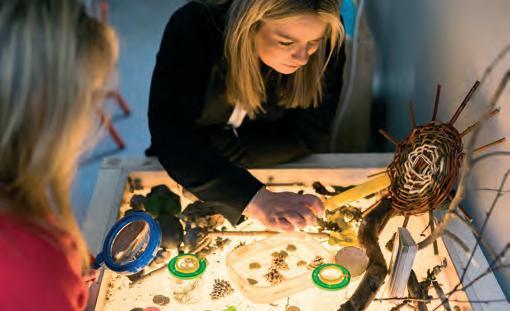
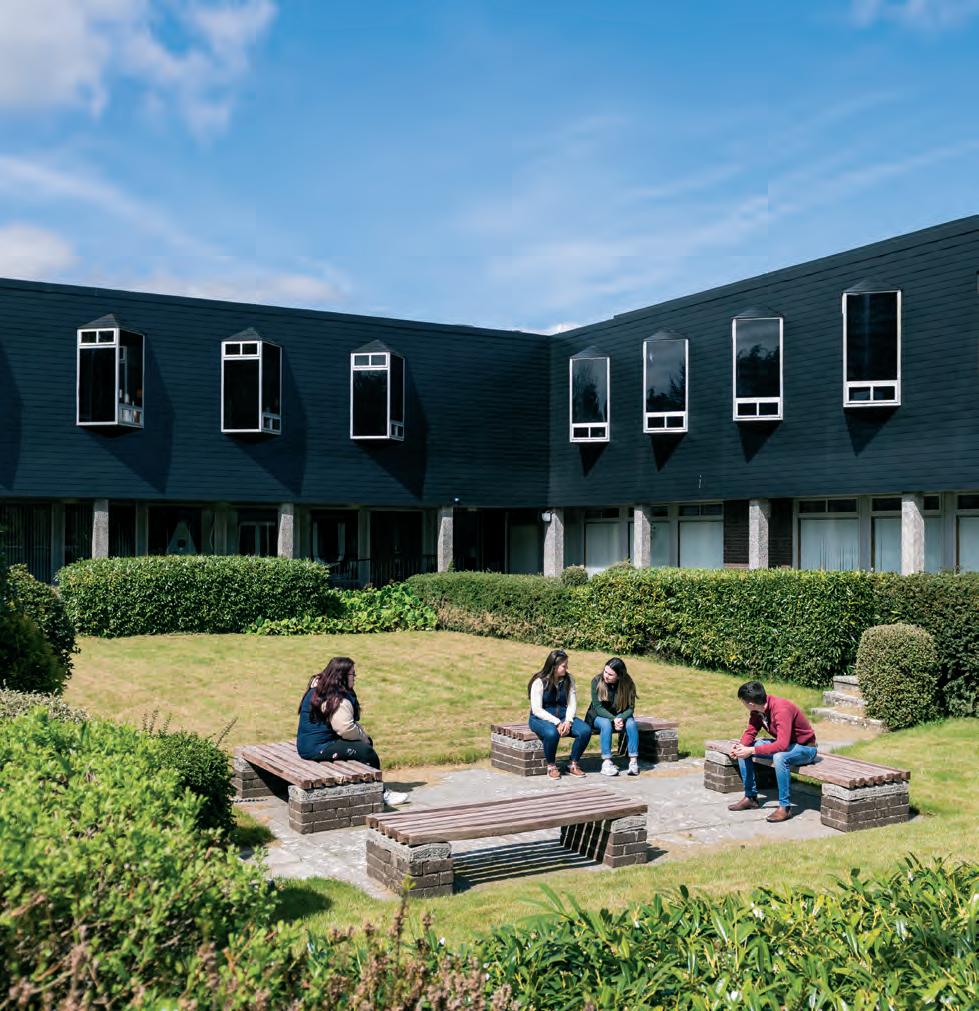
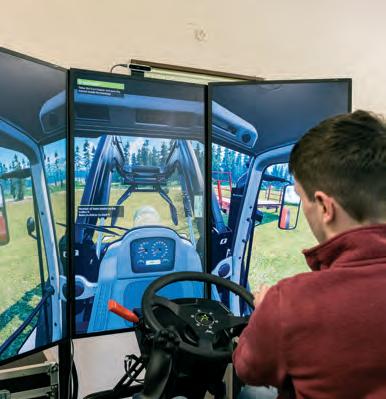
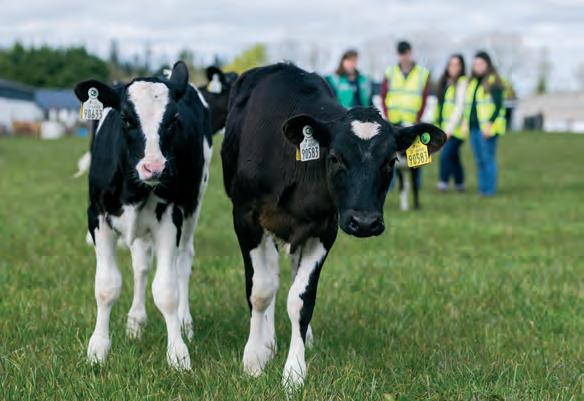
Agriculture, food and environmental management are some of Ireland’s key industries. ATU is one of Ireland’s leading educational institutes offering undergraduate programmes in agri-business, agri-engineering and agri-science. We provide the knowledge, practical experience and expertise to produce outstanding graduates in these areas.
With a total area of 120 hectares, students will benefit from practical, hands-on experience gained on our working farm. We have a 90-cow high EBI Holstein Friesian dairy herd, a 30 suckler cow unit with a dairy calf to beef enterprise, a 180-ewe sheep flock and 20 hectares of forestry.
Farm facilities such as a milking parlour, grain store, sheep and cattle housing facilities, and handling facilities means students gain firsthand experience of the modern forms of equipment they can expect to encounter in their future careers.
Internally, our campus has recently seen investment in a state-of-theart CAD lab, a hydraulics lab, and an engineering lab. Smaller class sizes mean that our lecturers can engage with students on a one-toone basis.
Agri-business and Agri-science students are based at the Mountbellew campus for the first two years and attend the Galway City, Dublin Road campus on selected days per week. Students mainly spend Year 3 and Year 4 in Galway City. Agri-engineering students are based in the Galway City, Dublin Road campus and attend the Mountbellew campus for scheduled classes. Bus transportation is provided to and from the campuses for the classes scheduled.
All our programmes offer work placement, meaning students have the perfect opportunity to gain industry experience and transfer their knowledge and skills to everyday life. Graduates have a diverse range of skills allowing them to pursue varied career paths in the agri industry.
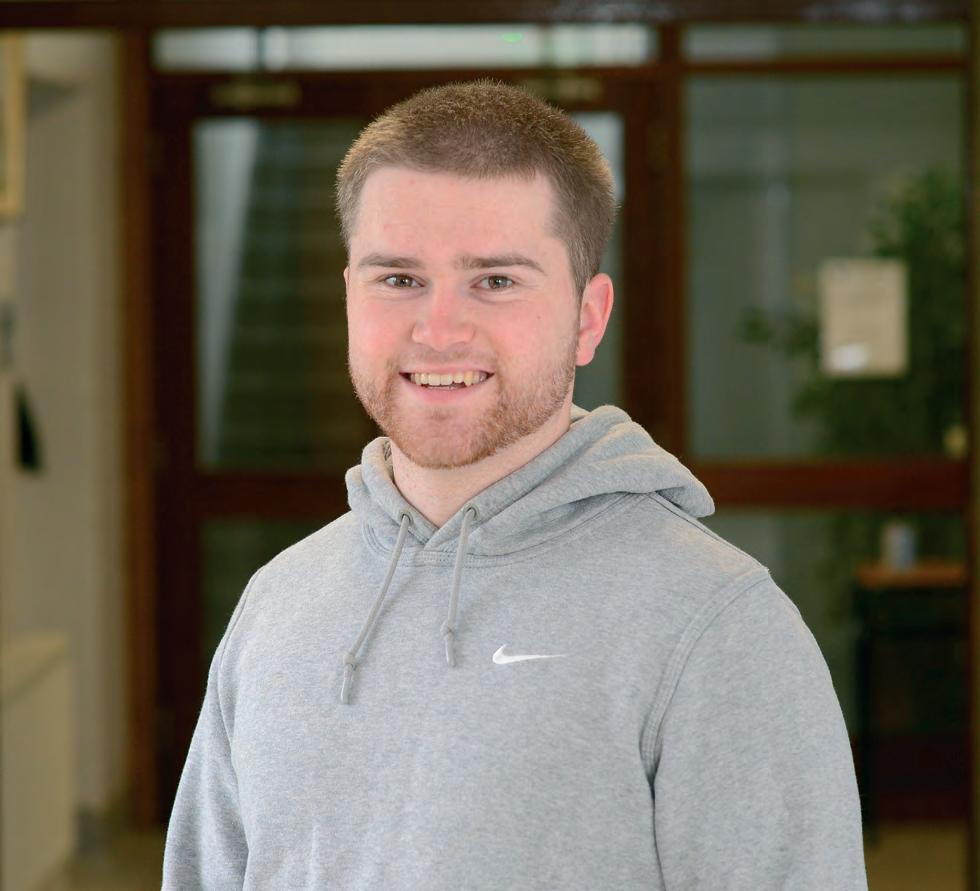
I really enjoyed studying advanced dry stock management, advanced dairy management, and the marketing module in the first semester of my second year. These subjects were not only interesting but also relevant to my background.
We finish cattle on my home farm, so I found the beef production side of dry stock management especially engaging and practical. Dairy management also stood out to me, as most farms in my local area are dairy-focused, which made it highly applicable. The marketing module added a different perspective, highlighting the importance of business skills in the agricultural sector. The second-year work placement is another key part of the programme, helping you explore which sector of the agri-business industry best matches your interests after graduation.
AU606 | Level 8 | Bachelor of Business (Honours)
AU506 | Level 7 | Bachelor of Business
Agriculture, food production and environmental management are just a few of Ireland’s key industries. Obtaining a degree in this area opens up a host of career options. This programme will enable the learner to improve their knowledge and understanding of general business and to develop business skills, particularly as they apply to the rural enterprise and agri-business sector.
atu.ie/AU606
atu.ie/AU506
3/4 Years
284 (Level 8 2024)
243 (Level 7 2023)
Minimum Entry Requirements
20 Places
Work Placement
Micheal Gill Head of Department michael.gill@atu.ie
Dr Edna Curley Head of Centre, Mountbellew mac@atu.ie
Year 1 of the programme is common with the Bachelor of Science in Agriculture and Environmental Management. At the end of Year 1, students can choose whether they wish to pursue the Bachelor of Business in Agri-Business Management or the Bachelor of Science in Agriculture and Environmental Management.
Graduates are well prepared to operate in a variety of managerial and administrative positions in rural and agri enterprises, or to become selfemployed. Graduates can progress to a variety of work in agri-business and agricultural services, for example, in marketing, information processing, administration and management posts; as well as various employment opportunities in rural development.
Upon successfully completing Year 3, Level 7 students can then apply internally for Year 4 for the Level 8 programme.
ATU Level 8 qualifications are recognised worldwide for postgraduate entry.
Students mainly reside at Mountbellew for the first two years of this course. Years 3 and 4 are spent mainly at the ATU Galway City, Dublin Road campus. Year 1 of the programme is common with the Bachelor of Science in Agriculture and Environmental Management (AU657/AU557).
The Level 7 and Level 8 programmes meet the educational requirements for ‘Trained Farmer’ status for the purpose of farm inheritance, grant aids and tax exemptions.
Year 1
• Plant and Animal Science
• Animal & Crop Production Science
• Financial and Farm Accounting
• Introduction to Chemistry
• Academic and Professional Skills
• Computer Applications
• Soil Science
• Mathematics and Statistics
• Macroeconomics
• Farm Safety
• Agronomy and Animal Husbandry
Year 2
• Management Information Systems
• Principles of Marketing
• Management Accounting
• Organic Agriculture
• Soil and Analytical Chemistry
• Advanced Dairy Production
• Agricultural Economics
• Advanced Drystock Production
• Animal and Plant Science: Field and Lab
• Industry Placement (six weeks)
Year 3
• Agricultural Enterprise Diversification
• Digital Business
• Financial Management and Taxation
• Rural Development and Agricultural Policy
• Advanced Farm Planning and Management
• New Venture Planning
• Advanced Grassland Management
• Forest and Woodland Management
• Agri Marketing Management
• Business Communications and Negotiations
• Market Research
• Climate Change Adaptation and Mitigation
Year 4 (Level 8)
• Eco and Social Enterprise
• Agribusiness and Food Company Management
• Integrated Enterprise Systems
• Supply Chain Management
• Animal Nutrition and Breeding
• Strategic Management
• Rural Resource Planning and Policy
• Project
• Soil Science & Nutrient Management
• People Management
• Research Methods
AU657 | Level 8 | Bachelor of Science (Honours)
AU557 | Level 7 | Bachelor of Science
These programmes provide students with a range of specialised skills ideal for employment in the agriculture and environmental sectors. Strong emphasis is placed on sustainability in agriculture and the environment. Graduates of the programme can expect to gain employment in a range of areas including farming, agri-foods, environmental management, consultancy, applied ecology and agri-business. These programmes are highly practical, with a mixture of lectures, fieldwork, laboratory practicals and IT.
atu.ie/AU657
atu.ie/AU557
3/4 Years
311 (Level 8 2024)
269 (Level 7 2024)
Minimum Entry Requirements
64 Places
Work Placement
Dr Ian O’Connor Head of Department of Natural Resources and the Environment ian.oconnor@atu.ie
Dr Edna Curley Head of Centre, Mountbellew mac@atu.ie
Year 1 is common with the AgriBusiness Management programme. At the end of Year 1, students choose between Agriculture and Environmental Management or AgriBusiness Management.
The Level 7 and Level 8 programmes meet the criteria for ‘Trained Farmer’ status, aiding in farm inheritance and tax exemptions.
These programmes are extremely ‘hands-on’ with considerable time allocated to the development of practical laboratory skills and Information Technology skills. Thus, graduates have both the theoretical and practical skills employers require.
Level 7 graduates may internally apply for Year 4 of the Level 8 programme. ATU Level 8 qualifications are globally recognised for postgraduate entry. Designed to meet Teaching Council Curricular Subject Requirements (Post-Primary), the programme enables graduates to pursue a two-year Professional Master of Education (PME) to qualify as Agri Science teachers.
Students spend the initial two years at Mountbellew and the following two years mainly at the Galway City, Dublin Road campus. No prior science subject study at Leaving Certificate level is needed, as Year 1 covers the fundamentals of all science subjects.
Year 1 of the programme is common with the Agri-Business Management programme (AU606 / AU506).
Year 1
• Plant and Animal Science
• Animal & Crop Production Science
• Financial and Farm Accounting
• Introduction to Chemistry
• Academic and Professional Skills
• Computer Applications
• Soil Science
• Mathematics and Statistics
• Macroeconomics
• Farm Safety
• Agronomy and Animal Husbandry
• Organic Agriculture
• Introduction to Physics
• Advanced Dry Stock Production
• Advanced Dairy Production
• Soil and Analytical Chemistry
• Industry Placement (12 weeks)
• Agricultural Enterprise Diversification
• Rural Development and Agricultural Policy
• Introduction to Agroecology
• Advanced Farm Planning and Management
• Aquatic Ecology and Catchment Science
• Forest and Woodland Management
• Climate Change Adaptation and Mitigation
• Geographic Information Systems1
• Advanced Grassland Management
• Ecological Monitoring
• Ecological Management
• Introduction to Data Analyses and Management
• Soil Science and Nutrient Management
• Biodiversity and Conservation
• Advanced Geographic Information Systems
• Agribusiness and Food Company Management
• Integrated Sustainable Agriculture
• Environmental Legislation
• Rural Resource Planning and Policy
• Animal Nutrition and Breeding
• Research methods and Dissertation Preparation
• Research Project
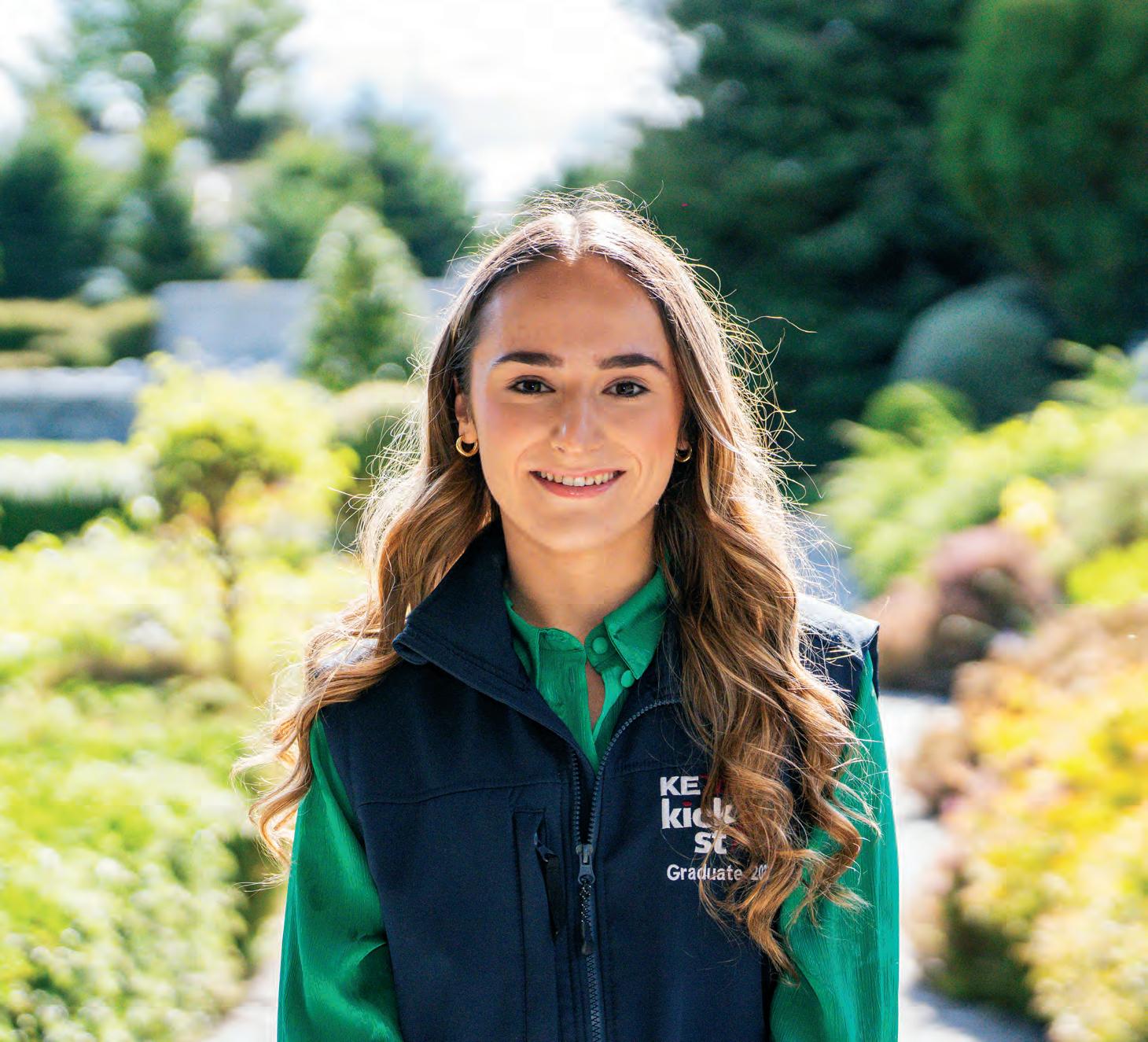
Opting for a gap year after my Leaving Cert to work proved invaluable; it provided clarity and helped me realise my passions. Choosing Agricultural and Environmental Management at ATU felt right, bridging my interest in biology and agriculture, with an option to pursue further studies in the future for teaching credentials. ATU’s supportive environment and practical approach, especially during labs, was so helpful when settling into university life.
The highlight was my placement with the Teagasc Sheep Research Farm in Athenry where I gained hands-on experience in large scale lambing and was involved in PhD trials and exposed to day-to-day laboratory techniques. Since graduating I am working with Kepak on their Graduate Programme as I continue to grow professionally, leveraging my education and experience in this dynamic role.
Campas Dhún na nGall
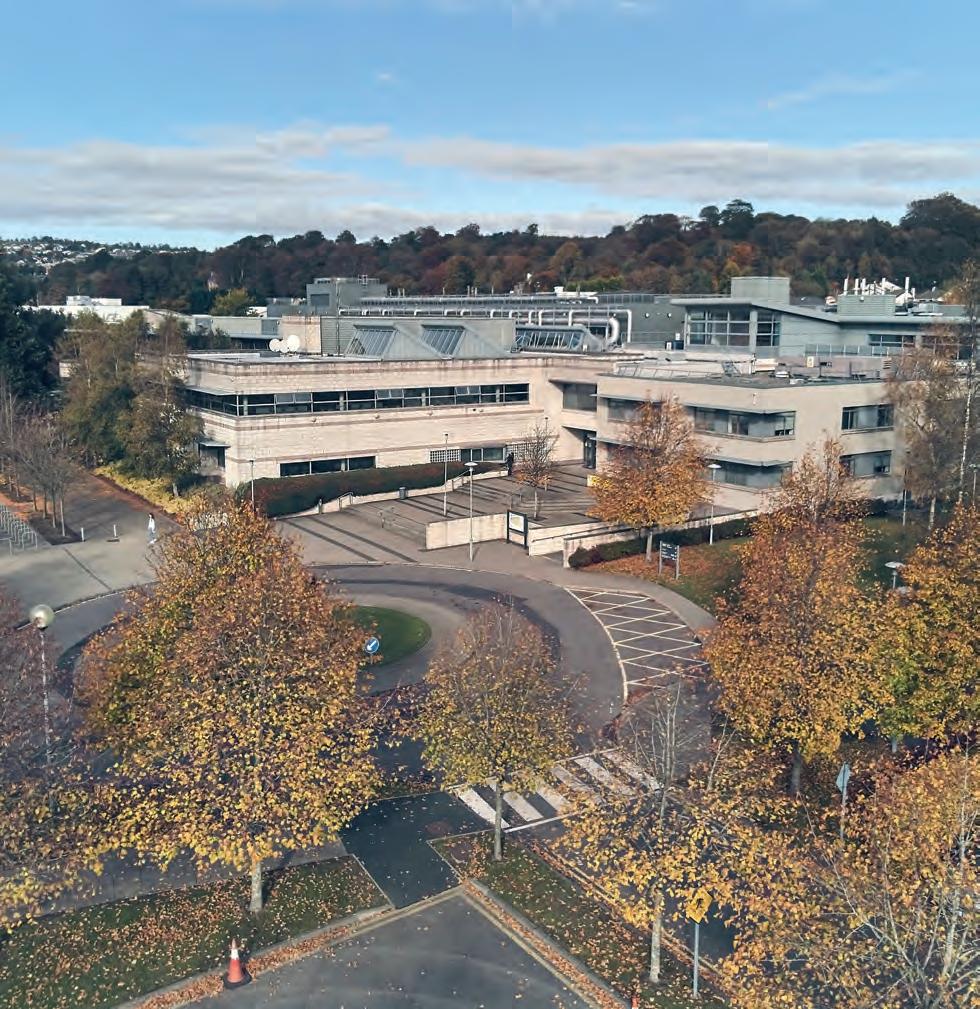
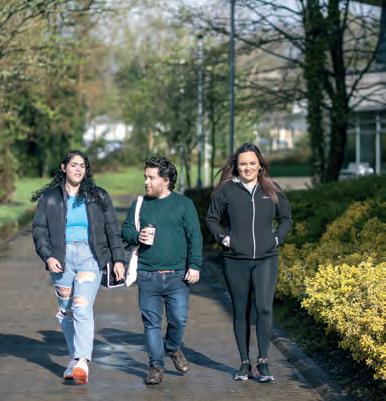
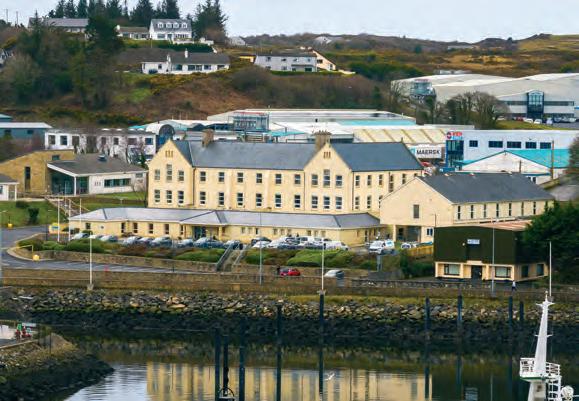


ATU Donegal offers 59 CAO programmes and over 40 postgraduate programmes across three faculties and eleven departments. The campus has a student population of 5,000, the majority of whom study on campus in Donegal on a full-time basis. This generates a vibrant on-campus atmosphere. With an exceptional reputation for high academic standards, incredible teaching and learning facilities, in addition to a strong focus on research, it’s no surprise why student numbers have grown exponentially over the last five years at ATU.
9/10 of ATU’s higher certificate, degree and honours degree programmes offer a structured work placement. Our long-standing partnerships with leading employers mean our graduates have a head start in the jobs market.
Our lecture class sizes provide a real sense of community and collaboration.
Employability is a central focus of academic programmes here. In 2024, 9/10 of graduates from ATU either secured work or pursued further study within four months of graduating.
Many of our programmes are professionally accredited meaning our graduates will benefit from having a greater number of job possibilities. Knowing an individual has met this industry standard provides companies with confidence. Additionally, a lot of accreditations come with the benefit of being recognised globally. Our alumni now have access to a wide variety of employment and travel opportunities.
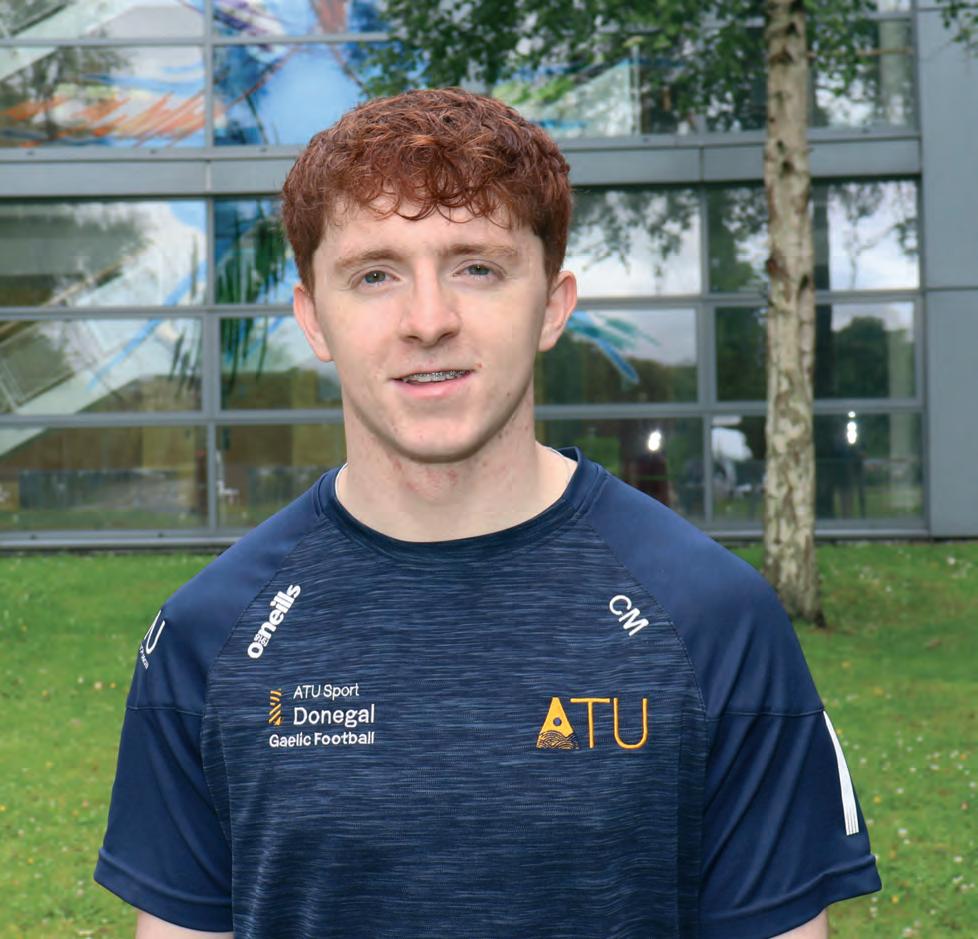
I chose ATU because of its strong reputation in the field of accountancy. I really enjoy how practical and career-focused the programme is. The programme is well-structured and offers a high number of exemptions for professional exams, which is a big advantage. I also like the supportive learning environment and the sense of community on campus.
I play Gaelic football for ATU and I’m on a sports scholarship. Being part of the team has been a brilliant experience. It’s helped me stay active, make great friends, and balance my academic and athletic life. After graduation, I’ll be starting an audit internship with Grant Thornton in Dublin. I’m really looking forward to getting hands-on experience in the field and working toward my professional accounting qualifications.
If you want to build a career in the accounting profession, this programme is for you. Over three years you will develop the core accounting and finance skills needed to perform at a highly competent level in the accounting profession. You will also develop a complementary range of business skills that will equip you to work in a variety of positions in teaching.
atu.ie/AU300
3 Years
332 (Level 8 2024)
Minimum Entry Requirements
50 Places
Work Placement
Patricia
Doherty
Head of Department of Business Studies
patricia.doherty@atu.ie
The Accounting programme at Donegal Letterkenny campus attract generous exemptions from the examinations of professional accountancy bodies including ICA, ACCA and CIMA. Graduates will also have the opportunity to progress onto the MA in Accounting which offers even further significant exemptions. Holders of the Diploma for Accounting Technicians Qualification get advanced entry into Year 2 of this programme.
Students have the option to take a one-year work placement in Year 3, meaning the modules shown in Year 3 would be taken in Year 4. Students who choose work placement can graduate with the award BBus (Hons) in Accounting Practice
Successful graduates find themselves typically working in a large multinational firm or an accountancy practice. The majority of graduates go on to qualify as professional accountants. Graduate careers typically include a qualified accountant (ICA, ACCA or CIMA), taxation, banking, financial services, FinTech or secondary school teaching.
ATU Level 8 qualifications are recognised worldwide for postgraduate entry.
Graduates may apply to complete a Professional Master of Education (PME) to become a secondary school teacher of Accounting.
Studying accounting can lead to diverse career opportunities beyond number crunching, like forensic accounting, advising startups, or even becoming a CFO.
What will I study?
Year 1
• IT for Business
• Book-keeping
• Personal Finance
• Business Management
• Quantitative Methods
• Business Information Systems
• Data Analytics
• Financial Accounting
• Business in Society
• Law for the Business Environment
Year 2
• Financial Reporting 1
• Management Accounting and Finance
• Computerised Accounts
• Macroeconomics
• Management Accounting 2
• Company Law and Governance
• Business Tax
Year 3
• Digital Business
• Financial Reporting 2
• Business Finance
• Capital Gains Tax and VAT
• Strategic Management
• Advanced Management Accounting and Finance
• Auditing
Professional Accreditation

This degree in marketing gives learners the relevant skills needed for a career in marketing. Over three years students gain skills and experience in areas such content creation, digital marketing technologies, social media, website performance, marketing research, consumer behaviour analytics and branding.
atu.ie/AU302
3 Years
307 (Level 8 2024)
Minimum Entry Requirements
50 Places
Work Placement
Patricia Doherty Head of Department of Business Studies patricia.doherty@atu.ie
There are a number of reasons to choose this programme. It features industry-relevant modules and a hands-on approach that allows students to manage real marketing campaigns while exploring emerging technologies. Students also have the opportunity to gain professional certifications from leading platforms such as HubSpot, Google, and LinkedIn, all while developing essential strategic marketing skills.
Students have the option to take a one-year work placement in Year 3, meaning the modules shown in Year 3 would be taken in Year 4. Students who choose work placement can graduate with the award BBus (Hons) in Marketing Practice in Online Technologies while gaining invaluable hands-on experience, applying learning in real-world marketing environments.
Graduates of this marketing degree are prepared to work in a wide range of marketing roles at regional, national, and international levels. With key skills and practical experiences on their CV, they are highly employable across the industry. Career opportunities include roles such as Digital Marketing Executive, Social Media Manager, Content Creator, Website Optimisation Manager, E-commerce Manager, Marketing Analyst, Brand Marketing Manager, and Customer Relationship Management and Email Marketing Specialist.
Some further study options include the Master of Science in Marketing or other similar Level 9 or Level 10 programmes across ATU and other universities. Graduates may also apply to undertake a Professional Master of Education (PME) to become a secondary school teacher of Business.
Year 1
• IT for Business
• Fundamentals of Marketing
• Business Management
• Quantitative Methods
• Marketing Principles
• Business in Society
• Accounting for Business
• Social Media Marketing
• Business Information Systems
Year 2
• Macroeconomics
• Copywriting 4.0
• Contemporary Issues in Marketing
• Digital Marketing
• Website Performance
• Talent Management
• Generating Consumer Insight
• User Experience and Design Thinking
Year 3
• Global Marketing
• Work and Organisational Psychology
• Digital Business
• Decision Making for Marketing
• Capstone Project: Applied Marketing Research
• Brand Engagement Marketing
• Applied Marketing Management
• Strategic Management
Additional elective modules are available throughout the programme.
Marketing careers are dynamic and in high demand across the world, especially for those skilled in digital trends and technologies.
This programme equips graduates to succeed on the global business stage by enabling them to be forward-thinking and have the capacity to act as catalysts for growth in organisations. It reflects the intrinsic need to develop the next generation of leaders who understand how to manage innovation and drive an organisation forward in the digital age, harnessing the skills to excel in today’s dynamic business environment.
atu.ie/AU301
3 Years
287 (Level 8 2024)
Minimum Entry Requirements
50 Places
Work Placement
Erasmus+
Patricia
Doherty
Head of Department of Business Studies
patricia.doherty@atu.ie
In addition to learning fundamental business skills in Year 1 and progressing to advanced skills in Year 3, students will have the opportunity to select from specialised areas including UX and design thinking, decision-making techniques, project management, and organisational change, allowing them to tailor their learning based on their individual interests. Additionally, students will have the option to spend Semester 4 abroad, gaining international experience and broadening their global perspective.
Students have the option to take a one-year work placement in Year 3, meaning the modules shown in Year 3 would be taken in Year 4.
Students who choose work placement can graduate with the award BBus (Hons) in Business Practice.
Graduate careers typically include talent management, consultancy, operations, business development, marketing, retail, financial services, secondary school teacher or self-employed.
ATU Level 8 qualifications are recognised worldwide for postgraduate entry.
Graduates may apply to complete a Professional Master of Education (PME) to become a secondary school teacher of Business.
What will I study?
Year 1
• IT for Business
• Business Management
• Fundamentals of Marketing
• Business Law
• Quantitative Methods
• Business in Society
• Microeconomics
• Business Information Systems
• Accounting for Business
Year 2
• HRM and Employee Relations
• Organisational Behaviour
• Introduction to Business Process Management
• Macroeconomics
• Digital Media
• Intrapreneurship
• Services and Operations Management
• Personal and Professional Development
Year 3
• Digital Business
• Applied Economics
• Financial Management
• Strategic Management
• Innovation in Organisations
Additional elective modules are available throughout the programme.
Studying business opens diverse career opportunities, builds leadership skills, enhances financial literacy, and encourages strategic thinking for future success.
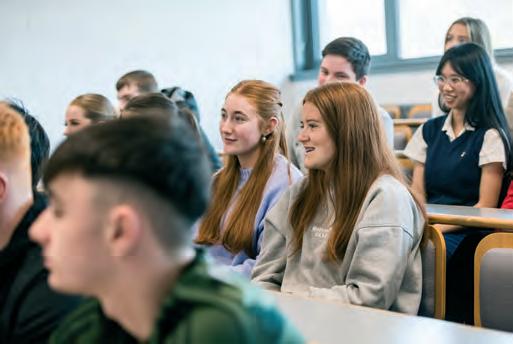
• Accounting
• Management
• Marketing with Online Technologies
This programme, which has degree award options in Accounting, Management, and Marketing with Online Technologies is designed to enable students to study business and explore specialisms as they progress through their degree. Students will be given a broad overview of the business world before specialising in Year 3. This is a unique and flexible programme, designed to allow students to pursue their interest in an area of business that most inspires them.
atu.ie/AU200
3 Years
233 (Level 7 2024)
100 Places Minimum Entry Requirements
Patricia Doherty Head of Department of Business Studies
patricia.doherty@atu.ie
Many students know they want to study business at university but are not quite sure which specific area of business they would like to focus on.
That’s why this common entry programme is so popular as it provides the opportunity to try different modules before specialising.
Careers for BBus (Hons) in Management graduates include working as a trainee manager, human resource assistant, procurement officer, and administrator. They may also work in operations, business development and finance and insurance.
Careers for Marketing with Online Technologies graduates include working as a marketing executive or assistant, advertising or public relations executive, market researcher, sales and marketing executive or a digital marketing executive.
Careers for Accounting graduates include working as a book-keeper, accounts administrator or various other finance roles. Most graduates of this degree will progress to the Level 8 programme with a view to later completing their professional accounting exams (ICA, ACCA or CIMA).
Year 1
• IT for Business
• Business Management
• Business Law
• Fundamentals of Marketing
• Business in Society
• Microeconomics
• Basic Business Statistics 1
• Introduction to Accounting
2
• Digital Marketing
• Macroeconomics
• Introduction to Business Process Management
• Marketing Principles
• Business Communications
• Financial and Cost Accounting
• Social Media Marketing
• Basic Business Statistics 2
• Business Information Systems
Additional elective modules are available throughout the programme.
Graduates may apply to join Year 4 of the Level 8 programme in their chosen specialist discipline. ATU Level 8 qualifications are recognised worldwide for postgraduate entry.

Accounting
Year 3
• Financial Report 1
• Management, Accounting and Finance
• Computerised Accounts
• Organisational Behaviour
• Management Accounting
• Company Law and Governance
Year 3
• Business Tax Management
• HRM and Employee Relations
• Organisational Behaviour
• Entrepreneurship and Innovation
• Business Law for Managers
• Digital Media
• Intrapreneurship
• Service and Operations Management
• Personal and Professional Development
Marketing with Online Technologies
Year 3
• Entrepreneurship and Innovation
• Copywriting 4.0
• Contemporary Issues in Marketing
• Organisational Behaviour
• Digital Media
• Website Performance
• Talent Management
• Generating Consumer Insight
• User Experience and Design
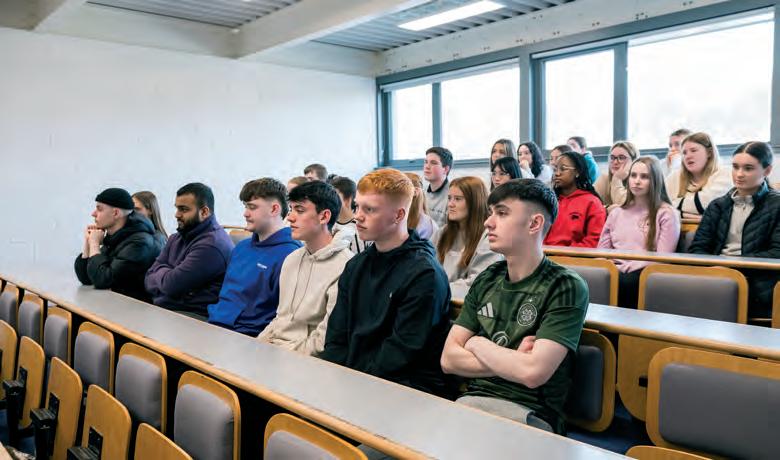
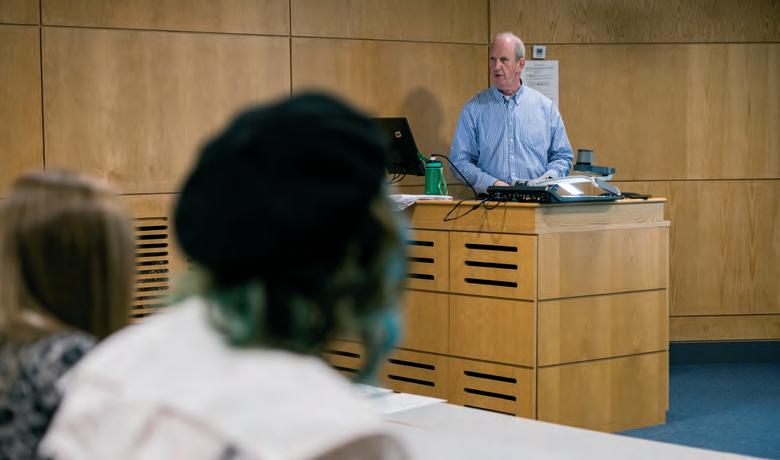
• Animation
• Film and Media Production
• Fashion Design with Promotion
• Graphic Design and Illustration
This programme offers art and design students the chance to explore various subjects before choosing a specialisation. In the first semester, all students take common modules in Animation, Film and Media Production, Graphic Design and Illustration, Fashion Design with Promotion and core art and design modules. This common entry programme allows equal exposure to these areas, enabling students to make an informed choice for their specialisation in the Level 7 degree during the second semester.
atu.ie/AU234
3 Years
Year 1 Common Semester 1
• Visual Enquiry
• Programme Fundamentals
• Communications and Creative Process
• Art and Design History 1
Animation
Year 1 Semester 2
• Art and Design History 2
• Animation Principles
• Narrative and Visual Story Telling
• Drawing Studies
• Animation Production Skills 1 and 2
• Drawing and Design 1 and 2
• Animation History 1 and 2
• Personal Film Project
• Animation Practice
• Animation Production
Minimum Entry Requirements PLUS
• Maths not required NEW Programme
24 Places
Work Placement
Head of Department of Design and Creative Media designhod.donegal@atu.ie
Studying a Design Common Entry Programme develops versatile skills, creativity, and foundation across multiple design disciplines.
Graduate careers from the Animation stream typically include storyboard artist, 2D animator, 3D animator, special effects artist, character design, environment designer. The Graphic Design and Illustration stream allows graduates to work as a graphic designer, advertising and art director, UX/UI/IxD designer, web designer, interactive media designer, motion graphics designer, print and publishing designer, freelance designer and illustrator.
Film and Media Production graduates may find work either in pre-production areas such as screen writing, script editing, casting, location scouting, and producing; or in production areas such as camera, lighting, sound, editing, visual effects and direction.
Fashion Design with Promotion often leads graduates to become a fashion designer, e-tailer, fashion stylist, shoot and production assistant, visual merchandising, fashion photographer/filmmaker, fashion advertising and marketing assistant, fashion illustrator, fashion blogger, and fashion buyer.
• Compositing and Visual Effects
• Animation and Contemporary Culture
• Professional Animation Practice/ Work Placement
• Contemporary Theory
Graduates may apply to join Year 4 of the level 8 programme in their chosen specialist discipline. ATU Level 8 qualifications are recognised worldwide for postgraduate entry.
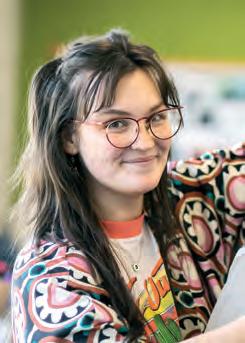
Film and Media Production
Year 1 Semester 2
• Music Video
• Storytelling and Scripting 1
• Sound Recording: Mixing and Production
• Cinematography 1
• Art and Design History 2
Year 2
• Ambient and Foley Sound
• Cinematography 2
• Early Film History
• Storytelling and Scripting 2
• Post-Production 1
• Cinematography 3
• Documentary Filmmaking
• 20th Century Film and TV History
Year 3
• Post-Production 2
• Cinematography 4
• Modern Film, History and Theory
• Interactive Audio Video
• Film Project
• Professional Practice in the Creative Industries
• Contemporary Theory
• Event and Promotional Filming/ Placement
Fashion Design with Promotion
Year 1 Semester 2
• Art and Design History 2
• Fashion Design and Development 1
• Fashion Illustration and Presentation Design
• Photography – Studio
Year 2
• Fashion Flats and Pattern Cutting
• Fashion Sustainability and Innovation
• Fashion History 1
• Video Recording and Editing
• Fashion Design and Development 2
• Photography Post-Processing
• The History of Fashion and Fashion Promotion
• Social Media Promotion
Year 3
• Accessory and Menswear Design
• Graphic Design for Fashion Promotion
• Fashion Marketing
• Video Post-Production
• Work Placement
• Fashion Project
• Cost and Sourcing
• Contemporary Theory
• Personal Promotional and Professional Practice
Graphic Design and Illustration
Year 1 Semester 2
• Art and Design History 2
• Graphic Design: Layout
• Image: Illustration and Art Direction
• UX Design: Process
Year 2
• Graphic Design: Identity
• Image: Motion Design Fundamentals
• UX Design: Applied
• Graphic Design History 1 and 2
• Graphic Design: Spatial
• Image: Dynamic Identities
• UX Design: User Interface
Year 3
• Graphic Design: Publication
• Image: Advertising and Brand Strategy
• UX Design: Personal Promotion
• Design Theory: Advertising and Branding
• Professional Design Practice
• Contemporary Theory
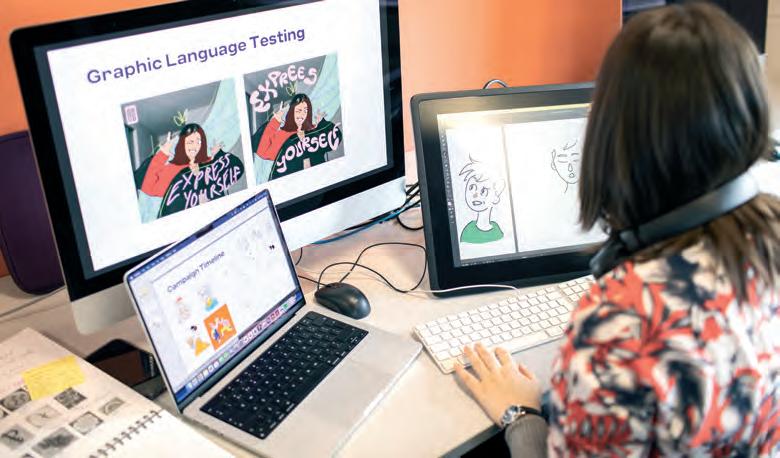
Animation appears everywhere – in children’s TV and Films, computer games, advertisements, music videos, title sequences, special effects and as experimental and short films. There is no limit to the variety of materials and methods that can be used to make animated films. This is a creative animation programme offering a broad range of skills designed to enable you to operate independently within the commercial environment after graduation. The contemporary animation industry requires creative thinkers who can operate flexibly within different aspects of animation production.
atu.ie/AU331
4 Years
NEW Programme
Minimum Entry Requirements PLUS
• Art or Graphic Design O6/ H7 or
• Portfolio
• Maths not required
24 Places
Work Placement
Head of Department of Design and Creative Media designhod.donegal@atu.ie
Successful graduates find themselves working in animation companies, the games industry, live-action or special effects, and advertising. They typically work as animators, 3D modelers or storyboard artists.
ATU Level 8 qualifications are recognised worldwide for postgraduate entry.
Did you know Ireland’s animation sector has grown significantly in the past two decades with studios producing content for Disney, Netflix, Nickelodeon, CBBC amongst many others. This creates a steady demand for skilled animators and opens up real career paths for graduates, with universities developing strong links with industry.
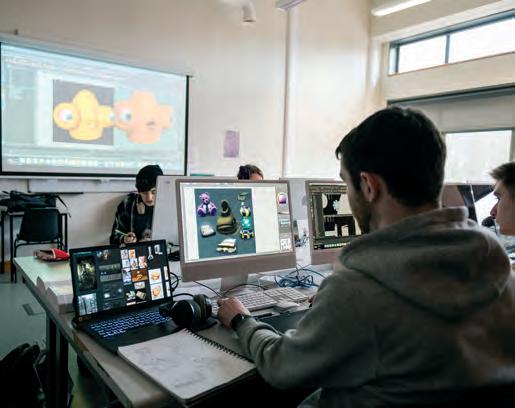
Year 1
• Visual Enquiry
• Photography Fundamentals
• Communications and Creative Process
• Animation Fundamentals
• Art and Design History 1 and 2
• Animation Principles
• Narrative and Visual Story Telling
• Drawing Studies
Year 2
• Animation Production Skills 1 and 2
• Drawing and Design 1 and 2
• Animation History 1 and 2
• Personal Film Project
• Animation Practice
Year 3
• Animation Production
• Compositing and Visual Effects
• Animation and Contemporary Culture
• Professional Practice in the Creative Industries
• Animation Project
• Digital Animation Portfolio
• Contemporary Theory
Year 4
• Industry/Competition Project
• Pre-Production and Process
• Research and Dissertation
• Major Project
• Innovation and Creativity
There is the option to undertake a 12-week full-time industry placement or study abroad in Year 3 or engage with live projects specialising in an area of animation production.
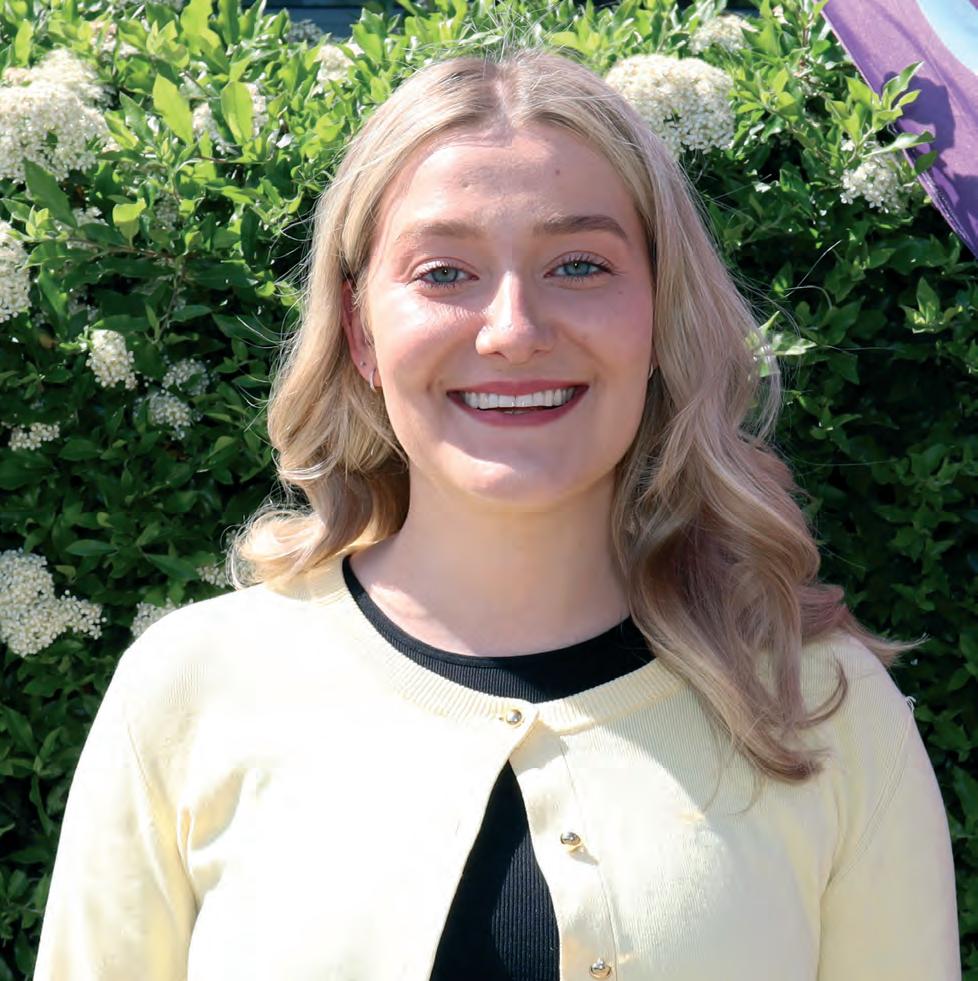
I was previously working in live action T.V. and Film. Unfortunately, due to a sudden physical disability I had to take a career break. I decided to use this time to upskill and pivot my career. With my portfolio and Recognised Prior Learning I was able to gain direct entry into year 3.
I loved the Animation Project module as we could be as creative as we wanted, and bring our own characters and ideas to life. There is also the opportunity to go on work placement which is invaluable to get real life experience in the industry. The lectures are all really lovely and helpful. They are passionate about the industry and proactive in organising trips and events.
This programme is designed to cater for emerging opportunities across the film and media sector in the key areas of digital film production planning, story and script, audio, design, special effects, compositing and editing. An enterprise and entrepreneurship ethos is embedded in modules. This programme engages traditional and emerging practices to cater for the needs of the film and media industry. Self-directed practice will be a key component across several modules that will focus on audience and market.
atu.ie/AU332
NEW Programme
4 Years Minimum Entry Requirements PLUS
• Maths not required
24 Places Work Placement
Erasmus+
Head of Department of Design and Creative Media designhod.donegal@atu.ie
Graduates may find work either in pre-production areas such as screen writing, script editing, casting, location scouting, and producing; or in production areas such as camera, lighting, sound, editing, visual effects and direction.
ATU Level 8 qualifications are recognised worldwide for postgraduate entry.
Students have the option to take an Erasmus+ semester abroad as part of this degree.
Studying film and media production provides hands-on experience in storytelling, cinematography and digital editing, preparing students for diverse careers in the Film and Media Industries.
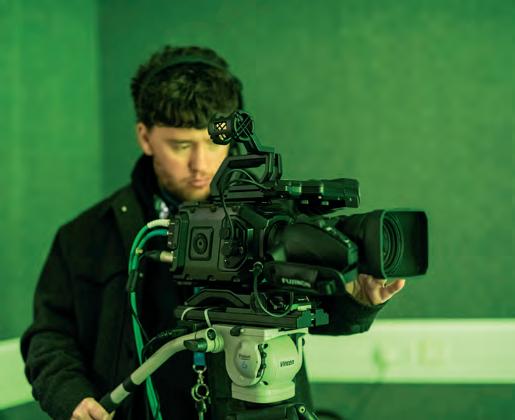
• Visual Enquiry
• Photography Fundamentals
• Sound and Narrative Fundamentals
• Communications and Creative Process
• Art and Design History 1
• Music Video
• Storytelling and Scripting 1
• Sound Recording: Mixing and Production
• Cinematography 1
• Art and Design History 2
Year 2
• Ambient and Foley Sound
• Cinematography 2
• Early Film History
• Storytelling and Scripting 2
• Post-Production 1
• Cinematography 3
• Documentary Filmmaking
• 20th Century Film and TV History
• Post-Production 2
• Cinematography 4
• Modern Film, History and Theory
• Interactive Audio Video
• Film Project
• Professional Practice in the Creative Industries
• Contemporary Theory
• Event and Promotional Filming/ Placement
• Industry/Competition Project
• Pre-Production and Process
• Research and Dissertation
• Major Project
• Innovation and Creativity
This innovative programme prepares the next generation of creative, skilled, and industry-ready fashion professionals. In today’s fast-paced and competitive landscape, it nurtures problem-solvers and mindful designers committed to sustainability and global awareness. Students engage in specialised areas such as fashion design, construction, pattern drafting, and social mediafocused photography and videography. The curriculum also includes brand design, marketing, costing, and sourcing, equipping graduates with a wellrounded understanding of sustainable, financially sound practices essential for modern fashion success.
atu.ie/AU334
4 Years Minimum Entry Requirements PLUS
• Maths not required NEW Programme
24 Places Work Placement
Head of Department of Design and Creative Media designhod.donegal@atu.ie
This four-year degree provides students with essential skills and industry insights to succeed in various fashion-related careers. Graduates may pursue roles as fashion designers within established brands or manufacturing settings, or they may choose to launch their own independent labels. Other potential career paths include positions as pattern drafters, fashion buyers, merchandisers, content creators, marketing specialists, fashion photographers, costume designers, and garment technologists.
Graduates may also choose to further their education by pursuing postgraduate studies at ATU or at other universities in Ireland or internationally, should they wish to deepening their expertise and expand their career opportunities within the fashion industry.
This programme emphasises a bold exploration of innovation and boundary-pushing creativity, thoughtfully rooted in circular design to challenge conventions and inspire sustainable transformation. The integration of innovative fashion design with essential studies in promotion and business understanding offers a robust foundation for professional success within the fashion industry.
Year 1
• Visual Enquiry
• Photography Fundamentals
• Communications and Creative Process
• Fashion Fundamentals
• Art and Design History 1 and 2
• Fashion Design and Development 1
• Fashion Illustration and Presentation Design
• Photography – Studio
Year 2
• Fashion Flats and Pattern Cutting
• Fashion Sustainability and Innovation
• Fashion History 1
• Video Recording and Editing
• Fashion Design and Development 2
• Photography Post-Processing
• The History of Fashion and Fashion Promotion
• Social Media Promotion
Year 3
• Accessory and Menswear Design
• Graphic Design for Fashion Promotion
• Fashion Marketing
• Video Post-Production
• Work Placement
• Fashion Project
• Cost and Sourcing
• Contemporary Theory
• Personal Promotional and Professional Practice
Year 4
• Industry/Competition Project
• Pre-Production and Process
• Research and Dissertation
• Major Project
• Innovation and Creativity
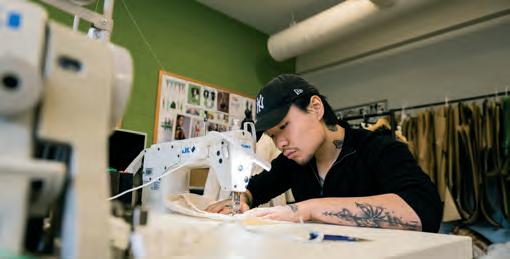
Graphic Design shapes how we experience the world from apps and websites to branding and advertising. This programme is about more than making things look good, it’s about thinking deeply, and solving problems. We blend traditional skills like typography and layout with illustration, motion graphics, and UX/UI design. Students explore emerging technologies, work on real client briefs, and enter international competitions. This programme is hands-on, forward-thinking, and built to give you the creative tools and critical mindset for a future-proof, imaginative career.
atu.ie/AU333
4 Years
NEW Programme
Minimum Entry Requirements PLUS
• Maths not required
24 Places
Work Placement
Head of Department of Design and Creative Media designhod.donegal@atu.ie Erasmus+
Work Placement
12-week full-time industry placement or study abroad in Year 3. Engage in live project briefs, international competitions, and collaborations with industry professionals, gaining practical, real-world experience.
Graduate as a versatile designer capable of crafting complex visual designs, brand identities, publications and motion graphics. With a strong emphasis on illustration and image-making, our graduates pursue diverse careers – from graphic designers and freelance illustrators to UX/UI and digital product designers, advertising art directors, digital marketers, and in-house designers.
Graduates may also choose to further their education by pursuing postgraduate studies at ATU or other universities in Ireland or Internationally.
Evan Sharp- cofounder of Pinterest, Brian Chesky and Joe Gebbiacofounders of Airbnb and Charles Adler- cofounder of Kickstarter all have backgrounds in design. Studying graphic design teaches you the skills and processes to not only solve problems, but to identify them.
Year 1
• Visual Enquiry
• Communications and Creative Process
• Graphic Design: Fundamentals
• Photography Fundamentals
• Art and Design History 1 and 2
• Graphic Design: Layout
• Image: Illustration and Art Direction
• UX Design: Process
Year 2
• Graphic Design: Identity
• Image: Motion Design Fundamentals
• UX Design: Applied
• Graphic Design History 1 and 2
• Graphic Design: Spatial
• Image: Dynamic Identities
• UX Design: User Interface
• Graphic Design: Publication
• Image: Advertising and Brand Strategy
• UX Design: Personal Promotion
• Design Theory: Advertising and Branding
• Professional Design Practice
• Contemporary Theory
Year 4
• Industry/Competition Project
• Pre-Production and Process
• Research and Dissertation
• Major Project
• Innovation and Creativity
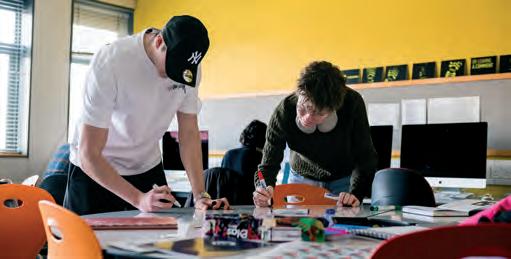
This programme is a three-year honours law degree, which has approved degree status with the Kings Inns and is also recognised as a qualifying law degree by the Institute of Professional Legal Studies (Northern Ireland). It also provides appropriate preparation for the entrance exams to The Law Society of Ireland. It combines study of the core areas of law with new and emerging areas of legal study such as alternative dispute resolution, human rights, media law, and Street Law.
atu.ie/AU310
3 Years
327 (Level 8 2024)
Minimum Entry Requirements PLUS
• Maths not required
50 Places
Work Placement
Erasmus+
Dr Brónagh Heverin Head of Department of Law, Public Service and Education bronagh.heverin@atu.ie
Successful graduates find themselves working in the legal profession, law enforcement, journalism, social work, advocacy, or the civil service. Graduates typically work as a solicitor or barrister, legal executive, company secretary, legal advisor, researcher, journalist or in banking and finance.
Graduates from the Level 8 programme may progress to the Master of Arts or Postgraduate Diploma in Governance and IT in Financial Services. ATU Level 8 qualifications are recognised worldwide for postgraduate entry.
Third year students can undertake a work placement and other clinical/practical modules based on experiential learning or teach Street Law classes within the community and local schools.

Year 1
• Introduction to Legal Research Skills and Methods
• ICT Skills
• Irish Legal System
• Foundations of Law
• Constitutional Law 1
• Contract Law
• Constitutional Law 2
• Criminal Law
• Employment Law
Year 2
• Family and Child Law
• Land and Succession Law
• Tort
• Administrative Law
• Company Law and Governance
• Jurisprudence
Year 3
• Human Rights
• European Union Law
• Evidence
• Equity and Trust
Additional elective modules are available throughout the programme.
Studying an LLB unlocks the door to a world where you analyse cases, debate ethical issues, and advocate for justice!
Qualifying Law Degree:
• Accredited law degree by Kings Inns
• Accredited law degree by the Institute of Professional Legal Studies (Northern Ireland)
• Approved law degree to sit the final examination of the Law Society – first part FE1
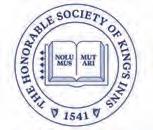
This programme was developed in response to demand from employers for law graduates with expertise in corporate law. In addition to meeting all the requirements of a core law degree (recognised by the Kings Inns and providing the necessary preparation for the Law Society entrance exams) it also includes specialty subjects in contemporary corporate law. Examples of these specific subjects include banking law, international business and trade law, financial services law, and regulation, business ethics and social responsibility, privacy, and data protection law, and contemporary issues in commercial law.
atu.ie/AU311
3 Years Minimum Entry Requirements PLUS
• Maths not required 319 (Level 8 2024)
50 Places
Work Placement
Erasmus+
Dr Brónagh Heverin Head of Department of Law, Public Service and Education
bronagh.heverin@atu.ie
Successful graduates find work as in-house commercial lawyers, in corporate law firms and enforcement, in various businesses, journalism, advocacy and the civil service. Graduate careers, include working as a corporate lawyer (either as a solicitor or barrister), in-house legal counsel, legal executive, company secretary, legal advisor or analyst, researcher, journalist, together with banking, finance and compliance roles.
Graduates of this programme may choose to continue their studies on the Master of Arts or Postgraduate Diploma in Governance and IT in Financial Services. ATU Level 8 qualifications are recognised worldwide for postgraduate entry.
On completion graduates can decide to pursue either the traditional legal professions or specialise in corporate law, often as an in-house lawyer for a big business.
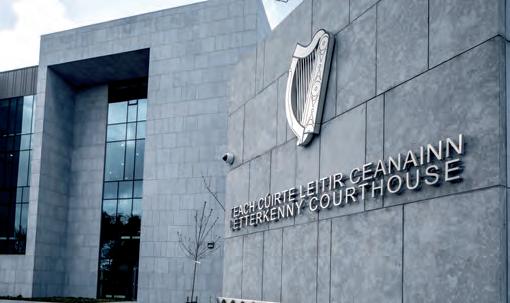
Year 1
• Introduction to Legal Research Skills and Methods
• ICT Skills
• Irish Legal System
• Foundations of Law
• Constitutional Law 1
• Contract Law
• Constitutional Law 2
• Criminal Law
• Employment Law
Year 2
• Business Ethics and Social Responsibility
• Privacy and Data Protection Law
• Land and Succession Law
• Tort
• Administrative Law
• Company Law and Governance
• Fundamentals of Banking Law
• International Business and Trade Law
Year 3
• European Union Law
• Jurisprudence
• Insurance Law
• Evidence
• Equity and Trust
• Contemporary Issues in Commercial Law
Additional elective modules are available throughout the programme.
Qualifying Law Degree:
• Accredited law degree by Kings Inns
• Accredited law degree by the Institute of Professional Legal Studies (Northern Ireland)
• Approved law degree to sit the final examination of the Law Society – first part FE1

This law programme is for students who have an interest in law but also how it is practised and its effect on achieving justice in everyday life. In addition to core law subjects, this degree includes additional subjects in the area of criminal justice and will suit those with an interest in crime, victimology, and conflict resolution. The majority of students completing this programme will continue to complete a fourth year and achieve a level 8 honours degree recognised as a qualifying law degree by the professional bodies.
atu.ie/AU210
204 (Level 7 2024)
3 Years Minimum Entry Requirements PLUS
• Maths not required
70 Places
Work Placement
Erasmus+
Dr Brónagh Heverin
Head of Department of Law, Public Service and Education
bronagh.heverin@atu.ie
Successful graduates find work in the legal profession, law enforcement, journalism, social or youth work, advocacy, civil service, public service, legal analyst and compliance roles. Graduate careers typically include work as a solicitor, barrister or legal executive. Other options include working as a company secretary, legal advisor, researcher or journalist. Graduates will also find work with civil service regulatory bodies in criminal justice, the Gardaí, advocacy, probation and social work.
Graduates may apply to join Year 4 of the Level 8 programme in Law with Criminal Justice. ATU Level 8 qualifications are recognised worldwide for postgraduate entry.
Students will also have the opportunity for work placement or Street Law which involves teaching law to Community groups or local schools.

This programme combines legal expertise with insights into law enforcement, criminology, and the justice system providing access to a range of rewarding and stimulating careers.
Year 1
• Introduction to Legal Research Skills and Methods
• ICT Skills
• Irish Legal System
• Foundations of Law
• Constitutional Law 1
• Contract Law
• Criminal Law
• Constitutional Law 2
• Introduction to Criminal Justice
Year 2
• Family and Child Law
• Land and Succession Law
• Criminal Practice and Procedure
• Victimology
• Company Law and Governance
• Administrative Law
• Mooting
• Employment Law
Year 3
• Tort
• Alternative Dispute Resolution
• Legal Practice Skills
Additional elective modules are available throughout the programme.
Qualifying Law Degree:
• Accredited law degree by Kings Inns
• Accredited law degree by the Institute of Professional Legal Studies (Northern Ireland)
• Approved law degree to sit the final examination of the Law Society – first part FE1

This Communications with English programme gives students a modern skill set in communications together with essential English skills. Creativity and application are central to the programme in the context of current media and emerging technologies. Graduates from this programme will have an understanding of the communications industry combined with a solid grounding and understanding of the fundamentals of English which is critical to communication.
atu.ie/AU312
3 Years
307 (Level 8 2024)
Minimum Entry Requirements PLUS
• Min. H5 in English
50 Places
Dr Brónagh Heverin Head of Department of Law, Public Service and Education bronagh.heverin@atu.ie
Graduates may find work as an editor, author, managing editor, copywriter, marketing officer, secondary school teacher, communications officer, or content marketing officer.
Graduates may apply to complete a Professional Master of Education (PME) to become a secondary school teacher of English.
Many other postgraduate options are available at ATU or other universities in Ireland or Internationally..
The core English modules required for Teaching Council registration are all included in this programme. Graduates will also have a broad knowledge of literature, writing skills, critical thinking and film studies.
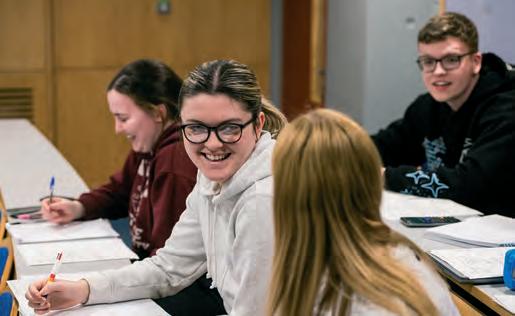
• Critical Thinking Skills
• Introduction to Sociology
• Introduction to English Literature and Writing Skills
• Foundation in Communications Studies
• Communications and Creative Process
• The Novel
• Introduction to TEFL
• Intercultural Communications
• Introduction to Criminal Justice
• Communications Analysis
• Shakespeare and the Renaissance
• Introduction to Creative Writing
• Content Design and Development
• Digital Citizenship
• Romanticism
• TEFL Techniques and Assessment
• Media and Communications Law
• 20th Century and Contemporary Irish Writing
• Alternative Dispute Resolution
• Research Methods
• Film Studies
• Irish Drama and Theatre
• Capstone Project (Communications with English)
• Emerging Technologies and Influences
Participation in the programme culminates in a capstone project in the final semester where students have the option of an academic, creative and/or industry standard project reflecting the interests of each student and potential career opportunities.

I loved English in school, and I have an interest in marketing, so it was the perfect programme for me. I love the content design and development class because it is creative, and you could go in any direction. The programme will provide me with a wide range of career options as well as further education options.
The staff are great and go out of their way to help in any way they can. The facilities on campus are fantastic and include gyms, canteens and a library. The services that the university offer are a great help whilst studying, for example, the laptop loan scheme. University life in Donegal is fun, and I am lucky to study whilst living at home!
This degree provides a broad overview of the hospitality and tourism sector, progressively taking the learner from an operational perspective in Year 1, to looking at a strategic perspective in Year 3 of the programme. Throughout this programme, students will gain oversight on every aspect of the sector, from bar and restaurant operations to rooms division management, as well as culinary skills and revenue management. This programme will empower students to embark on an exciting career with the opportunity to travel far and wide with their qualifications.
3 Years
291 (Level 8 2024)
Minimum Entry Requirements PLUS
• O6/H7 Maths
40 Places
Work Placement
Nicola Dunnion Head of Department of Tourism and Sport nicola.dunnion@atu.ie
Work Placement
Studying Hospitality Management trains students in hotel operations, event planning, and customer service for dynamic global careers. atu.ie/AU322
A one-year optional work placement will be available to those students who have successfully completed 120 credits in Year 2 (min GPA 50%). The work placement will provide learners with the opportunity to gain valuable practical experience in the hospitality sector. Students who chose work placement can graduate with the award BA (Hons) in Hospitality Management Practice.
This provides a broad overview of the hospitality and tourism sector, progressively taking the learner from an operational perspective in Year 1, to looking at a strategic perspective in Year 3 of the programme.
Graduate careers typically include working as a hotel manager, room division manager, food and beverage manager, event coordinator, conference and banqueting manager, club/resort manager or a food and beverage sales executive. Graduates find work in the hotel industry, bars and clubs, as well as cruise ships, airlines and catering companies.
ATU Level 8 qualifications are recognised worldwide for postgraduate entry.
• Bar Operations
• Restaurant Operations
• IT and Study Skills
• Principles of Marketing for Tourism and Hospitality
• Introduction to the Tourism Industry
• Beverage Management, Mixology and Wines
• Professional Business Communications
• Rooms Division Management
Year 2
• Management and Organisational Behaviour
• HR and Hospitality Law
• Financial Information and Decision Making
• Food and Beverage Cost Control
• Digital Marketing Skills
• Restaurant Management
• Culinary Skills
• Events Management
• Staff Training and Development
• Strategic Revenue Management
• Financial Accounting for Hospitality
• Sustainable Hospitality Management
• Lean Six Sigma for the Hospitality Sector
• Strategic Hospitality Management
• Talent Management and Employment Legislation
• Marketing Management Strategy
This programme is designed for students aiming to work in the tourism industry, offering practical classes, field trips, and work experience to prepare graduates for careers in tourism and hospitality globally. It focuses on the operational aspects of hospitality management, covering bar and restaurant operations, beverage management, rooms division management, and culinary skills. Students also gain essential digital skills and study tourism-specific subjects like guiding and tourism destination development.
atu.ie/AU221
222 (Level 7 2024)
3 Years Minimum Entry Requirements PLUS
• Maths not required
40 Places
Work Placement
Erasmus+
Nicola Dunnion Head of Department of Tourism and Sport nicola.dunnion@atu.ie
Graduate careers typically include working as a sales and marketing executive, conference and events executive, food and beverage sales executive, rooms division manager, event coordinator, conference and banqueting manager, club/resort manager or a tour guide.
Graduates may apply to join Year 4 of the Level 8 BA (Hons) in Hospitality Management programme. ATU Level 8 qualifications are recognised worldwide for postgraduate entry.
Studying Tourism and Hospitality Operations equips students with skills to manage travel services, hotels, and event planning, focusing on customer satisfaction.
Year 1
• Bar Operations
• Restaurant Operations
• IT and Study Skills
• Principles of Marketing for Tourism and Hospitality
• Introduction to the Tourism Industry
• Beverage Management, Mixology and Wines
• Professional Business Communications
• Rooms Division Management
Year 2
• Management and Organisational Behaviour
• HR and Hospitality Law
• Financial Accounting for Hospitality
• Food and Beverage Cost Control
• Digital Marketing Skills
• Restaurant Management
• Culinary Skills
• Events Management
• Staff Training and Development
Year 3
• Work Placement
• Tourism Destination Development
• Tourism and Policy
• Website Performance
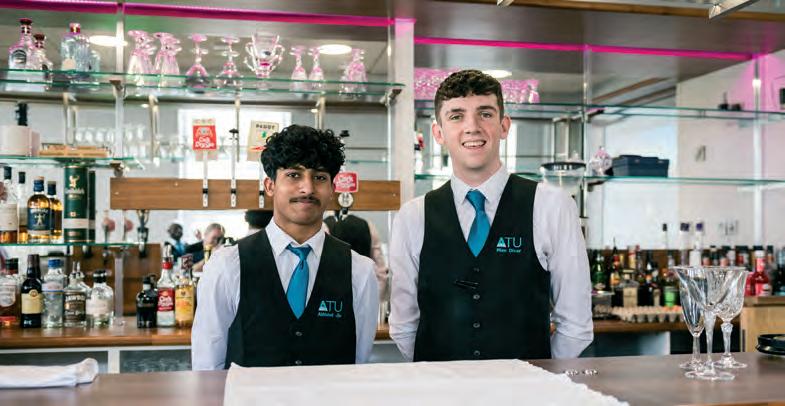
This full-time, three-year Level 7 programme is an advanced professional training programme for aspiring professional chefs who wish to extend their education beyond general training into specialised kitchen functions. It prepares participants for professional careers in the field of culinary arts, savoury, bakery and confectionary.
atu.ie/AU220
3 Years
160 (Level 7 2024)
Minimum Entry Requirements PLUS
• Maths not required
Graduate careers typically include working as a chef, head chef, executive chef, pastry chef, baker or food production manager. Successful graduates find themselves working in hotels, restaurants, cruise ships or contract catering.
Work Placement
32 Places Nicola Dunnion Head of Department of Tourism and Sport nicola.dunnion@atu.ie
Special Features
Students of this programme participate in supervised work placement in each year of the programme.
Graduates may apply to join Year 4 of the Level 8 programme in Professional Kitchen Management. ATU Level 8 qualifications are recognised worldwide for postgraduate entry.
Culinary Arts combines cooking skills, creativity, and business knowledge for a dynamic culinary career.
• Essential Culinary Skills
• Fundamental Pastry and Baking Techniques
• Learning and Research for Higher Education
• Culinary Science, Technology and Food Safety
• Developing Culinary Skills
• Pastry Pies and Tarts
• IT for Culinary Skills
• Food and Beverage Service
• Work Placement 1
• Street Food, Design and Development
• Contemporary Pastry Practice
• Organisational Behaviour and Wellbeing
• Food Purchasing and Cost Control
• Professional Cakes
• Seafood Processing and Culinary Practice
• Plant Based and Sustainable Foods
• Social Media Apps
• Work Placement 2
• Event Planning and Kitchen Supervision
• Menu Design, Diet and Nutrition
• Advanced Pastry and Desserts
• Modernist Cuisine
• Training and HR
• Management of Culinary Accounting
• Work Placement 3
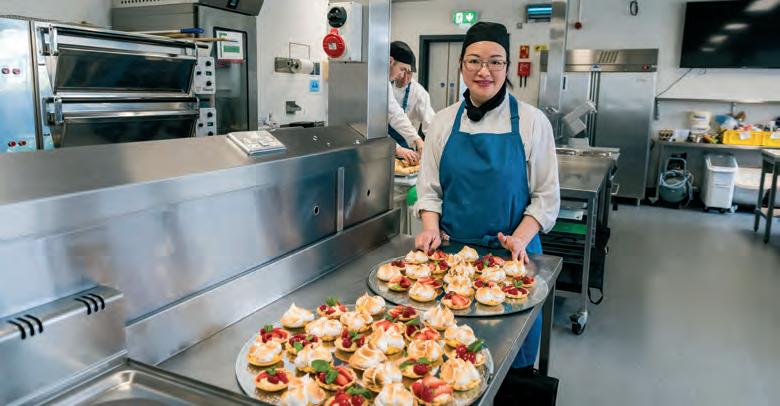
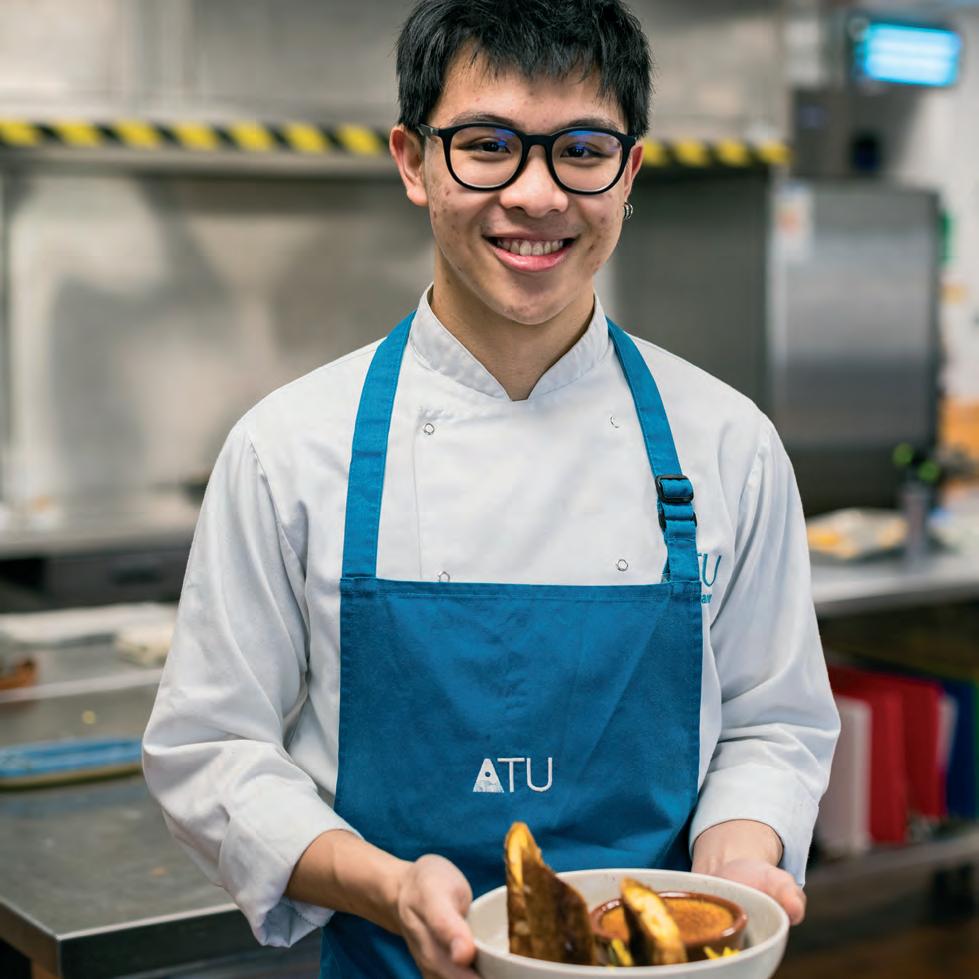
What I love specifically about the programme is the work placements every year. I believe that this is vital for future chefs as we get real life experiences in the kitchen. This is a great opportunity for students like me to learn in a real kitchen environment.
My favourite module would be contemporary pastry practice. You really dive deep into the world of desserts and learn so many different techniques, terms and ingredients out of this module. If you become a chef, you can work almost anywhere, kitchens around the world are always looking for good chefs. It’s a great way to travel, see new places, and do what you enjoy.
• Performance and Wellbeing
• Physical Education
This programme is for students interested in studying sport and exercise at third level, offering specialisations in sports performance and wellbeing or physical education studies. The first two years provide a foundational core, while Year 3 and Year 4 allow for specialisation. The performance stream combines research theory with applied areas like strength and conditioning, psychology, and nutrition. The education stream integrates research with curriculum-based instructional models, covering games, aquatics, gymnastics, dance, athletics, and outdoor adventure education.
atu.ie/AU320
4 Years
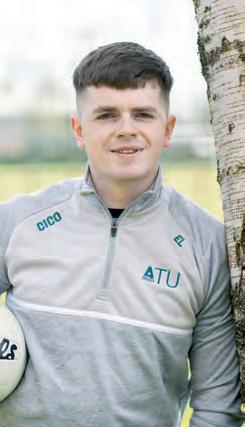
Minimum Entry Requirements PLUS
• O6/H7 Maths
• Garda Vetting 317 (Level 8 2024)
60 Places
Work Placement
Erasmus+
Nicola Dunnion
Head
of Department of Tourism and Sport nicola.dunnion@atu.ie
Graduate careers typically include physical education (after completion of a relevant postgraduate qualification in physical education at universities such as University of Limerick, Ulster University, Loughborough University, University of the West of Scotland, Edge Hill University and Liverpool John Moore’s University). However, it should be noted that admission to postgraduate programmes in physical education is not automatic. In addition to getting an honours degree candidates are usually required to pass an interview. Other popular graduate careers include sports coaching, personal trainer, fitness instructor, health promotion specialist, sports development officer, leisure centre manager or sports agency administrator.
Follow-on programmes include the Master of Science in Sports Performance Practice in ATU Donegal or various other Masters degrees in universities in Ireland and abroad.
Students study the first two common years before choosing which stream they would like to follow from Year 3, Sports and Exercise with Performance and Wellbeing or Sports and Exercise with Physical Education.
This degree offers a pathway to becoming a secondary school teacher of Physical Education.
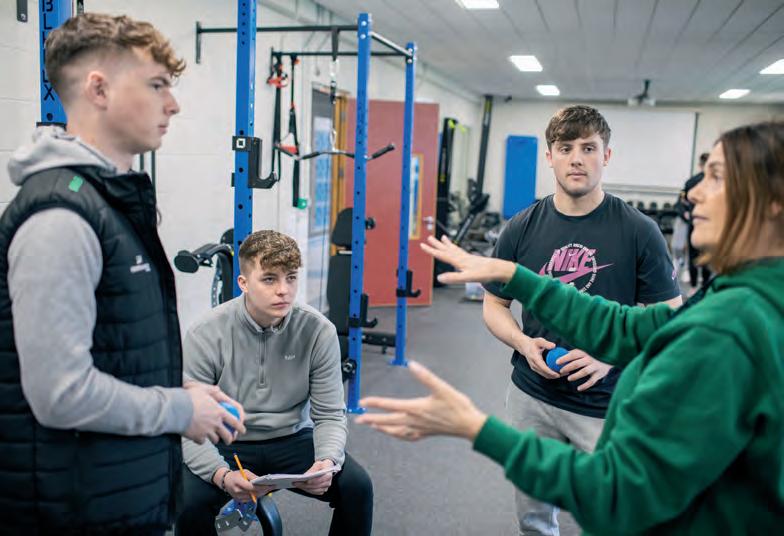
Year 1
• Sports Study Skills 1 and 2
• Introduction to Anatomy and Physiology 1 and 2
• Health Related Physical Activity
• Sports Coaching Practice
• Sports Leisure and Society
• Exercise Prescription and Programme Design
• Sports Coaching Leadership
Year 2
• Biomechanics and Movement Analysis
• Sports and Leisure Frameworks
• Sports and Exercise Nutrition
• Performance Analysis and Technology in Sport
• Sports and Exercise Physiology
• Foundation of Strength and Conditioning
Performance and Wellbeing
Year 3
• Introduction to Sports Psychology
• Personal Fitness Instruction
• Health Promotion Practice
• Developing as a Sports Practitioner
• Work Placement or Erasmus+
Year 4
• Sports Nutrition and Physiology: Practical Applications
• Applied Sports Psychology
• Research Methods
• Research Project
• Applied Sports Performance Practice
Year 3
• Introduction to Sports Psychology
• Physical Education and Adapted Physical Activity
• Movement Studies: Gymnastics and Dance
• Developing as a Physical Educator
• Work Placement or Erasmus+
Year 4
• Applied Sports Psychology
• Sports Nutrition and Physiology: Practical Applications
• Athletics and Games
• Research Methods
• Research Project
• Adventure and Aquatics
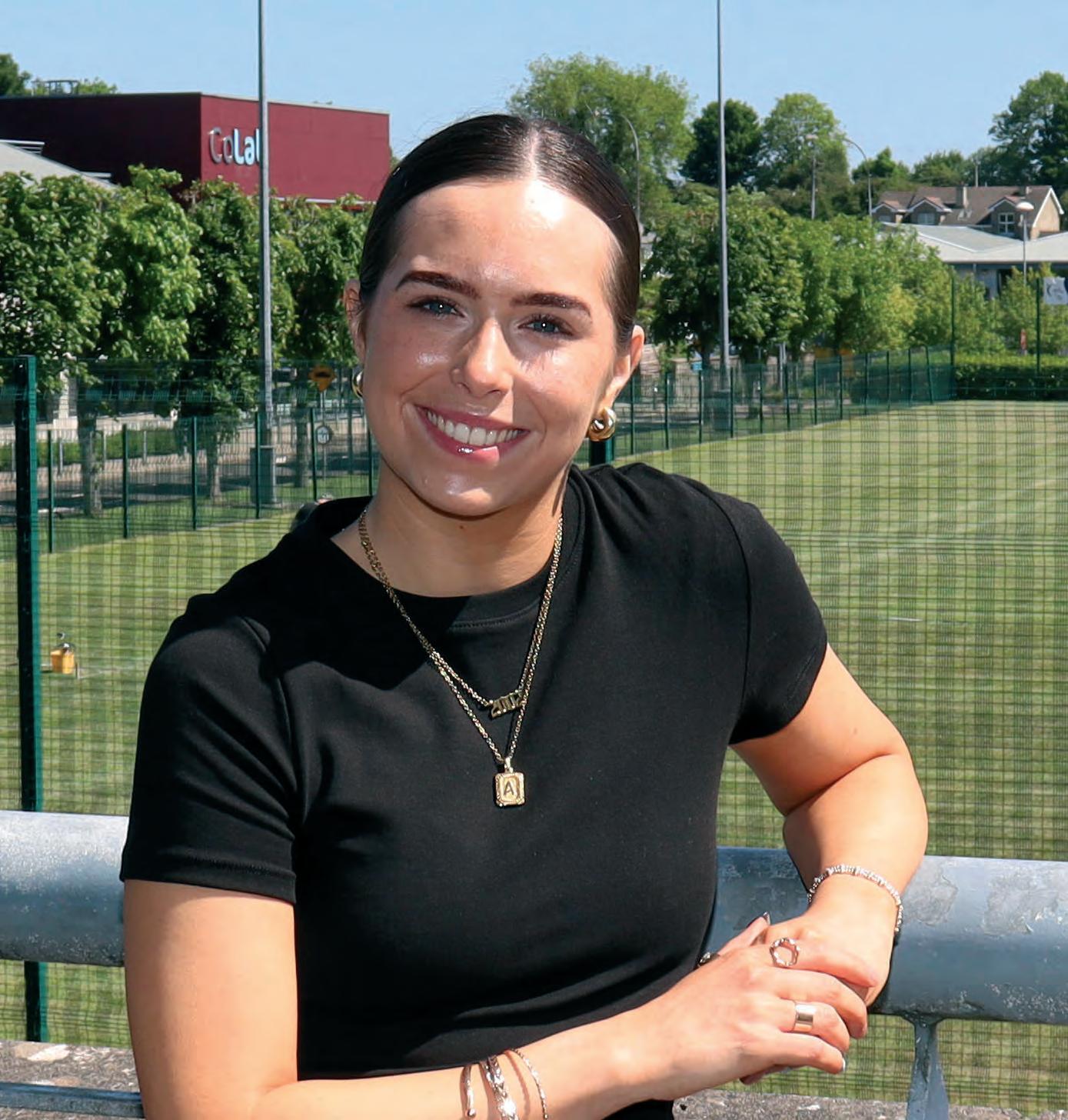
I have always played sport growing up and knew I wanted to study a programme that would lead me to a career in the industry. I enjoyed the different opportunities to work with local schools and kids to give real life experience in the coaching/ teaching world. I got to experience both the performance and physical education route in first and second year before specialising in third year.
I have played on the Women’s ATU Basketball Team. It’s a great team full of amazing and welcoming women. I have had the opportunity to run an adult’s dance fitness class and hope to broaden my areas with this class as well as introducing a kids dance class to local areas.
This new programme will provide learners with a strong foundation in the discipline areas of performance, health and well-being. Students will study topics such as coaching, sports and exercise nutrition, and leadership and technology. The modules are taught in a practical nature and will prepare participants for the world of work in sport. In the final year of this programme, students will complete a work placement. This programme provides learners with the opportunity to combine their greatest passion with a successful career.
atu.ie/AU222
3 Years Minimum Entry Requirements PLUS
• Garda Vetting 243 (Level 7 2024)
40 Places
Work Placement
Nicola Dunnion Head of Department of Tourism and Sport nicola.dunnion@atu.ie Erasmus+
Graduate careers typically include working as a fitness instructor, sports development officer or sports coach. Successful graduates find work in the areas of coaching, leisure, health-care or fitness.
Graduates may apply to join Year 4 of the Level 8 programme in Sports and Exercise with degree award options: Performance and Wellbeing or Physical Education.
Students will study topics such as coaching, sports and exercise nutrition, leadership and technology.
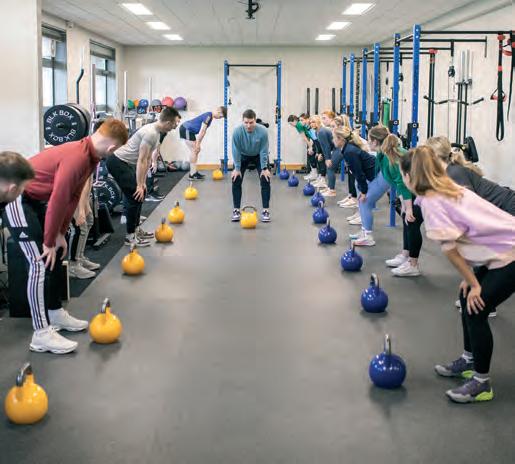
Year 1
• Sports Study Skills 1 and 2
• Introduction to Anatomy and Physiology 1 and 2
• Health Related Physical Activity
• Sports Coaching Practice Sports
• Leisure and Society
• Exercise Prescription and Programme Design
• Sports Coaching Leadership
Year 2
• Biomechanics and Movement Analysis
• Sports and Leisure Frameworks
• Sports and Exercise Nutrition
• Performance Analysis and Technology in Sport
• Sports and Exercise Physiology
• Foundation of Strength and Conditioning
Year 3
• Introduction to Sports Psychology
• Personal Fitness Instruction
• Developing as a Sports Practitioner/Physical Educator
• Health Promotion and Wellbeing
• Movement Studies: Gym and Dance
• Work Placement or Erasmus+ Placement
• Introduction to Sports Psychology
• Physical Education and Adapted Physical Activity
• Developing as a Sports Practitioner/Physical Educator
• Health Promotion and Wellbeing
• Movement Studies: Gymnastics and Dance
• Work Placement or Erasmus+ Placement
This four-year honours degree equips students with the knowledge and clinical skills to diagnose, manage, and treat injuries in high-performance athletes, recreational exercisers, and the general public. With high demand for rehabilitation expertise in all levels of sport and physical activity, the programme trains students in contemporary diagnostic and therapeutic techniques. The first two years cover core subjects like anatomy, physiology, and musculoskeletal assessment, while the last two years focus on clinical skills through student-led clinics, work placements, and a clinical research project.
atu.ie/AU321
4 Years Minimum Entry Requirements PLUS
• O6/H7 Maths
• Garda Vetting 357 (Level 8 2024)
60 Places Nicola Dunnion Head of Department of Tourism and Sport nicola.dunnion@atu.ie Work Placement
Graduate careers typically include working as a certified athletic therapist, sports rehabilitation practitioner, exercise rehabilitation instructor, musculoskeletal specialist or a strength and conditioning coach.
Graduates from this programme may choose to continue their studies on the Master of Science in Sports Performance Practice in ATU Donegal or various other Masters degrees in universities in Ireland and abroad.
Studying Athletic Therapy and Exercise Rehabilitation combines injury prevention, treatment, and exercise science, preparing students to help athletes recover and excel.
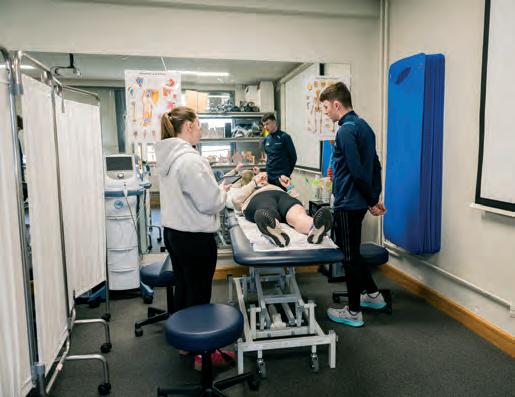
Year 1
• Health Related Physical Activity
• Sports Study Skills 1
• Exercise Prescription and Programme Design
• Clinical Anatomy 1 and 2
• Clinical Skills 1 and 2
• Introduction to Human Physiology
Year 2
• Biomechanics and Movement Analysis
• Sports and Exercise Nutrition
• Injury Diagnostics 1 and 2
• Soft Tissue Manual Therapy
• Sports and Exercise Physiology
• Foundations of Strength and Conditioning
Year 3
• Personal Fitness Instruction
• Therapeutic Modalities 1 and 2
• Rehabilitation
• Student Led Clinic 1 and 2
• Research Methods
• Clinical Rehabilitation
• Psychology of Injury and Rehabilitation
Year 4
• Clinical Work Placement
• Research Project
• Psychology of Injury and Rehabilitation
• Student Led Clinic 3
Professional Accreditation
This programme is currently pending ARTI Accreditation.
The aim of the programme is to deliver engineers who have scientific and practical skills to undertake both prescriptive and performance-based fire safety design. In the first two years, learners gain an understanding of fire, general construction and engineering principles and technology before being immersed in fire safety-specific subjects in Year 3 and Year 4. Theoretical and practical modules provide the graduate fire safety engineer with a skill set unique to this country and in demand internationally.
atu.ie/AU340
310 (Level 8 2024)
4 Years Minimum Entry Requirements PLUS
• O6/H7 Maths
24 Places
Work Placement
Head of Department of Civil Engineering and Construction civilconstructionhod. donegal@atu.ie
Career Opportunities
Graduate careers include working as a fire safety engineer or a fire officer in a wide range of private and public sector contexts. Successful graduates find work in the private sector in fire safety engineering consultancies, with construction contractors or architectural practices. They may also work in the public sector with local authorities in the fire service or with other bodies such as the Health Service Executive, Irish Prison Service or Dublin Airport Authority.
Fire safety engineering is a broad discipline which covers a wide range of areas such as fire prevention, detection, escape, suppression, and control. Major tragedies such as the Grenfell Tower in London, the Stardust and domestic fires in Ireland leading to loss of life and nightclub in Dublin means that fire safety engineering is crucial in building design, construction, maintenance, and occupation.
ATU Donegal has the only educational fire laboratory in the Republic of Ireland.
ATU Donegal is unique in offering fire safety engineering on the CAO.
Year 1
• Fire Technology 1 and 2
• Construction Technology 1 and 2
• Elementary CAD
• Mathematics 1 and 2
• Physics 1 and 2
• Building Services 1
• Technical Writing and Communication
• Land Surveying and GIS
Year 2
• Fire Technology 3
• Advanced Construction Technology
• Mathematics 3 and 4
• Fluid and Thermodynamics 1 and 2
• Structural Design and Materials
• Measurement and Construction Economics
• Fire Science
• Building Services 2
• Site Organisation
Year 3
• Fire Dynamics
• Fire Safety Design
• Fire Service Operations
• Mathematics 5 and 6
• Work Placement with Project
• Fire Protection Systems
• Fire Design Project
Year 4
• Applications of Fire Safety
• Engineering Principles
• Fire Modelling and Reliability Engineering
• Construction Law and Professional Ethics
• Dissertation Proposal
• Structural Fire Engineering
• Dissertation
• Human Behaviour in Fire
• Fire Safety Management
This programme was developed to enable learners to become construction professionals who are at the forefront of technological developments in the construction sector such as Building Information Modelling (BIM), sustainability and surveying techniques. This programme offers learners multi-discipline project-based modules. The subjects cover a wide range of expertise pertinent to the construction industry.
atu.ie/AU342
4 Years
300 (Level 8 2024)
Minimum Entry Requirements PLUS • O6/H7 Maths
24 Places
Work Placement
Head of Department of Civil Engineering and Construction civilconstructionhod. donegal@atu.ie
This programme leads to a qualification in an area where strong employment opportunities have been identified, namely, construction management utilising BIM processes and technology. A shortage of construction professionals within the industry means that graduates have excellent career prospects with building and civil engineering contractors, surveying consultants, property developers or property services consultants. Graduate careers may include working as a construction manager or a contracts manager.
ATU Level 8 qualifications are recognised worldwide for postgraduate entry. It is possible to progress towards Chartered Membership of the Chartered Institute of Building (CIOB) after gaining a minimum of three years of relevant work experience.
The construction industry has in recent years, embraced new forms of design and building requirements to satisfy government contracts and online procurement methods, chartered accountancy requirements and accreditation boards such as the RIAI resulting in continued demand for expertise in the administration and management of contracts.
This programme gives learners the competencies to administer and manage the relevant contracts used in the industry today. Pre and post contract management skills are developed in a financial, legal and ethical context.
ATU Donegal holds Chartered Institute of Building (CIOB) accredited centre status.
This honours degree is accredited by the CIOB and therefore provides a route to full chartered membership (MCIOB).

• Construction Technology 1 and 2
• Architectural Project 1 and 2
• Mathematics 1
• Elementary CAD
• Physics 1
• Technical Writing and Communication
• Building Services 1
• BIM Graphic Communications
• Construction Management Principles
• Land Surveying and GIS
Year 2
• Architectural History and Conservation
• Mechanical and Electrical Scheduling
• Surveying 1
• Structural Design and Materials
• Measurement and Construction Economics
• Advanced Construction Technology
• Integrated BIM Project
• Renewable Energy Resources
• Project Control
• Building Services 2
• Site Organisation
Year 3
• BIM for Virtual Design and Construction VDC
• Financial Management
• Building Energy Management
• Fire Engineering
• Document Control and Public Procurement
• Industry Case Study
• Digital Land Surveying
• Professional Practice
• Work Placement with Project
Year 4
• Construction Management 1
• Statutory Approvals
• Building Energy Performance
• Construction Law and Professional Ethics
• Dissertation Proposal
• Construction Management 2
• Financial Information for Decision Making in Construction
• Dispute Mitigation and Resolution
• Dissertation
The standards and techniques used in modern construction are constantly evolving; architectural drawings are increasingly produced using 3D software; building legislation strives to ensure the protection of the environment and the public are becoming more discerning in their appreciation of architecture. The aim of this programme is to produce graduates with an in-depth knowledge of construction technology who have high level skills and competencies required to work as architectural technologists.
atu.ie/AU343
326 (Level 8 2024)
4 Years Minimum Entry Requirements PLUS
• O6/H7 Maths
24 Places
Work Placement
Head of Department of Civil Engineering and Construction civilconstructionhod. donegal@atu.ie
In this programme, Building Information Modelling (BIM) is used in conjunction with AR and VR (Augmented and Virtual Reality) simulations to support the coordination of architecture, structure and services during the design stage of construction projects.
Digital models offer the ability to visualise, record and document the design of buildings, as well as the opportunity to simulate clash detection and assembly sequencing in virtual space to greatly improve construction efficiencies.
Graduate careers typically include working as an Architectural Technologist or a BIM Manager. Successful graduates find work in architectural practice, local authority, property development, housing associations, engineering, manufacturing or Building Information Modelling (BIM).
ATU Level 8 qualifications are recognised worldwide for postgraduate entry. Progression to Chartered Architectural Technologist (MCIAT) is possible by professional assessment and interview.
For the Active Learning Year (Year 3), students are on a paid work placement. The work placement is structured in that four modules are completed with assignments being submitted online. Using the Active Learning Diary, students log their experience against professional competencies, ensuring that learning objectives are met.
This programme is accredited by the registration (UK) body, the Chartered Institute of Architectural Technologists (CIAT).

Year 1
• Architectural Project 1 and 2
• Construction Technology 1 and 2
• Mathematics 1
• Physics 1
• Technical Writing and Communication
• Building Services 1
• Construction Management Principles
• Land Surveying and GIS
Year 2
• Architectural Project 3 and 4
• Construction Technology 3 and 4
• Structural Design and Materials
• Architectural History and Conservation
• Applied Graphic Communications
• Site Organisation
• Building Services 2
Year 3 (Work
• Active Learning Diary and Professional Competencies
• Research Project
• Management Practice in the Built Environment
• Capstone Project
Year 4
• Architectural Project 5 and 6
• Building Energy Performance
• Statutory Approvals
• Dissertation Proposal
• Specification and Tendering Procedures
• Dissertation
Additional elective modules are available throughout the programme.
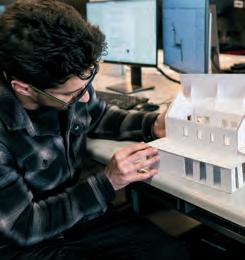
• Architectural Technology
• Construction Management
This is a common entry construction programme, with an award title of BSc in Architectural Technology or BSc in Construction Management. At the end of Year 1, learners choose either the Architectural Technology or Construction Management pathway, having had the opportunity to decide which best suits their interests, skills and ability. There is a year-long work placement on the BSc in Architectural Technology and a 6-week work placement on the BSc in Construction Management.
atu.ie/AU242
235 (Level 7 2024)
3 Years Minimum Entry Requirements PLUS
• O6/H7 Maths
24 Places
Work Placement
Head of Department of Civil Engineering and Construction civilconstructionhod. donegal@atu.ie
The integrated project brings together all the construction/ engineering disciplines into design teams, mimicking real-life situations and experience.
Key employers for architectural technologists are architectural practices, building and civil engineering consultancies, local and public authorities, building contractors and property developers.
Successful graduates may apply to join Year 4 of the Level 8 BSc (Hons) in Construction Management or BSc (Hons) in Architectural Technology depending on which pathway or specialism is selected.
The architectural technologist and construction manager are key professionals in a multidisciplinary design team. Their roles have become increasingly important in the development and delivery of construction solutions using emerging technologies and building techniques, playing their part in the global implementation of Building Information Modelling (BIM).
ATU Donegal holds Chartered Institute of Building (CIOB) accredited centre status. The BSc in Construction (Construction Management) is recognised for academic exemptions towards Chartered Membership of CIOB.
ATU Donegal is an academic partner of Chartered Assocation of Building Engineers (CABE).


Year 1
• Architectural Project 1 and 2
• Construction Technology 1 and 2
• Physics 1
• Mathematics 1
• Technical Writing and Communication
• Building Services 1
• Construction Mgmt. Principles
• Land Surveying and GIS
Architectural Technology
Year 2
• Architectural Project 3 and 4
• Construction Technology 3 and 4
• Structural Design and Materials
• Architectural History and Conservation
• Applied Graphic Communications
• Site Organisation
• Building Services 2
Year 3 (Placement Year)
• Active Learning Diary and Professional Competencies
• Research Project
• Management Practice in the Built Environment
• Capstone Project
Additional elective modules may be available throughout the programme.
Construction Management
Year 2
• Architectural History and Conservation
• Mechanical and Electrical Scheduling
• Surveying 1
• Structural Design and Materials
• Measurement and Construction Economics
• Advanced Const. Technology
• Integrated BIM Project
• Renewable Energy Resources
• Project Control
• Building Services 2
• Site Organisation
Year 3
• BIM for VDC
• Financial Management
• Building Energy Management
• Fire Engineering
• Document Control and Public Procurement
• Digital Land Surveying
• Industry Case Study
• Professional Practice
• Work Placement with Project
AU341 | Level 8 | Bachelor of Science (Honours)
AU240 | Level 7 | Bachelor of Science
The quantity surveying profession is at the forefront of ensuring that property owners receive value for money for the life cycle of construction projects. These programmes are designed for those who wish to work as professional quantity surveyors and contractors economic managers in the construction industry. Developed in collaboration with industry, the qualifications enable graduates to commence the process of becoming a chartered surveyor.
atu.ie/AU341
atu.ie/AU240
3/4 Years
341 (Level 8 2024)
226 (Level 7 2024)
Minimum Entry Requirements PLUS
• O6/H7 Maths
48 Places
Work Placement
Head of Department of Civil Engineering and Construction civilconstructionhod. donegal@atu.ie
For the Active Learning Year in Year 3, students are on a paid work placement. The placement is structured in that four modules are completed with assignments being submitted online. Using the Active Learning Diary, students log their experience against professional competencies, ensuring that learning objectives are met.
Graduate careers include working as a quantity surveyor or construction cost manager. Successful graduates find work in professional quantity surveying (PQS), building contracting, property development, housing associations, local and central government, manufacturing industry or insurance and loss adjusting.
Successful students can exit with a BSc in Quantity Surveying after 3 years or BSc (Hons) in Quantity Surveying after four years of study. ATU Level 8 qualifications are recognised worldwide for postgraduate entry. Professional Membership of the Society of Chartered Surveyors Ireland (SCSI) following one year minimum of further work experience.
ATU Donegal has obtained a partnership with the Society of Chartered Surveyors Ireland (SCSI). The honours degree is accredited by SCSI and also recognised by the worldwide professional body, the Royal Institution of Chartered Surveyors (RICS), by reciprocal agreement. The honours degree is accredited by CIOB for full academic exemption towards Chartered Membership (MCIOB).
Level 7 Accreditation: ATU Donegal holds Chartered Institute of Building (CIOB) Accreditation Centre status. The BSc in Quantity Surveying ordinary degree is recognised for academic exemptions towards Chartered Membership of CIOB.

Year 1
• Technical Writing and Communication
• Quantity Surveying Skills
• Elementary CAD
• Construction Technology 1 and 2
• Mathematics 1
• Measurement and Pre-Contract Cost Planning
• Construction Detailing and BIM
• Building Services 1
• Land Surveying and GIS
Year 2
• Measurement and Estimating 1 and 2
• Tendering and Procurement
• Advanced Construction Technology
• Building Contract Law
• Mechanical and Electrical Scheduling
• Economics
• Building Services 2
• Site Organisation
• Measurement Project
• Active Learning Diary and Professional Competencies
• Research Project
• Management Practice in the Built Environment
• Capstone Project
In addition to the mandatory modules listed, elective modules are available throughout the programme and as an alternative to work placement.
• Measurement and Development Project 1 and 2
• Financial Management
• Construction Law and Professional Ethics
• Dissertation Proposal
• Applied Contract Administration
• Financial Information for Decision Making in Construction
• Dissertation

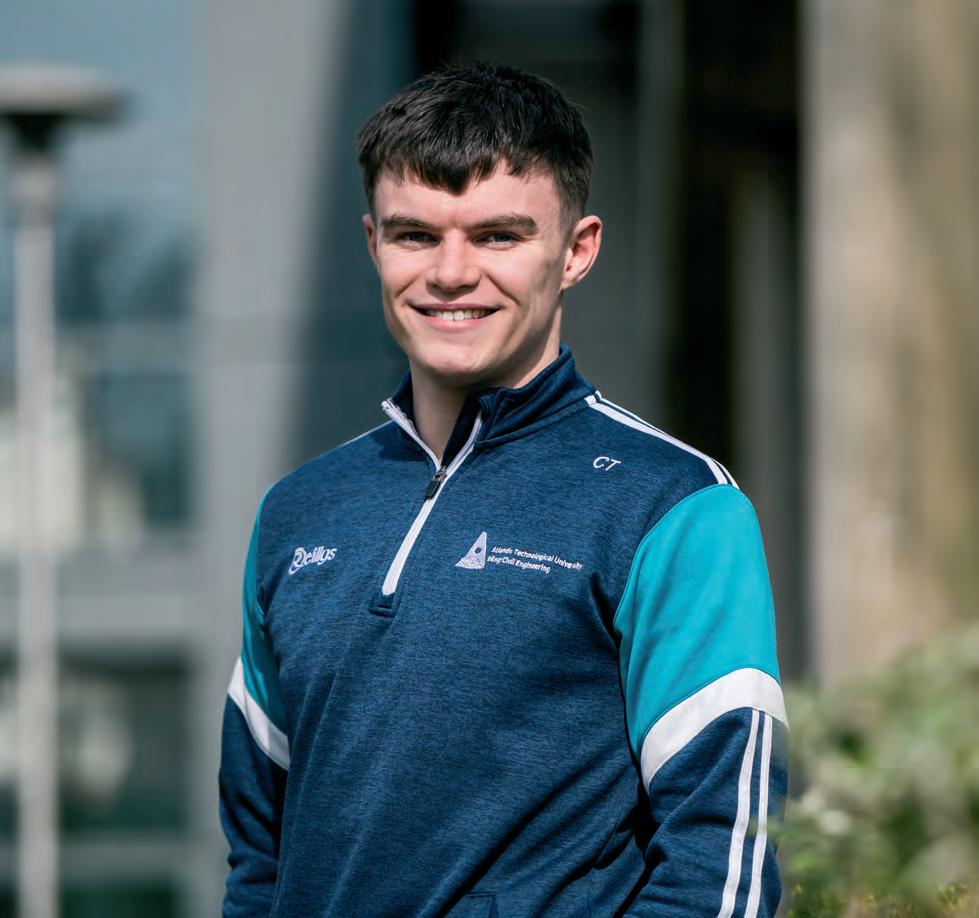
I have always liked working with my hands as well as solving problems so with the help of guidance teachers in secondary school they pointed me in the direction of Civil Engineering. I believe Civil Engineering offers the perfect mix of hands-on practical work and science-based, problem-solving desk work that I really enjoy. The work placements were also fantastic.
In my class, everyone knew everyone, and it allowed for us all to be friends and help each other out if we got stuck at any point along the way. We got to know our lecturers who were approachable. Making these personal connections over the three years really made the experience in ATU very smooth and enjoyable.
Civil engineering is concerned with most of the infrastructure that contributes to modern civilisation, enabling society to function. Civil engineers are involved with the planning, design and construction of facilities for living, work and transportation. This programme is designed to provide a broad based 3-year training in the field of civil engineering from which graduates typically may complete further years of study to obtain a Level 8 BEng (Hons) in Civil Engineering and Level 9 Master of Engineering (MEng).
atu.ie/AU241
280 (Level 7 2024)
3 Years Minimum Entry Requirements PLUS
• O6/H7 Maths
24 Places
Work Placement
Head of Department of Civil Engineering and Construction civilconstructionhod. donegal@atu.ie
Graduate careers typically include working as a civil engineer, land surveyor or site engineer. Successful graduates find themselves working in civil, structural or environmental engineering; in local and central government and in the construction materials and processes industries.
Many graduates of this Level 7 programme progress to Level 8 and Level 9 Civil Engineering programmes at other ATU campuses or universities at home or abroad. Level 8 options include a range of civil engineering and construction management options including the BSc (Hons) in Construction Management at ATU Donegal (Year 4).
Private civil engineering contractors’ roles include site management, design and detailing, project planning and estimating (civil works), consulting civil or structural or environmental engineers design projects and assess environmental impacts. Local and central government provide local services such as clean drinking water systems, safe road construction and new services development. Materials testing laboratories implement quality assurance of all materials used in the various construction processes.
The BEng in Civil Engineering meets the Engineers Ireland education standard for the registration of Associate Engineer.
Year 1
• Structures 1 and 2
• Elementary CAD
• Construction Technology 1 and 2
• Mathematics 1 and 2
• Physics 1 and 2
• Technical Writing and Communication
• Construction Detailing and BIM
• Land Surveying and GIS
Year 2
• Structures 3 and 4
• Civil Engineering Methods
• Surveying 1 and 2
• Mathematics 3 and 4
• Materials Technology
• Fluid Mechanics
• Soil Mechanics 1
• Work Placement Preparation with Integrated Project
• Water and Wastewater Technology
Year 3
• Structures 5 and 6
• Mathematics 5 and 6
• Hydraulics
• Civil Engineering Materials
• Civil Engineering Project 1 and 2
• Civil Engineering Infrastructure
• Soil Mechanics 2
• Work Placement
• Building Engineering and Renewable Energy
• Fire Safety Engineering
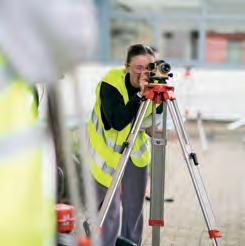
This common entry building engineering programme leads to a Level 7 award in Building Engineering and Renewable Energy or in Fire Safety Engineering. Learners have one elective option in the second semester and may, at the end of the first semester, choose either the Building Engineering and Renewable Energy or Fire Safety Engineering pathway, having had the opportunity to decide which best suits their interests, skills and ability. Building Engineering is an engineering discipline that involves design, construction and maintenance of building. It is also referred to as architectural engineering or building services engineering. With a focus on renewable energy, the discipline also sits in the energy and environmental sector. Fire safety engineering is a broad discipline which covers a wide range of areas such as fire prevention, detection, escape, suppression and control.
atu.ie/AU243
264 (Level 7 2024)
3 Years Minimum Entry Requirements PLUS • O6/H7 Maths
24 Places
Head of Department of Civil Engineering and Construction civilconstructionhod. donegal@atu.ie Work Placement
Graduate careers include working as a building engineer in building services design (consultancy or contracting), energy or renewables or working as a fire safety engineer in a local authority, or in a fire engineering consultancy in both public and private sectors. Graduates may gain employment in a diverse range of engineering and construction sectors including renewable energy and fire safety, throughout Ireland and abroad.
Graduates of this Level 7 programme may progress to the Level 8 BSc (Hons) in Construction Management (Year 4). Graduates of the BEng in Fire Safety Engineering may progress to the BEng (Hons) in Fire Safety Engineering (Year 4).
ATU is the only academic institution in Ireland to offer full-time undergraduate degrees in fire safety engineering and is one of two to offer a degree in building engineering, with graduates of both disciplines being in demand and highly valued in rewarding careers. Professional institutions and employer’s representatives in the industry are highlighting the impeding shortage of construction and engineering professionals within Ireland.
This is a common entry degree with award options in Building Engineering and Renewable Energy or Fire Safety Engineering.
ATU Donegal has the only educational fire laboratory in the Republic of Ireland.
The BEng in Building Engineering and Renewable Energy and BEng in Fire Safety Engineering meets the Engineers Ireland education standard for the registration of Associate Engineer (Sydney Accord).
ATU Donegal is an Academic Partner of Chartered Association of Building Engineers (CABE).

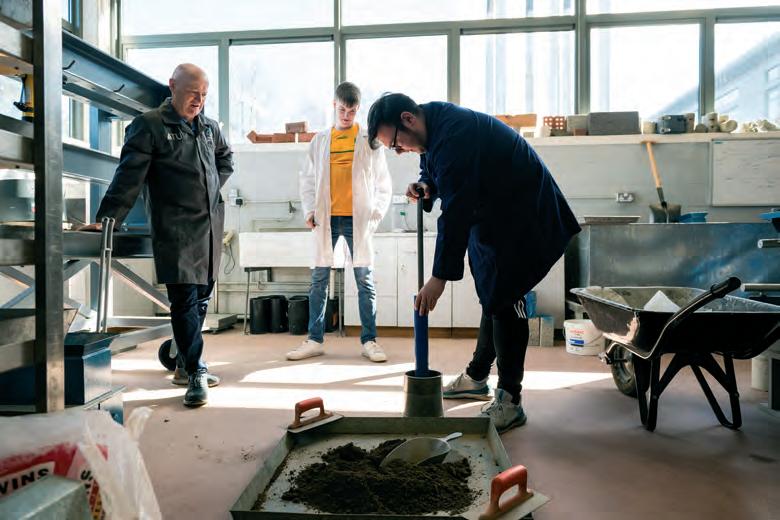
Year 1 (Common Entry)
• Fire Technology 1 and 2
• Construction Technology 1 and 2
• Elementary CAD
• Physics 1 and 2
• Mathematics 1
• Technical Writing and Communication
• Building Services 1
• Building Engineering with Renewable Energy
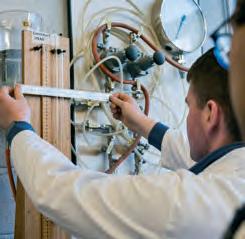
Building Engineering and Renewable Energy
Year 2
• Building Engineering 1 and 2
• Electrical Services 2 and 3
• Mechanical and Electrical Scheduling
• Mathematics 3 and 4
• Fluids and Thermodynamics 1
• Lighting and Acoustics
• Site Organisation
• Design Project
• Renewable Energy Resources
Year 3
• Building Engineering 3 and 4
• Electrical Services 4
• Building Energy Modelling
• Mathematics 5 and 6
• Building Engineering Project
• Control Engineering for Building Services
• Professional Practice
• Work Placement with Project
Fire Safety Engineering
Year 2
• Fire Technology 3
• Advanced Construction Technology
• Mathematics 3 and 4
• Structural Design and Materials
• Fluids and Thermodynamics 1 and 2
• Measurement and Construction Economics
• Fire Science
• Site Organisation
• Building Services 2
Year 3
• Fire Safety Design
• Fire Dynamics
• Fire Service Operations
• Mathematics 5 and 6
• Fire Protection Systems
• Fire Design Project
• Work Placement with Project
This programme is designed to give students experience of a range of modern computing skills. Students will learn cutting-edge programming techniques, data analytics, UX design, web architecture plus many other skills. With an excellent mix of lectures and practicals, students can practice honing core computational and problem-solving skills needed for today’s technology-driven society. There is also an option to spend a semester in Year 3 studying in one of our partner universities in Europe or China.
atu.ie/AU360
308 (Level 8 2024)
4 Years Minimum Entry Requirements PLUS
• O6/H7 Maths
Erasmus+
24 Places Jade Lyons Head of
Department
of Computing jade.lyons@atu.ie
Students can choose to spend the first semester of Year 3 studying in one of our partner universities in Europe or China. A summer work placement is also available to students on this programme.
Successful graduates normally find work in software development houses, banks and insurance companies in addition to all areas of medicine, transport and education. Graduate careers include software developer, software programmer, data analyst/scientist, mobile app developer, database manager, project manager, system designer or network engineer.
ATU Level 8 qualifications are recognised worldwide for postgraduate entry.
Applied computing focuses on realworld implementation of computer science principles.

Year 1
• Computer Architecture and Operating Systems 1 and 2
• Mathematics for Computing 1
• Introduction to Programming
• Personal and Professional Development
• Web Fundamentals
• Database Systems
• Introduction to Object Orientated Programming
• Python Scripting
• Introduction to Cloud and Mobile Technologies
Year 2
• Mathematics for Computing 2
• Network Fundamentals
• Object Orientated Programming 2
• Interaction Design
• Client-Side Scripting
• API Development
• Algorithms and Data Structures
• Database Programming
• Network Services
• Commercial Programming 1
• Client-Side Development
Year 3
• Software Implementation
• Object Orientated Systems Analysis and Design
• Academic and Technical Writing Skills
• Integrated Infrastructure
• Commercial Programming 2
• Server-Side Programming
• Secure Programming
• Project Management
• Data Analytics
• Team Project
• ASP.NET Development
• Web Development Libraries
• Optional Placement
Year 4
• Advanced Algorithms and Data Structures
• DevOps
• Software Engineering
• Research in Computing with Emerging Technologies
• Cross Platform Development
• Web Component Development
• UX Design
• Legal, Ethical and Social Issues in Computing
• Project Development
• Data Science and AI
• Web Framework Development

I always knew I wanted to go to university, but I wasn’t sure what programme to choose. After attending the ATU Donegal open day, I got a feel for the university. The information talk on the Applied Computing programme helped guide my decision.
My favourite module is Client-Side Development which focuses on using JavaScript to create cool and interactive websites! Applying my knowledge in these programming languages (HTML, CSS and more) to the module was great and allowed me to use a sense of creativity and critical thinking. In third year, you have an opportunity to take part in an Erasmus year where you get to study for one semester in a different country which is a really cool opportunity!
This exciting degree combines the world of computing with the rapidly evolving field of artificial intelligence (AI). The programme begins with a solid foundation in programming, databases, computer architecture, and mathematics. As you progress, you’ll explore advanced topics such as data analytics, big data systems, and ethical AI development. You’ll also gain valuable industry experience through a dedicated work placement, and build the professional and communication skills needed to succeed in a tech-driven world.
atu.ie/AU363
4 Years
345 (Level 8 2024)
Minimum Entry Requirements PLUS
• O6/H7 Maths
24 Places
Work Placement
Jade Lyons Head of Department of Computing jade.lyons@atu.ie
This degree equips graduates with in-demand skills in programming, data analytics, machine learning, and AI. Career paths include roles such as software developer, AI engineer, data analyst, and business intelligence specialist. With modules covering areas like computer vision, natural language processing, and big data, graduates are prepared to work across sectors including tech, finance, healthcare, and manufacturing. A dedicated work placement ensures strong industry readiness and practical experience.
ATU Level 8 qualifications are recognised worldwide for postgraduate entry.
This programme offers an optional one-year work placement.

Year 1
• Introduction to Data Science and AI
• Personal and Professional Development
• Introduction to Programming
• Computer Architecture and Operating Systems 1 and 2
• Mathematics for Computing 1
• Database Systems
• Mathematics and Statistics
• Introduction to Object Oriented Programming
Year 2
• Database Programming
• Network Fundamentals
• Object Oriented Analysis and Design
• Object Oriented Programming 2
• Scripting
• Data Warehousing for Business Analytics
• Big Data Architecture
• Algorithms and Data Structures
• Machine Learning
Year 3
• Work Placement
• Data Ethics and Governance
• Project Management
• Reporting and Visualisation
• Academic and Technical Writing Skills
Year 4
• Software Engineering
• Natural Language Processing
• Research in Computing with Emerging Technologies
• Data Analytics
• Legal, Ethical and Social Issues in Computing
• Computer Vision
• Project Development
• Predictive Modelling
Studying Computing and AI opens doors to a wide range of career opportunities, equipping students with in-demand skills in software development, data analytics, and intelligent system design, key areas in today’s rapidly evolving tech landscape.
This programme gives the student a CyberPsychology multidisciplinary qualification across psychology and computing which is applicable to a wide range of organisations and systems. Students who enjoy technology and want to examine and prioritise the human factors in the development of online and digital environments will enjoy this programme. It will be of particular interest to students who wish to develop psychological insights into human interactions with digital technologies and learn how to apply this knowledge in a variety of sectors that deal with the human-computer interface point.
atu.ie/AU362
4 Years
320 (Level 8 2024)
Minimum Entry Requirements PLUS
• O6/H7 Maths
ATU Level 8 qualifications are recognised worldwide for postgraduate entry.
Work Placement
24 Places Jade Lyons Head of Department of Computing jade.lyons@atu.ie
Graduates of this programme will become part of increasingly multiskilled teams that design, deliver and regulate all manner of software and hardware solutions for humans and be able to work effectively in contemporary workflow settings in an effective and ethical manner.
The main employers of graduates from this programme are education, the games industry, software development, artificial intelligence, marketing and cybersecurity.
Graduate careers typically include virtual reality, design of AI systems, online marketing, research, online learning education, cybersecurity, game interaction design and usability testing.
It will be of particular interest to students who wish to develop psychological insights into human interactions with digital technologies and learn how to apply this knowledge in a variety of sectors that deal with the human-computer interface point.
Studying CyberPsychology explores the impact of digital technology on human behavior, offering insights into online interactions and mental health.

Year 1
• Introduction to Psychology 1 and 2
• Preparatory Mathematics
• Personal and Professional Development
• Introduction to Computer Science
• Cyberethics: Individual and Organisational Factors
• Cyberpsychology: Theory and Application
• Human-Computer Interaction
• Introduction to Data Science
Year 2
• Statistics and Experimental Research Methods
• Interaction Design
• Fundamentals of Programming
• The Psychology of Online Leisure
• Digital Addictions, Cyberbullying and Crime
• UX Workshop
• Scripting with Python
• Data Ethics and Governance
Year 3
• Work Placement Year
• Academic and Technical Writing Skills (Online during placement)
• Reporting and Visualisation (Online during placement)
Year 4
• The Psychology of AR, VR and AI
• Mobile and Pervasive Computing
• Research in Computing with Emerging Technologies
• Explainable AI
• Software Engineering
• The CyberLifeSpan
• Consumer Behaviour in a Digital World
• Project Development
• Applied Data Analytics and Visualization
• Digital Health, Education and Employment
This three-year fast-track honours degree is designed for students with a background in computing, such as those who completed the Leaving Certificate Computer Science subject (O4 or H6), a GCE in Computing, or equivalent qualifications like a QQI FET Level 5 award in Computing. It helps learners quickly catch up on the core curriculum and progress to advanced topics. The program covers a broad range of core computing topics, including programming, databases, networking, machine learning, AI, and data science.
atu.ie/AU361
3 Years
327 (Level 8 2024)
Minimum Entry Requirements PLUS
• Computer Science 04/H6 or
• GCE in Computing
• O6/H7 Maths
Graduate careers include working as a programmer, systems designer, storage and security manager, project manager, data analyst, data storage manager, database administrator, IT consultant or IT manager.
ATU Level 8 qualifications are recognised worldwide for postgraduate entry.
Year 1
• Operating Systems
• Object Orientated Programming
• Personal and Professional Development
• Web Fundamentals
• Mathematics for Computing 1 and 2
• IT Infrastructure
• Algorithmic Programming
• Database Technology
• Cloud and Mobile Technologies
• Scripting
Year 2
• Advanced IT Infrastructure
• Academic and Technical Writing Skills
• Software Implementation
• Object Orientated System Analysis and Design
• AI and Machine Learning
• Cybersecurity
• Team Project
• Secure Programming
• Project Management
Work Placement
24 Places Jade
Lyons Head of Department of Computing
jade.lyons@atu.ie
Students may take an optional one-year work placement after Year 2 to receive a BSc (Honours) in Computer Science with Work Placement.
Studying computer science can lead to high-demand careers with excellent job prospects and competitive salaries, as it equips students with skills essential for various industries including technology, finance, healthcare, and more.
• Data Analytics
• Server-Side Scripting
Year 3
• DevOps
• Research in Computing with Emerging Technologies
• Software Engineering
• Computer Vision
• Client-Side Scripting
• Legal, Ethical and Social Issues in Computing
• Project Development
• UX Design
• Predictive Analysis
• Computer Science
This programme has been developed with the help of computer game companies. It covers the key skills, methods and techniques used in the development of computer games. The aim of this programme is to provide tomorrow’s game developers for this growing sector of the Irish economy. The global computer games industry is an area with enormous potential for development. Worldwide, the value of the computer games industry is more than $300 billion.
atu.ie/AU260
Year 1
• Introduction to Programming
• Personal and Professional Development
• Mathematics for Computer Graphics
• Web Fundamentals
• Computer Architecture and Operating Systems 1 and 2
• Introduction to Object Orientated Programming
• Introduction to Computer Games
• Database Systems
Year 2
• Object Orientated Programming 2
• Maths for Computing 2
268 (Level 7 2024)
3 Years Minimum Entry Requirements
24 Places
Jade Lyons Head of Department of Computing jade.lyons@atu.ie
Special Features
An optional award of a Certificate in Industry Studies is available for students who choose to do a summer work placement.
Successful graduates find work in games companies, mobile apps development companies and software houses. Graduate careers typically include working as a games developer, mobile apps developer, computer programmer, game designer, content developer or game engine developer.
Level 7 graduates may apply for Year 4 of the Level 8 programme in Computer Games Development. ATU Level 8 qualifications are recognised worldwide for postgraduate entry.
The computer games industry in Ireland is a relatively young and growing industry, this programme has been developed with that in mind.

• Network Fundamentals
• Introduction to Games Engines
• Games Design Workshop Narrative and Story
• API Development
• Algorithms and Data Structures
• Database Programming
• 2D Game Environments
• Games Design Workshop Board Games
Year 3
• Object Orientated Systems Analysis and Design
• 3D Modelling for Games
• Software Implementation
• 3D Games Environments
• Academic and Technical Writing Skills
• Secure Programming
• Project Management
• Data Analytics
• Team Project
• 3D Maths and Physics for Games
• 3D Texturing and Animation for Games
This programme teaches students the skills, methods and techniques used in cybersecurity and digital forensics with the aim of providing the Irish computer industry with high-quality experts in this rapidly growing field. Cybersecurity is about securing computer systems against all types of unauthorised access. However, no matter how secure a computer system is, it will still have vulnerabilities.
atu.ie/AU262
• Introduction to Programming
• Computer Architecture and Operating Systems 1 and 2
• Mathematics for Computing 1
• Personal and Professional Development
• Web Fundamentals
• Introduction to Object Orientated Programming
• Introduction to Ethical Hacking
• Introduction to Digital Forensics and Evidence
• Database Systems
• Network Fundamentals
• Object Orientated Programming 2
261 (Level 7 2024)
3 Years Minimum Entry Requirements
24 Places
Jade Lyons Head of Department of Computing jade.lyons@atu.ie
An optional award of a Certificate in Industry Studies is available for students who choose to do a summer work placement.
Successful graduates find work in companies running large computer networks, the payment card industry and in financial services companies. Graduate careers typically include working as a secure systems engineer, IT threat analyst, secure applications developer and tester, network engineer, communications specialist, internet support specialist, computer programmer, project manager, cybersecurity applications developer or digital forensics investigator.
Level 7 graduates may apply for Year 4 of the Level 8 programme in Cybersecurity and Digital Forensics. ATU Level 8 qualifications are recognised worldwide for postgraduate entry.
Digital forensics is about detecting intruders, analysing what they have done to a computer system, tracking and identifying the intruder and creating a portfolio of evidence about the intruder’s activities to assist with a successful prosecution.
• Mathematics for Computing 1 and 2
• Advanced Ethical Hacking
• Advanced Digital Forensics 1 and 2
• Algorithms and Data Structures
• Database Programming
• Network Services
• Web App Security
• Scripting (Python)
• Object Orientated Systems Analysis and Design
• Secure Systems Administration
• Automation
• Academic and Technical Writing Skills
• Integrated Infrastructure
• Law of Evidence
• Secure Programming
• Project Management
• Data Analytics
• Team Project
• Secure Network Services
• Mathematics for Cryptography
This programme provides students with the theoretical and practical skills they need to participate fully in the rapidly growing computing industry. This programme also provides a strong core set of competencies in general computing. Ireland is the world’s largest exporter of computer software. This means that there are excellent opportunities for finding well-paid employment after graduation. Additionally, because computers are used in almost every area of modern life, the range of opportunities and types of jobs are endless.
atu.ie/AU261
Year 1
• Computer Architecture and Operating Systems 1 and 2
• Mathematics for Computing 1
• Introduction to Programming
• Personal and Professional Development
• Web Fundamentals
• Database Systems
• Introduction to Object Orientated Programming
• Python Scripting
• Introduction to Cloud and Mobile Technologies
Year 2
206 (Level 7 2024)
3 Years Minimum Entry Requirements
24 Places
Jade Lyons Head of Department of Computing
jade.lyons@atu.ie
An optional award of a Certificate in Industry Studies is available for students who choose to do a summer work placement.
Successful graduates find work in all types and sizes of computing companies, banks, insurance companies, medical IT, eCommerce and web development.
Graduate careers include working as a software developer and tester, data analytics engineer, database designer and developer, mobile apps developer, database developer and web developer.
Level 7 graduates may apply for Year 4 of the Level 8 programme in Computing. ATU Level 8 qualifications are recognised worldwide for postgraduate entry.
Studying computing builds problemsolving skills and opens doors to careers in tech, science, business, and more.
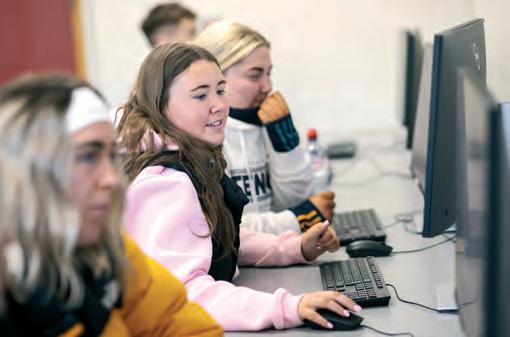
• Object Oriented Programming 2
• Mathematics for Computing 2
• Network Fundamentals
• Automation
• Client-Side Scripting
• Algorithms and Data Structures
• Database Programming
• Network Services
• Data Storage
• Client-Side Development
Year 3
• Object Orientated Systems Analysis and Design
• Integrated Infrastructure
• Software Implementation
• Secure Systems Administration
• Server-Side Programming
• Academic and Technical Writing Skills
• Team Project
• Project Management
• Data Analytics
• Secure Programming
• Secure Network Service
• Web Development Libraries
This programme has been designed to allow graduates to work in an industry embarking on the rapid transition to electrified propulsion, namely electric vehicle. We are delighted to be supported in the roll-out of this course by Jaguar Land Rover and Hyundai who are major players in Ireland in the transition to electric vehicles. The programme covers technology associated a wide range of vehicles, including cars, public transport vehicles, goods vehicles, and specialist industrial vehicles.
atu.ie/AU354
4 Years
Graduates may progress to a Master degree by research.
• Mathematics 1 and 2
• Engineering Science 1 and 2
• Computing for Engineering
• Engineering Problem Based Learning 1 and 2
• Engineering Drawing and CAD
• Programming 1
• Engineering Workshop Technology 1
• Analogue Electronics 1
• Mathematics 3 and 4
• Mechanical Design 1 and 2
• Engineering Materials
• Mechanics 1 and 2
• EV Power Electronics Design
• Automotive Components
• EV Control Systems 1
Minimum Entry Requirements PLUS
• O6/H7 Maths NEW Programme
30 Places
Dr Emmett Kerr
Head of Department of Electronic and Mechanical Engineering
emmett.kerr@atu.ie
Graduates may find work with electric vehicle manufacturers as EV design engineer, EV powertrain engineer, EV systems engineer, fuel cell engineer.
A revolutionary shift in the automotive industry is occurring with manufacturers committed to phasing out fossil fuel-based automotive transport in favour of renewable alternatives. The Irish Government has set a target to have 936,000 of the cars registered in Ireland electrified by 2030. This programme is designed to get us there.
With the fast growth in the advancement of technology in this field, the need for skilled professionals, specifically electric vehicle engineers have increased the number of demands.
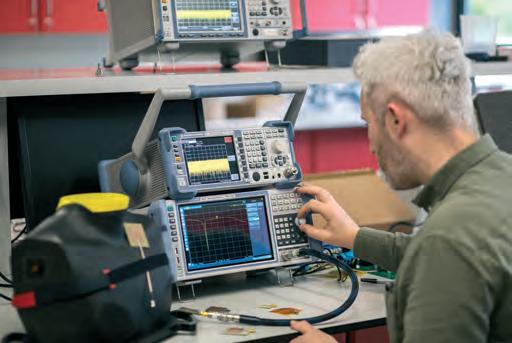
• Electric Vehicle Manufacturing
• Electric Vehicle Low Voltage and High Voltage Systems
• Mathematics 5 and 6
• Mechanics 3
• Mechanical Design 3 and 4
• EV Drive Systems
• Thermodynamics and Battery Technology
• EV Project Design
• EV Control Systems 2
• High Voltage design and Hardware
• EV Project Build
• Engineering Management 1
• Engineering Management 2
• Thermodynamics and Renewable NRG 1
• Engineering Simulation and Data Analysis
• Vehicle Chassis Dynamics
• EV Instrumentation
• EV Development Project 1 and 2
• Data Science and Machine Learning
• Advanced Computer Aided Engineering
• Professional Practice
• EV Platform Integration and Testing
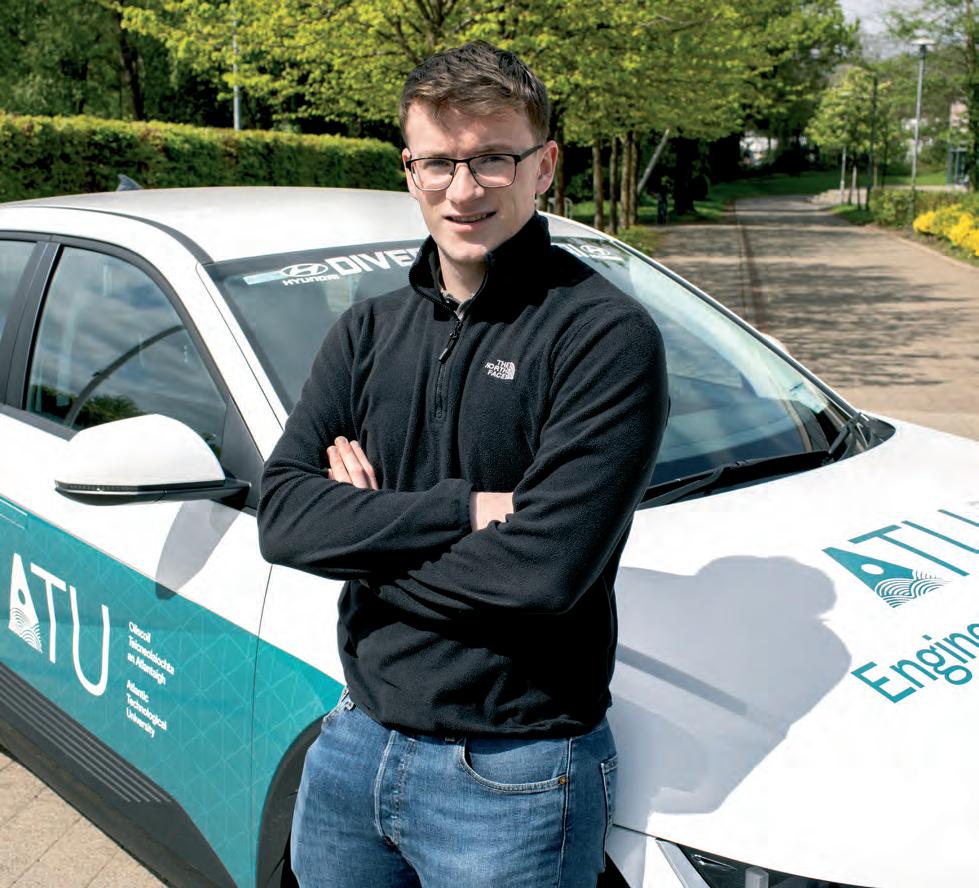
One of the best things about studying engineering at ATU is the state-of-the-art facilities. Between the workshop and the computer design rooms, we have access to using top of the range equipment ranging from computer software such as SolidWorks to new 3D printers and the various machines in the workshop.
I’ve always been passionate about cars. I saw the new Electric Vehicle programme and I knew it was the programme I wanted to study. I got to design, build and test a system to improve the power efficiency of a formula 24+ kit car by incorporating live data that allows the driver to gain insight into the current state of the vehicle, to improve racing performance. Once I graduate, I would like to work within the automotive sector.
Electronic Engineering is a four-year programme that will prepare you for an exciting career working with and developing modern technology. The programme includes an extended work placement which will significantly enhance your career opportunities. You really will be at the forefront of the future. Applications in the field of electronic engineering can range from nanotechnology to large scale systems, impacting areas including mobile and wireless communications, the Internet of Everything, robotics and automation, computing and networking, and even biotechnology and biomedical devices.
atu.ie/AU351
4 Years
342 (Level 8 2024)
Minimum Entry Requirements PLUS • O6/H7 Maths
40 Places
Work Placement
Dr Emmett Kerr Head of Department of Electronic and Mechanical Engineering emmett.kerr@atu.ie
The programme includes an extended work placement.
Electronic engineers are central to almost all aspects of modern life. This degree positions you to take full advantage of this reality.
Successful graduates find work in the medical devices industry, as well as in technical sales and marketing, product design, and roles such as technical sales manager, research engineer, and technical support manager.
Under an articulation agreement with Edinburgh Napier University, graduates of this degree are eligible for entry to the 1-year full-time Master of Science in Engineering programme. The Master of Science in Engineering is accredited by the Institution of Engineering and Technology (IET) as satisfying the educational requirements for Chartered Engineer. Students may also progress to a Master degree by research.
The programme is accredited at associate level by Engineers Ireland.
• Mathematics 1 and 2
• Engineering Science 1 and 2
• Computing for Engineering
• Engineering Drawing & CAD
• Engineering Problem Based Learning 1 and 2
• Programming 1
• Analogue Electronics 1
• Engineering Workshop Technology 1
• Mathematics 3 and 4
• Electrical Technology 1 and 2
• Programming 2
• Communications Fundamentals
• Analogue Circuit Design 1 and 2
• Microcontrollers
• Instrumentation
• Mathematics 5 and 6
• L7 Project 1 and 2
• Embedded Systems 1
• Digital Communications & Transmission
• Automation Technology 1
• Analogue Electronics 2
• Wireless Communications
• Engineering Management 1
• Automation Technology 2
• L8 Project 1
• Embedded Systems 2 and 3
• Communications Technologies for Embedded Systems
• VHDL and Programming
• Engineering Management 2
• Data Science and Machine Learning
• L8 Project 2
• Networking of Embedded Systems
• Professional Practice
AU350 | Level 8 | Bachelor of Engineering (Honours)
AU251 | Level 7 | Bachelor of Engineering
If it moves, mechanical engineers can design and build it. Students who are curious about how energy, materials and mechanics are used to create machines and equipment will enjoy this programme. Think of the innovation and creativity behind the equipment used in space shuttles, biotechnology, robots, Formula One race cars and aircraft gas turbine engines – mechanical engineering is at the forefront of innovation and plays a role in some of the most exciting areas of life. Students who enjoy working in this area are inventive and creative as well as logical and numerate.
atu.ie/AU350
atu.ie/AU251
3/4 Years
360 (Level 8 2024)
257 (Level 7 2024)
Minimum Entry Requirements PLUS
• O6/H7 Maths
40 Places
Work Placement
Dr Emmett Kerr Head of Department of Electronic and Mechanical Engineering emmett.kerr@atu.ie
An optional award of a Certificate in Industry Studies is available for students who choose to do a summer work placement.
The need for mechanical engineers in Ireland and the UK has remained a constant in recent years. Mechanical engineers are very versatile and can be employed in a broad range of roles across many industries giving graduates the opportunity to find the industry and role that fits them best.
Successful graduates find work in the manufacturing, mechanical, and industrial engineering industries. Graduate careers include working as a product and process designer, production or general manager, facilities engineer, maintenance or energy systems engineer, technical support manager, or research engineer. They may also find work in technical sales, marketing and management in related industries.
Successful students can exit with a BEng in Mechanical Engineering after three years or BEng (Honours) in Mechanical Engineering after four years of study. Level 7 graduates may apply for entry into Year 4 of the Level 8 programme in Mechanical Engineering. ATU Level 8 qualifications are recognised worldwide for postgraduate entry.
Mechanical engineers are skilled problem solvers. They analyse complex problems and develop innovative solutions to improve performance and efficiency.
The BEng (Hons) in Mechanical Engineering meets the education standard for registration with Engineers Ireland as an Associate Engineer.
Year 1
• Mathematics 1 and 2
• Engineering Science 1 and 2
• Computing for Engineering
• Engineering Drawing & CAD
• Engineering Problem Based Learning 1 and 2
• Programming 1
• Analogue Electronics 1
• Engineering Workshop Technology
Year 2
• Mathematics 3 and 4
• Mechanics 1 and 2
• Mechanical Design 1 and 2
• Engineering Workshop Technologies 2
• Engineering Materials
• Manufacturing CNC 1 and 2
• Instrumentation
• Thermodynamics
Year 3
• Mathematics 5 and 6
• Mechanics 3 and 4
• Mechanical Design 3 and 4
• Automation Technology 1
• Pneumatics
• L7 Automation Project Design
• Engineering Management 1
• Hydraulics
• L7 Automation Project Build
Year 4 (Level 8)
• Automation Technology 2
• Mechanics 5
• Engineering Simulation & Data Analysis
• Engineering Management 2
• Thermodynamics and Renewable Energy 1 and 2
• L8 Project 1
• Data Science and Machine Learning
• Advanced Computer Aided Engineering
• Professional Practice
• L8 Project 2
Additional elective modules are available throughout the programme.
This is a four-year BSc (Hons) in Health and Social Care. Students develop the skills necessary to assimilate an understanding of the complex and diverse nature of the subject, as well as more general or specialised skills which will be widely transferable. Students will undertake a critical examination of contrasting perspectives which provide insight into the varied experience of health and social care.
atu.ie/AU391
4 Years
308 (Level 8 2024)
Minimum Entry Requirements PLUS
• Garda Vetting
• Mandatory training: as outlined by programme schedules. This is required prior to students going on placement.
• Student Health and Social Care Declaration Work Placement: Students may be required to complete a medical assessment. Students are required to complete a total of 840 hours of practice placement. Placement allocations may be anywhere within the Republic of Ireland.
30 Places
Work Placement
Dr Nigel McKelvey
Head of Department of Early Education and Social Studies
nigel.mckelvey@atu.ie
Practical skills are developed through two 12-week block placements in the second and third years, under the guidance of experienced professionals. Practice placement is where a social care student demonstrates their achievement of the Social Care Standards of Proficiencies (SOP) as set out by CORU. This programme is responsive to changing landscape of social care practice. This program is designed to provide you with the comprehensive knowledge and skills for a rewarding career in social care.
Successful graduates find work in adult services, health awareness and promotion, care of the elderly, childcare, youth work and community development, womans aid and intellectual disability services. Graduate careers typically include working as a residential child carer, respite carer, adult services officer, health promotion officer, carer in a nursing home, or youth work and community development officer.
Graduates may progress to the Master of Science in Advancing Health and Social Care or the Master of Science in Therapeutic Interventions in Alcohol and Other Drugs. ATU Level 8 qualifications are recognised worldwide for postgraduate entry.
This programme is approved by CORU.
• Introduction to Psychology for Social Care
• Professional Communication in Social Care Practice
• Introduction to Sociology for Social Care
• Advocating for Health and Safety in Social Care
• Social Care and Disability
• Preparation for Social Care Practice 1 and 2
• Creative Practice in Social Care
• Law and Ethics in Social Care
• Assessment and Therapuetic Responses to Behaviours of Concern
• Practice Placement and CPD 1
• Positive Ageing in Social Care
• Health Promotion and Self Care
• Professional Practice 1: The Reflective and Ethical Practitioner
• Mental Health Across the Lifespan
• Research Processes and Methods for Social Care
• Social Care Work for Children, Families and Residential Care Services
• Professional Practice 2: Relationships, Conflict and Mediation in Social Care
• Social Policy, Evidence and Social Care Practice
• Climate Change and the Future of Youth and Community Work
• Practice Placement and CPD 2
• Social Care Research: Integrating Theory, Practice and Evidence
• Professional Mentoring, Management and Development in Social Care
• Professional Practice 3: Continuing Professional Development Project
• Advancing Equality, Social Justice and Human Rights in Social Care Practice
• Therapeutic Interventions in Social Care
• Approaches to Addiction: Integrating Theory with Practice in Social Care
• Dissertation
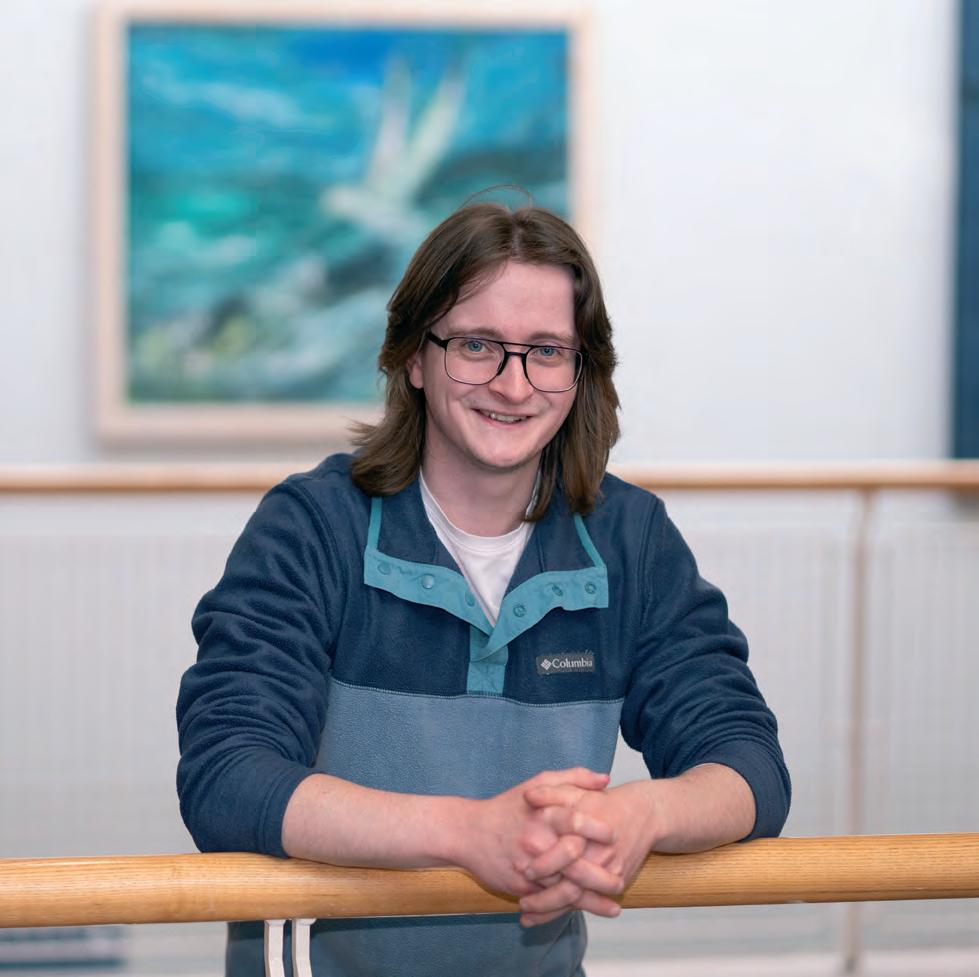
I knew that I wanted to help others, except I didn’t know where to begin. I chose the programme that aligned most with my goals, a degree in ‘Health and Social Care’. This proved to be one of the best choices I have made in my adult life, and it has allowed me to meet and work with people of such strong character. The programme provides you with the opportunity to grow and develop as a professional on two separate work placements.
The programme has CORU approval ensuring graduates meet the Social Care Standards of Proficiencies (SOP) as set out by CORU, allowing them to apply for registration and use the protected title of “Social Care Worker” once registered.
Working in the education sector is an important job which comes with significant responsibilities. Learners on this programme will become part of increasingly multi-skilled teams in the workplace. We will equip graduates to work effectively in contemporary educational contexts and will qualify graduates to work in primary and post-primary settings as Special Needs Assistants (SNAs) with specialisms in Inclusive Practice. This innovative programme is further designed to enable SNAs across primary and postprimary sectors to integrate inclusive practice into their working environments.
atu.ie/AU290
252 (Level 7 2024)
3 Years Minimum Entry Requirements PLUS
• Garda Vetting
• Mandatory training: as outlined by programme schedules. This is required prior to students going on placement.
• Health Declaration
• Practice placement: students may be required to complete a medical assessment
25 Places
Work Placement
Dr Nigel McKelvey Head of Department of Early Education and Social Studies nigel.mckelvey@atu.ie
Graduates find work in childcare, education, and the health services. Graduate careers include working as an SNA in primary or post primary schools, special schools and Autism Spectrum Disorder (ASD) classrooms, as advisors in inclusive practice or as a classroom assistant.
Students can go on to study a oneyear Level 8 add-on BSc (Hons) in Inclusive Practice at ATU Donegal
Competencies in areas such as inclusive practice are becoming increasingly important for schools to maintain a content and productive environment. This programme equips graduates to lead, integrate and promote inclusive practice as part of their SNA duties.
Studying inclusive practice for special needs assistance equips professionals with skills to support diverse learners, fostering inclusive and equitable education environments.
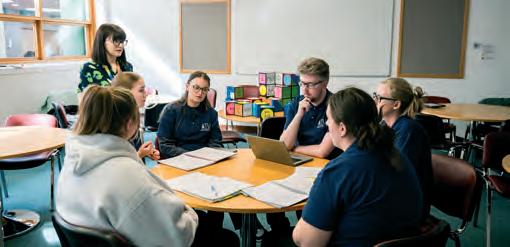
• Human Anatomy and Physiology
• Introduction to Law
• Academic Attainment and IT skills
• The Role of the SNA
• Play, Recreational Activities and the Developing Child
• Child Protection and Safeguarding Vulnerable Adults
• Care Skills: Principles, Ethics and Practices
• Diversity Inclusion and Policy
• Health and Well-Being
• Law, Disability, Special Needs and Children’s Rights
• Autism Advocacy
• Functional Behaviour and Positive Support
• Family Support and Positive Partnerships
• Supporting the Curriculum Across the Lifespan
• Observations and Support Plans
• Practice Placement 1
• Introduction to Health Promotion
• Speech, Language and Communication Needs
• Developmental Psychology in Childhood and Adolescence
• Research Studies
• Reflective Practice
• Disability and Effective Practices
• Technology to Foster Engagement
• Practice Placement 2
Additional elective modules may be available throughout the programme.
AU390 | Level 8 | Bachelor of Science (Honours)
AU190 | Level 6 | Higher Certificate in Science
We learn throughout our lives, it begins the day we are born and the early years are critical to that learning. Young children use all their senses to discover the world and adults involved in their education must do likewise. Working with young children requires patience and energy, commitment and dedication, but most of all it demands creativity and a sense of fun. Young children live in the present and the role of an early years educator is to cultivate appropriate care and developmental environments for those children to grow in body and mind.
atu.ie/AU390
atu.ie/AU190
2/4 Years
300 (Level 8 2024)
170 (Level 6 2024)
Minimum Entry Requirements PLUS
• Garda Vetting
• Mandatory training: as outlined by programme schedules. This is required prior to students going on placement.
• Health Declaration
• Practice placement: students may be required to complete a medical assessment
30 Places
Work Placement
Erasmus+ (Level 8)
Dr Nigel McKelvey Head of Department of Early Education and Social Studies nigel.mckelvey@atu.ie
Placement is an integral part of the programme and students will undertake placement in childcare settings located in Donegal. Students may be required to complete a medical self-assessment declaration form and be subject to a medical assessment/screening and vaccination programme for placements in specific areas.
Successful graduates find work in early education and care, education, and the health services. Graduate careers include working as a specialist advisor, family support and community worker or primary school teacher.
Level 6 graduates may apply for Year 3 of the Level 8 programme in Early Childhood Care, Health and Education. Level 8 graduates may progress to the Masters of Science in Advancing Health and Social Care. ATU Level 8 qualifications are recognised worldwide for postgraduate entry.
The programme is designed to provide students with the knowledge, skills, and competencies needed to support the inclusion of all children in early childhood settings.
Year 1
• Educational Psychology and Inquiry Based Learning
• Introduction to Psychology and Sociology
• Professional Etiquette and Academic Attainment
• Curriculum Approaches
• Introduction to Irish Law
• Child Protection and Safeguarding Vulnerable Persons
• The Early Years Environment
• Understanding Children’s Behaviour
Year 2
• Practice Placement 1
• Child Health and Disability
• Creativity and Process Based Play
• Equality and Diversity in ECEC
• Pedagogical Leadership
Year 3 (Level 8)
• Communication in the Early Years
• Developmental Psychology
• Positive Partnerships and Family Support in ECEC
• Research Methods and Processes for Early Childhood
• Practice Placement 2 or International Study and Placement or Study Abroad
Year 4 (Level 8)
• Comparative Education
• Research for evidence-based practice
• Leadership and Supervision in ECEC
• Practice Placement 3
• Children with Additional Needs
• Outdoor Play and Risk Mastery
• Curricula and Playful Pedagogy in Primary Education
• Mentoring and Professional Development
Additional elective modules may be available throughout the programme.
This programme provides students with a broad knowledge of food science and in particular food and nutrition. Food science and nutrition are at the centre of everyone’s life. What we eat, how our food is made and developed, and how our diets affect our bodies are at the forefront of this programme.
atu.ie/AU370
308 (Level 8 2024)
4 Years Minimum Entry Requirements PLUS
• O6/H7 Maths
28 Places
Work Placement
Dr Kim McFadden
Head of Department of Life and Physical Sciences kim.mcfadden@atu.ie
Students gain a deep understanding of the relationship between diet and disease, how changing consumer lifestyles can impact our health, as well as how the modern food industry operates. Students will learn about food production and processing, and study the nutritional properties, quality and safety of food products, acquiring knowledge of human biochemistry, nutrition and dietary analysis.
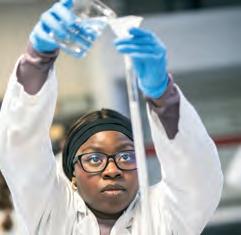
Placement is an integral part of the degree. The aim of the placement is to provide learners with an opportunity to gain skills, experience and competence. Placements can be assigned to anywhere in Ireland. Travel and accommodation are the responsibility of the learner.
Successful graduates find work in the food industry, government agencies and food nutrition sectors. Graduate careers include working as a food product developer, food production supervisor or food quality and safety analyst.
ATU Level 8 qualifications are recognised worldwide for postgraduate entry.
This programme caters to students who aspire to work in food production, quality assurance, nutrition, and product development, emphasising future foods and the impact of food on health in Ireland and around the world.
Year 1
• Introductory Biology
• Chemistry 1 and 2
• Physics 1 and 2
• Mathematical Skills for Science 1 and 2
• Transferable Skills 1
• Laboratory Skills and Safety
• Animal and Plant Biology
• Communications and IT Skills
• Science and Society
Year 2
• Food Technology
• Data Methods for Science
• Biochemistry
• Food Instrumentation
• Human Nutrition
• Food Chemistry
• Anatomy and Physiology
• Fundamentals of Microbiology
• Plant Food Technology
Year 3
• Dairy and Meat Technology
• Food Microbiology
• Dietary Evaluation
• Quality Systems and Auditing
• Work Placement
Year 4
• Food Fermentation
• Food Product Development and Sensory Evaluation
• Food Safety and Security
• Clinical Nutrition and Health Promotion
• Food Processing
• Operation Management and Lean Technologies
• Sports Nutrition
• Advanced Food Chemistry and Analysis
Additional elective modules may be available throughout the programme.
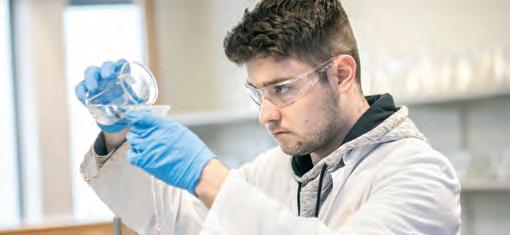
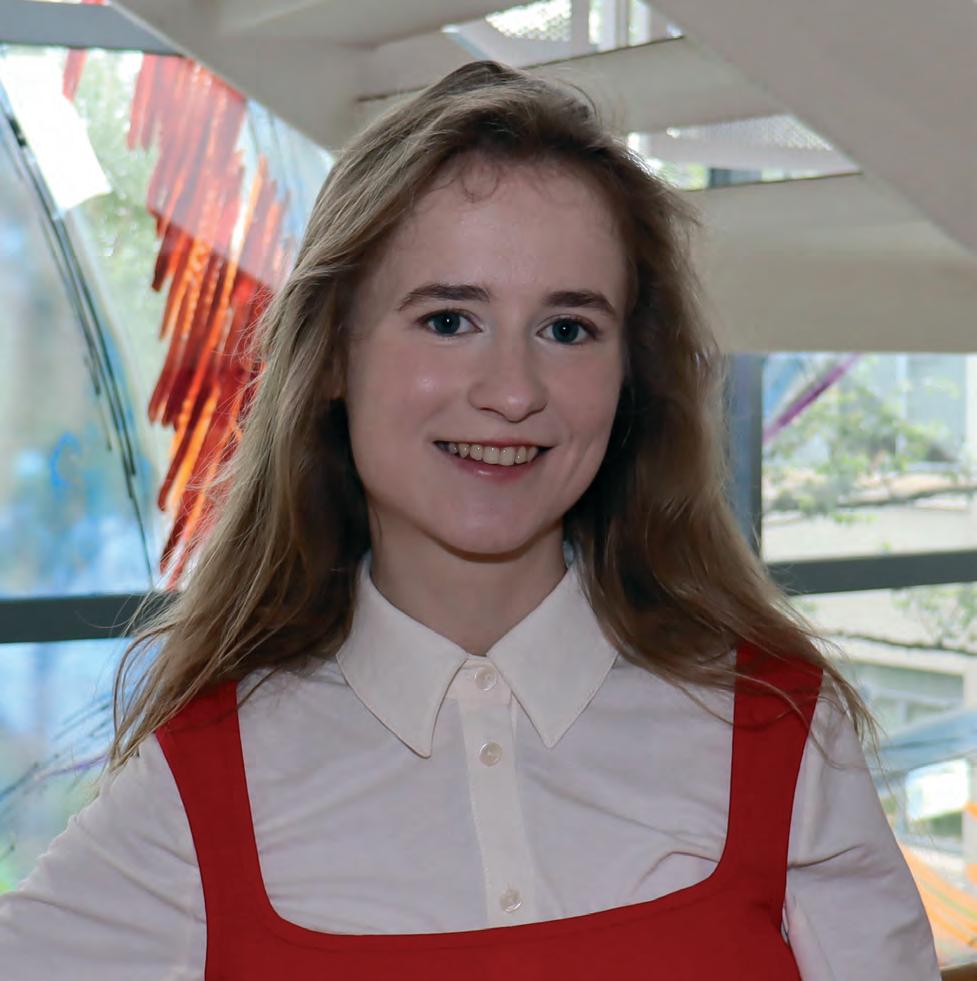
Before ATU, I worked at a local shop. However, it had always been a long-term dream of mine to pursue a scientific education. I was interested in several scientific programmes, so I chose to enrol in the Science Common Entry programme. This gave me more time to explore each degree and make a wellinformed decision to specialise in Food Science and Nutrition.
The possibilities of food sector jobs are endless, from yummy sensory analysis to innovative new product development, research and food safety, just to name a few! There is also a pathway into nutrition and dietetics, which are rapidly developing in-demand fields. After graduating from ATU, my goal is to secure a job in the food science sector, ideally in food safety.
Bioanalytical Science provides a clear knowledge of the underlying concepts behind modern bioanalytical techniques and the application of these techniques in the areas of biotechnology, pharmaceutical, and related industries and in environmental analysis. Students gain technical competence in analytical biochemical, genetic, immunological and microbiologically based analytical methodologies and the skills and knowledge required to work in the biotechnology and pharmaceutical industries as well as in state scientific agencies.
atu.ie/AU372
4 Years
369 (Level 8 2024)
Minimum Entry Requirements PLUS • O6/H7 Maths
32 Places
Dr Kim McFadden
Head of Department of Life and Physical Sciences
kim.mcfadden@atu.ie
Successful graduates find work in the biopharmaceutical, environmental and education sectors. Graduate careers include working as a bioscientist, laboratory technician, quality analyst or secondary school teacher.
Graduates may apply to complete a Professional Master of Education (PME) to become a secondary school teacher of Biology.
A wide range of postgraduate programmes is available to graduates at ATU or other universities worldwide.
On completion of this programme, students have the knowledge and understanding of specific theories, concepts and principles in biopharmaceutical processes, industrial microbiology, molecular biology and analytical science. Students acquire methods for generating, processing, interpreting and presenting information in those areas. They also have the ability to identify, define and resolve complex problems through biopharmaceutical processes.
Bioanalytical Science at ATU provides expertise in analytical techniques, preparing students for careers in pharmaceuticals and biotechnology.
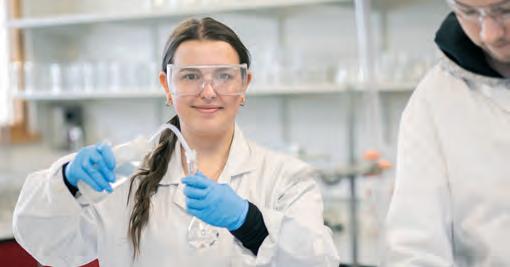
Year 1
• Introductory Biology
• Chemistry 1 and 2
• Physics 1 and 2
• Mathematical Skills for Science 1 and 2
• Transferable Skills 1
• Laboratory Skills and Safety
• Animal and Plant Biology
• Communications and IT Skills
• Science and Society
Year 2
• Data Methods for Science
• Instrumentation 1 and 2
• Biochemistry
• Ecosystems
• Biomolecules and Disease
• Fundamentals of Microbiology
• Anatomy and Physiology
3
• Genetics and Recombinant DNA
• Applied Microbiology and Clean Room Technology
• Research Skills
• Pharmacology
• Applied Immunology
• Environmental Analysis
• Quality and Regulations
• Cell Culture
Year 4
• Analytical Science
• Molecular Biology
• Research Project Design
• Research Project
• Biopharmaceutical Processes
• Medicinal Protein Chemistry
• Operational Management and Lean Techniques
Additional elective modules may be available throughout the programme.
This programme covers the full range of core subjects in science and in particular pharmaceutical science and medical devices. Pharmaceutical scientists have key analytical skills which can be applied in many industrial, research and government laboratories. This programme is intrinsically multidisciplinary in nature and emphasises the importance of analytical and medicinal sciences to the modern pharmaceutical, and medicinal product sectors as well as related chemical industries.
atu.ie/AU373
346 (Level 8 2024)
4 Years Minimum Entry Requirements PLUS
• O6/H7 Maths
32 Places
Dr Kim McFadden Head of Department of Life and Physical Sciences kim.mcfadden@atu.ie
Students spend extensive time in a range of well-equipped laboratories during this programme.
Successful graduates find work in the pharmaceutical and medical device sector and government agencies. Graduate careers include working as an analytical scientist, R&D scientist, quality specialist or secondary school teacher.
ATU Level 8 qualifications are recognised worldwide for postgraduate entry.
Studying pharmaceutical and medicinal science equips students with expertise in drug development, formulation, and the therapeutic effects of medicines.
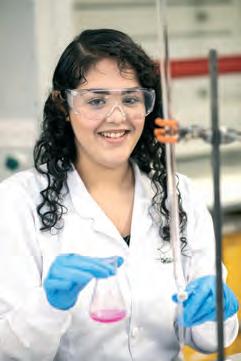
Year 1
• Introductory Biology
• Chemistry 1 and 2
• Physics 1 and 2
• Mathematical Skills for Science 1 and 2
• Transferable Skills 1
• Laboratory Skills and Safety
• Animal and Plant Biology
• Communications and IT Skills
• Science and Society
Year 2
• Biochemistry
• Organic Chemistry
• Instrumentation 1 and 2
• Data Methods for Science
• Physical Chemistry
• Inorganic Chemistry
• Medicinal Drug Discovery
Year 3
• Pharmaceutical Chemistry
• Pharmaceutical Microbiology
• Cleanroom Technology
• Research Skills
• Pharmacology
• Medicinal Drug Analysis
• Environmental Science
• Pharmaceutical Processes and Medical Devices
• Quality and Regulations
Year 4
• Analytical Science
• Research Project Design
• Toxicology
• Medicinal Chemistry
• Research Project
• Medicinal Protein Chemistry
• Pharmaceutical Processes
• Operation Management and Lean Techniques
Additional elective modules may be available throughout the programme.
• Bioanalytical Science
• Food Science and Nutrition
• Pharmaceutical and Medicinal Science
This BSc in Science Level 7 programme in Bioanalytical Science or Food Science and Nutrition or Pharmaceutical and Medicinal Science is a broad introduction to this exciting field of science. This programme gives students the opportunity to discover which area of science - Bioanalytical Science, Food Science and Nutrition or Pharmaceutical and Medicinal Science - is right for them.
atu.ie/AU270
• Introductory Biology
• Chemistry 1 and 2
• Physics 1 and 2
• Mathematical Skills for Science 1 and 2
• Transferable Skills 1
• Laboratory Skills and Safety
• Animal and Plant Biology
• Communications and IT Skills
• Science and Society
225 (Level 7 2024)
3 Years Minimum Entry Requirements
32 Places
Work Placement
Dr Kim McFadden Head of Department of Life and Physical Sciences kim.mcfadden@atu.ie
Students who chose the Food Science and Nutrition degree award option can take a work placement in Year 3.
Choosing Science (Common Entry) opens pathways to specialise in bioanalytical science, food science and nutrition, or pharmaceutical and medicinal science, offering diverse career opportunities.
Bioanalytical graduate careers include working as a bioscientist, laboratory technician, quality analyst or secondary school teacher.
Food Science and Nutrition graduate careers include working as a food product developer, food production supervisor or food quality and safety analyst.
Pharmaceutical and Medicinal Science graduate careers include working as an analytical scientist, research and development scientist, quality specialist or secondary school teacher.
Graduates may apply internally to progress to Year 4 of their chosen Level 8 programme in either Food Science and Nutrition, Pharmaceutical and Medicinal Science or Bioanalytical Science. ATU Level 8 qualifications are recognised worldwide for postgraduate entry.
At the end of the first year, students will choose which degree award option to take thus furthering their study and opening up numerous career opportunities including becoming a biology teacher, quality manager or biopharmaceutical scientist.
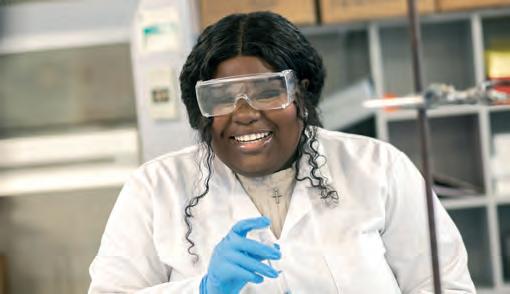
Food Science and Nutrition
Year 2
• Food Technology
• Data Methods for Science
• Biochemistry
• Food Instrumentation
• Human Nutrition
• Food Chemistry
• Anatomy and Physiology
• Fundamentals of Microbiology
• Plant Food Technology
Year 3
• Dairy and Meat Technology
• Food Microbiology
• Dietary Evaluation
• Quality Systems and Auditing
• Work Placement
In addition to the mandatory modules listed, elective modules may be available throughout the programme.
Year 2
• Data Methods for Science
• Instrumentation 1 and 2
• Biochemistry
• Ecosystems
• Biomolecules and Disease
• Fundamentals of Microbiology
• Anatomy and Physiology
Year 3
• Genetics and Recombinant DNA
• Applied Microbiology and Clean Room Technology
• Research Skills
• Pharmacology
• Applied Immunology
• Environmental Science
• Quality and Regulations
• Cell Culture
In addition to the mandatory modules listed, elective modules may be available throughout the programme.
Pharmaceutical and Medicinal Science
Year 2
• Biochemistry
• Organic Chemistry
• Instrumentation 1 and 2
• Data Methods for Science
• Physical Chemistry
• Inorganic Chemistry
• Medicinal Drug Discovery
Year 3
• Pharmaceutical Chemistry
• Pharmaceutical Microbiology and Cleanroom Technology
• Research Skills
• Pharmacology
• Medicinal Drug Analysis
• Environmental Science
• Pharmaceutical Processes and Medical Devices
• Quality and Regulations
Additional elective modules may be available throughout the programme.
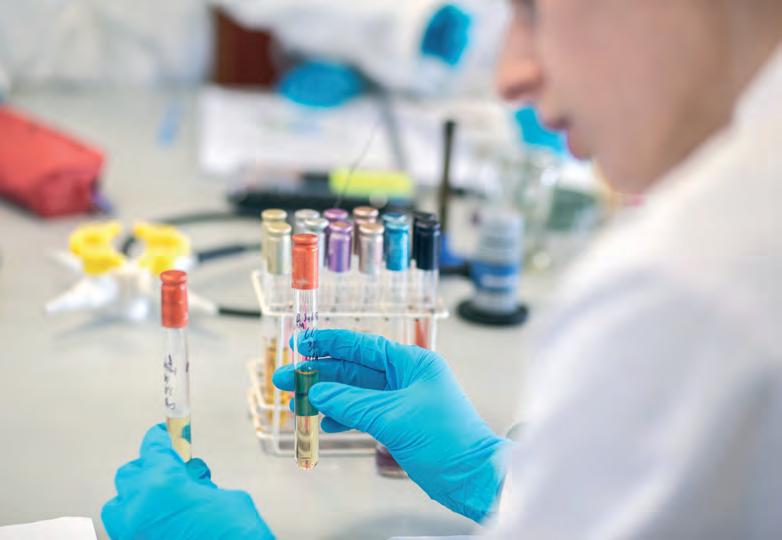
• Animal and Crop Science
• Environmental Management
This programme prepares students for a career in the Agriculture and AgriBusiness sectors by providing graduates with key skills in Animal Husbandry, Animal Science, Soil and Plant Science, Environmental Science and Agriculture Business Management and Marketing. This programme incorporates a substantial work placement in Semester 2 of Year 2 where the students will gain valuable workplace experience. Year 3 expands and builds upon the knowledge obtained in Year 1 and 2. Year 4 allows students to focus on one of two disciplines; Animal and Crop Science or Environmental Management.
atu.ie/AU371
Year 1
• Introduction to Agriculture
• Animal Husbandry, Nutrition and Welfare
• Communications and IT Skills
• Fundamentals of Biology and Chemistry
• Mathematics Skills for Science 1
• Ruminant Husbandry
• Agricultural Business Management
• • Soil and Plant Science
• Alternative Farm Enterprise
Year 2
• Agriculture and Environmental Impact
• Grassland and Crop Production
• Work Placement and Farm Health and Safety
• Beef and Dairy Production Systems
• Work Placement
316 (Level 8 2024)
4 Years Minimum Entry Requirements
32 Places
Work Placement
Erasmus+
Dr Kim McFadden Head of Department of Life and Physical Sciences kim.mcfadden@atu.ie
On completion of the programme, graduates will have attained key skills and competencies to allow them to meet the needs of a dynamic agricultural sector.
Work Placement
Placements can be assigned to anywhere in Ireland. Travel and accommodation are the responsibility of the learner.
Successful graduates find work in agri-food, government agencies, and education. Graduate careers include working as an agricultural advisor, farm manager, R&D scientist, environment manager or secondary school teacher.
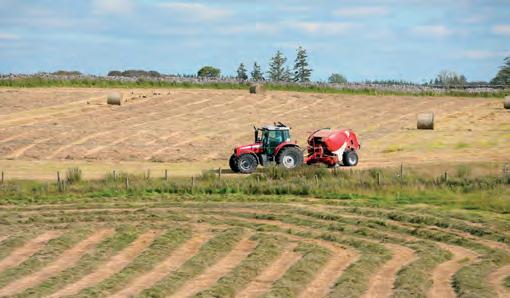
Graduates may apply to complete a Professional Master of Education (PME) to become a secondary school teacher of Agricultural Science.
ATU Level 8 qualifications are recognised worldwide for postgraduate entry.
This programme fulfils the requirements for stamp duty exemption or land transfer for young farmers (Green Cert).
Students have a common three years before focusing on one of two disciplines in their final year; Animal and Crop Science or Environmental Management.
Year 3
• Animal Science
• Ecology and Ecosystems
• Agricultural Marketing and Accounts
• Advanced Soil Science
• Sheep, Pigs and Poultry Production
• Research Skills
• Agricultural and Food Technology
• Farm Waste and Environmental Science
• Advanced Crop Production
• Literature Project
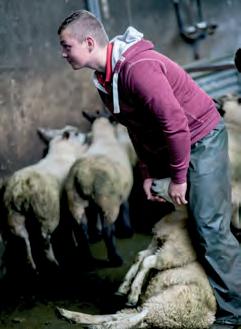
Year 4
• Agricultural Business and Economics
• Animal Welfare
• Crop Science and Mechanisation
• Research Project Design
• Sustainable Agriculture
• Animal Health, Reproduction and Genetics
• Research Project
Environmental Management
Year 4
• Agricultural Business and Economics
• Environmental Science
• Organic Farming
• Research Project Design
• Sustainable Agriculture
• Climate Change and Agriculture
• Research Project
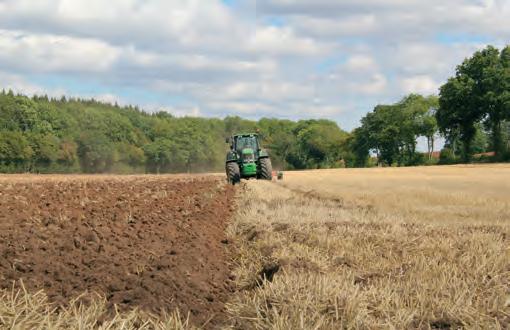
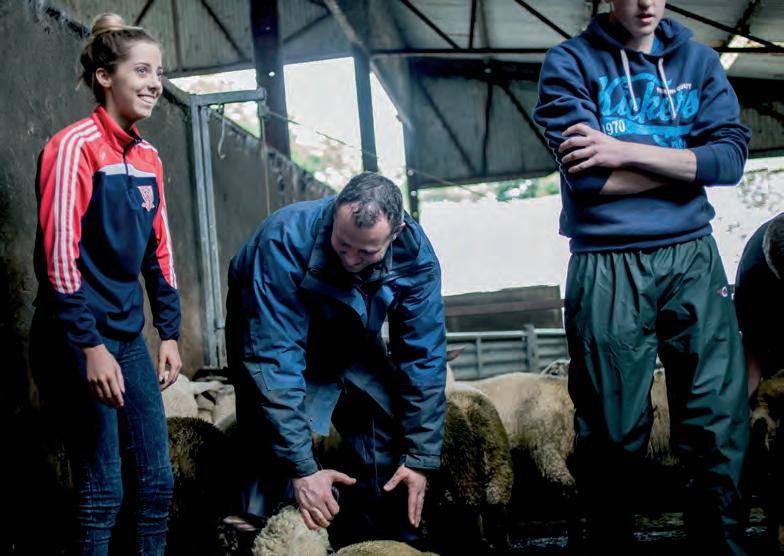
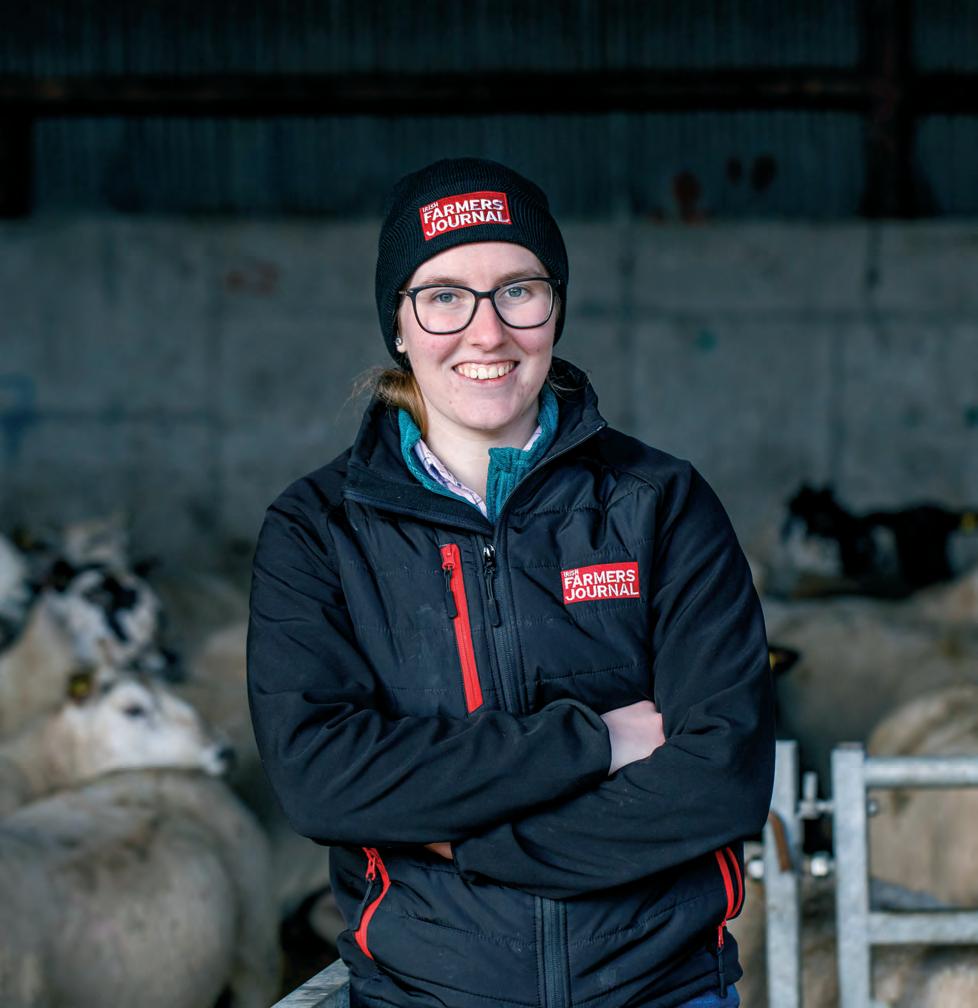
Growing up on a mixed farm, I always had a keen interest in animals, especially sheep. I really enjoyed the work placement element of the programme, learning so much from the people I worked with. It helped me quickly realise what I wanted to do. I learnt that I liked being out and about, travelling to marts and sales, rather than being indoors all day.
I enjoyed the final year thesis the most in the programme. I chose a topic I was passionate about, and the flexibility around it worked great during lambing season. It completely changed my goals. I had planned to return home to farm full-time, but it sparked a real interest in writing and research, which led me to my current role with the Farmers Journal.
Agriculture is a key contributor to the Irish economy and is currently experiencing a period of growth and expansion. This programme offers graduates a combination of skills and knowledge of key areas in agriculture such as soil and plant science, ruminant husbandry and agriculture business management. This is combined with a substantial work placement in Semester 2 of Year 2 where students will gain valuable work experience. Year 3 expands and builds upon the knowledge obtained in Year 1 and 2, with the study of modules such as farm waste and environmental science, livestock production and animal science.
atu.ie/AU272
3 Years
251 (Level 7 2024)
Minimum Entry Requirements
32 Places
Work Placement
Erasmus+
Dr Kim McFadden Head of Department of Life and Physical Sciences kim.mcfadden@atu.ie
Students who do not wish to progress to Year 3 of this programme can exit following successful completion of two years and achieve a Higher Certificate in Science in Agriculture.
Work Placement
Placements can be assigned to anywhere in Ireland. Travel and accommodation are the responsibility of the learner.
Successful graduates find work in agriculture, agri-food and government agencies. Graduate careers include working as a farm manager, agricultural research assistant or agricultural sales manager.
Level 7 graduates may apply internally to join Year 4 of the Level 8 BSc (Hons) in Agriculture with degree award options in Animal and Crop Sciences or Environmental Management. ATU Level 8 qualifications are recognised worldwide for postgraduate entry.
This programme fulfils the requirements for stamp duty exemption or land transfer for young farmers (Green Cert).
Year 1
• Introduction to Agriculture
• Animal Husbandry, Nutrition and Welfare
• Communications and IT Skills
• Fundamentals of Biology and Chemistry
• Mathematical Skills for Science 1
• Ruminant Husbandry
• Agricultural Business Management
• Soil and Plant Science
• Alternative Farm Enterprise
• Agricultural Microbiology
Year 2
• Agriculture and Environmental Impact
• Grassland and Crop Production
• Work Placement and Farm Health and Safety
• Beef and Dairy Production Systems
• Work Placement
Year 3
• Animal Science
• Agricultural Marketing and Accounts
• Advanced Soil Science
• Sheep, Pigs and Poultry Production
• Research Skills
• Agricultural Food Technology
• Farm Waste and Environmental Science
• Advanced Crop Production
• Literature Project
Additional elective modules may be available throughout the programme.
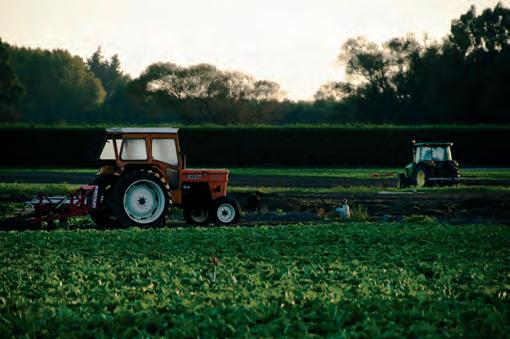
This programme is designed for people who are eager to care for animals. Graduates will work closely with the veterinary surgeon to help diagnose and treat medical and surgical cases. In addition to learning different aspects of science, clinical and surgical nursing, animal husbandry, ethics and laboratory management, students will also learn about veterinary practice management and communication skills.
atu.ie/AU271
3 Years
380* (Level 7 2024)
*Not all applicants who achieved these points received a place
Minimum Entry Requirements PLUS
• O6/H7 in either Phy, Chm, Pch, Bgy or Ags
• O6/H7 Maths
32 Places
Work Placement
Erasmus+
Dr Kim McFadden
Head of Department of Life and Physical Sciences
kim.mcfadden@atu.ie
The strong skills and knowledge students receive from this practical programme will leave them well placed for an enjoyable and challenging career. This programme involves a placement element consisting of a six-week placement in each semester in a veterinary setting.
Work Placement
Placements can be assigned to anywhere in Ireland. Travel and accommodation are the responsibility of the learner.
Graduate careers include working as a registered veterinary nurse, animal behaviourist or veterinary pharmaceutical sales specialist.
Level 7 graduates may apply internally for Year 4 of the Level 8 programme in Veterinary Nursing at ATU Donegal. ATU Level 8 qualifications are recognised worldwide for postgraduate entry.
ATU is one of four institutions to offer Veterinary Nursing degree in Ireland.
Accredited by the Veterinary Council of Ireland and Acovene.
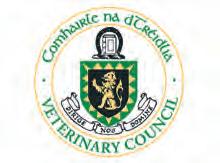
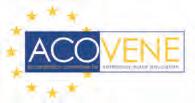
• Introduction to Nursing
• Communications and Research Skills
• Animal Husbandry, Nutrition and Welfare
• Work Placement 1 and 2
• Biological and Bioveterinary Sciences
• Surgical Nursing and Theatre Practice
• Veterinary Nursing 1
• Exotic and Wildlife Nursing
• Professional, Regulatory and Ethical Studies
• Veterinary Nursing 2 and 3
• Work Placement 3 and 4
• Veterinary Practice Management
• Animal Behaviour and Behavioural Therapy
• Emergency and Critical Care Nursing
• Veterinary Nursing 4 and 5
• Work Placement 5 and 6
• Pharmacy and Stock Management
• Professional Practice Skills
Additional elective modules are available throughout the programme.
Health Science with Dietetic Studies is the study of the human body with a particular focus on anatomy and physiology and provides a foundation for human nutrition and dietetics studies. Through a unique progression opportunity, this programme allows students to progress to complete a BSc (Hons) in Dietetics and Nutrition at Coventry University.
atu.ie/AU172
320 (Level 6 2024)
2 Years Minimum Entry Requirements PLUS
• Min H5 in Biology
• Garda Vetting
• Health Declaration
• Coventry University Registration
16 Places
Work Placement
Dr Kim McFadden Head of Department of Life and Physical Sciences kim.mcfadden@atu.ie
This programme incorporates year one of the three-year BSc (Hons) in Dietetics and Nutrition at Coventry University (CU). Following successful completion of the twoyear programme in ATU Donegal, students can progress directly to year two of the three-year BSc (Hons) in Dietetics and Nutrition in CU. Upon successful completion of years two and three in Coventry University, graduating students will be awarded a BSc (Hons) in Dietetics and Nutrition and be eligible to register with the Health and Care Professionals Council (HCPC) in the UK.
Subject to Coventry University’s rules and regulations, Coventry University may, in its absolute discretion, register a student as a student of Coventry University for the duration of Stage II (Year 2 and Year 3 in CU) on receipt of: any documents of which Coventry University requires the student to complete to effect the registration, as notified to and/ or requested from the prospective student by Coventry University. Coventry University fees shall be subject to annual review and may be changed at the sole discretion of Coventry University without notice.
Placement is an integral part of the programme. The aim of the placement is to provide learners with an opportunity to gain skills, experience and competence. Placements can be assigned to anywhere in Ireland. Travel and accomodation are the responsibilty of the learner.
Most learners pursue further studies at Coventry University from this programme. Graduate careers from the Level 6 award include working as a health care assistant, working in the nutrition industry or in the retail sector.
Graduates may progress to Year 2 of the BSc (Hons) in Dietetics and Nutrition in Coventry University.
Year 1
• Human Biology
• People Centred Communication Skills
• Introduction to Dietetics
• Introduction to Anatomy and Physiology
• Introduction to Human Health and Disease
• Psychological Well-Being and Health Promotion
• Civic and Social Engagement
• Human Nutrition and Metabolism
• Foundations of Evidence Informed Practice
• Food and Food Production
• Nutrition Physiology and Eating
• Health and Well-Being in the Community
• Foundations in Dietetics Practice (Including Placement)
Additional elective modules may be available throughout the programme.
Graduates of Health Science with Dietetics Studies in ATU Donegal are not qualified as Dieticians and are not eligible to register with CORU.
Health Science with Occupational Therapy Studies is the study of the human body with a particular focus on anatomy and physiology and provides a foundation to occupational therapy studies. Through a unique progression opportunity, this two-year programme allows students to progress to complete a BSc (Hons) in Occupational Therapy at Coventry University and to register with the Health and Care Professionals Council (HCPC) in the UK.
atu.ie/AU171
437 (Level 6 2024)
2 Years Minimum Entry Requirements PLUS
• Min H5 in Biology
• Garda Vetting
• Health Declaration
• Coventry University Registration
16 Places
Work Placement
Dr Kim McFadden Head of Department of Life and Physical Sciences kim.mcfadden@atu.ie
This programme incorporates year one of the three-year BSc (Hons) in Occupational Therapy at Coventry University (CU). Following successful completion of the twoyear programme in ATU Donegal, students can progress directly to year two of the three-year BSc (Hons) in Occupational Therapy in CU. Upon successful completion of years two and three in Coventry University, graduating students will be awarded a BSc (Hons) in Occupational Therapy.
Subject to Coventry University’s rules and regulations, Coventry University may, in its absolute discretion, register a student as a student of Coventry University for the duration of Stage II (Year 2 and Year 3 in CU) on receipt of: any documents of which Coventry University requires the student to complete to effect the registration, as notified to and/ or requested from the prospective student by Coventry University. Coventry University fees shall be subject to annual review and may be changed at the sole discretion of Coventry University without notice.
Most students pursue further studies at Coventry University from this programme. Graduate careers from the Level 6 award include working as a health care assistant and occupational therapy assistant.
Graduates may progress to Year 2 of the BSc (Hons) in Occupational Therapy in Coventry University.
• Human Biology
• People Centred Communication Skills
• Introduction to Occupational Therapy
• Introduction to Anatomy and Physiology
• Introduction to Human Health and Disease
• Psychological Well-Being and Health Promotion
• Civic and Social Engagement
• The Human, Mind and Occupation 1
• Occupational Therapists: Doing, Being, Becoming and Belonging
• Foundations of Evidence Informed Practice
• The Human, Mind and Occupation 2
• Health and Well-Being in the Community
• Delivering Theory Based Occupational Therapy
• Placement Preparation
• Practice Placement
Additional elective modules may be available throughout the programme.
Graduates of the Level 6 Health Science with Occupational Studies in ATU Donegal are not qualified as Occupational Therapists and are not eligible to register with CORU.
This is a two-year Higher Certificate in Science (Health Science with Physiotherapy Studies) programme. Health Science with Physiotherapy Studies is the study of the human body with a particular focus on anatomy and physiology and provides a foundation to physiotherapy studies. Through a unique progression opportunity, this programme allows students to progress to complete a BSc (Hons) in Physiotherapy at Coventry University and register with the Health and Care Professionals Council (HCPC) in the UK.
atu.ie/AU170
2 Years
467 (Level 7 2024)
Not all applicants who achieved these points received a place
Minimum Entry Requirements PLUS
• Min H5 in Biology
• Garda Vetting
• Health Declaration
• Coventry University Registration
16 Places
Dr
Kim
McFadden
Head of Department of Life and Physical Sciences
kim.mcfadden@atu.ie
This programme incorporates year one of the three-year BSc (Hons) in Physiotherapy at Coventry University (CU). Following successful completion of the twoyear programme in ATU Donegal, students can progress directly to year two of the three-year BSc (Hons) in Physiotherapy in CU. Upon successful completion of years two and three in Coventry University, and graduation subject to academic regulations, students will be awarded a BSc (Hons) in Physiotherapy
Subject to Coventry University’s rules and regulations, Coventry University may, in its absolute discretion, register a student as a student of Coventry University for the duration of Stage II (Year 2 and Year 3 in CU) on receipt of: any documents of which Coventry University requires the student to complete to effect the registration, as notified to and/ or requested from the prospective student by Coventry University. Coventry University fees shall be subject to annual review and may be changed at the sole discretion of Coventry University without notice.
Most students pursue further studies at Coventry University from this programme. Graduate careers from the Level 6 award include working with the Health Service Executive (HSE) or in physiotherapy practices.
Graduates may progress to Year 2 of the BSc (Hons) in Physiotherapy in Coventry University.
Year 1
• Human Biology
• People Centred Communications Skills
• Introduction to Physiotherapy
• Introduction to Anatomy and Physiology
• Introduction to Human Health and Disease
• Psychological Well-Being and Health Promotion
• Civic and Social Engagement
Year 2
• Pathophysiology
• Research and Study Skills
• Anatomy of the Upper Quadrant
• Introduction to Physiotherapy Assessment
• Health and Well-Being in the Community
• Physiotherapy Intervention and Management
• Movement Analysis, Physical Activity and Exercise
• Anatomy of the Lower Quadrant
Additional elective modules may be available throughout the programme.
Graduates of the HC in Health Science with Physiotherapy Studies in ATU Donegal are not qualified as Physiotherapists and are not eligible to register with CORU.
The overarching philosophy of the programme is the development of a graduate who is well rounded, autonomous practitioner with the knowledge required to underpin the current demands of the profession. They will be confident, reflective practitioners capable of managing change, supporting their profession and patients and developing professionally as their role evolves in the ever-changing Irish and global healthcare landscape.
atu.ie/AU374
NEW Programme
4 Years Minimum Entry Requirements PLUS
• H5 in Biology
• Health Declaration
• Garda Vetting
• Mandatory Training
• Practice Placement
30 Places
Work Placement
Dr Kim McFadden Head of Department of Life and Physical Sciences kim.mcfadden@atu.ie
Work Placement
Placement is an integral part of the programme. 5 x 6 weeks placement in hospital, community and private practice. The aim of the placement is to provide students with an opportunity to gain skills, experience and competence. Placements can be assigned to anywhere in Ireland. Travel and accommodation are the responsibility of the learner.
A career as a physiotherapist in hospital, community and private practice.
ATU Level 8 qualifications are recognised worldwide for postgraduate entry.
Physiotherapists play a key role in preventing injury, managing chronic conditions, and promoting overall health, helping people of all ages move better and live healthier lives.
You will study everything from biophysics to brain function and even digital health, making you a future-ready physiotherapist equipped for both clinical care and tech innovation.
• Professional Practice 1: Introduction to the Physiotherapy profession
• Introduction to Human Physiology
• Anatomy of the Upper Quadrant
• Chemistry for Physiotherapy
• Anatomy of the Lower Quadrant
• Pathophysiology
• Biophysics and Biomechanics
• Physiotherapy Assessment 1
• Pharmacology
• Musculoskeletal Physiotherapy 1
• Physiotherapy in Respiratory Care 1
• People Centred Communication Skills
• Movement Analysis, Physical Activity and Exercise
• Neurological Physiotherapy 1
• Clinical Placement 1
• Professional Practice 2: The Autonomous Practitioner within the Multidisciplinary Team (MDT)
• Physiotherapy Assessment 2
• Musculoskeletal Physiotherapy 2
• Paediatric Physiotherapy
• Professional Practice 3: The Evidence Based Practitioner
• Neurological Physiotherapy 2
• Clinical Placement 2
• Physiotherapy in Sports and Clinical Exercise
• Advanced Practice: People and Populations
• Physiotherapy in Respiratory Care 2
• Clinical Placement 3
• Clinical Placement 4
• Research Project Design
• Management of Chronic Disease and Pain
• Professional Practice 4: Leadership, Innovation and Quality in Physiotherapy Practice
• Clinical Placement 5
• Health and Well-being in the Community
• Management of Complex Clinical Cases
• Digital Health Tools and Innovation
• Research Project
The aim of this programme is to produce graduates who are licensed to practice as dental nurses. This programme provides dental nurses with the appropriate multi-disciplinary skills to enable them to play a key role in dental practices.
atu.ie/AU173
• Clinical Dentistry 1: Patient care, Materials and Instrumentation
• Patient-centred Communication Skills
• Clinical and Related Skills for Dental Nursing
• Nutrition and Oral Health Promotion
• Biological Science
• Clinical Work Placement 1
253 (Level 6 2024)
2 Years Minimum Entry
Requirements PLUS
• O6/H7 in either Phy, Chm, Pch, Bgy or Ags
• Garda Vetting
• Vaccination: Students are required to be vaccinated and demonstrate immunity to Hepatitis B prior to going on placement
18 Places
Work Placement
Dr Kim McFadden Head of Department of Life and Physical Sciences kim.mcfadden@atu.ie
Work Placement
Placement is an integral part of the programme. The aim of the placement is to provide students with an opportunity to gain skills, experience and competence. Placements can be assigned to anywhere in Ireland. Travel and accommodation are the responsibility of the learner.
A dental nurse works as part of a dental team in a variety of clinical and non-clinical settings. In Ireland, they are mainly employed in general dental surgeries, dental clinics or specialist surgeries. They are responsible for ensuring the dentist or oral surgeons’ operating list runs smoothly during the course of a clinical session. This includes ensuring that all instrumentation is correct and has been thoroughly sterilised, all radiographs and case notes are prepared for the clinical session, necessary lab work/results and supplies are available, the dental surgery/operating room is clean and equipment is in good working order and all general administrative and office work is up-to date.
Successful graduates find work in dental surgeries, dental hospitals and in the Health Service Executive (HSE) normally as a dental nurse.
• Disease and Infection Control for Dental Nurses
• Ethical, Legal and Current Issues for Dental Nurses
• Clinical Dentistry 2: Anatomy and Pathology
• Clinical Work Placement 2
• Dental Practice Management
• Medical Emergencies and Clinical Pharmacology in Dental Nursing
• Clinical Dentistry 3: Special Practice
• Work Placement 3
Graduates may progress to a range of programmes such as dental hygiene and dental practice management in universities in Ireland and abroad.
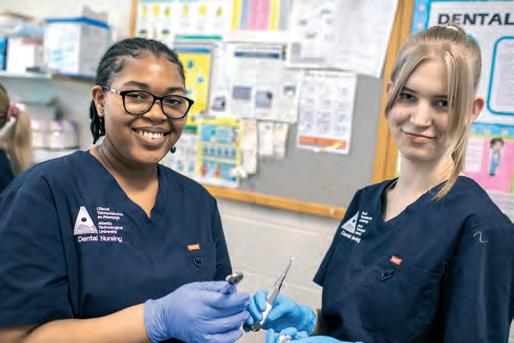
This two-year programme allows you to gain professional, managerial and technical knowledge that opens up opportunities to work in either hospital or community-based pharmacies. This programme will be delivered over four semesters allowing learners to gain their qualification in two years. The main aim of this programme is to produce graduates with the required theoretical and hands-on skills to allow them to work in a pharmacy setting and contribute effectively to the pharmacy.
atu.ie/AU174
201 (Level 6 2024)
2 Years Minimum Entry Requirements PLUS
• O6/H7 in either Phy, Chm, Pch, Bgy or Ags
• Garda Vetting
20 Places
Work Placement
Dr Kim McFadden Head of Department of Life and Physical Sciences kim.mcfadden@atu.ie
This programme includes a six-week placement each semester in a pharmacy setting. It is intended that students will be placed in both community and hospital pharmacies.
Placement is an integral part of the programme. The aim of the placement is to provide learners with an opportunity to gain skills, experience and competence. Placements can be assigned to anywhere in Ireland. Travel and accomodation are the responsibilty of the learner.
Successful graduates find jobs in community and hospital pharmacies. Graduate careers include working as a pharmacy technician.
Graduates can progress to Year 2 of the following programmes: BSc in Pharmaceutical and Medicinal Science, BSc in Food Science and Nutrition and BSc in Bioanalytical Science.
Graduates can progress to Year 1 of the Masters of Pharmacy, Ulster University (minimum entry requirements must be met), and may be interviewed for admission through UCAS to Year 1 of the Masters of Pharmacy at University of Bradford and University of Brighton.
For those wishing to pursue a career in pharmacy, a formal agreement between Ulster University (UU) and ATU Donegal provides a progression pathway to the MPharm Degree Programme in UU.
Pharmacy technicians support pharmacists by dispensing medications, managing inventory, and assisting customers with prescriptions in various healthcare settings.
• Chemistry 1
• Biological Science
• Pharmacy Practice 1 and Dispensary Computers
• Pharmacy Work Placement 1 –Practical
• Organic and Applied Chemistry
• Pharmacology
• Pharmacy Practice 2 Pharmacy
• Work Placement 2 – Practical
• Pharmaceutical Chemistry and Formulation
• Applied Physiology
• Calculations and Extemporaneous Preparations
• Pharmacy Work Placement 3 –Practical
• Drug Action and Usage
• Pharmacy Business and IT
• Pharmacy Work Placement 4 –Practical
Additional elective modules may be available throughout the programme.
This programme may suit those who wish to pursue an interesting and worthwhile career in the caring profession. Students who have an interest in acquiring the skills necessary to work with and care for people suffering from a variety of physical health problems will enjoy this programme. It will also suit students who wish to learn how to analyse problems and apply solutions based on best practices. Good communication skills, combined with an interest in working with people who are ill and in need of care and support are also an advantage.
atu.ie/AU380
343 (Level 8 2024)
4 Years Minimum Entry Requirements PLUS
• O6/H7 in Phy, Chm, Pch, Bgy or Ags
• O6/H7 Maths
• Health Declaration
• Garda Vetting
• Mandatory Training
• Practice Placement
35 Places
Work Placement
Dr Louise Mc Bride
Department of Nursing and Health Care Nursing.Donegal@atu.ie
There is a 36-week paid internship in Year 4.
Graduate careers typically include working as a medical/surgical care nurse, clinical nurse specialist such as in renal, oncology or orthopaedics, clinical nurse manager or as a community, public health or general practice nurse. Successful graduates find work in clinical nursing such as acute, primary and community care settings, or in education and research.
Graduates may progress to the following programmes:
• PG/Master of Science in Advancing Health and Social Care at ATU Donegal
• PG/Master of Science in Therapeutic Interventions in Alcohol and Other Drugs at ATU Donegal
• PG/Master of Science in Advanced Practice (Nursing) (Consortium blended delivery)
• PG/Master of Science in Professional Nursing Practice (Consortium blended delivery)
• Higher Diploma in Counselling (Level 8)
• Acute Medicine Nursing (Standalone Module)
• Emergency Nursing (Standalone Module)
• ATU Level 8 qualifications are recognised worldwide for postgraduate entry
All nursing graduates are highly sought after with 100% employability potential upon graduation
Studying general nursing equips students with essential skills in patient care, medical procedures, and healthcare management across diverse clinical settings.
Nursing and Midwifery Board Ireland (NMBI)

Year 1
• Biological and Related Sciences 1
• Introduction to Behavioural Sciences and Scholarship
• Professional and Ethical Nursing Studies 1
• Nursing Skills 1
• Biological and Related Sciences 2
• Psychology and Sociology across the Lifespan
• Professional and Ethical Nursing Studies 2
• Nursing Skills 2
• General Nursing Clinical Practice 1
Year 2
• Clinical Nursing Pathway 1
• Research in Practice 1
• Professional and Ethical Nursing Studies 3
• Nursing Skills 3
• Clinical Nursing Pathway 2
• General Nursing Practice 2
• Nursing Skills 4
• Promoting Health and Well-Being
• Research in Practice 2
Year 3
• General Nursing Practice 3
• Aging and Care of the Older Person
• Individual and Collective Well-Being
• Research in Practice 3
• Care of Person with Cancer
• General Nursing Clinical Pathway 3
Year 4
• Clinical Nursing Pathway 4
• Leadership, Management and Professional Scholarship
• Preparation for Professional Practice
• General Nursing Practice 4
Additional elective modules may be available throughout the programme.
BSc
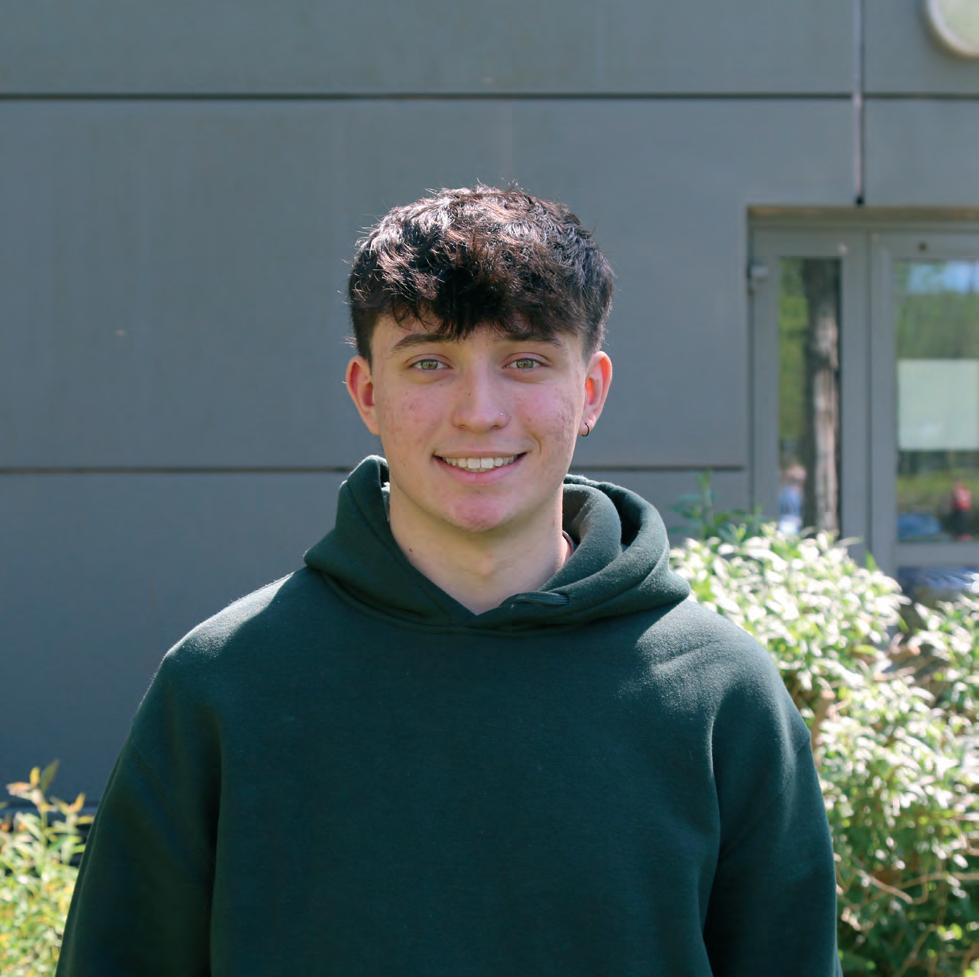
At an Open Day event, I decided to go to a talk on Mental Health Nursing as I have a few family members working in that area. I wasn’t sure if it was an area that would interest me but hearing from students and lecturers, I realised I was more interested than I expected, especially in terms of helping people and understanding different aspects of mental illness. That talk made my decision to apply for the programme.
Work placement for me has been great. It’s the person-to-person engagement that I find most fulfilling, and placement allows me to achieve this. Nursing is a job that can be practiced in many countries so I’m hoping it will allow me to travel!
This programme is for students who have an interest in acquiring the skills necessary to work with and care for people suffering from a variety of physical and mental health challenges. Students who wish to learn how to analyse problems and apply solutions based on best practices will enjoy this programme. An interest in working with people who have mental health challenges is also an advantage.
atu.ie/AU381
272 (Level 8 2024)
4 Years Minimum Entry Requirements PLUS
• O6/H7 in Phy, Chm, Pch, Bgy or Ags
• O6/H7 Maths
• Health Declaration
• Garda Vetting
• Mandatory Training
• Practice Placement
37 Places
Work Placement (16 places in Donegal and 21 places in Sligo/ Leitrim)
Dr Louise Mc Bride Department of Nursing and Health Care Nursing.Donegal@atu.ie
There is a 36-week paid internship in Year 4 with 16 places in Donegal and 21 places in Sligo/Leitrim Mental Health Services.
Successful graduates find work in clinical nursing, community mental health services, nurse management, education and research. Graduate careers include working as a psychiatric nurse in various settings.
Graduates may progress to the following programmes:
• PG /Masters Degree in Advancing Health and Social Care at ATU Donegal
• PG /Masters Degree in Therapeutic Interventions in Alcohol and Other Drugs at ATU Donegal
• PG/Master of Science in Advanced Practice (Nursing) (Consortium blended delivery)
• PG/Master of Science in Professional Nursing Practice (Consortium blended delivery)
• Higher Diploma in Counselling Skills (Level 8)
• ATU Level 8 qualifications are recognised worldwide for postgraduate entry.
All nursing graduates are highly sought after with 100% employability potential upon graduation.
A mental health nurse offers support to a wide range of patients with various mental health conditions, aiding them towards recovery and helping them gain control over their illness to live more independently.
Nursing and Midwifery Board Ireland (NMBI).

Year 1
• Biological and Related Sciences 1
• Introduction to Social and Behavioural Sciences for Nursing
• Professional and Ethical Nursing Studies 1
• Nursing Skills 1
• Biological and Related Sciences 2
• Psychology and Sociology across the Lifespan
• Professional and Ethical Nursing Studies 2
• Understanding the nature of Mental Illness
• Mental Health Nursing and Clinical Practice 1
Year 2
• Physical Health and Well-Being 1
• Professional and Ethical Nursing Studies 2
• Research in Practice 1
• Promoting Recovery
• Complex needs in Mental Health Nursing
• Research in Practice 2
• Foundations for Healthcare and Recovery
• Promoting Health and Well-Being
• Mental Health Nursing Practice
Year 3
• Mental Health Nursing Practice 3
• Physical Health and Well-Being 2
• Individual and Collective Well-Being
• Aging and Care of the Older Person
• Research in Practice 3
Year 4
• Leadership, Management and Professional Scholarship
• Contemporary Approaches in Mental Health Nursing
• Development of the Skilled Practitioner
• Mental Health Nursing Practice 4
• Mental Health Nursing (Internship)
Additional elective modules may be available throughout the programme.
Intellectual Disability (ID) Nursing is a specialised type of nursing which concerns itself with working with adults and children who have an intellectual disability and who may be unable to live fully independent lives. Its essential goal is to guide, support and work with these adults and children towards maintaining optimum health and well-being and social inclusion in day-to-day life. This involves working with each individual, their families, carers and the general community.
atu.ie/AU382
271 (Level 8 2024)
4 Years Minimum Entry Requirements PLUS
• O6/H7 in Phy, Chm, Pch, Bgy or Ags
• O6/H7 Maths
• Health Declaration
• Garda Vetting
• Mandatory Training
• Practice Placement
24 Places
Dr Louise Mc Bride Department of Nursing and Health Care Nursing.Donegal@atu.ie Work Placement
There is a 36-week paid internship in Year 4.
Successful graduates find work in clinical nursing, clinical nurse management, community, residential, day centre or intellectual disability services, or in education and research.
Graduates may progress to the following programmes:
• PG /Masters Degree in Advancing Health and Social Care at ATU Donegal
• PG /Masters Degree in Therapeutic Interventions in Alcohol and Other Drugs at ATU Donegal
• PG/Master of Science in Advanced Practice (Nursing) (Consortium blended delivery)
• PG/Master of Science in Professional Nursing Practice (Consortium blended delivery)
• Certificate in Contemporary Healthcare Management
• ATU Level 8 qualifications are recognised worldwide for postgraduate entry.
All nursing graduates are highly sought after with 100% employability potential upon graduation.
Nurses in intellectual disability (ID) work in a broad range of services including long-stay settings, community, day-care, care of the older person, child and adolescent.
Nursing and Midwifery Board Ireland (NMBI).

Year 1
• Biological and Related Sciences 1
• Introduction to Social and Behavioural Sciences
• Professional and Ethical Nursing Studies 1
• Nursing Skills 1
• Biological and Related Sciences 2
• Psychology and Sociology across the Lifespan
• Professional and Ethical Nursing 2
• Nursing Skills 2
• Intellectual Disability Nursing Practice 1
Year 2
• Research in Practice 1
• Supporting People with Behaviours of Concern
• Genetics and Health Needs in Intellectual Disability
• Professional and Ethical Nursing 3
• Health Needs and Nursing Interventions in Intellectual Disability 1
• Research in Practice 2
• Promoting Health and Well-Being
• Person Centred Care
• Intellectual Disability Nursing Practice 2
Year 3
• Intellectual Disability Nursing Practice 3
• Aging and the Older Person
• Individual and Collective Well-Being
• Research in Practice 3
• Health Needs and Nursing Interventions in Intellectual Disability 2
• Transition to Adulthood
Year 4
• Leadership, Management and Professional Scholarship
• Contemporary Trends in Intellectual Disability Nursing
• Health Needs and Nursing Interventions in Intellectual Disability 3
• Intellectual Disability Nursing Practice 4
• Intellectual Disability Nursing (Internship)
Additional elective modules may be available throughout the programme.
The Bachelor of Veterinary Medicine and Surgery (BVMS) at ATU is designed to address the essential role of veterinary surgeons in safeguarding animal health, public health, and the sustainability of Ireland’s food-producing economy, this programme is strategically structured to produce highly skilled, confident, and well-rounded veterinary graduates equipped to work effectively in veterinary practice in Ireland and beyond. Through extensive hands-on training, extramural placements, and structured professional development, students will develop the clinical, technical, and business acumen required to succeed in a variety of environments including veterinary practice, industry, and research.
atu.ie/AU375
NEW Programme
5 Years Minimum Entry Requirements PLUS
• H4 in Chemistry or Phys/Chem and a
• H4 in one of the following subjects: Biology, Ag Science, Physics. Additional Requirements
• Situational Judgement Test – Completed by end of February on year of entry.
• A mandatory minimum 2 weeks/ 60 hours placement in a mixed animal veterinary practice must have have taken place within 3 years of applying to the programme.
40 Places
Work Placement
Professor Patrick Pollock Head of Department of Veterinary Medicine veterinary@atu.ie
In year 2, semester 2, students participate in an immersive, hands-on farm experience at ATU Mountbellew.
Veterinary work placements is a mandatory part of the BVMS programme. The BVMS includes 12 weeks of animal husbandry placement and 26 weeks of clinical training. Placements may be assigned anywhere in Ireland. Travel and accommodation are the responsibility of the learner.
Graduates will be qualified to work in mixed, farm animal, equine, exotic and companion animal practice. Nonclinical roles in state bodies in areas such as public health and research are also open to graduates. Students may also pursue further specialist qualifications.
ATU qualifications are recognised worldwide for postgraduate entry.
Veterinary medicine is not just about treating animals—it is also about protecting people from zoonotic diseases like rabies, avian flu, and leptospirosis. Vets are vital to public and environmental health.
The BVMS is designed to meet VCI, EAEVE and RCVS standards. The BVMS is not currently accredited, ATU is actively pursuing accreditation, which requires full programme delivery before final review.
Year 1
• Digestive System - Principles in Health
• Cardiovascular, Respiratory and Lymphatic Systems - Principles in Health
• Integumentary and Endocrine Systems - Principles in Health
• Musculoskeletal SystemPrinciples in Health
• Professional Skills 1
• Animal Husbandry Behaviour and Welfare 1
• Animal Husbandry Extra Mural Studies 1
Year 2
• Urogenital System - Principles in Health
• Neurology and Special SensesPrinciples in Health
• Production Cycle and Breeding of Production Animals
• Sustainable Production Systems, Herd Health, and Epidemiology
• Professional Skills 2
• Animal Husbandry Behaviour and Welfare 2
• Animal Husbandry Extra Mural Studies 2
Year 3
• Emergency Veterinary Care, Critical Care, Anaesthesia and Fluid Therapy
• Cardiovascular, Respiratory and Lymphatic Systems in Disease
• Digestive System in Disease
• Musculoskeletal System in Disease
• Veterinary Public Health and Food Safety
• Professional Skills 3
• Clinical Extra Mural Studies 1
Year 4
• Integumentary and Endocrine Systems in Disease
• Neurology and Special Senses in Disease
• Urogenital Systems in Disease
• Remote, Rural and Global Veterinary Medicine
• Veterinary Research Project
• Professional Skills 4
• Clinical Extra Mural Studies 2
Year 5
• Intramural Rotations
• Clinical Extra Mural Studies 3
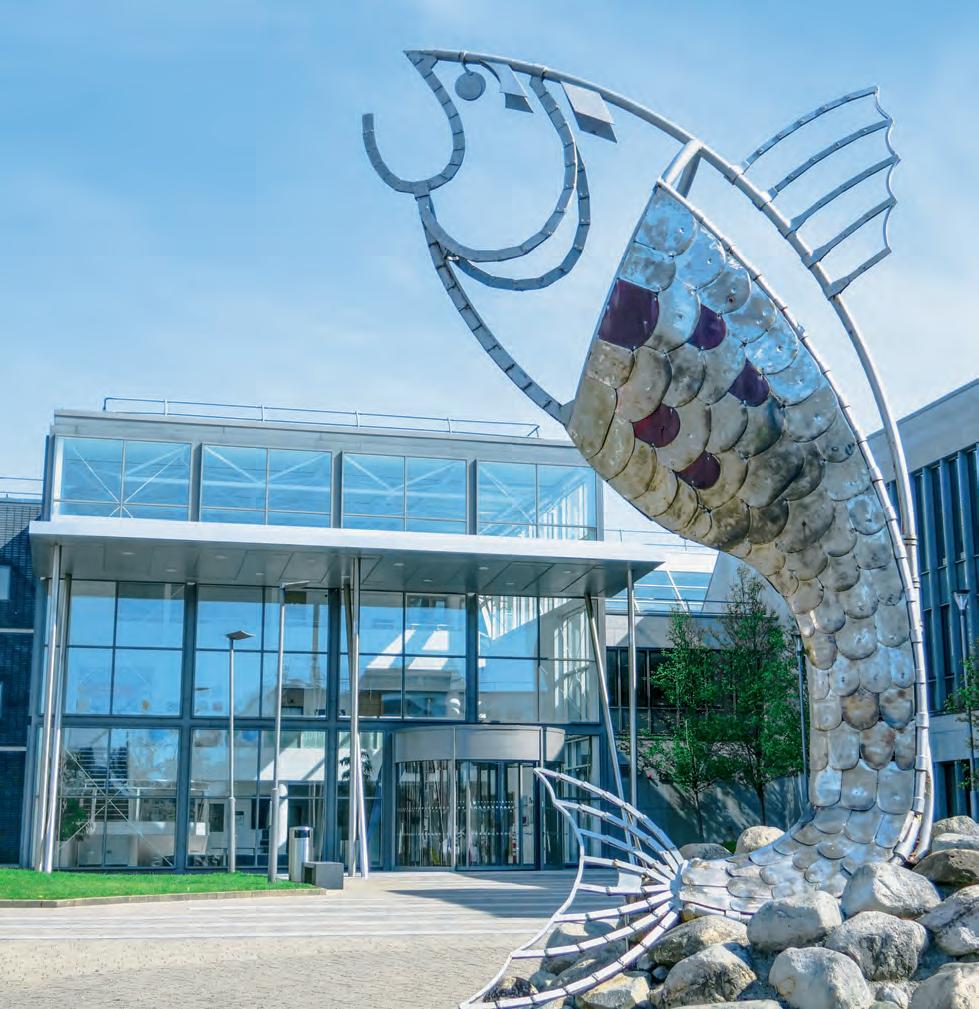
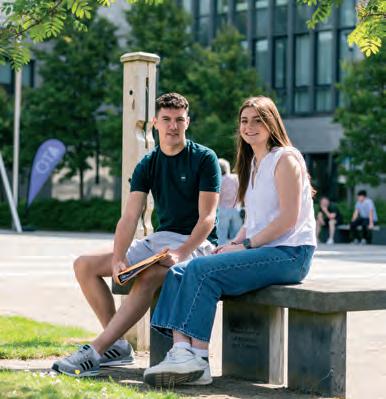
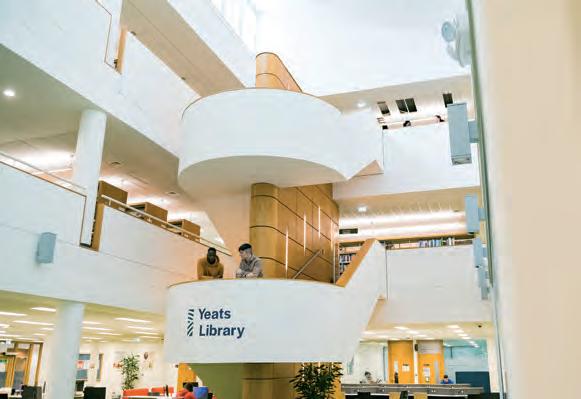
Almost 10,000 students study full-time, part-time or online with the Sligo campus, with programmes available from higher certificate Level 6 up to PhD Level 10. We offer 65 CAO programmes across eleven departments. Sligo is home to students from every county in Ireland and over 50 countries worldwide.
We have invested significantly in our campus. Whether it is our stateof-the-art labs in engineering and science, new computer labs or the new creative hub for arts, design and architecture; our students have access to some of the best facilities of any university in Ireland.
One of the major advantages of life in ATU’s Sligo campus is the sense of community. We have a full team of dedicated staff to support our students throughout their studies. We also boast the best student to lecturer ratio in Ireland as outlined by the Good University Guide. More than just a number, our students get to know all their lecturers and classmates on a first-name basis.
Our academic staff are passionate and engaging which means advice and help is always on hand. From all corners of the globe, numerous academics are regarded as leaders in their respective fields. They not only bring academic knowledge; they also bring real-world experience.
Spread over three floors, the Yeats Library is a world-class facility providing all the resources a student needs to excel in their programme of study. The library has over 700 workspaces and 70,000 printed books, whilst students have 24/7 access to over 268,000 eBooks and 71,500 eJournals thanks to the integration of services across all ATU libraries.
We understand there is more than one way to educate. We are big on practical learning, which means we reinforce theory with hands-on experience in labs and workshops. Real-life and collaborative projects, industry visits, guest speakers and work placements are just some of the other ways we ensure our students get the best education possible. In 2024, 9/10 of our graduates secured employment or continued their studies (Graduate Outcomes Survey).
We have developed comprehensive student and academic supports, which ensures students get expert assistance throughout their academic journey. In 2022, we were designated as an Autism Friendly campus. We are the first technological university campus in Ireland to achieve this.
This degree delves deep into the intricate workings of the modern business landscape, equipping students with a robust understanding of key principles and practices essential for success in various sectors. Throughout the programme, students engage in critical analysis, develop strategic problemsolving skills and cultivate the ability to make informed decisions in dynamic business environments. This empowers our students to thrive as future leaders and change-makers in the global marketplace.
atu.ie/AU900
more detail.
Year 1
• Personal Learning and Development
• Financial Accounting
• Business Technology
• Principles of Marketing
• Management
• Teamwork and Communication
• Business Mathematics and Statistics
Year 2
• Organisational Behaviour
• Economics for Business
280 (Level 8 2024)
4 Years Minimum Entry Requirements
30 Places
Work Placement
Erasmus+
cao.sligo@atu.ie
Students enjoy a five-month work placement in Year 3. This provides them with the opportunity to experience the world of business and enables them to develop practical skills that they can apply in their future careers. Students have the option to undertake this work placement or a period of study abroad, as part of the Erasmus+ programme.
Guest speakers and business insight trips are a key element of this degree. Individual and group projects are also integral as these develop skills required for business, such as analysis, teamwork, presentation and professional business skills. A final year research dissertation enables students to explore their area of interest in
Graduates enjoy a wide variety of career choices in a broad range of businesses. Many have established highly successful businesses, while others have joined graduate training programmes in multinational companies and have enjoyed success in senior management roles.
Graduates may advance to postgraduate study within Atlantic Technological University or other higher education institutions. They may also pursue a Professional Master of Education (PME) to become a secondary school teacher of Business, or study for professional qualifications in accounting or marketing. Successful graduates from this programme are eligible to sit the Marketing Institute graduate entry examination to acquire a professional marketing accreditation (MMII Grad).
Students study core business areas before choosing one specialist stream in Year 4. Students may choose finance, marketing or human resource management, subject to availability.
Communication is an extremely important aspect of any business, and with our marketing and computer modules, students learn how to effectively promote their business and engage with their community.
• Business Mathematics and Statistics
• Business Law
• Management Accounting
• Advanced Business Technology
• Principles of Marketing
Year 3
• Enterprise Development
• Introduction to Financial Management
• Open Economy Macroeconomics
• Marketing Management
• Human Resource Management
• Work Placement / Erasmus+ programme
• Marketing Communications and Sales
• Applied Finance
Year 4
• Business Research Methods
• E-business and Innovation
• Strategic Management
• Dissertation
• Other subjects depend on chosen specialist stream
Additional elective modules are available throughout the programme.
Students choose elective modules throughout the degree, which includes the option to study Spanish, French or German.
This three-year ordinary degree produces graduates with comprehensive business skills. We equip our students with knowledge in core business areas, including management, human resources, finance, accounting, law, marketing and economics. Students are given a foundation in theoretical principles and are involved in a wide range of practical exercises. Our lecturers not only have the academic knowledge but also the industry experience to provide students with a deep understanding of business practice across various industries and organisations.
What will I study?
Year 1
• Financial Accounting
• Business Technology
• Personal Learning and Development
• Business Mathematics
• Introduction to Management
• Teamwork and Communication
• Introduction to Marketing
Year 2
• Digital Marketing
• Management Accounting
• Economics for Business
• Business Law
224 (Level 7 2024)
3 Years Minimum Entry Requirements
15 Places
Erasmus+
cao.sligo@atu.ie
Guest speakers and business insight trips are a regular feature on this degree. This provides students with an understanding of business practice in a variety of organisational settings and tackles the most up-todate trends and challenges facing businesses today.
Individual and group projects are also an integral part of this programme as these develop key skills required for business such as analysis, teamwork, presentation and professional business skills.
Graduates enjoy a wide variety of career choices in a broad range of businesses. Many have established highly successful businesses, while others have joined graduate training programmes in multinational companies and have enjoyed success in senior management roles. Graduates secure employment across the public, private and non-profit sectors. Career options include sales, management, human resources, marketing, finance and accounting, office and project management.
Graduates of this Level 7 ordinary degree can progress to a Level 8 BBus (Hons) in Business degree in Atlantic Technological University or in other higher education institutions. Level 8 graduates may progress to a range of Level 9 and Level 10 postgraduate studies, including a Professional Master of Education (PME) to become a secondary school teacher of Business.
Work placement takes place in the final semester of Year 3. This allows students to put the theory learnt in class into a real-world setting. Students also begin to network and make industry connections during work placement. These connections, built through work colleagues and industry experts, can open up all sorts of opportunities.
• Advanced Business Technology
• Enterprise Development
• Business Management
Year 3
• International Marketing
• Introduction to Financial Management
• Human Resource Management
• Operations Management
• Contemporary Management
• Work Placement
Additional elective modules are available throughout the programme.
Students choose elective modules throughout the degree, based on where their interests lie. This includes language options in Spanish, French or German.
This future-focused and modern business degree is an ideal choice for those who want to be part of the digital transformation in the business era and gain skills for many exciting careers. We equip students with the skills to identify business challenges, find technological solutions, manage technology projects and analyse business data. Businesses today are struggling to see how they can leverage the opportunities presented by technology to transform their operations. Our graduates are well placed to support and lead them. Students are not required to be ICT experts or have prior experience in ICT to undertake this degree.
atu.ie/AU901
Year 1
• Skills for Success
• Business Application Software
• Marketing
• Organisational Behaviour
• Introduction to Software and Operating Systems
• Design Thinking
• ICT Applications
• Microeconomics
• Data Analytics
• Database Fundamentals
• Introduction to Computer Networking
• Web Design Fundamentals
Year 2
• Web and Social Media Analytics
• Management
• Introduction to Business Finance
317 (Level 8 2024)
3 Years Minimum Entry Requirements
25 Places
Erasmus+
cao.sligo@atu.ie
This degree integrates two disciplines to create unique graduates who are in high demand. Graduates not only have the knowledge and practical capabilities of IT infrastructure and information systems, but they also have the business acumen to understand and appreciate the business. They can use that knowledge to influence and manage change in a variety of industries and organisations, both nationally and internationally.
There is a shortage of accredited computer science teachers in Ireland and a worldwide shortage of ICT skills. There were only 145 credited teachers in Computer Science in Ireland by Q4 2024.
This programme is designed to give students a broad range of knowledge and skills, valuable to any modern company. Graduates are prepared for numerous roles including ICT project manager, data security manager, digital transformation consultant, information resource manager, technology consultant or systems analyst.
Further study options include postgraduate studies by research to either masters (Level 9) or PhD (Level 10) level. Graduates may also apply to undertake a Professional Master of Education (PME) to become a secondary school teacher for both Computer Science and Business subjects. Graduates may further their studies in Sligo and undertake an MSc in Digital Business or other postgraduate options at ATU or other universities worldwide.
Microsoft Accreditation
Students can attain Microsoft certifications, which are industryrecognised worldwide and give graduates a competitive edge in the job market.
Google Analytics Accreditation
Students will complete a Google Analytics accredited course and can gain an internationally recognised Google Certification.
• Database Technologies
• Introduction to Python Programming
• Internet of Things
• Human Resource Management
• Business Law
• System Analysis and Testing
• Data Preparation and Visualisation
Year 3
• Research Methods
• Business Enterprise and Entrepreneurship
• Macroeconomics
• Quantitative Techniques and Reporting
• Artificial Intelligence
• Computer Security and Cryptography
• Dissertation
• Strategic Management
• Digital Transformation
• Cloud Computing in Business
• Ethics in Computing
In Year 3, students take part in a week-long international Business and ICT project alongside students from other European universities.
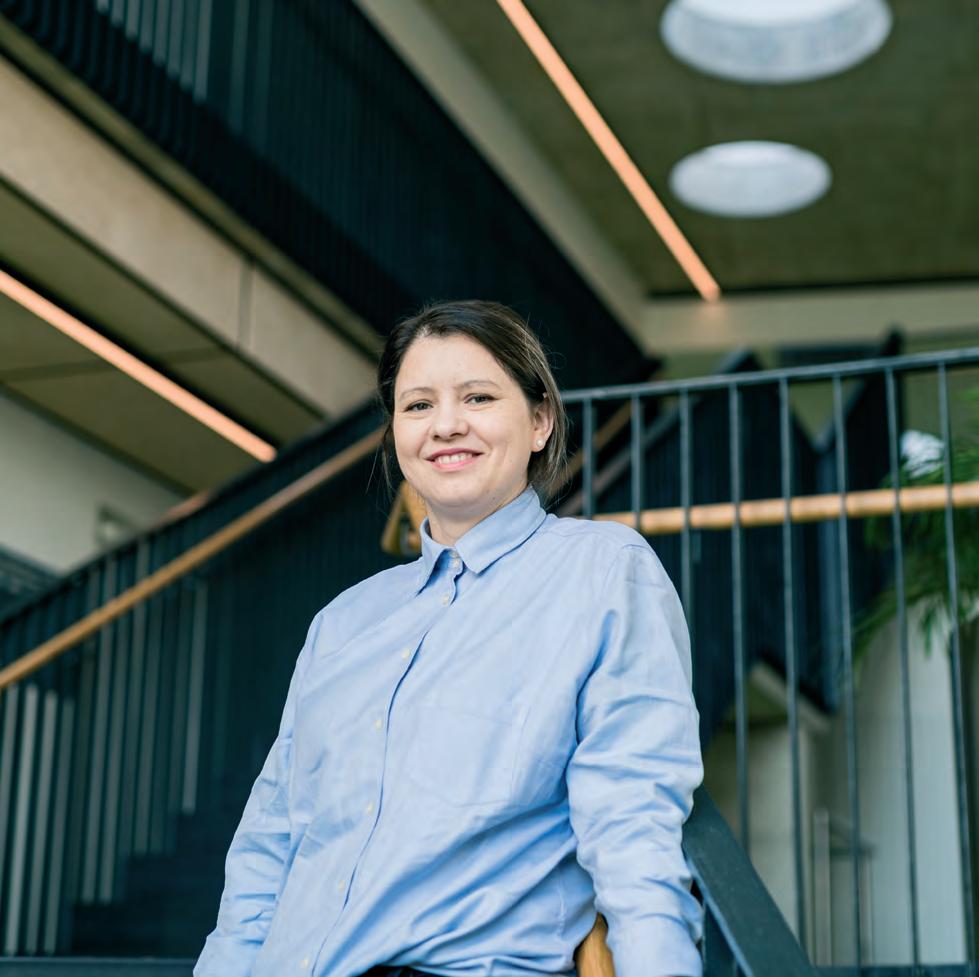
I’ve always had an interest in understanding how organisations function and how technology supports business operations. When I researched study options, I knew this degree was the perfect fit for me. I chose ATU because of its excellent reputation and strong connections with industry. The degree is practical and relevant, which means I will be work ready when I graduate.
I really enjoy the mixture of business and ICT modules. It gives a broad understanding of how technology can be used in business. The assignments and group work help develop real-world skills. ATU offers a very supportive learning environment and the support from lecturers is fantastic.
This degree is a collaboration between ATU’s Sligo and St Angela’s campuses, with students undertaking classes on both campuses. It covers the disciplines of business and Irish simultaneously and equally. The business strand is undertaken through the medium of English and the Irish strand through the medium of Irish, with opportunities to marry both throughout the programme. This joint major degree ensures graduates enjoy diverse career opportunities and further study options.
atu.ie/AU906
3 Years Minimum Entry Requirements PLUS • Min H5 in Irish 339 (Level 8 2024)
30 Places cao.sligo@atu.ie
The business stream focuses on innovative and traditional business modules, ensuring content is relevant to the ever-evolving world of business. Students put their in-class learning into practice and regularly work with industry experts on real-life projects.
In the Irish stream, students are given the opportunity to study both literature and language-focused modules. Students are supported to engage in Gaeltacht-based and Irish-medium work placements, and to study on Gaeltacht-based language courses.
The Official Languages (Amendment) Act 2021 has targets whereby 20% of public sector employees will be proficient in Irish by 2030.
Employment opportunities exist in arts and culture, public sector organisations, ICT, financial services and marketing. There are also a variety of roles in communication and media, where the Irish language is core. Many SMEs, which employ 60% of the Irish workforce, use heritage as one of their unique selling points internationally.
Graduates may apply to undertake a Professional Master of Education (PME) to become a secondary school teacher of Business and Irish. Postgraduate study options also exist in business, policy, equality, financial management, the MA sa Nua-Ghaeilge, accredited translator status (EU/Brussels), or graduates may apply for Údarás na Gaeltachta paid work experience.
Microsoft Accreditation
Students can attain Microsoft Certifications, which are industryrecognised worldwide and differentiate graduates.
Google Analytics Accreditation
Students complete a Google Analytics accredited course and can gain an internationally recognised Google Certification.
Year 1
• Skills for Success
• Organisational Behaviour
• Marketing
• An Gearrscéal sa Ghaeilge
• Gaeilge agus Cumarsáid 1 agus 2
• Athbheochan na Gaeilge
• ICT Applications
• Microeconomics
• Data Analytics
• An Béaloideas agus an Fhilíocht Bhéil
• An Fhilíocht sa Ghaeilge
• Management
• Introduction to Business Finance 1 and 2
• Web and Social Media Analytics
• Gaeilge agus Cumarsáid 3 agus 4
• Litríocht na Gaeilge san Ochtú hAois agus na Naoú hAois Déag
• An Ghaeilge agus an Saol Gairimiúil
• Human Resource Management
• Emerging Trends in Business Law
• Drámaíocht agus Scannánaíocht na Gaeilge
• An Litríocht Réigiúnach
Year 3
• Research Methods
• Business Enterprise and Entrepreneurship
• Macroeconomics
• An tSochtheangeolaíocht
• Mionstaidéar ar Shaothair Liteartha Roghnaithe
• Próslitríocht na Gaeilge sa Seachtú hAois Déag agus Filíocht na Nua-Ghaeilge Moiche
• Strategic Management
• Digital Transformation
• Dissertation
• Ceartúsáid na Gaeilge
• An t-Úrscéal sa Ghaeilge
Is céim comhoibríoch í seo idir OTA Shligigh agus OTA San Aingeal, le mic léinn ag freastal ar ranganna ar an dá champas. Cumhdaíonn an cúrsa réimsí an Ghnó agus na Gaeilge go cothrom ag an am céanna. Déantar an snáithe Gnó den chúrsa trí mheán an Bhéarla agus déantar an snáithe Gaeilge trí mheán na Gaeilge, agus beidh deiseanna ag mic léinn an dá ábhar a thabhairt le chéile le linn an chúrsa. Cinntíonn an cúrsa dhá ábhair seo go mbeidh go leor deiseanna gairme agus roghanna maidir le tuilleadh staidéir ag céimithe.
atu.ie/AU901
Céard iad na hábhair a dhéanfaidh mé staidéar orthu?
Bliain 1
• Scileanna don Rath
• Iompar Eagraíochtúil
• Margaíocht
• An Gearrscéal sa Ghaeilge
• Gaeilge agus Cumarsáid 1 agus 2
• Athbheochan na Gaeilge
• Feidhmchláir TFC
• Micreacnamaíocht
• Anailísíocht Sonraí
Deiseanna
339 (Leibhéal 8 2024)
3 Bliana Bunriachtanais
Iontrála PLUS
• H5 ar a laghad sa Ghaeilge
30 Áit cao.sligo@atu.ie
Díríonn an snáithe Gnó ar chleachtais nuálaíocha agus tradisiúnta ghnó, rud a chinntíonn go bhfuil baint ag ábhar an chúrsa leis an domhan gnó a bhíonn ag athrú go síor. Cuirfidh mic léinn na rudaí a fhoghlaimíonn siad i ngníomh agus is minic go n-oibríonn siad le saineolaithe sa tionscal ar thionscadail san fhíorshaol.
Sa snáithe Gaeilge, bíonn deis ag mic léinn staidéar a dhéanamh ar mhodúil a dhíríonn ar an litríocht agus ar an teanga. Tugtar tacaíocht do mhic léinn páirt a ghlacadh i socrúchán oibre sa Ghaeltacht nó socrúchán oibre trí mheán na Gaeilge, agus chun staidéar a dhéanamh ar chúrsaí teanga sa Ghaeltacht.
An raibh a fhios agat?
Leagtar amach spriocanna in Acht na dTeangacha Oifigiúla (Leasú), 2021 go mbeidh inniúlacht sa Ghaeilge ag 20% d’fhostaithe nua san earnáil phoiblí faoi 2030.
Tá deiseanna gairme ar fáil sna healaíona agus cultúr, in eagraíochtaí poiblí, TFC, i seirbhísí airgeadais agus sa mhargaíocht. Chomh maith leis sin, tá go leor post ar fáil i gcúrsaí cumarsáide agus meáin, áit go mbíonn an Ghaeilge i lár an aonaigh. Díríonn go leor gnóthais bheaga agus mheánmhéide, a fhostaíonn 60% de lucht saothair na hÉireann, ar an dúchas mar cheann de na gnéithe uathúla díolacháin atá acu go hidirnáisiúnta.
Roghanna maidir le
Tuilleadh Taighde
Féadfaidh céimithe iarratas a dhéanamh ar Mháistir Gairmiúil le hOideachas (MGO) chun go mbeidh siad ina múinteoirí Gnó agus Gaeilge ar an dara leibhéal. Mar aon leis sin, tá deiseanna maidir le staidéar iarchéime ann a dhíríonn ar an ngnó, beartas, comhionannas, bainistíocht airgeadais, an MA sa Nua-Ghaeilge, stádas mar aistritheoir creidiúnaithe (AE/an Bhruiséil), nó féadfaidh céimithe cur isteach ar thaithí oibre íoctha le hÚdarás na Gaeilge.
Creidiúnú Gairmiúil
Creidiúnú Microsoft
Féadfaidh mic léinn Creidiúnú Microsoft a bhaint amach, atá aitheanta ar fud an domhain i measc céimithe éagsúla.
Creidiúnú Google Analytics
Déanfaidh mic léinn cúrsa creidiúnaithe de chuid Google Analytics agus beidh deis acu creidiúnú Google Analytics a bhaint amach, atá aitheanta ar fud an domhain.
• An Béaloideas agus an Fhilíocht Bhéil
• An Fhilíocht sa Ghaeilge
Bliain 2
• Bainistíocht
• Airgeadas Gnó 1 agus 2
• Anailísíocht Gréasáin agus Meán Sóisialta
• Gaeilge agus Cumarsáid 3 agus 4
• Litríocht na Gaeilge san Ochtú hAois agus sa Naoú hAois Déag
• An Ghaeilge agus an Saol Gairmiúil
• Bainistíocht Acmhainní Daonna
• Treochtaí Nua i nDlí an Ghnó
• Drámaíocht agus Scannánaíocht na Gaeilge
• An Litríocht Réigiúnach
Bliain 3
• Modhanna Taighde
• Fiontar agus Fiontraíocht Gnó
• Maicreacnamaíocht
• An tSochtheangeolaíocht
• Mionstaidéar ar Shaothair Liteartha Roghnaithe
• Próslitríocht na Gaeilge sa Seachtú hAois Déag agus Filíocht na Nua-Ghaeilge Moiche
• Bainistíocht Straitéiseach
• Claochlú Digiteach
• Tráchtas
• Ceartúsáid na Gaeilge
• An tÚrscéal sa Ghaeilge
This three-year honours degree offers one of the fastest routes to achieving a professional accounting qualification. The programme is highly commended by all the professional accountancy bodies, where graduates will qualify for excellent exemptions from all the professional accountancy exams in Ireland. Through a combination of lectures, case studies, problem-based learning and computer laboratory work, we ensure graduates have the skills to work in the finance function of any organisation, large or small, both in Ireland and internationally.
atu.ie/AU902
Year 1
• Financial Reporting
• Management Accounting Fundamentals
• ICT in Accounting
• Skills for Success
• Business Law for Accountants
• Business Mathematics and Statistics
• Advanced Business Technology for Accountants
• Personal Finance
2
• Financial Reporting
• Principles of Management
316 (Level 8 2024)
3 Years Minimum Entry Requirements
30 Places
Work Placement
cao.sligo@atu.ie
This three-year honours degree offers excellent exemptions from the professional accountancy exams. On completion of this degree, graduates are exempt from all CAP1 examinations with Chartered Accountants Ireland, all three applied knowledge and all six applied skills examinations with ACCA, and Certificate and Operational level with CIMA.
Throughout their studies, students develop a detailed comprehension of core concepts and principles in accounting and develop soft skills in problem solving, teamwork, creativity and communication.
Graduates may apply to complete a Professional Master of Education (PME) to become a secondary school teacher of Accounting at Leaving Certificate level and Business at Junior Certificate level.
There is a significant shortage of accounting graduates in Ireland. Our final year students are experiencing high demand for their skill set and are receiving numerous offers of employment, usually secured before completion of their studies. Graduates from this stimulating and challenging degree have the competence to work in any organisation’s finance function or in financial services, both in Ireland and internationally. Other options include careers in teaching, civil service and business management. Accountancy offers a solid foundation on which to build a dynamic and rewarding career across a limitless range of sectors.
Students are encouraged to seek summer internship work at the end of Year 2. This affords them the opportunity to work in a professional environment and often leads to the offer of a training contract.
As part of the Enterprise Applications module in Year 2, students complete the Sage Qualifications examination, earning a digital certificate recognised by ACCA and ATI that showcases their practical skills in cloud accounting and essential digital technologies valued by potential employers. Accountancy at Leaving Certificate level is not required to study this programme as it starts with beginners accounting.
This programme has a low studentto-lecturer ratio which enhances the learning experience and facilitates more individual attention between students and their lecturers.
• Principles of Macro and Microeconomics
• Management Accounting Planning, Control and DecisionMaking
• Partnership Law, Company Law and Governance
• Enterprise Applications
• Professional Development for Accountants
Year 3
• Finance
• Financial Reporting
• Strategic Management
• Strategic Management Accounting
• Auditing
• Taxation
Professional Accreditation


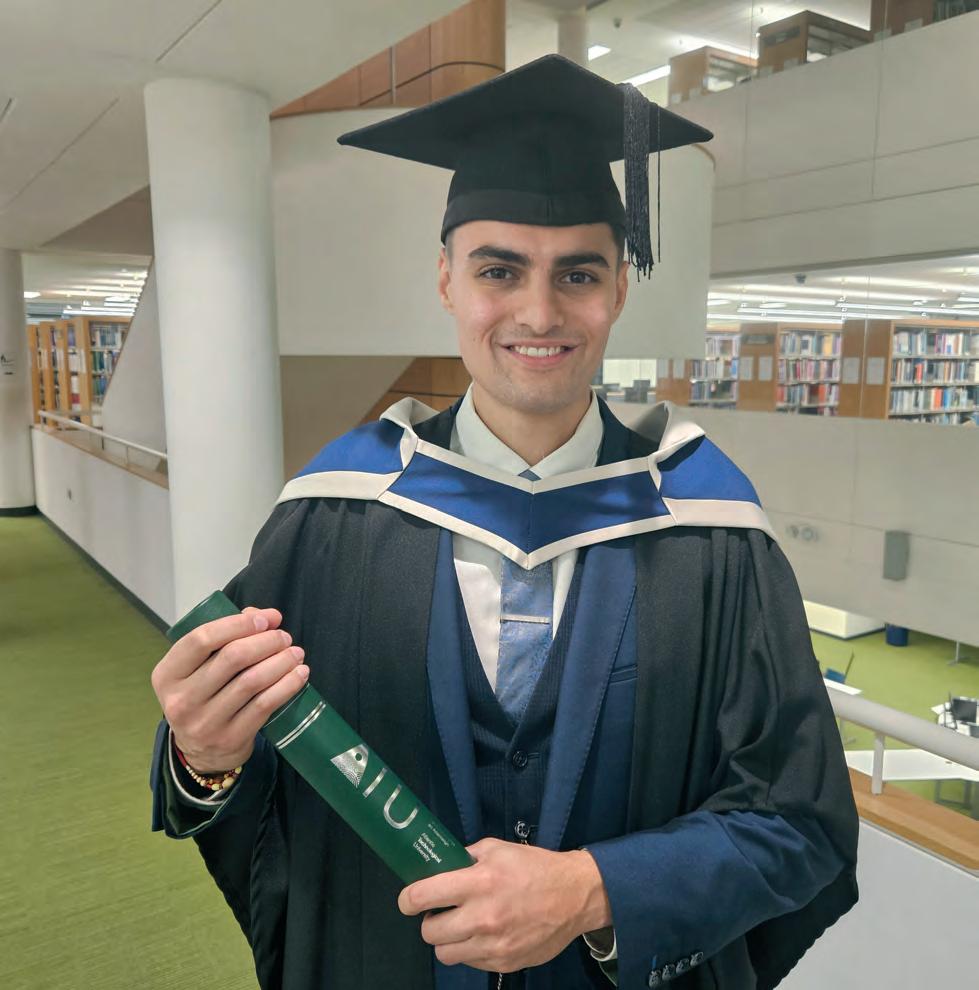
One of the best things about this degree is the number of exemptions it offers for professional accounting exams. I love that the degree doesn’t just focus on accounting alone, it also gives a broad understanding of the business world. That wider perspective has really stood to me in my current role, where having knowledge of the bigger picture is just as important as the numbers.
After graduating, I began my career in external audit and joined Grant Thornton in Dublin. I’m currently working towards becoming a fully qualified accountant through the ACCA qualification. The skills I gained throughout my studies has made the transition into professional life very smooth.
AU904 | Level 8 | Bachelor of Business (Honours)
AU802 | Level 7 | Bachelor of Business
Students study the latest practices from across the world of business and marketing. Graduates have the knowledge and skills to thrive in contemporary business and marketing environments where skilled marketers are in high demand in Ireland and across the globe. Guest lecturers, Erasmus+ opportunities, work placement, community engagement projects and business insight trips, coupled with excellent teaching, lay the foundations for this valued qualification.
atu.ie/AU904
atu.ie/AU802
3/4 Years
305 (Level 8 2024)
253 (Level 7 2024)
Minimum Entry Requirements
50 Places
Work Placement
Erasmus+
cao.sligo@atu.ie
In Year 3, students complete an eight-week work placement. Many students have obtained full-time employment following a successful work placement. Students may also study at one of our partner institutions as part of the Erasmus+ programme.
Many modules feature guest lecturers who are experts in specific marketing fields. Business insights trips are also a core part of the degree, bringing the theory from the classroom to life.
Students can obtain Google Ads accreditation. They can also choose elective modules throughout their studies, based on their interests. This includes language options in Spanish, French or German.
Graduates are equipped for a career in lots of different marketing and business areas. This includes digital marketing manager, marketing executive or manager, sales manager, eCommerce marketer, content creator, social media manager, events marketer, email marketer, blogger or influencer, marketing data analyst, online ad manager, online PR manager, sales account manager and business development manager.
Level 7 graduates may progress to the final year of the Level 8 BBus (Hons) in Marketing degree. Level 8 graduates may continue to a Level 9 MSc in Marketing, a masters by research or PhD. Graduates may also apply to undertake a Professional Master of Education (PME) to become a secondary school teacher of Business.
The digital marketing industry is booming. Professions in this field are expected to grow by 6% by 2032, outpacing the average job growth rate. The global digital marketing industry is projected to reach $472.5 billion in 2025 and grow to $1.3 trillion by 2033.
This programme encourages active learning and engagement with the business community. Many assessments are based on marketing challenges posed by companies. Students graduate with real-world marketing and business knowledge, which is highly sought after by employers.
Year 1
• Principles of Marketing
• Organisational Behaviour
• Skills for Success
• Business Application Software
• Financial Accounting
• Marketing Research
• Data Analytics
• Teamwork and Communication
• Business Management
• ICT Applications
Year 2
• Creative Marketing Practice
• Marketing Communications
• Consumer Buyer Behaviour
• Business Law
• Events Management
• Digital Content
• Web Analytics
• Introduction to Management Accounting
• Introductory Microeconomics
Year 3
• Managing People
• Introduction to Financial Management
• Enterprise Development
• eCommerce
• Sales Practice
• Search Engine Marketing
• Social Media and Digital Marketing Planning
• Work Placement / Erasmus+
• Research Methods for Business
Year 4 (Level 8)
• Business Strategy
• Macroeconomics
• Ethical and Sustainable Marketing Practice
• Customer Experience Management
• Strategic Marketing Management
• Professional Marketing Practice
• Global Marketing Practice
• Marketing Planning
• Customer Experience Innovation
Additional elective modules are available throughout the programme.


My favourite aspect of this degree is how creative and practical it is. We are given space to explore our creativity across a broad range of marketing areas. This has helped me to figure out what areas I like most and want to focus on. We get to work with real businesses and help create marketing campaigns and ideas for them.
The work placement in Year 3 is brilliant. I completed my work placement in ATU and this confirmed my desire to have a career in marketing. I also secured a summer marketing internship with TFI Local Link Limerick before starting Year 4. Digital marketing is an area I am very excited to pursue.
This programme is the first of its kind in Ireland, a three-year honours degree that combines sports-related modules with comprehensive business education and practice. Sport with Business focuses on introducing students to business and enterprise skills with opportunities for specific skill development in coaching, fitness instruction, personal training, education, exercise prescription and health. It offers students an excellent balance between theory and practice, equipping graduates with the knowledge and professional skills required to work within sport, fitness, leisure or business.
atu.ie/AU903
3 Years Minimum Entry Requirements PLUS
• Garda Vetting
• Health Declaration 310 (Level 8 2024)
30 Places
Work Placement
Erasmus+
cao.sligo@atu.ie
Students can attain several industry recognised external qualifications, which are incorporated into this programme. These include REPs (Register of Exercise Professionals) Ireland qualifications in fitness instruction and personal training. Other qualifications include swim teaching, national pool lifeguard and community walking leader. Coaching Ireland awards are also incorporated into the coaching modules in sports including athletics, basketball, GAA, rugby and soccer.
In Year 2, students complete a 13-week work placement in a variety of settings such as businesses, sports teams and schools. Work placement allows students to put the theoretical and practical knowledge they have learned in university into a real-life work environment.
This two-subject degree enables graduates to pursue a wide range of options in sport or business, or a combination of both disciplines. Opportunities for graduates include sports development, health promotion, marketing, management, coaching, entrepreneurship and a route into a career in teaching. Through the incorporation of work-based projects and work placements, graduates are workready. This is very important to potential employers and is one of many reasons why our graduates are highly sought after.
Graduates can pursue a wide range of Level 9 and 10 postgraduate studies in areas such as education, strength and conditioning, exercise physiology and therapy, health promotion, sports management and marketing.
Students can choose from several electives in the areas of sport or business, based on their interests. Year 3 electives allow students to focus on one of two streams, education or fitness instruction. Education is ideal for students who want to pursue coaching and education career routes, with modules including sport pedagogy and dance.
Year 1
• Principles of Marketing
• Outdoor Recreation
• Management and the Business Environment
• Intermediate Business Technology
• Health and Fitness
• Management of Recreation and Fitness
• Gym Instruction
• Business Law
• Introduction to Management Accounting
• Exercise and Health Psychology
• Introduction to Economics
Year 2
• Business Enterprise and Entrepreneurship
• Digital Content and Analysis
• Planning for Sport and Recreation
• Introduction to Financial Management
• Managing People
• Customer Care
• Teaching and Coaching (Team Sports)
• Work Placement / Erasmus+ Year 3
• Macroeconomics
• Business Strategy
• People Management Skills
• Strategic Sport Development
• Research Methods in Sports Studies
• Health Promotion
• Sports Marketing
• Dissertation
Additional elective modules are available throughout the programme.


I am very passionate about sport and fitness. I chose to study Sport with Business at ATU’s Sligo campus because the degree includes lots of practical modules. This makes learning very fun and helps create great memories with your classmates. As the degree covers both business and sports modules, there are lots of diverse opportunities for graduates which is really important.
For quite some time, I dreamt of becoming a PE Teacher and I knew this degree offered me that pathway. In my final year of studying Sport with Business, I applied to the Professional Master of Education (PME) in Physical Education at University of Limerick and my application was successful. I have since completed my PME and I am now a fully qualified teacher.
This programme is ideal for students who have an interest in sport, recreation, physical education or in coaching and instruction. It offers students the opportunity to acquire practical expertise and enables them to develop the competencies to be effective leaders in the sports industry. Students also learn about all aspects of business, leadership, marketing and digital technology. Graduates have the skills to work in both the business and sports sectors, or a combination of both.
atu.ie/AU804
3 Years Minimum Entry Requirements PLUS
• Garda Vetting
• Health Declaration 242 (Level 7 2024)
50 Places
Work Placement
Erasmus+
cao.sligo@atu.ie
This programme features a high level of practical activity ranging from swimming-based activities and surfing to fitness instruction and sports coaching. As part of the practical element of the programme, students regularly work with children in schools and other target populations in numerous environments across health and fitness, sports education, coaching and swimming.
In Year 3, students complete a 13week work placement. In the past students have gone to a variety of settings including schools, sports teams and various businesses. Work placement allows students to apply what they have learnt in university into a real-world environment.
This two-subject degree allows graduates to pursue a wide range of options in sport or business, or a combination of both disciplines. Many start their own business, work as fitness professionals, work in sports facility management, sports development and management, health promotion, personal training, coaching and instruction. Graduates have also gone on to specialise in primary and secondary school teaching.
Graduates may progress to the final year of our Level 8 BBus (Hons) in Sport with Business degree or to the final year of our BBus (Hons) in Business degree. Level 8 graduates may continue to masters studies in areas including health promotion, business, marketing and sports management. Students who complete this Level 7 BBus in Applied Sport with Business degree and our one-year Level 8 add-on in Sport with Business, may apply to study a Professional Master of Education (PME) to become a secondary school teacher of Physical Education.
Students can attain valuable national and international qualifications including European-recognised gym instruction and personal training, lifeguarding, swim instruction and several coaching awards.
This degree offers a pathway to becoming a secondary school teacher of Physical Education.
Year 1
• Sport and Recreation
• Financial Accounting
• Business Technology
• Fundamentals of Aquatics
• Play, Dance and Movement
• Sociology of Sport
• Athletics and Gymnastics
• Health Promotion
• Sport and Adventure Tourism
• Anatomy and Physiology
• Management and Business Environment
• Intermediate Business Technology
• Principles of Marketing
• Outdoor Recreation
• Health and Fitness
• Management of Recreation and Fitness
• Business Law
• Intro to Management Accounting
• Gym Instruction
• Exercise and Health Psychology
• Introduction to Economics
• Business Enterprise and Entrepreneurship
• Planning for Sport and Recreation
• Digital Content and Analysis
• Financial Management
• Managing People
• Customer Care
• Teaching and Coaching (Team Sports)
• Work Placement
Additional elective modules are available throughout the programme.
Professional Accreditation


In a dynamic and rapidly changing world, our tourism graduates are confident, creative and agile. This is exactly what is needed to continue developing the world’s fastest growing economic sector in a sustainable manner. ATU’s Sligo campus offers the only three-year honours degree in this subject area in the region, with students gaining the most current business degree with a specialism in tourism and event management. This provides a broad and exciting platform for building a successful career, with opportunities for our graduates worldwide.
atu.ie/AU905
3 Years Minimum Entry Requirements PLUS
• Garda Vetting 284 (Level 8 2024)
40 Places
Work Placement
Erasmus+
cao.sligo@atu.ie
Work placement provides students with invaluable real-world experience and practical insights into the tourism, events and related sectors. Students are encouraged to complete their placement overseas. In the past, students have worked in the USA, France, Germany, Spain, Greece, Alaska, Hong Kong, Turkey, the UK and Ireland. The degree also includes international field trips to tourist destinations such as Amsterdam, Paris, Madrid, Venice, Frankfurt and Rome.
Business insight trips to tourism companies are an integral part of the degree. Students also complete real-life projects in collaboration with industry experts. Guest lecturers regularly visit to share their expertise with students.
Graduates are highly sought after across the wide spectrum of business, tourism management and event management areas, and can work across the globe in sustainable destination management, festival and event management, national and local tourism development agencies, conference tourism, a range of visitor experiences, ecotourism, education, marketing organisations, as tour operators or travel agents, and within cultural, heritage and conservation projects. Many of our entrepreneurial graduates also start their own businesses.
Graduates have worked as sustainable tourism officers, tourism and EU project specialists, destination managers and contributed to amazing events like Sea Sessions and Electric Picnic. The opportunities arising from studying a multifaceted business degree, such as Tourism and Event Management, are endless for our dynamic and highly sought-after graduates.
Graduates can pursue a wide range of Level 9 masters and Level 10 PhD postgraduate programmes at ATU or other higher education institutions. Graduates can also apply to undertake a Professional Master of Education (PME) to become a secondary school teacher of Business.
Students gain event management experience by organising a significant event as part of the Event Planning and Project Management module.
Year 1
• Foundations of Tourism
• Introduction to Relationship Marketing
• Events Management
• Business Law
• Business Application Software
• Financial and Management Accounting
• Introductory Microeconomics
• Health and Safety Law for Events
• Business Management
• Experiential Tourism Marketing
• Tourism and Travel Industry
• Introduction to Financial Management
• Enterprise Development
• Managing People
• Sustainable Management of the Impacts of Tourism
• Tourism Communications and Branding
• Event Planning and Project Management
• Research Methods for Business
• International Destination Management
• Work placement / Erasmus+
• Macroeconomics
• Business Strategy
• Events Project Management
• Globalisation and Tourism
• Strategic Tourism
• Tourism and Events Research Project
Additional elective modules are available throughout the programme.
ATU achieved the distinction of becoming the first member in Northern Europe of the UN Tourism International Network of Sustainable Tourism Observatories (INSTO). The Atlantic Sustainable Tourism Observatory works with destinations to measure and monitor sustainable tourism practices.
Tourism is the world’s fastest growing and resilient economic sector. International tourist arrivals normally total over one billion. The industry needs skilled graduates to continue developing the sector in a sustainable manner to meet strict decarbonisation targets. Also, as a solid business degree, International Tourism and Event Management gives students an excellent platform to build a successful career and opportunities to travel the world. Graduates are dynamic and have the skills to work across business, tourism and the events industry.
atu.ie/AU803
225 (Level 7 2024)
3 Years Minimum Entry Requirements PLUS
• Garda Vetting
50 Places
Work Placement
Erasmus+
cao.sligo@atu.ie
Work placement provides students with invaluable real-world experience and practical insights into the tourism, events and closely related sectors. Students are encouraged to complete the placement overseas. In the past, students have completed their work placement in the USA, France, Germany, Spain, Greece, Alaska, Hong Kong, the UK, Turkey and Ireland. The degree also includes international field trips to tourist destinations such as Amsterdam, Paris, Madrid, Venice, Frankfurt and Rome. Students can gain a Guiding and Adventure Tourism badge during their studies. Business insight trips to tourism companies are an integral part of the degree. Students also complete real-life projects in collaboration with industry experts.
Our graduates are highly sought after and can work across the globe in destination management organisations, festival and event management companies, visitor experiences, business tourism, airports and airlines, cruise ships, wellness and health tourism resorts, as tour operators and travel agents, and in heritage and conservation projects. Many of our entrepreneurial graduates also start their own businesses. Graduates have worked on amazing events like Sea Sessions and Electric Picnic. The opportunities arising from studying a multifaceted business degree such as International Tourism and Event Management are endless.
Level 7 graduates can progress to the final year of our Level 8 BBus (Hons) in Tourism and Event Management degree. Level 8 graduates can pursue a wide range of Level 9 masters and Level 10 PhD postgraduate programmes in ATU or other higher education institutions.
ATU achieved the distinction of becoming the first member in Northern Europe of the UN Tourism International Network of Sustainable Tourism Observatories (INSTO). The Atlantic Sustainable Tourism Observatory works with destinations to measure and monitor sustainable tourism practices.
• Skills for Success
• Principles of Marketing
• Organisational Behaviour
• Introduction to International Tourism and Travel
• Introduction to International Festivals and Events
• Teambuilding and Communication Skills
• Digital Content
• Data Analytics
• Guiding and Adventure Tourism
• Tourism Innovation and Start-Ups
• Financial Accounting
• Business Application Software
• Business Law
• Events Management
• Foundations of Tourism
• Introduction to Management Accounting
• Introductory Microeconomics
• Health and Safety Law for Events
• Business Management
• Tourism and Travel Industry
• Introduction to Financial Management
• Enterprise Development
• Sustainable Management of the Impacts of Tourism
• Event Planning
• Managing People
• Research Methods for Business
• Events Project Management
• International Destination Management
• Work placement / Erasmus+
Additional elective modules are available throughout the programme.
To further enhance the international element of this degree, students can choose to develop language skills with non-compulsory elective modules in French, German and Spanish that are available across all three years of the programme. Also, exciting study abroad options are available through the Erasmus+ programme.
Studying a combination of sociology and politics gives students an insight into how social and political forces affect our everyday lives and how we can effect change. Sociology focuses on understanding and analysing how human societies work. It studies everyday social practices and discusses questions around economic inequality, power, gender and race. Politics looks at the decision-making process that groups or organisations make. These do not necessarily have to be governmental, as politics can be found in most interactions from schools to businesses and religious institutions.
atu.ie/AU916
328 (Level 8 2024)
3 Years Minimum Entry Requirements PLUS
• Garda Vetting
• Maths not required
25 Places
Erasmus+ Work Placement
cao.sligo@atu.ie
This programme includes a work placement in Year 2. In the past, students have gone to a variety of destinations including the European Parliament in Brussels. In their final year, students focus on their specialised area of interest, completing a research project on a political or sociological topic of their choice. One module in the final year will also be delivered online, allowing students more flexibility in their studies.
Students gain an insight into how social and political forces affect our everyday lives and what we can do to effect change. By equipping students with an in-depth knowledge of society and politics on a national and global scale, we encourage them to look beyond face-value assumptions and start questioning what is perceived as common sense in our world.
There is a wide variety of careers to choose from including as a representative for vulnerable people in society, public sector jobs, social policy, teaching, community development, and international and national governmental work.
Graduates may progress to the taught MA in Social Care and Social Justice in ATU. Graduates may also pursue a research masters or PhD and masters studies in areas such as politics or equality.
Graduates may apply to undertake the Professional Master of Education (PME) programme to become a secondary school teacher of the Leaving Certificate subject Politics and Society, and a teacher of Civic, Social and Political Education (CSPE).
By examining policy making, government and community development, gender relations, religion and migration, students gain adaptable skills in critical thinking, writing and researching, allowing them to explore a rich and diverse range of employment opportunities.
Each year we welcome many students from countries all over the world. This diversity opens up wonderful debates and opinions on a variety of social and political topics.
Year 1
• Introduction to Sociology
• Study and Research for Sociologists
• Visualising Sociology
• Government and Politics of Ireland
• Politics Today
• Sociology of Everyday Life
• Key Issues in Sociology: Inequality and Social Exclusion
• Policy Making and the Policy Process
• Economy, Ecology and Economic Anthropology
Year 2
• Contemporary Sociological Theory
• Gender and Sexuality
• Political Theory
• Political, Civic Engagement and Active Citizenship
• Race, Ethnicity and Migration
• Culture, Comparison and Context
• Understanding Sociological Research
• Active Politics Placement
• Community Development and Local Government
• Orchestrating the European Union
Year 3
• Health, the Body and Society
• Sociology of Childhood and Family
• Globalisation, International Relations and Human Rights
• The Politics of Diversity
• Research Methods
• Technology, Climate and Society
• Futures of Politics and Society
• Evidence Informed Policy and Advocacy
• Sociology/Politics Research Project
Additional elective modules are available throughout the programme.
Students can take part in Blended Intensive Programmes. These are brief modules designed with our partner European universities. Students complete online learning sessions and a five-day trip to a host university.
Year 1
This undergraduate degree is the first at Atlantic Technological University to be accredited by the Psychological Society of Ireland (PSI). The degree enables students to think critically and acquire a deep understanding of the human condition and human behaviour through the study of English and psychology. The transferable skills, knowledge and understanding acquired on the programme are highly relevant and sought after by a wide variety of industry employers and postgraduate educational programmes.
atu.ie/AU917
3 Years
357 (Level 8 2024)
Minimum Entry Requirements PLUS
• Garda Vetting
• Maths not required
Erasmus+
48 Places cao.sligo@atu.ie
Throughout their studies, students have 50% of their modules in the English strand and 50% in the psychology strand.
The psychology strand involves the scientific study of human behaviour through the analysis of fields such as human development, theories of learning, therapeutic approaches, social dynamics, biological processes, mental health and psychological research skills. The English strand offers both traditional and practice-based academic approaches to literature and drama for adults, children and young people. English literature, prose, poetry and drama are works of art that are primarily concerned with the human condition.
Career opportunities are significant and diverse. This includes mental health and wellbeing sectors, technology and social media companies, media and communications, teaching, research, events management, data science, creative, culture and arts sectors, arts management and marketing. Students develop exceptional communication skills, professional skills in the arts and in the analysis and interpretation of human behaviour, which are highly desirable by employers.
Should graduates meet the accreditation requirements of the Psychological Society of Ireland (PSI), they will not need to complete a conversion programme. This means graduates may progress to a Taught and/or Research Psychology Masters, and Doctoral Programmes. Graduates may apply to undertake a Professional Master of Education (PME) to become a secondary school teacher of English.
This undergraduate degree is the first at Atlantic Technological University to be accredited by the Psychological Society of Ireland (PSI). This ensures that the psychology strand of the degree meets the highest standards for undergraduate, pre-professional education and training in psychology. Completion of a PSI accredited undergraduate degree (including passing the final year independent psychology research project module) with a 2.2 grade or above, with an overall pass mark of 50%, confers eligibility for graduate membership with the PSI.
• Psychology of Learning
• Research Ethics in Psychology
• Drama Studies
• Foundations of Psychology
• English Literature, Prose and Poetry
• Theatre in Education
• Developmental Psychology (0-18 years)
• Applied Cultural Studies in Literature, Drama and Contemporary Culture
• Research Methods for Psychology 1
Year 2
• Personality and Individual Differences
• Adult Developmental Psychology
• Research Methods for Psychology 2
• Literary Genres - Short FormsThe Short Story & Irish Poetry
• Literary Theory and Criticism
• Children’s Literature
• Drama in Education
• Psychological Therapy
• Social Psychology
• The Biological Basis of Behaviour
• Irish Contemporary Drama through the lens of Greek Tragedy
• Young People’s Literature
Year 3
• Cognitive Psychology
• Research Methods for Psychology 3
• Contemporary Irish Writing
• Theatre for Young Audiences
• Psychological Connections for Wellbeing
• Research Methods for English and Drama/Applied Theatre Studies
• Psychology Research Project
OR Research Dissertation (English Strand)
This programme is accredited by the Psychological Society of Ireland.
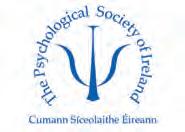
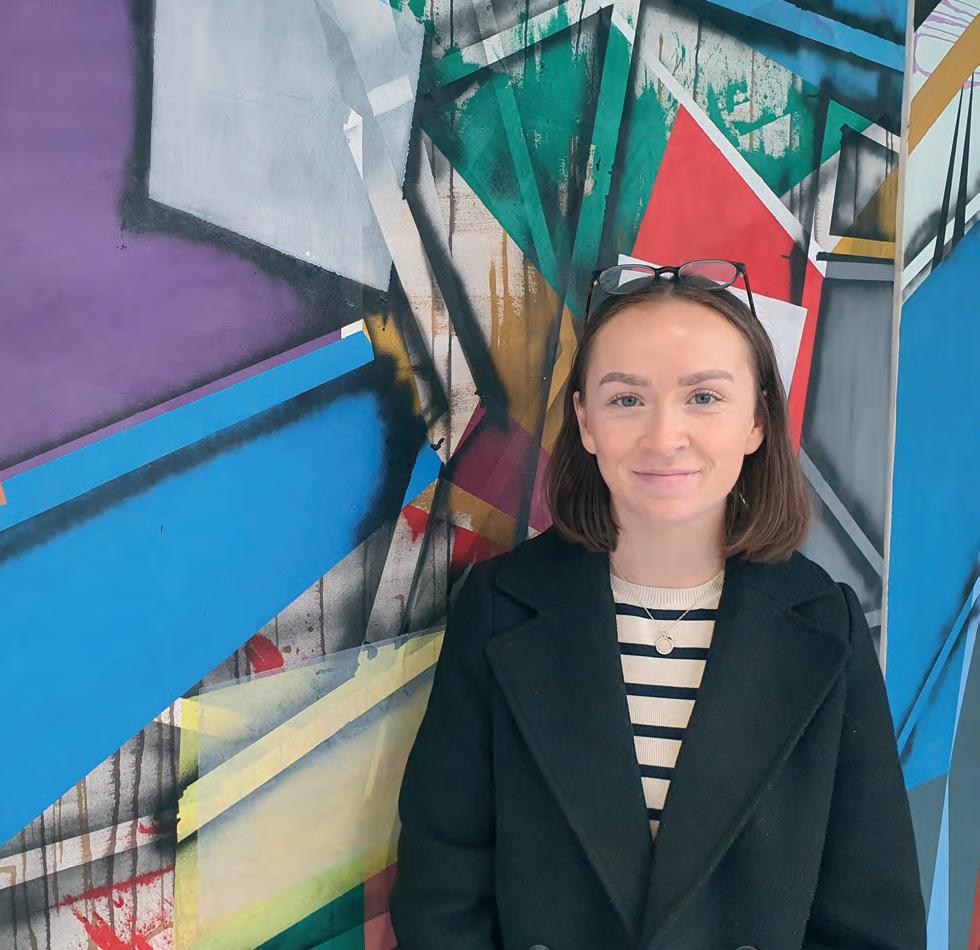
The variety of modules on the BA (Hons) in English and Psychology is brilliant. Both disciplines compliment each other superbly and there are lots of diverse opportunities for graduates. The choice to pursue English or psychology in the final year research project is also very beneficial. I chose psychology and this allowed me to gain a deeper understanding of an area of interest to me.
After graduating from English and Psychology, I completed a Master of Science in Applied Developmental Psychology at Queens University Belfast. Whilst studying my masters, I worked part-time as a Child Support Worker in Northern Ireland. I also volunteer as a Youth Advocate with Jigsaw Donegal.
This three-year honours degree, created in collaboration with industry experts, offers a blend of law and business studies. Students study a combination of law modules and business modules and explore the connections between these fields. Students also acquire information and computing technologies skills relevant to the commercial world. The programme equips students with transferable skills and knowledge that are highly sought after by a wide range of employers. Additionally, graduates have various pathways for further education open to them including the option to pursue a professional law qualification.
atu.ie/AU915
Year 1
• Skills for Success
• Organisational Behaviour
• Marketing
• Legal Systems
• Tort Law
• Company Secretarial
• ICT Applications
• Microeconomics
• Data Analytics
• Legal Skills
• Contract Law
• Criminal Justice
Year 2
300 (Level 8 2024)
3 Years Minimum Entry Requirements
30 Places
cao.sligo@atu.ie
Students on this programme split their modules evenly between law and business, with 50% dedicated to each strand. The law strand includes core subjects that provide a solid foundation for those aiming to continue their studies to qualify as a solicitor or barrister or pursue a legal career. The business strand covers essential business topics.
Throughout the programme, students analyse and evaluate business and legal issues faced by organisations. In Year 3, students have the opportunity to conduct research for an applied project or dissertation.
Guest speakers frequently visit from different legal and business backgrounds including various public bodies. Students also take part in a range of educational trips such as to local courts, the Central Criminal Court, the Four Courts, Dáil Éireann and Seanad Éireann. In addition, they engage in activities such as debates, mediations, mock trials and simulated EU meetings.
Graduates may pursue careers in law as a solicitor, in-house counsel or barrister (all requiring further studies). Other options include legal executive, alternative dispute resolution and court personnel. Business opportunities are vast and diverse, encompassing sectors such as banking, finance, insurance, human resource management and digital transformation. Additionally, there is a growing demand for expertise in areas such as governance and compliance, cybersecurity and data privacy. There is also an increasing need for professionals in sustainability, ethics and regulatory bodies.
Graduates may progress to a Level 9 masters or a Level 10 PhD across a range of subject areas. Graduates may apply to undertake the Professional Master of Education (PME) programme to become a secondary school teacher of Business.
Students analyse and evaluate business and associated legal issues encountered by organisations while developing important professional skills such as communication, legal research, academic writing, critical thinking, problem-solving, teamwork, negotiation and mediation. These practical skills are sought after by employers and equip graduates for employment and professional practice across a range of sectors.
• Management
• Introduction to Business Finance
• Web and Social Media Analytics
• Constitutional Law and Government
• Data Protection and Freedom of Information
• Legal Professional: Skills for Practice
• Human Resource Management
• Emerging Trends in Business Law
• Company Law
• Governance and Compliance
• European Union Law
Year 3
• Business Enterprise and Entrepreneurship
• Macroeconomics
• Quantitative Techniques and Reporting
• Research Methods with Law
• Commercial and Consumer Law
• Business Sustainability and Human Rights
• Strategic Management
• Digital Transformation
• Property Law
• Employment Law
• Dissertation or Applied Project
Approved degree to sit the final examination of the Law Society of Ireland - First Part FE-1.
Ireland, among other countries, continues to face many social challenges. A career in social care practice is challenging and uniquely rewarding, as graduates can make a real difference to people’s lives. Social care practice is a dynamic and continuously developing field that is now a professionally regulated career under CORU. Throughout this degree, students develop their critical thinking skills, have a greater understanding of human interaction, and how to respond in a professional and informed way to the needs of people who use support services.
Year 1
• Introductory Sociology
• Introduction to Lifespan Development
• Creative Practice for Social Care
• Social Care and Social Policy
• Interdisciplinary Care
• Research Based Study Skills
• Professional Practice
• Health, Safety and Wellbeing in Social Care Practice
• Communicative Practice in Social Care
• Introduction to law
300 (Level 8 2024)
4 Years Minimum Entry Requirements PLUS
• Garda Vetting
• Health Declaration
• Maths not required
70 Places
Work Placement
cao.sligo@atu.ie
Professional practice placement is an integral part of this programme where students complete two 13-week blocks in professional social care practice settings. Here, students are supported to apply and develop their skills and competencies in the field, thus emerging as confident, self-aware, experienced and professional social care practitioners. Our students regularly graduate with job prospects awaiting them because of their professional practice placement.
This degree has been approved by CORU as attesting to the standard of proficiency required for registration for Social Care Workers.
As a social care practitioner, qualifying under the professional regulator CORU, graduates are sought after by employers in a range of areas. Graduates work at the front line, as social care professionals, leaders, and managers in the public, private, community and voluntary sectors, with persons who require support. Employment opportunities are wide and include working with children and young people at risk, older persons, individuals with disabilities, community groups, those experiencing addictions, residential services and homeless services.
ATU offer a comprehensive suite of Level 9 and Level 10 postgraduate qualifications both on-campus and online to further develop and enhance the career prospects of our students. This includes our CORU approved MA in Social Work. Graduates may also progress to masters programmes in areas such as social care and social justice, social research practice, addiction studies, equality and counselling or a Level 10 PhD doctorate in research.
Our team of lecturers inspire students with their first-hand industry experience as social care workers and psychologists to name a few. Real-life experiences help bring the theory to life for our students. Roleplay is an active learning strategy within this degree and is used in teaching, learning and assessment opportunities. atu.ie/AU918
Year 2
• Social Care and Social Policy
• Creative Practice for Social Care
• Adult Mental Health: A Psychological Perspective
• Principles of Law
• Sociology: Making Sense of Society
• Professional Practice
• Practice Placement SCP
Year 3
• Child and Family Law
• Social Care and Social Policy
• Practice, Policy and Evidence
• Sociology: An intersectional approach
• Child and Adolescent Mental Health
• Professional Practice
• Social Care Practice Placement
Year 4
• Management and Leadership for the Social Care Sector
• Professional Practice
• Social Science Research Methods
• Welfare and Protection in Social Care
• Social Care PracticeBuilding Relationships and Resolving Conflict
• Ethics for Social Care
• Dissertation/Research Project
Additional elective modules are available throughout the programme.
Combining theory with professional practice, this applied degree supports graduates to become skilled, competent, ethical and reflective practitioners. The programme believes that every child is unique, has rights and agency, and is both a knowledge holder and creator. These features are fostered throughout the programme, focusing on students developing skills that will support, nurture, educate and care for the health and well-being of each child. Graduates have the skills to support the child’s life-long learning within education, the family, community and partnerships.
atu.ie/AU919
290 (Level 8 2024)
4 Years Minimum Entry Requirements PLUS
• Garda Vetting
• Health Declaration
• Maths not required
60 Places
Work Placement
Erasmus+
cao.sligo@atu.ie
ATU’s Sligo campus is one of just three higher education institutions in Ireland to offer a Bachelor of Education in Early Education and Care, as opposed to a Bachelor of Arts more commonly found. Students undertake a four-week placement in Year 1 and a 13-week placement in both Year 2 and Year 3. Students can also take part in Erasmus+ Blended Intensive Programmes. These are brief modules designed with our partner universities in Germany, Finland and Estonia. Students complete online learning sessions and a five-day trip to a host university.
This programme is approved by the Qualifications Advisory Board as meeting the requirements of
the Professional Award Criteria and Guidelines standards.
Graduates can pursue a range of professional career opportunities including working in early childhood settings such as crèches, nurseries, playgroups, pre-schools and primary schools. Graduates can also pursue employment in community development roles, county childcare committees, Tusla the Child and Family Agency, community-based family support programmes as well as in specialist areas such as additional needs services.
Graduates can pursue a wide range of Level 9 and Level 10 postgraduate programmes in ATU or other higher education institutions. For example, students may apply to progress to the MA in Leadership and Advocacy in the Early Years or postgraduate awards in primary education or community development. Graduates have continued their studies and are working as primary school teachers and speech and language therapists. Graduates may also undertake postgraduate study in psychology, disability studies, childhood studies and play therapy.
A digital badge is embedded in this degree. This allows graduates to work in a world of technology based on the principles of the Universal Design for Learning (UDL).
The modern facilities on the Sligo campus allow students to benefit from a state-of-the art early years skills laboratory, outdoor learning spaces and two creative practice spaces.
• Sociology and Childhood
• Nurturing Creativity and Playfulness
• Children’s Play and Pedagogy
• Relational, Nurturing and Caring Pedagogy
• Inclusive Practice: Intercultural Learning
• Early Years Language, Literacy and Numeracy
• Child Development
• Quality in Irish ECEC
• Children’s Health, Safety and Wellbeing
• Curriculum Planning, Assessment and Documentation
• STEAM
Year 2
• Early Childhood Law
• Curriculum Planning, Assessment and Documentation
• Promoting Healthy Nutrition and Physical Activity in ELC Settings
• Repositioning Childhoods
• Child Development
• STEAM
• ECEC Practice Placement
Year 3
• Professional Leadership and Advocacy
• Pedagogical Approaches and Practices of Early Childhood
• Outdoor and Nature-Based Early Childhood Education and Care
• Inclusive Practice 2: Disability, Policy and Design
• Social Policy of Early Childhood
• Child Welfare and Protection
• ECEC Practice Placement
Year 4
• Philosophy and Early Learning and Care
• Childhood 3: Multiple Childhoods
• Curriculum and Pedagogy
• The Emerging Early Childhood Educator
• Child-Centred Practitioner Research
• Working in Partnership in the Early Learning and Care Sector
• Professional Management
• Implementing Early Learning and Care Policy in Practice
• Supporting Transitions in the Early Years
• Capstone Project

From researching many degrees, I found that Early Education and Care in Sligo would provide me with a strong understanding of different aspects of the early years sector. I knew this would ensure immediate career opportunities or allow me to pursue various further study options. I really enjoyed my work placements as I got to apply the theory from class to real-world scenarios.
After graduating, I completed further study to become a fully qualified Primary School Teacher in Ireland. I also completed ATU’s MA in Leadership and Advocacy in the Early Years whilst continuing to teach. This ultimately led to me to setting up my own business, Maia Purposeful Play, which facilitates child-led play classes and workshops to enhance children’s holistic development.
• Robotics and Automation
• Civil Engineering
• Mechanical Engineering
This general engineering year equips students with the fundamentals of engineering and gives them exposure to all the different types of engineering that are on offer in Sligo. This helps students to make an informed choice as to which field of engineering to enter based on their aptitude and interest. On successful completion of Year 1, students will transfer into Year 2 of the programme of their choice. Students can choose one of the following options: Robotics and Automation, Civil Engineering or Mechanical Engineering.
atu.ie/AU940
4 Years Minimum Entry Requirements PLUS
• Min H5 in Maths 413 (Level 8 2024)
64 Places
Work Placement
Erasmus+
cao.sligo@atu.ie
This programme offers students an introduction to a wide range of engineering disciplines. Our suite of Level 8 degrees in Robotics and Automation, Civil Engineering and Mechanical Engineering all share common first year modules. This allows students the opportunity to study aspects of each before making an informed decision on which discipline to specialise in. From Year 2, students engage in more detailed applications of the fundamentals of engineering in their chosen field.
Our engineering graduates are in high demand to meet the skills shortage across the sector both nationally and internationally. The career opportunities vary for graduates depending on which stream of engineering they choose to specialise in. From the high-tech pharmaceutical and electronics sectors to traditional manufacturing with design, fabrication and assembly; or the design, construction and maintenance of the built environment that is essential to our society, graduates pursue a wide variety of career paths. They work as design and project engineers or in consultancy and management, to name a few.
We offer a comprehensive suite of Level 9 and Level 10 postgraduate qualifications both on campus and online to further develop and enhance the career prospects of our students. These include our MEng in Road and Transport Engineering, MSc in Quality, MEng in Connected and Autonomous Vehicles and MSc in Computing (Data Science).
• Introduction to Engineering
• Engineering Mechanics
• Engineering Graphics and CAD
• Engineering Physics
• Mathematics
• Engineering Chemistry
• Electrical Principles Engineering
• Introduction to Programming
• Multi-Disciplinary Project
• Introduction to Professional Engineering
Students undertake a 12-week work placement in Semester 2 of Year 3. This allows them to put all the skills from their studies into a real work experience. This can help to reinforce career path choices. It can also highlight new career opportunities or fuel a desire to progress into postgraduate studies.
Engineering student projects are presented at The Sligo Engineering and Technology Expo. A range of companies attend the expo, including Fortune 500 industry leaders. This allows students to network with potential employers.
Accreditation from Engineers Ireland for Chartered Engineer is expected after the first cohort of graduates. Accreditation for our honours degree in Civil Engineering is already in place.
Robotics and Automation*
Year 2
• Control Systems
• Analog Electronics
• Advanced Automation Technology
• Introduction to Engineering Material
• Industrial Data Communication
• Digital Electronics
• Introduction to Robotics
• Pneumatic and Hydraulic Systems
• Mathematics
Year 3
• Work Placement
• Control Systems Analysis and Design
• Energy Operations and Utilities Management
• Image Processing
• Power Electronics and Drives
• Six Sigma 2 Statistical Control
• Mathematics
• Supervisory Control and Data Acquisition
Year 4
• Final Year Project
• Advanced Robotics
• Industrial Networks
• AV Sensor Systems
• Renewable Energy Systems
• Control Systems Analysis and Design
• Deep Learning for Computer Vision
• Computer Vision
• Finance for Engineers
• Research Methods
Civil Engineering
Year 2
• Civil Engineering Materials
• Structural Mechanics
• Hydraulics
• Environmental Engineering
• Surveying
• Site Management
• Structural Mechanics
• Soil Mechanics and Geology
• Mathematics
Year 3
• Environmental Engineering
• Geotechnical Engineering
• Hydraulics
• Structural Mechanics
• Structural Design
• Highway Engineering
• Statistics and Numerical Methods
• Structural Analysis
• Work Placement
Year 4
• Final Year Project
• Transportation Engineering
• Civil Engineering Law
• Project Management and Finance
• Environmental Engineering
• Geotechnical Engineering
• Structural Analysis
• Structural Design
• Highway Engineering
• Hydraulics
* Please note that Robotics and Automation is not available for selection on the CAO but students may choose to study this degree from Year 2 onwards.
Mechanical Engineering
Year 2
• Engineering Dynamics
• Manufacturing Processes
• Design Engineering Project
• Control Systems
• Energy Systems
• Pneumatic and Hydraulic Systems
• Automation Programming
• Mathematics
• Design Engineering Project
• Introduction to Engineering Materials
• Mechanics for Mechanical Engineers
Year 3
• Work Placement
• Applied Mechanics
• Energy Systems
• Dynamic Modelling and Simulation
• Materials and Processes
• Computer Aided Engineering
• Energy Operations and Utilities Management
• Essential Lean Six Sigma and Validation
Year 4
• Final Year Project
• Industry 4.0
• Mechanical Design
• Advanced Technology and Innovation
• Renewable Energy Systems
• Statistical and Numerical Methods
• Energy Systems
• Computer Vision
• Finance for Engineers
• Research Methods
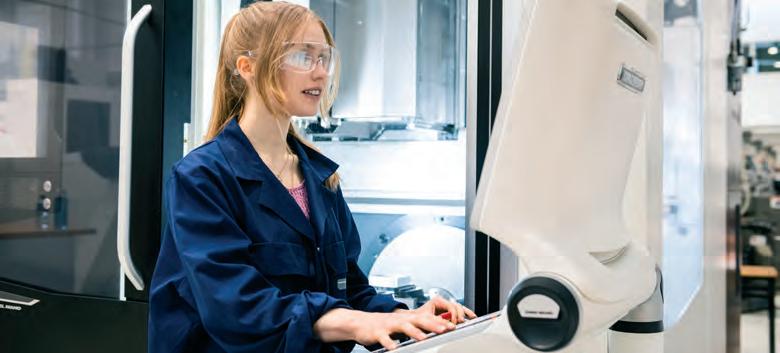
• Precision Engineering and Design
• Mechatronic Engineering
• Civil Engineering
• Mechanical Engineering
This general engineering programme gives students exposure to different types of engineering and equips them with the fundamentals of engineering. This helps students to make an informed choice of what field of engineering to enter based on their aptitude and interest. On successful completion of Semester 1, students transfer into Semester 2 of the specialism of their choice. Students can choose one of the following options: Precision Engineering and Design, Mechatronic Engineering, Civil Engineering or Mechanical Engineering.
atu.ie/AU830
3 Years
270 (Level 7 2024)
Minimum Entry Requirements PLUS
• O6/H7 Maths
32 Places
cao.sligo@atu.ie
Students are introduced to a wide range of engineering disciplines. Our suite of programmes in Precision Engineering and Design, Mechatronic Engineering, Civil Engineering and Mechanical Engineering all share common modules in Semester 1. This gives students the opportunity to study engineering in a general way before specialising in an area of their choice. No matter which engineering programme a student comes to Sligo to study, they will have the flexibility to change their specialism at the end of Semester 1 if they wish.
Our engineering graduates are in high demand to meet the skills shortage across the sector both nationally and internationally. The career opportunities vary for graduates depending on which stream of engineering they choose to follow. Engineering has a very diverse application in both the private and public sector. This ranges from the design and construction of buildings, bridges and roads to working with innovative technology within the aerospace and automotive industries, as well as taking lead roles in the manufacturing and medical device sector.
Level 6 graduates may progress to the final year of the ordinary degree in their chosen field. Level 7 graduates may progress to an honours degree after which we offer a wide range of Level 9 and Level 10 postgraduate programmes.
Year 1 Semester 1
• Introduction to Engineering
• Engineering Mechanics
• Introduction to Programming
• Engineering Physics
• Engineering Graphics and CAD
• Mathematics Precision Engineering and Design*
Year 1 Semester 2
• Design
• Mechanical Project
• Electrical Principles Engineering
• Manufacturing and Engineering Technology
• Introduction to Industrial Automation
• Mathematics
• Design Engineering Project
• CIM and Automation Technology
• Mechanics
• Manufacturing and Engineering Technology
• CAD/CAM
• Introduction to Engineering Materials
• Integrated Project
• Mathematics
• Thermodynamics and Fluid Mechanics Introduction
• Computer Aided Design
• Computer Aided Manufacture
• Material Testing and Metrology
• CIM and Robotics
• Mechanics/Dynamics
• Essential Lean Six Sigma and Validation
• Machine Design
• Mould Design and Polymer Processing
• Mathematics
• Integrated Project
* Please note that Precision Engineering and Design is not available for selection on the CAO but students may choose to study this degree from Semester 2 onwards.
Mechatronic Engineering
Year 1 Semester 2
• Electrical Principles Engineering
• Mathematics
• Electromechanical Technology
• Engineering Chemistry
• Circuit Simulation and Layout
• Design
Year 2
• Electrical Technology
• Instrumentation and Control
• Creativity, Innovation and Entrepreneurship
• Automation Programming
• Pneumatic and Hydraulic Systems
• Electrical Signals Systems and Technology
• Programming and Interfacing
• Introduction to Engineering Materials
• Mechanics
• Mathematics
Year 3
• Control Systems
• Introduction to Robotics
• Supervisory Control and Data Acquisition
• Industrial Data Communication
• Mechatronics Project 300
• Advanced Automation Technology
• Essential Lean Six Sigma and Validation
• Professional Development and Employability
• Mathematics
Civil Engineering
Year 1 Semester 2
• Building Information Modelling
• Construction Technology
• Engineering Chemistry
• Human Relations and Personal Development
• Mathematics
• Engineering Mechanics
Year 2
• Civil Engineering Materials
• Structural Mechanics
• Hydraulics
• Environmental Engineering
• Surveying
• Site Management
• Structural Mechanics
• Soil Mechanics and Geology
• Mathematics
• Water Treatment
• Structural Design
Year 3
• Environmental Engineering
• Geotechnical Engineering
• Hydraulics
• Highway Engineering
• Mathematics
• Structures
• Project
• Water Treatment
Mechanical Engineering
Year 1 Semester 2
• Electrical Principles Engineering
• Mathematics
• Mechanical Project
• Manufacturing and Engineering Technology
• Introduction to Industrial Automation
• Design
Year 2
• Thermodynamics and Fluid Mechanics
• CAD/CAM
• Manufacturing and Engineering Technology
• Design Engineering Project
• CIM and Automation Technology
• Mechanics
• Introduction to Engineering Materials
• Mathematics
Year 3
• Mathematics
• Thermodynamics and Fluid Mechanics
• Machine Design
• CIM and Robotics
• Mechanics/Dynamics
• Computer Aided Design
• Essential Lean Six Sigma and Validation
• Control Systems
• Materials Testing and Metrology
• Integrated Project
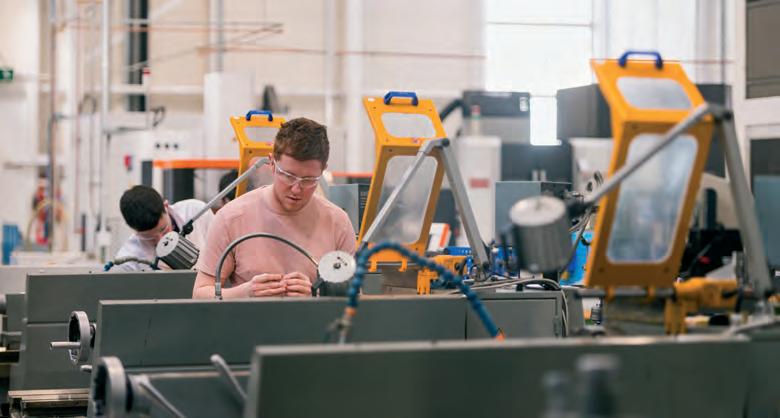
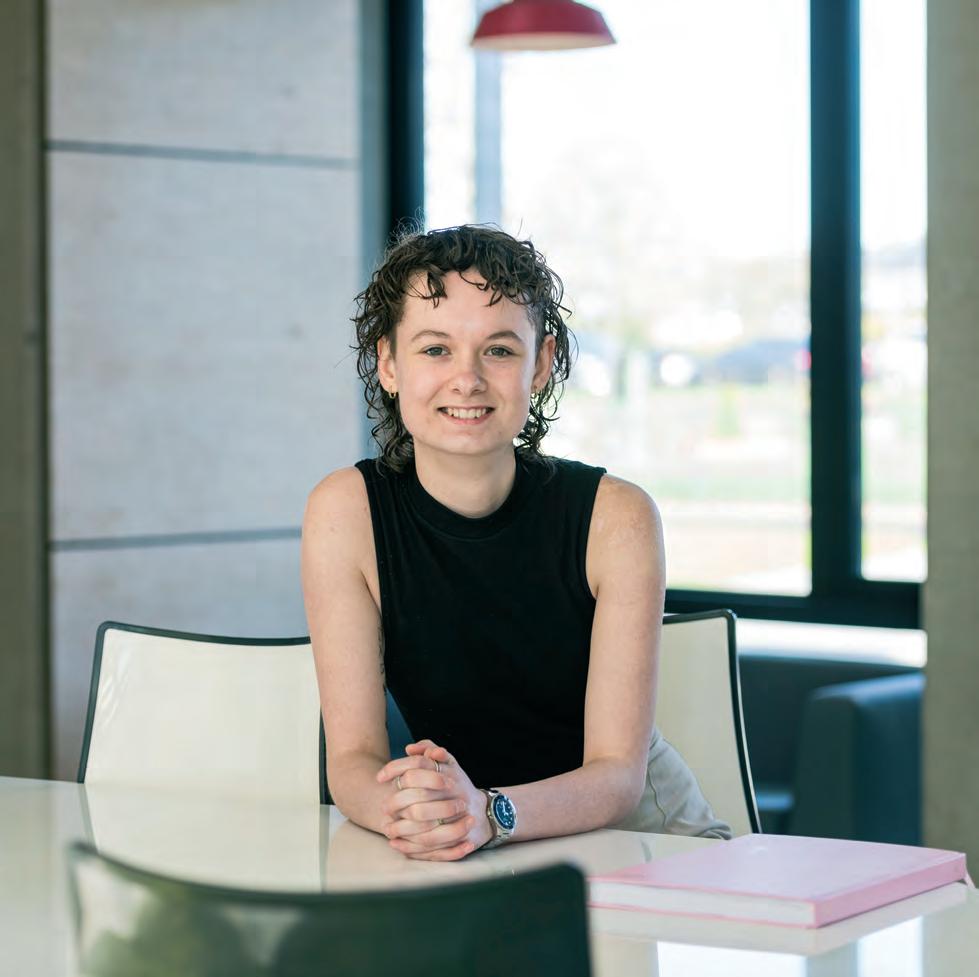
I love a challenge and growing up I really enjoyed maths, robots and Formula 1. When it came to choosing what degree to study, engineering was the perfect option for me. I also knew that choosing to study engineering in ATU Sligo would allow me to figure out what area suited me best. The common entry aspect to this engineering degree is so beneficial.
I really enjoy the hands-on approach to this degree. There is a big focus on practical learning which reinforces the theory learnt in lectures. We were working in the state-of the-art engineering labs within the first week. At the end of Year 1, I chose to specialise in Robotics and Automation.
Mechatronics is the combination of mechanical, electronic, robotic and software engineering systems used in modern manufacturing industries. Mechatronic engineers are problem solvers by nature, looking for solutions to sometimes difficult engineering applications. During their studies, students learn how to design, build and control the machines and processes that are found in a wide range of sectors. Graduates have the interdisciplinary approach necessary to integrate electronics, control, software and mechanical engineering.
atu.ie/AU831
252 (Level 7 2024)
3 Years Minimum Entry Requirements PLUS
• O6/H7 Maths
32 Places cao.sligo@atu.ie
Mechatronics is how high-tech manufacturing is carried out today and is becoming one of the fastest growing career areas. This programme offers an applied and practical-based approach with content that develops industry relevant and sought after skills. We have designed this degree to address the needs of industry by supplying skilled technicians who have developed a diverse set of skills in machine design, sensor technology, control systems, computing and industrial networks.
All our Level 7 engineering programmes have a common first semester. This gives students an understanding of all aspects of engineering and the flexibility to change direction in Semester 2 if desired.
Our engineering graduates are in high demand to meet the skills shortage across the mechatronic and automation sector both nationally and internationally. Graduates work in a wide range of industrial settings including the biomedical, pharmaceutical, electronics, food processing and manufacturing sectors. This degree also includes professional accreditation from Engineers Ireland. This is an internationally recognised accreditation which means graduates have worldwide employment opportunities.
Graduates may progress to the Level 8 BEng (Hons) in Mechatronic Engineering or the BEng (Hons) in Robotics and Automation in ATU. Level 8 graduates can pursue a wide range of Level 9 and Level 10 postgraduate programmes in ATU or other higher education institutions.
Engineering student projects are presented at The Sligo Engineering and Technology Expo. A range of companies attend the expo, including Fortune 500 industry leaders. This allows students to network with potential employers.
Year 1
• Introduction to Engineering
• Engineering Mechanics
• Introduction to Programming
• Engineering Physics
• Engineering Graphics and CAD
• Mathematics
• Electrical Principles Engineering
• Electromechanical Technology
• Engineering Chemistry
• Circuit Simulation and Layout
• Design
2
• Electrical Technology
• Instrumentation and Control
• Creativity, Innovation and Entrepreneurship
• Automation Programming
• Pneumatic and Hydraulic Systems
• Electrical Signals Systems and Technology
• Programming and Interfacing
• Introduction to Engineering Materials
• Mechanics
Year 3
• Control Systems
• Introduction to Robotics
• Supervisory Control and Data Acquisition
• Industrial Data Communication
• Mechatronics Project 300
• Advanced Automation Technology
• Essential Lean Six Sigma and Validation
• Professional Development and Employability
• Mathematics
Mechatronic Engineering students benefit from an annual exchange programme with Kempten University of Applied Sciences in Germany. Our students and lecturers get to spend one week at the German university, and through a range of workshops and lectures, gain valuable knowledge from Kempten’s faculty.
This is a modern degree that prepares graduates for a broad range of career choices in the fields of mechanical and manufacturing engineering. Through a combination of theory, practicals and workshops, students gain up to date knowledge of engineering principles and learn how to apply these to solve real-world problems. We teach the essential elements of the design process and methodologies relevant to complex engineering.
atu.ie/AU943
4 Years Minimum Entry Requirements PLUS
• Min H5 in Maths 413 (Level 8 2024)
16 Places
Work Placement
Erasmus+
cao.sligo@atu.ie
Topics such as finance and Industry 4.0 allow students to explore the various paths offered to engineers, and to be ready for the digitalisation of the engineering sector. Students are also asked to consider issues such as ethics and sustainability by exploring the responsibilities of the engineering profession towards people and the environment. Industry-based projects are integral to this degree. Students solve realworld problems whilst enhancing their ability to work effectively as an individual, in a team and in multidisciplinary settings.
There is a common first year across all our Level 8 engineering degrees. This gives students an understanding of all aspects of engineering and the flexibility to change direction in Year 2 if desired.
Graduates have expert knowledge in mechanics, thermodynamics, fluid mechanics, material sciences, electronics, automation, information technology and computer-aided engineering.
Graduates work in a range of industries as a mechanical engineer, manufacturing engineer, design engineer, product designer, materials engineer and more. Graduates also have the necessary key skills to progress to managerial or research and development roles.
Graduates may pursue a postgraduate qualification by either a taught or research masters, or a PhD by research. There are several postgraduate programmes available in ATU. Graduates may also pursue postgraduate studies at other higher education institutions.
Students complete a work placement between January and September in Year 3, which includes the opportunity to apply to study for one semester in Germany.
Engineering student projects are presented at The Sligo Engineering and Technology Expo. A range of companies attend the expo, including Fortune 500 industry leaders. This allows students to network with potential employers.
Accreditation from Engineers Ireland for Chartered Engineer is expected after the first cohort of graduates.
Year 1
• Introduction to Engineering
• Engineering Mechanics
• Engineering Graphics and CAD
• Engineering Physics
• Mathematics
• Engineering Chemistry
• Electrical Principles Engineering
• Introduction to Programming
• Multi-Disciplinary Project
• Introduction to Professional Engineering
Year 2
• Engineering Dynamics
• Manufacturing Processes
• Design Engineering Project
• Control Systems
• Energy Systems
• Pneumatic and Hydraulic Systems
• Automation Programming
• Mathematics
• Design Engineering Project
• Introduction to Engineering Materials
• Mechanics for Mechanical Engineers
Year 3
• Work Placement
• Applied Mechanics
• Energy Systems
• Dynamic Modelling and Simulation
• Materials and Processes
• Computer Aided Engineering
• Energy Operations and Utilities Management
• Essential Lean Six Sigma and Validation
Year 4
• Final Year Project
• Industry 4.0
• Mechanical Design
• Advanced Technology and Innovation
• Renewable Energy Systems
• Statistical and Numerical methods
• Energy Systems
• Computer Vision
• Finance for Engineers
This programme enables students to understand and apply the principles of mathematics, science, physics and the various mechanical engineering technologies, as well as practicing design processes and techniques. Students have access to state-of-the-art facilities, including comprehensive material and testing laboratories, industry standard software in CAD/ CAM, automation equipment, traditional manufacturing workshops, 3D printers and advanced CNC machines.
atu.ie/AU833
260 (Level 7 2024)
3 Years Minimum Entry Requirements PLUS
• O6/H7 Maths
16 Places
cao.sligo@atu.ie
Students undertake a major design and group build project in Year 3. Previous group projects have included the design, building and testing of automated pick-andplace assembly machines, wind turbines, hovercrafts, compactors, dune buggies, and special purpose machines such as a willow harvester, oyster-shell crusher and a grading machine for mussels. Students also undertake company visits and receive guest lectures from industry speakers.
Our students have won several national competitions with their final year projects, notably with Engineers Ireland and at the National Ploughing Championships. Engineering student projects are also presented at The Sligo Engineering and Technology Expo. A range of companies attend the expo, including Fortune 500 industry leaders.
Our graduates are in high demand to meet the skills shortage across the sector both nationally and internationally. With a strong emphasis on design in our degree, graduates secure positions as design engineers in automation, medical device, aerospace and other manufacturing industries. Graduates work as technicians, technologists and associate engineers in production planning, engineering management, maintenance, quality, calibration, validation, energy utilisation and project management. This degree also includes professional accreditation from Engineers Ireland which means graduates have worldwide employment opportunities.
Graduates may progress to the BEng (Hons) in Mechanical Engineering or the BEng (Hons) in Precision Engineering and Design in ATU. Level 8 graduates can pursue a wide range of Level 9 and 10 postgraduate programmes in ATU or in other higher education institutions.
All our Level 7 engineering programmes have a common first semester. This gives students an understanding of all aspects of engineering and the flexibility to change direction in Semester 2 if desired.
Year 1
• Introduction to Engineering
• Engineering Mechanics
• Introduction to Programming
• Engineering Physics
• Engineering Graphics and CAD
• Mathematics
• Electrical Principles Engineering
• Mechanical Project
• Manufacturing and Engineering Technology
• Introduction to Industrial Automation
• Design
Year 2
• Thermodynamics and Fluid Mechanics
• CAD/CAM
• Manufacturing and Engineering Technology
• Design Engineering Project
• CIM and Automation Technology
• Mechanics
• Introduction to Engineering Materials
• Mathematics
Year 3
• Mathematics
• Thermodynamics and Fluid Mechanics
• Machine Design
• CIM and Robotics
• Mechanics/Dynamics
• Computer Aided Design
• Essential Lean Six Sigma and Validation
• Control Systems
• Materials Testing and Metrology
• Integrated Project
Following completion of Year 2, students may join the BEng in Precision Engineering and Design programme which concentrates on the design of precision plastic and metal products, mould and die design, together with all the related manufacturing, polymer processing, metrology and validation technologies.
Ciara Walsh
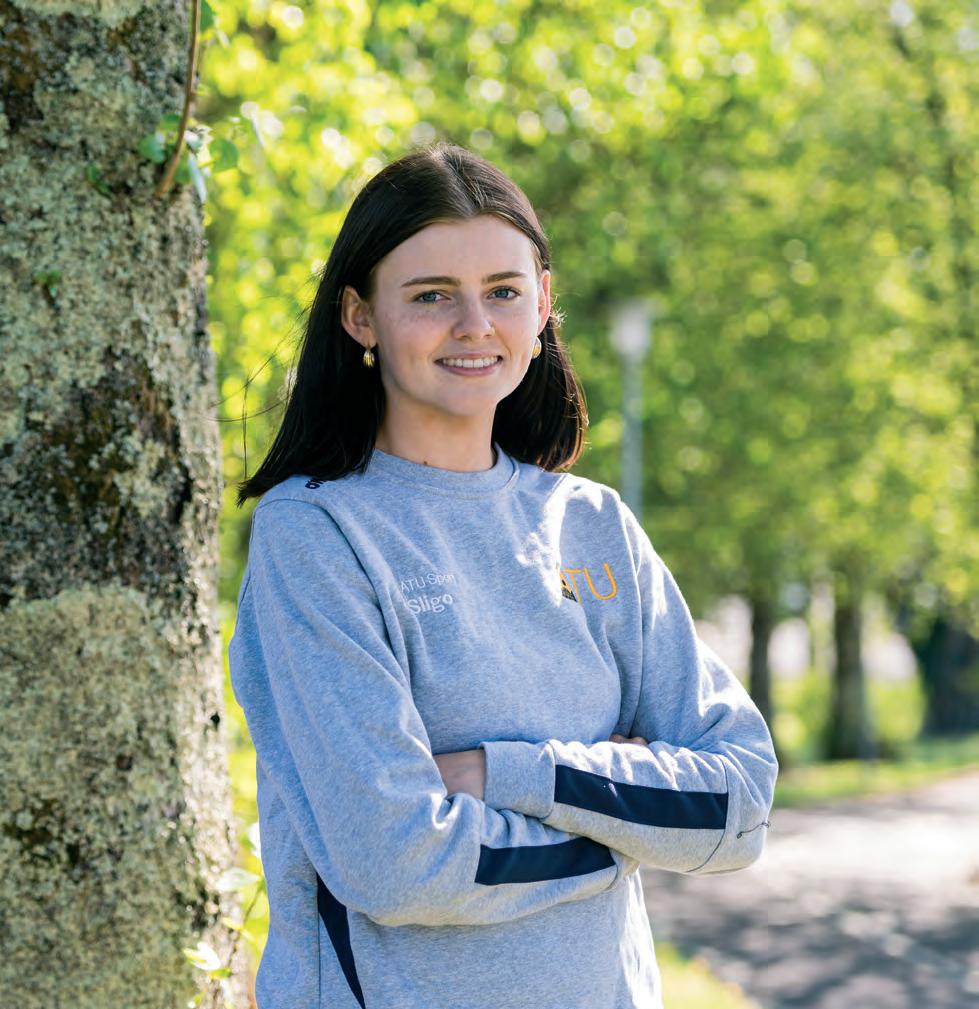
I am a creative person with a keen interest in maths. I really enjoyed studying construction in secondary school which helped influence my decision to study Civil Engineering in university. I really enjoy the hands-on learning approach to this degree. There are so many group projects that allow you to experience practical learning. Theory learnt in class is also reinforced with practical learning.
I loved the opportunity to study different engineering disciplines throughout Year 1. This is so important as it ensures you choose the right specialism. The class sizes in ATU are also excellent. It is easy to ask questions and get extra support if needed. The lecturers are always very helpful.
AU944 | Level 8 | Bachelor of Engineering (Honours)
AU835 | Level 7 | Bachelor of Engineering
Civil engineering deals with the design, construction and maintenance of the built environment that is essential to our society. A civil engineer’s work involves solving complex problems in several different engineering areas including environmental, geotechnical, structural, transportation and construction. This includes roads, tunnels, bridges, buildings, offshore oil-platforms, water supply systems, wastewater treatment systems, dams and sustainable energy schemes such as hydroelectric stations and wind farms.
atu.ie/AU944
atu.ie/AU835
3/4 Years
418 (Level 8 2024)
289 (Level 7 2024)
Minimum Entry Requirements PLUS
• Min H5 in Maths for the Level 8 degree
• O6/H7 Maths for the Level 7 degree
32 Places
Work Placement
cao.sligo@atu.ie
Level 8 students complete a 12week work placement in Year 3. This provides practical work experience in the civil engineering industry, with a wide range of employers to choose from. Our degrees are a blend of formal lectures, real-life projects and relevant practical classes to enhance the understanding of topics. Reallife multi-disciplinary projects give students experience of working with professionals in other construction related areas. These include architects, quantity surveyors and construction project managers.
A female student network on the Sligo Campus supports women settling into engineering and construction programmes.
Ireland, together with the rest of the world, is experiencing a shortage of civil engineering graduates to work in all areas of the civil engineering and construction industries.
Graduate careers include professional civil engineers in the research, design, management, supervision, construction and maintenance of civil engineering projects for local authorities, government agencies, engineering contractors and consultants. Our degrees also include professional accreditation from Engineers Ireland. This is an internationally recognised accreditation which means graduates have worldwide employment opportunities.
Level 7 graduates may exit after three years with a BEng in Civil Engineering or progress to Year 3 of our BEng (Hons) in Civil Engineering and continue their studies to achieve a Level 8 degree. Level 8 graduates may progress to taught and research masters in ATU or other higher education institutions.
Site visits are an important element of these degrees as they allow students to see how the theory learnt in class is applied in real-life practical settings. Engineering student projects are presented at The Sligo Engineering and Technology Expo. A range of companies attend the expo, including Fortune 500 industry leaders.
Year 1
• Introduction to Engineering
• Engineering Mechanics
• Engineering Graphics and CAD
• Engineering Physics
• Mathematics
• Engineering Chemistry
• Electrical Principles Engineering
• Introduction to Programming
• Multi-Disciplinary Project (Level 8)
• Building Information Modelling (Level 7)
• Construction Technology (Level 7)
• Human Relations and Personal Development (Level 7)
Year 2
• Civil Engineering Materials
• Structural Mechanics
• Hydraulics
• Environmental Engineering
• Surveying
• Site Management
• Structural Mechanics
• Soil Mechanics and Geology
• Mathematics
• Water Treatment (Level 7)
• Structural Design (Level 7)
Year 3
• Environmental Engineering
• Geotechnical Engineering
• Hydraulics
• Structural Mechanics
• Structural Design
• Highway Engineering
• Mathematics
• Structural Analysis
• Work Placement (Level 8)
• Project (Level 7)
• Water Treatment (Level 7)
Year 4 (Level 8)
• Final Year Project
• Transportation Engineering
• Civil Engineering Law
• Project Management and Finance
• Environmental Engineering
• Geotechnical Engineering
• Structural Analysis
• Structural Design
• Highway Engineering
• Hydraulics
AU945 | Level 8 | Bachelor of Science (Honours)
AU836 | Level 7 | Bachelor of Science
This degree prepares students for the specialised discipline of quantity surveying and offers graduates a broad skills base. A quantity surveyor has the responsibility of controlling project costs and are central to the decisionmaking process throughout the development of a construction project from initial inception to final completion. We work very closely with employers, practitioners and professional organisations to ensure that our degrees reflect the current and future needs of the workplace.
atu.ie/AU945
atu.ie/AU836
3/4 Years
346 (Level 8 2024)
224 (Level 7 2024)
Minimum Entry Requirements PLUS
• O6/H7 Maths
32 Places
Work Placement
Erasmus+
cao.sligo@atu.ie
Our syllabus covers a range of professional skills including communication, ethics, construction law, property development and commercial management. In Year 3, students undertake a work placement for a minimum of three months and gain valuable real-world experience. In Year 4, students complete a practical capstone project, whereby a cost planning and value engineering exercise is carried out on a commercial building.
From planning skyscrapers and stadiums to creating film sets and festival sites, quantity surveyors work on a wide variety of projects. The £1 billion Tottenham Hotspur stadium project was led by a quantity surveyor.
Graduates are qualified for careers in quantity surveying consultancy, contracting organisations, specialist sub-contracting firms and elsewhere within the industry. A 2023 Society of Chartered Surveyors Ireland (SCSI) report stated that the national median salary for quantity surveyors was over €77,000. Recent findings also highlight that there is a substantial deficit of surveyors in the construction and property industry to meet the predicted future demand for the construction sector in Ireland.
Level 7 graduates may exit after three years with a BEng in Quantity Surveying or progress to the final year of a Level 8 BSc (Hons) in Quantity Surveying. Level 8 graduates may progress to ATU’s Level 9 Certificate in Mechanical and Electrical Quantity Surveying, MSc in Construction Project Management or to postgraduate studies in other higher education institutions.
Students may exit after Year 2 with a Higher Certificate in Construction Economics.
Professional Accreditation
Level 8

Level 7 and Level 8

Year 1
• Principles of Construction
• Quantity Surveying Measurement
• QS in the Construction Industry
• ICT in Quantity Surveying
• Domestic Construction Technology
• Measurement of Small Domestic Buildings
• Site Management and Health and Safety
• Organisation and Management
• Quantity Surveying Software
2
• Complex Domestic Construction Technology
• Measurement of Domestic Buildings
• Estimating
• Construction Contracts and Procurement
• Principles of Law
• Economics
• M&E Construction Technology
• Construction Contract and Tendering
• Professional Practice within the Built Environment
• Construction Economics
• Construction Law
• Measurement of Mechanical and Electrical Installations (Level 7 )
• Work Placement or Project
• Industrial Buildings –Construction Technology
• Measurement of Industrial and Commercial Buildings
• Cost Planning
• Private Sector Standard Form of Construction Contracts
• Programming and Planning Theory
• Cost Control
• Commercial Buildings –Construction Technology
• Construction Programme Software
• QS Dispute Management (Level 7)
Year 4 (Level 8)
• Measurement of Complex Structures
• Property Development & Economics
• Capital Works Framework
• BIM for Quantity Surveyors
• Measurement of Civil Engineering Works
• Commercial Management
• Public Works Contract
• Dissertation
• Capstone Project
This programme has been designed in partnership with industry to meet the needs of the green economy, which is a major area of employment within the Irish and international economies. The programme equips students with practical carpentry and joinery skills and an in-depth knowledge of sustainable building technologies and materials, including the refurbishment of existing dwellings to achieve a low-carbon design and the construction of new lowenergy buildings.
atu.ie/AU837
Year 1
• Applied Construction Technology
• Principles of Construction
• Graphical Communication and CAD
• Surveying 1
• Interpersonal Transferable Skills
• Applied Construction Technology
• Domestic Construction Technology
• Graphical Communication and CAD
• Surveying 2
• Information and Communication Technology
Year 2
• Applied Construction Technology with Advanced Manufacturing
225 (Level 7 2024)
3 Years Minimum Entry Requirements
32 Places
Work Placement
cao.sligo@atu.ie
We ensure we stay ahead of the latest advancements in construction through regular contact with industry experts. As well as getting hands-on experience, students also use the latest design software in our purpose-built, highly equipped workshops. Throughout the degree, real-life practical projects are used to reinforce the theory, culminating with a major practical project. Students also complete a work placement in Year 3. This is a great opportunity to put all the skills they have developed into a real-world work experience.
A female student network has been established to help the growing number of female students settle into higher education. This peer group operates within the civil engineering and construction programmes on the Sligo campus.
Graduates are prepared for employment with building contracting organisations, architects, quantity surveyors and local authorities in areas such as retrofitting existing building stock, BER certification, preparation of working drawings and specifications, surveying and site setting out, building surveying, defect analysis and construction planning.
Graduates may progress to the final year of the Level 8 BSc (Hons) in Construction Project Management and Applied Technology or the BSc (Hons) in Construction Project Management add-on on the Sligo campus, or to other related programmes. Level 8 graduates may progress to postgraduate studies in ATU or other higher education institutions.
This programme has a strong focus towards sustainable construction practices. Graduates are ideally placed to take advantage of the growing opportunities in the construction sector nationally and internationally. Our construction graduates are highly sought after as our construction programmes have a strong reputation within industry.
Students may exit after Year 2 with a Higher Certificate in Applied Construction Technology.
• Complex Domestic Construction Technology
• Project Design and Management
• BIM Fundamentals
• Construction Measurement and Management
• Applied Construction Technology with Advanced Manufacturing
• M&E Construction Technology
• ICT for Construction
• BIM Advanced
• Health and Safety Management 1
Year 3
• Applied Construction Management
• Industrial Buildings – Construction Technology
• Building Analysis and Adaptation
• Health and Safety Management
• BIM MEP
• Applied Construction Management
• Commercial BuildingsConstruction Technology
• Construction Planning and Management
• BIM Collaboration
• Work Placement

This degree blends traditional practical skills including carpentry and joinery with modern construction approaches such as Building Information Modelling (BIM) and Lean Construction. Construction project management is a professional field in very high demand. It focuses on each part of the construction process of any built environment. Students learn how to plan, organise and control construction operations and gain knowledge in all stages of the process; from initial feasibility studies through to design, construction, maintenance, refurbishment and demolition.
atu.ie/AU946
Year 1
• Applied Construction Technology
• Principles of Construction
• Graphical Communication and CAD
• Interpersonal Transferable Skills
• Domestic Construction Technology
• Surveying
• Information and Communication Technology
Year 2
• Complex Domestic Construction Technology
• Construction Technology with Advanced Manufacturing
• BIM Fundamentals
• Construction Measurement and Management
301 (Level 8 2024)
4 Years Minimum Entry Requirements
32 Places
Work Placement
cao.sligo@atu.ie
This degree integrates applied technology with the use of stateof-the-art workshops. Students develop economic, legal, technical and managerial knowledge and skills. Throughout the programme, real-life practical projects are used to reinforce the theory, culminating in a major practical project combining all modules. In Year 3, a work placement is undertaken within industry to utilise the skills developed. In Year 4, students complete a dissertation in construction project management.
Students may exit after Year 2 with a Higher Certificate in Applied Construction Technology. The female student network at ATU helps support the growing number of female students in this industry.
Graduates have the skills to effectively manage project cost, scope and timelines for the everchanging construction industry. Graduates work with consultants, building contractors, architects, quantity surveyors and local authorities, as carpenters, site managers, project managers and architectural technicians.
Graduates can further their studies with a Level 9 masters in ATU or other higher education institutions. Graduates may also pursue a Professional Master of Education (PME) to become a secondary school teacher of Construction Studies and Design and Communication Graphics (DCG).
Students can obtain an internationally recognised micro-credential titled Building Information Modelling Approved Graduate (BIM AG).


• Construction Contracts and Procurement
• M&E Construction Technology
• BIM Advanced
• Health and Safety Management
• ICT for Construction
Year 3
• Applied Construction Management
• Industrial Buildings
• Building Analysis and Adaptation
• Health and Safety Management
• BIM MEP
• Commercial Buildings
• Construction Planning and Management
• BIM Collaboration
• Work Placement
Year 4
• Law Liabilities and Obligations
• Corporate Management
• Construction Planning and Programming
• Construction Contracts and Dispute Resolution
• Project Appraisal, Procurement and Finance
• Project Management and Control
• International Construction
• Lean Principles and Quality Management
• Dissertation in Construction Project Management
• Digital Construction Technology

A lot of time is spent in the state-of-the-art workshops where you get to draw, design and construct your own projects. As the degree progresses, the projects become more complex and more interesting. I loved days in the workshops as it is real hands-on experience. You also study modern subjects like Building Information Modelling (BIM) and Lean Construction which is very important.
Modules link together and you see the process from start to finish. This allows for easy understanding of topics. For example, we studied roofs in our theory class, we then drew different roof types in our CAD class, before constructing model roofs in the workshop. I am now employed as an Assistant Project Manager with VisionBuilt, working on modular school projects for the Department of Education.
AU955 | Level 8 | Bachelor of Science (Honours)
AU845 | Level 7 | Bachelor of Science
AU725 | Level 6 | Higher Certificate in Science
Degree Award Options:
• Computing
• Software Development
• Computer Networks and Cyber Security
• Games Development (Level 7)
The Computing (Common Entry) programme provides students with a common entry route into computing. Students study key computer science disciplines in Year 1 and from Year 2 they can choose which specialised modules they study. Our computing programmes are extremely hands-on with lots of time spent in computer labs creating programs and solving problems. Other key skills such as creativity, problem solving, persistence and critical thinking are also developed.
atu.ie/AU955
atu.ie/AU845
atu.ie/AU725
2/3/4 Years
307 (Level 8 2024)
269 (Level 7 2023)
174 (Level 6 2024)
Minimum Entry
Requirements
35 Places
Work Placement
Erasmus+
cao.sligo@atu.ie
New high-tech computer teaching labs opened on ATU’s Sligo campus in 2024. These give students access to the latest advancements in technology.
Students develop technical skills in the core areas of computer science. We particularly encourage critical thinking skills in students. This ensures ongoing professional career and lifelong learning development. Our team of lecturers have students as their number one priority. Small class sizes and a hands-on approach means that help and guidance is available when needed.
Students who join this Computing (Common Entry) programme study a wide range of modules to give them an understanding of all aspects of computing. In Year 2 they choose to study general computing, software development and computer networks and cyber security. Games development is also an option for Level 7 students.
Level 6 graduates may progress to Year 3 of the Level 7 Bachelor of Science in their area of specialisation. Level 7 graduates may progress to Year 4 of the Bachelor of Science (Hons) in their chosen stream. Level 8 graduates may progress to a range of postgraduate studies in ATU or other higher education institutions.
Year 1
• Personal Development
• Computer Systems
• Design Thinking
• Internet of Things
• Operating Systems and Networks
• Introduction to Programming
• Mathematics
• Web Design Fundamentals
Year 2 +
Students choose and transfer into one of the following degrees
• Computing
• Software Development
• Computer Networks and Cyber Security
• Games Developement (Level 7)
Computing careers are consistently recognised as some of the most in-demand and best-paid roles in both Ireland and globally, often demanding six-figure salaries. Depending on the area of specialisation, graduates work in a variety of roles such as software developers, software quality assurance, systems engineers, telecoms engineers, database developers, network and cyber security engineers and more, commanding high salaries.
Students undertake a work placement in Year 3. Over 70% of our students gain employment directly from their work placement.
Computing student projects are presented at The Sligo Engineering and Technology Expo. A range of companies attend the expo, including Fortune 500 industry leaders. This allows students to network with potential employers. A link to the latest edition of the expo catalogue can be found on our Computing programme webpages.

I love the practical element of studying computing in ATU. Modules are a blend of lectures and practicals in state-of-the-art computer labs. There are lots of in class discussions and projects too. You also get one-to-one time with lecturers as the class sizes are small. It is easy to get extra help if needed.
The common first year is brilliant. It allowed me the opportunity to experience a wide range of modules before deciding my specialism. In Year 3, I completed my work placement with Workdeck in Barcelona, Spain where I was a Junior Software Developer. After completing my honours degree, I secured employment as a Graduate Software Engineer with Beyond, Inc.
AU955 | Level 8 | Bachelor of Science (Honours)
AU845 | Level 7 | Bachelor of Science
AU725 | Level 6 | Higher Certificate in Science
Our computing programmes are extremely hands-on with lots of time spent in computer labs creating programs and solving problems. Other key skills such as creativity, problem solving, persistence and critical thinking are also developed.
Students who choose to remain on the general computing stream in Year 2, after entering through the Computing common entry, will continue on this programme.
atu.ie/AU955 atu.ie/AU845 atu.ie/AU725
2/3/4 Years
307 (Level 8 2024)
269 (Level 7 2023)
174 (Level 6 2024)
Minimum Entry Requirements
35 Places
Work Placement
Erasmus+
cao.sligo@atu.ie
We particularly encourage critical thinking skills in students. This ensures ongoing professional career and lifelong learning development. Our team of lecturers have students as their number one priority. Small class sizes and a hands-on approach means that help and guidance is available when needed.
A full year group project in Year 3 gives students valuable practical experience. The project allows students to work in a team to build a real-world IT infrastructure consisting of existing and emerging technologies.
A degree in computing offers countless employment opportunities both in Ireland and abroad. Recent government reports have highlighted a skills shortage in computing.
Graduates work in roles as software developers, software quality assurance, systems engineers, telecoms engineers, database developers, network and cyber security engineers and more, commanding high salaries.
Level 6 graduates may progress to Year 3 of the BSc in Computing. Level 7 graduates may progress to Year 4 of the BSc (Hons) in Computing. Level 8 graduates may progress to a range of postgraduate studies in ATU or other higher education institutions.
Students undertake a work placement in Year 3. Over 70% of our students gain employment directly from their work placement. Computing student projects are presented at The Sligo Engineering and Technology Expo. A range of companies attend the expo, including Fortune 500 industry leaders. This allows students to network with potential employers. A link to the latest edition of the expo catalogue can be found on our Computing programme webpages.
Year 1
• Personal Development
• Computer Systems
• Design Thinking
• Internet of Things
• Operating Systems and Networks
• Introduction to Programming
• Mathematics
• Web Design Fundamentals
• Client Side Scripting
• Object Oriented Programming
• Introduction to Database Technology
• Mathematics
• Object Oriented Development
• Introduction to Database Management
• Introduction to Cloud Computing
Year 3 (Level 7 and Level 8)
• Professional Development
• Work Experience
• Project 300
Year 4 (Level 8)
• Strategic Technology Management
• Startup Engineering
• Project 400
Additional elective modules are available throughout the programme.
All our computing programmes have a common first year. Students study a wide range of modules to give them an understanding of all aspects of computing and have the flexibility to change direction in Year 2 if desired.
New high-tech computer teaching labs opened on ATU’s Sligo campus in 2024. These give students access to the latest advancements in technology.
This degree gives students the coding and communication skills to be integral members of the growing worldwide software technology sector. The software industry is exceptionally strong in Ireland, providing a significant number of employment opportunities in a wide variety of organisations. We constantly update degree content to keep apace of emerging platforms and industry trends, considering the specific requirements of the global software industry and what it expects from graduates.
atu.ie/AU957
4 Years
321 (Level 8 2024)
Minimum Entry Requirements
12 Places
Work Placement
Erasmus+
cao.sligo@atu.ie
This degree was the first to teach Microsoft. NET technologies. Our lecturers are experienced programmers and designers. In many cases, they are, or have been, practitioners in the software industry. Students undertake a work placement in Year 3. Over 70% of our students gain employment directly from their work placement. We focus on developing soft skills such as teamwork and communication. These skills are increasingly important to employers.
All our computing programmes have a common first year. Students study a range of modules to give them an understanding of all aspects of computing and have the flexibility to change direction in Year 2 if desired.
Graduates typically assume the role of a software developer. They build and test high-quality code across front-end, logic and database layers. Other graduate opportunities include technology consultant, full-stack web developer, senior quality controller, research analyst, international project lead and business development manager. Software development is an internationally recognised transferrable skill.
The software development industry in Ireland was valued at €66.5bn in 2024, ranking 2nd in Europe. The industry has grown 2.8% per year on average since 2019 and employs almost 35,000 people across 3,800 businesses. The number of businesses has grown 1.6% per year on average since 2019 also.
Graduates may progress to ATU’s MSc in Computing, MEng in Connected and Autonomous Vehicles or may progress to postgraduate studies in other higher education institutions.
ATU is the only higher education institute in Ireland to have won the Microsoft World Imagine Cup when the Sligo campus came first from over 350,000 global entrants. Computing student projects are presented at The Sligo Engineering and Technology Expo.
Year 1
• Personal Development
• Computer Systems
• Design Thinking
• Internet of Things
• Operating Systems and Networks
• Introduction to Programming
• Mathematics
• Web Design Fundamentals
Year 2
• Client Side Scripting
• Object Oriented Programming
• Web Design and Development
• Requirements Engineering
• Introduction to Database Technology
• Mathematics
• Object Oriented Development
• Web Programming
• Software Quality and Testing
• Introduction to Database Management
• Introduction to Cloud Computing
Year 3
• Project 300
• Work Experience
• Rich Application Development
• Mobile Application Development
• Software Project Management
• Professional Development
• Web Programming
• Open Stack Development
• Database Programming
Year 4
• Strategic Technology Management
• Artificial Intelligence
• Start-up Engineering
• Data Analytics
• Secure Software Development
• Machine Learning
• User Experience (UX)
• Advanced Programming
• Project 400
• Cloud Development
Additional elective modules are available throughout the programme.
New high-tech computer teaching labs opened on ATU’s Sligo campus in 2024. These give students access to the latest advancements in technology.
Year 1
Students get an in-depth understanding of computer network design, implementation and optimisation through a suite of modules that focus on cutting-edge technologies. This includes software defined networks, public, private and hybrid cloud technologies and ethical hacking. The cyber security eco-system has evolved and grown at an exponential rate over the last number of years and is a critical aspect for all sectors of our economy.
atu.ie/AU956
4 Years
308 (Level 8 2024)
Minimum Entry Requirements
15 Places
Work Placement
Erasmus+
cao.sligo@atu.ie
Based on discussions with industry experts, we have embedded a series of key skills in to this degree. These include the ability to test and evaluate hardware or software and solve problems with technology, design enterprise networks, secure computer resources, manage digital assets, server management, voice over IP, database management and development, and computer forensics.
Dedicated labs with networking equipment allow students to build a model infrastructure solution to support high-speed communication.
Graduates have the skills to work as a network systems administrator, computer network defence administrator, wireless network engineer, computer systems administrator, cloud solutions architect, cybersecurity engineer, network and cyber security specialist, wireless and voice specialist, systems design engineer and lots more.
Graduates may progress to a range of postgraduate studies in ATU or other higher education institutions..
All our computing programmes have a common first year. Students study a wide range of modules to give them an understanding of all aspects of computing and they have the flexibility to change direction in Year 2 if desired.
Every sector now faces the risk of a cyber security breach, from healthcare and telecoms to retail. Internationally there is a severe shortage of cyber security professionals and the World Economic Forum estimates a global shortage of more than 4 million cyber professionals in 2025. This has resulted in huge job opportunities and excellent graduate salaries.
• Personal Development
• Computer Systems
• Design Thinking
• Internet of Things
• Operating Systems and Networks
• Introduction to Programming
• Mathematics
• Web Design Fundamentals
Year 2
• Linux
• Introduction to Networks
• Signals and Systems
• Maker Lab
• Introduction to Database Technology
• Routing and Switching Essentials
• Introduction to Database Management
• Mathematics
• Introduction to Cloud Computing
Year 3
• Project 300
• Work Experience
• Scaling Networks
• Network Security (CCNA Security)
• Directory Service Configuration
• Database Administration
• Professional Development
• Connecting Networks
• Secure Borderless Networks
• Directory Service Maintenance and Troubleshooting
Year 4
• Project 400
• Strategic Technology Management
• Software Defined Networks
• Start-up Engineering
• Virtualisation Infrastructure Management
• Cyber Security
• Hybrid Cloud Management
• Infrastructure Security Testing
• Converged Networks
• Advanced Network Design
• AWS Academy Cloud Architecting (ACA)
Professional Accreditation
This degree is mapped to professional industry qualifications in the areas of CompTia A+, Cisco CCNA, Microsoft Server and AWS certifications.

I enjoy working with computers and solving complex problems which makes this degree a perfect fit for my interests and skills. I love the hands-on approach to learning in the degree. It covers the latest advancements and techniques but also provides practical experience through real-world projects. This allows me to creatively apply my knowledge.
The lecturers are extremely approachable and encouraging and are always there to offer help and support. The work placement in Year 3 is an excellent opportunity to get real-world experience. I have also taken part in an 8-month mentoring programme with Dell Technologies for women in STEM. I was paired with a mentor from Dell who provided me with support and guidance.
This degree uses a software engineering approach to games development, combining the study of the technical aspects of games programming including virtual reality, augmented reality and artificial intelligence, with the principles of project management, quality assurance and organisational management. Games development is now a massive global industry, with the overall industry worldwide worth an estimated $300billion. Xbox, PlayStation and smartphone apps are some well-known examples, with countless other businesses working on games and applications development.
atu.ie/AU848
3 Years
257 (Level 7 2024)
Minimum Entry Requirements
30 Places
Work Placement
cao.sligo@atu.ie
While focused on developing games software, we also provide a general grounding in software engineering to equip graduates with the skills to work in any aspect of the information technology industry. Cutting-edge games development computer labs and peripheral hardware are just some features of the degree which allow students to flex their creativity and gain first-hand experience. We also focus on developing students’ soft skills such as teamwork, problem solving and communication. These skills are increasingly important to employers.
All our computing programmes have a common first year. Students study a wide range of modules to give them an understanding of all aspects of computing and they have the flexibility to change direction in Year 2 if desired.
Graduates are prepared for several roles within the games development landscape in Ireland and internationally. These roles include gameplay developers, level designers, game designers and tool developers. Graduates also have the software engineering skills to work in various other aspects of the information technology industry.
The Global Games Market Report estimates that the number of people playing video games globally is 3.38 billion. A recent report published by the Financial Times predicts that global revenue for the games development industry will grow more than 50% in the coming years. Our graduates are in high demand as the gaming sector sees a staggering surge in popularity.
Graduates may progress to Year 4 of our Level 8 BSc (Hons) in Software Development. Level 8 graduates may progress to postgraduate studies in ATU such as the MSc in Computing or to postgraduate studies in other higher education institutions.
Students undertake a work placement in Year 3. Over 70% of our students gain employment directly from their work placement.
A new €1.9m gaming hub in Sligo provides a flexible workspace for companies working in the digital gaming sector. The hub helps entrepreneurs start and scale innovative gaming businesses. It has capacity for 20 different companies and can support a further 40 companies through the establishment of a digital games cluster in the northwest.
Year 1
• Personal Development
• Computer Systems
• Introduction to Games Programming
• Design Thinking
• Internet of Things
• Operating Systems & Networks
• Introduction to Programming
• Mathematics
• Web Design Fundamentals
Year 2
• 2D and 3D Games Programming
• Object Oriented Programming
• Game Content Design
• Requirements Engineering
• Introduction to Database Technology
• Object Oriented Development
• Software Quality and Testing
• Data Structures and Algorithms
• Mathematics
Year 3
• Work Experience
• Project 300
• Casual Gaming
• Advanced Games Programming
• Rich Application Development
• Mobile Application Development
• Software Project Management
• Professional Development
• Computer Mediated Reality Applications
Digital gaming is a priority sector for IDA Ireland, with a Digital Games Tax Credit in place to further accelerate this industry. Black Shamrock, the company behind some of the world’s most popular action-adventure games for PCs and consoles announced it would grow its Dublin studio into a 200-strong team. They are now part of a wider umbrella of studios called Virtuos who codevelop some of the biggest games in the industry and have 22 studios worldwide.
John Romero chose Ireland as the base for his company Romero Games. Romero is games industry royalty having originally developed the game series Doom, one of the most successful video games of all time.
AU927 | Level 8 | Bachelor of Arts (Honours)
AU821 | Level 7 | Bachelor of Arts
Throughout their studies, students acquire the skills and experience needed to become an industry ready designer. During this exciting and challenging degree, students are given an in-depth education in creative design and become proficient in a range of analytical, technical, research and development, social and applied design skills. Working on real-world design projects for real-world clients is a central element of this degree.
atu.ie/AU927
atu.ie/AU821
3/4 Years
312 (Level 8 2024)
231 (Level 7 2024)
Minimum Entry Requirements PLUS
• Maths not required
36 Places
Work Placement
Erasmus+
cao.sligo@atu.ie
Students have the option of work placement in Year 3, which includes the opportunity to take part in an international student exchange programme. In Year 4, students produce their final year project. This is exhibited to the public at the annual Yeats Academy of Arts, Design and Architecture Showcase. Students also enter national and international design competitions, with students regularly winning awards for their innovative designs.
Students are given real opportunities to work with companies and other outside bodies to develop essential innovative and technical skills. Graduates are designing cars, medical devices and apps, and are working in design areas such as graphics, electronic products, startups and more.
Graduates work in design consultancy, industrial design, exhibition design, retail design, furniture design, the multimedia sector, services design, design education and design management.
Students may exit after Year 3 with a BA in Creative Design or they may progress to Year 4 of the Level 8 BA (Hons) in Creative Design. Level 8 graduates may progress to further studies at masters and PhD level in ATU or in other higher education institutions.
This programme includes a high percentage of studio time. This allows students to grow in confidence and to listen to, and trust, their creative intuition. Students learn to use all their design skills to transform their unique ideas into product solutions for the benefit of society and help to promote sustainable economic growth.
The world we live in needs good designers. Everything we use in everyday life has been creatively designed by someone. Innovative design solutions are fundamental to economic growth, social development and prosperity across all sectors. Our students graduate as experienced and professional designers, ready and confident to take on the challenges of the design world.
Year 1
• Product Design Core Skills
• Professional Practice
• CAD for Design - Introduction
• Digital Media for Design
• Visual and Material Culture
• Visual Literacy
• Design Applied - Material and Processes
• Visual and Material CultureFrameworks of Modernity
Year 2
• Product Design - User Centred Design
• CAD for Design – Assembly and Advanced 3D Part
• Digital Media - Digital Rendering
• Marketing for Designers
• Visual and Material Culture
• Product Design - Designer and Client
• Digital Media - Vector Graphics
• Digital Lens Based Media –Video Production
Year 3
• Product Design – Competition Project
• Creative Interdisciplinary Practice
• CAD for Design - Product
• Digital Media for Design3D Modelling
• Professional Practice Business Planning
• Design in Context - Research Methodologies
Additional elective modules available in Year 3 include: Work Placement, Erasmus+, Product Design - Portfolio of Experience.
• Product Design - Design Thinking
• Visual Identity and Branding
• Digital Practice
• Product Design – Design Professionalism
• Portfolio - Professional Designer
• Design in Context - Research and Engagement
• Professional CommunicationsDesigner Profile
Additional elective modules are available throughout the programme.
AU928 | Level 8 | Bachelor of Arts (Honours)
AU822 | Level 7 | Bachelor of Arts
Studying Fine Art encourages students to develop individual ways of thinking and expressing themselves in visual and theoretical terms. This degree is designed to offer students a wide experience of materials, media, processes and ideas within a supportive and stimulating environment. The degree fosters an awareness of, and responsiveness to, the world around and within students. Each student has individual workspace and access to specialised printmaking, ceramics, photography and digital media workshops.
atu.ie/AU928
atu.ie/AU822
3/4 Years
371* (Level 8 2024)
371* (Level 7 2024)
* Includes Portfolio
Minimum Entry Requirements PLUS
• Portfolio
• Maths not required
36 Places
Work Placement
Erasmus+
cao.sligo@atu.ie
Contemporary and historical art practices are examined through a series of lectures, seminars and written assignments. External engagements include a regular visiting artist lecture series and national and international study trips. Students can also create collaborative projects with local and national art institutions.
We offer a broad range of modules in the first two years, with students specialising in the latter part of the degree. Students may focus on one discipline if they wish or can choose to mix disciplines.
Graduates work as painters, printmakers, ceramicists, filmmakers, photographers and gallery owners. They also pursue careers in secondary school teaching, arts administration, arts management, art therapy and exhibition curation.
Level 7 graduates may exit after Year 3 with a BA in Fine Art or progress to Year 4 of our BA (Hons) in Fine Art. Level 8 graduates may progress to an MA in Fine Art or a cognate discipline. Graduates may also progress to a Professional Master of Education (PME) to become a secondary school teacher of Art.
Did You Know?
A new €17million creative teaching hub means our Fine Art students have access to some of the best facilities in Ireland.
Final year students take part in the Yeats Academy of Arts, Design and Architecture (YAADA) Creative Showcase each year.
All applicants must submit a digital portfolio. The portfolio carries a weighting of a maximum of 100 additional points to academic results. Applicants are expected to have ten pieces of finished work, along with studies and notebooks that demonstrate the development of their ideas. Our Fine Art team run several portfolio information sessions throughout the year. For more information, please visit the Fine Art programme webpages.
Year 1
• Digital Lens Based Media
• Painting - Colour, Light and Composition
• Printmaking
• Visual Literacy
• Drawing - Foundation in Drawing Mediums
• Visual and Material Culture
• 3D Studies - Processes and Materiality
• 3D Studies - Exploring Space and Subtraction
Year 2
• Digital Lens Based MediaPhotography
• Drawing - Expanding Applications
• Painting - Process and Concepts
• Visual and Material Culture
• Printmaking - Project Based Printmaking
• Drawing - Sustaining Practices
• Painting - Extending the Medium
• 3D studies - Moulding and Multiples
• 3D Studies - Amalgamate and Refine
• History / Theory of Art
• Practice - Establishing Direction
• Sculpture Studies
• Interdisciplinary Practice
• Drawing - Refining a Practice
• Drawing - Identifying Concerns
• Work in Context
Year 4 (Level 8)
• Undergraduate Thesis
• Studio Practice - Preparing the groundwork
• Professional Practice
• Critical Writing - Practice based
• Studio Practice - Practice, Context and Display
Our Fine Art students are multi award-winning and are regularly successful in national and international competitions.
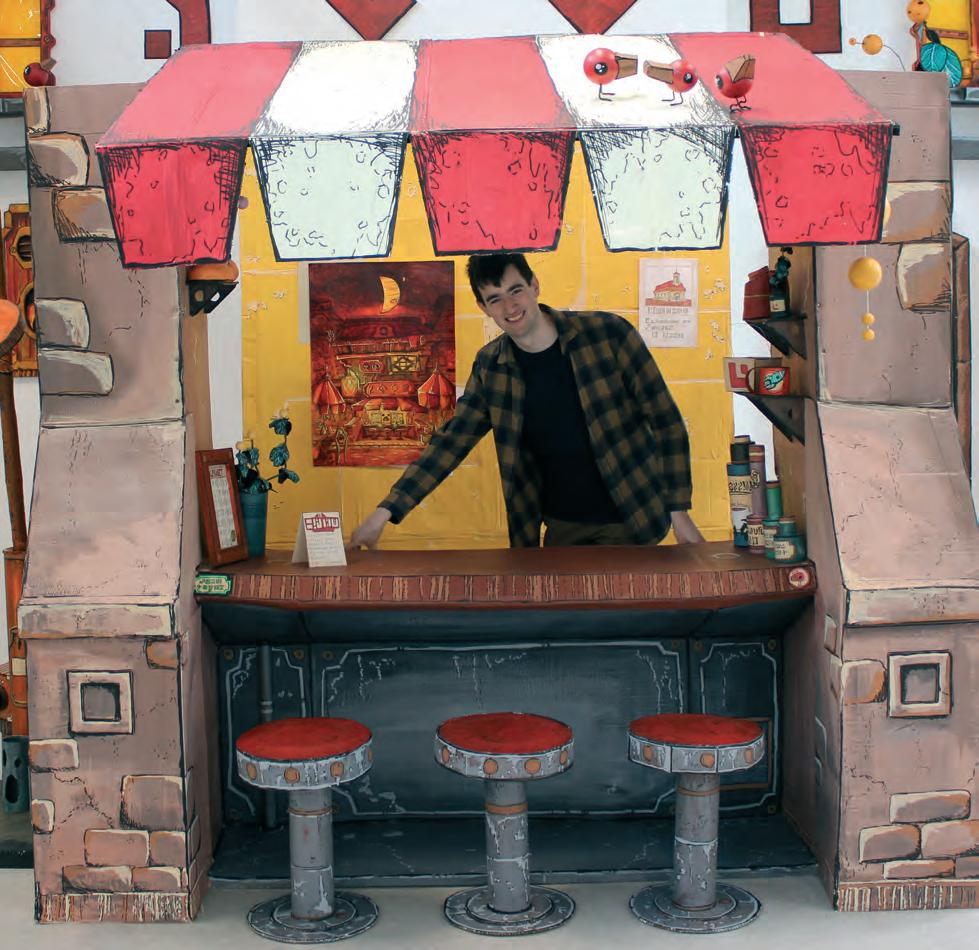
Studying Fine Art at ATU has been an incredible experience. The highlight for me was in third year, when I recreated one of my drawings 'Midnight Diner', as a large-scale 3D sculpture using recycled cardboard, styrofoam, wood, paper, and acrylic paint. The project led to me being shortlisted for the RDS Visual Arts Awards 2024 and selected to exhibit at the RHA, an amazing and unforgettable opportunity.
Sligo itself has so much to offer. The people are friendly, the food is great, and the scenery is stunning. If you love art and history, Sligo is the perfect place to study.
Interior architecture and design explores the interaction between people and the spaces they inhabit. Through re-imagination and creative re-use of our built heritage as well as the creation of new spaces, interior architects design comfortable homes, functional workspaces and inspirational public spaces that consider architectural forms, environmental impacts, and psychological and cognitive components of the space. Students develop designs and hone their skills under the guidance of experienced architects and interior designers, working closely with their tutors in dedicated studio spaces.
atu.ie/AU926
401 (Level 8 2024)
4 Years Minimum Entry Requirements PLUS
• O6/H7 Maths
24 Places
Work Placement
Erasmus+
cao.sligo@atu.ie
There are no tests or exams as part of this degree. Students are assessed through design projects and assignments. Students learn how to think creatively, and develop specialist skills: from sketching, drawing and model making to observational and critical thinking skills; students study materials and develop digital skills through use of industry specific software.
An annual field trip to a European design capital forms part of the curriculum and is, where possible, linked to a visit to an international design week event or design industry fair. Students work on a wide variety of projects including collaborations and community projects, and take part in international design competitions and exhibitions.
Graduates are equipped with the skills to work as interior architects, interior designers, retail or exhibition designers or to progress to specialist roles such as lighting designers, set designers or work in associated fields. In addition to working in a commercial practice environment, there are opportunities for graduates in the design sectors of public bodies as well as in education.
Level 8 graduates may progress to a Level 9 Masters in Interior Architecture through Creative Practice in ATU or may pursue a wide variety of national and international postgraduate studies.
Year 3 of this degree offers students opportunities for work placements, study abroad, training for enterprise or studies in another creative discipline.
In 2023, this Interior Architecture and Design programme had ten student projects published in the Dezeen Schools Show. Dezeen, regarded as the world’s most influential architecture, interiors and design magazine, has three million readers and over seven million online followers.


Year 1
• Interior Architecture Studio
• Cultural Context: Interior and Furniture
• Interior Materials and Detailing
• Design Fundamentals
• Digital Media for Design: Auto CAD, SketchUp and Photoshop
• Architectural Context and Theory
• Refurbishment and Detailing
• Professionalism and Communication
• Interior Architecture Studio
• Advanced Design Representation
• Architecture Technologies and Environment
• Design Research – Reading and Framing Place
• Yeats Academy Creative Interdisciplinary Practice
• Digital Media: SketchUp and Revit
• Environmental Psychology for Design
• Energy and Interior Environment
• Professionalism and Communication for Design
• Interior Architecture (semester or year-long) Work Placement or
• Interior Architecture and Design (semester or year-long) Erasmus+ or
• Interior Architecture and Design Studio+
• Interior Architecture Studio: Thesis
• Research for Design and the Arts
• Reflective Portfolio
• Professional Studies for Interior Architects
Interior architecture and design explores new ways to create inspiring interiors within our built environment. This degree places an environmentally conscious, creative, response to culture, community and location at the heart of every project. Design studio is the core module in each year, with other modules supporting and informing the design process. Students engage in practical work and are continuously assessed through design projects and assignments, with feedback given throughout the process. There are no tests or exams as part of this programme.
Year 1
• Interior Design Studio
• Design Fundamentals and Representation Skills
• Visual and Material Culture
• Visual Literacy
• Interior Context and Theory
• Architectural Technologies and Environment
• Interior Environment, Materials and Construction
• Digital Media for Design
• Interior Architecture Studio
• Cultural Context: Interior and Furniture
• Interior Materials and Detailing
270 (Level 7 2024)
3 Years Minimum Entry Requirements
20 Places
Work Placement
Students enjoy one-to-one contact time with tutors in dedicated studio spaces. Our dynamic studio explores diverse design projects including residential, hospitality, cultural and community typologies, through conservation, restoration, furniture, lighting design and much more. Collaborative projects and working with real-life clients are also part of our programme.
Graduates work as interior architects, interior designers in interior and architectural practices or as specialist designers in retail, branding, hospitality design, contract interiors and point of purchase design. There are also opportunities in exhibition design, TV and film, lighting, visualisation and 3D modelling.
Graduates may progress to the final year of our BA (Hons) in Interior Architecture and Design degree. This can be studied full-time for one year or part-time over two years. Graduates can also apply for advanced progression into national and international Level 8 programmes in interior architecture, interior design and spatial design.
Annual field trips to design cities including Amsterdam, Barcelona, Berlin, London, Milan, Rome, Stockholm and Venice provide firsthand experience of cutting-edge contemporary design.
Each year our students take part in national and international exhibitions and design competitions. Students also take part in the Yeats Academy of Arts, Design and Architecture Creative Showcase each year.
Our Interior Architecture programmes were the first in Ireland to be recognised by, and maintain links to, the ECIA (European Council of Interior Architects) and are also a member of the IDI (Institute of Designers in Ireland).


• Design Fundamentals
• Digital Media for Design: Auto CAD, SketchUp and Photoshop
• Architectural Context and Theory
• Refurbishment and Detailing
• Professionalism and Communication
• Design Research – Reading and Framing Place
• Interior Architecture Studio
• Yeats Academy Interdisciplinary Practice 1
• Architecture Technologies and Environment
• Digital Media: SketchUp and Revit
• Environmental Psychology for Design
• Energy and Interior Environment
• Professionalism and Communication for Design
• Advanced Design Presentation
Architecture is the art of planning and designing the built environment based on an understanding of humankind and our connection to the earth. It is a collaborative practice. The ethos of architecture at ATU is the belief in the potential of architecture to transform places. We aim for a strong studentcentred culture with dialogues between students and lecturers at its core. Our ambition is to impress upon our students their role in contributing to society as a new generation of architects.
atu.ie/AU925
440 (Level 8 2024)
5 Years Minimum Entry Requirements PLUS
• O6/H7 Maths
48 Places cao.sligo@atu.ie
Students develop their own creative ideas and discover the multi-faceted processes of architecture in a stimulating and dynamic community alongside passionate academics, practicing architects and design professionals.
Architecture design studio is a core element and makes up over 50% of the programme for each of the five years, with students working in dedicated design studio spaces.
Design projects explore the programmes vision points: interpretation of place, regionally transformative architecture, architectural regeneration of built heritage, human experience and perception of space and aim to strengthen the interaction of the natural and built environment.
There are multi-disciplinary projects with students from other degrees on the Sligo campus, and students create a portfolio of design work by the end of the programme.
This programme is the first programme of architecture in the ‘Creative West’ of Ireland and one of only six Schools of Architecture in the country. Situated on the Atlantic edge of Europe, architecture at ATU aims to make a significant contribution to the region and beyond.
Students regularly participate in national exhibitions and design competitions. Also, annual field trips to European cities expose students to a variety of forms of architecture and design.
Students take part in the Yeats Academy of Arts, Design and Architecture (YAADA) Creative Showcase each year.
The programme provides education and training for the practice of architecture, taught in a way that makes explicit an understanding of and sensitivity to historical, contextual and cultural influences on the practice of design in a global, national and local context.
The challenges of the present demand a deep understanding of the duty to innovatively respond to current and future issues, relating to daily living needs while protecting our climate.
This programme was awarded provisional approval by the Royal Institute of the Architects of Ireland (RIAI) in line with the RIAI Qualifications in Architecture: Procedures for Prescription under the Building Control Act 2007.
• Architectural Design Studio 1
• Visual Literacy
• Architecture Technologies and Environment 1
• Theory and Design of Structures 1
• Visual Material Culture 1
• Architectural Drawing and Communication 1
• Technology Studio 1
• Architectural Context and Theory 1
• Architectural Design Studio 2
• YAADA Creative Interdisciplinary Practice 1
• Architecture Technologies and Environment 2
• Architecture Context and Theory 2
• Architectural Drawing and Communication 2
• Technology Studio 2
• Theory and Design of Structures 2
• Archaeology of Building Theory
• Architectural Design Studio 3
• Architectural Drawing and Communication 3
• Architecture Technologies and Environment 3
• Architecture Context and Theory 3
• Technology Studio 3
• Theory and Design of Structures 3
• Professional Studies 1 and BIM
• Architectural Drawing and Communication 4 Advanced Representation
• Architecture Design Studio 4
• Advanced Architecture Technology 1 and 2
• Research and Engagement 1 and 2
• Research and Engagement 3: Dissertation
• Architectural Design Studio 5: Proposition and Thesis
• Research and Engagement: Documentation of Design and Portfolio
• Advanced Architectural Technology 3
• Professional Studies 3: Preparing for Practice
AU931 | Level 8 | Bachelor of Arts (Honours)
AU823 | Level 7 | Bachelor of Arts
We have developed this programme in consultation with arts practitioners in Ireland and abroad. Our programme is unique in Ireland, offering tuition in the linked fields of acting and theatre, film and television design. A common first year gives students an overview of all areas of the performing arts. In Year 2, students choose to specialise in either acting or design. This flexibility to change direction allows students to figure out where their passion lies.
atu.ie/AU931
atu.ie/AU823
3/4 Years
309 (Level 8 2024)
229 (Level 7 2024)
Minimum Entry Requirements PLUS
• Garda Vetting
• Maths not required
40 Places
Work Placement
Erasmus+
cao.sligo@atu.ie
A Year 3 work placement allows students to create industry contacts and gain first-hand professional experience. Work placements take place in a variety of settings including schools, radio stations, arts centres and theatre companies. Work placements have taken place across Europe and the United States, with companies such as CBC Television.
Our close relationships with The Abbey Theatre (Dublin), the Blue Raincoat Theatre Company, The Model Arts Centre and the Hawk’s Well Theatre allows our students access to rehearsals, technical departments, work placements, backstage and more.
Graduates work as actors, designers, teachers and facilitators in the performing arts and creative industries. Our graduates work for major production companies across the film, television and theatre industries. They have worked as actors and designers on productions including The Hunger Games, Normal People, Orange is the New Black, Game of Thrones, The Queens Gambit, The Young Offenders, John Wick, Luther and on Broadway and West End productions. Graduates are ideally placed to pursue further study to teach the new Leaving Certificate subject Drama, Film and Theatre.
Graduates may progress to the Level 9 Master of Arts in Creative Practice in ATU. Alternatively, graduates may pursue further studies in areas such as education, an MPhil in Theatre and Performance or embark on a PhD.
Ireland’s screen production sector has more than doubled in the last decade, with major streaming giants using Ireland for productions. Globally, the screen industry is transforming at an unprecedented rate as on-demand streaming has increased significantly. Companies such as Netflix, Amazon and Apple TV continue to escalate production schedules to respond to the public appetite for home entertainment. Final year students take part in the Yeats Academy of Arts, Design and Architecture Creative Showcase each year.
Year 1
• Drama, Literature and Film
• Literature: The Critical Voice
• Acting
• Studio Skills for Performing Arts
• Set Design
• Voice and Movement
• Technical Theatre
• Digital Media
• Costume Design
• Greek Theatre
• Directing
• Actors Work on Text
From Year 2, additional elective modules are available for specialism in design for theatre, film and televsion or acting.
2
• Film Studies
• Experimental Literature, Drama and Writing
• Modernism in Drama and Literature
• Facilitation and Drama
• Directing
• Voice and Movement (Level 7)
• Technical Theatre (Level 7)
• Acting Playing Heightened and Poetic Text (Level 7)
• Acting Techniques and Styles (Level 7)
• Physical Theatre (Level 7)
• Improvisation for Actors (Level 7)
Year 3
• Live Art and Performance
• Directing
• Postmodernism in Drama and Literature
• Lighting Design and Digital Theatre
• Creative Writing Practice
• Voice and Movement (Level 7)
• Acting for Production (Level 7)
• Acting to Camera (Level 7)
Year 4 (Level 8)
• Dissertation
• Global Shakespeare
• Professional Practice
• Graduation Show
A new €17 million creative teaching hub includes state-of-the-art facilities such as black box theatres, design and fabrication studios, and rehearsal spaces.
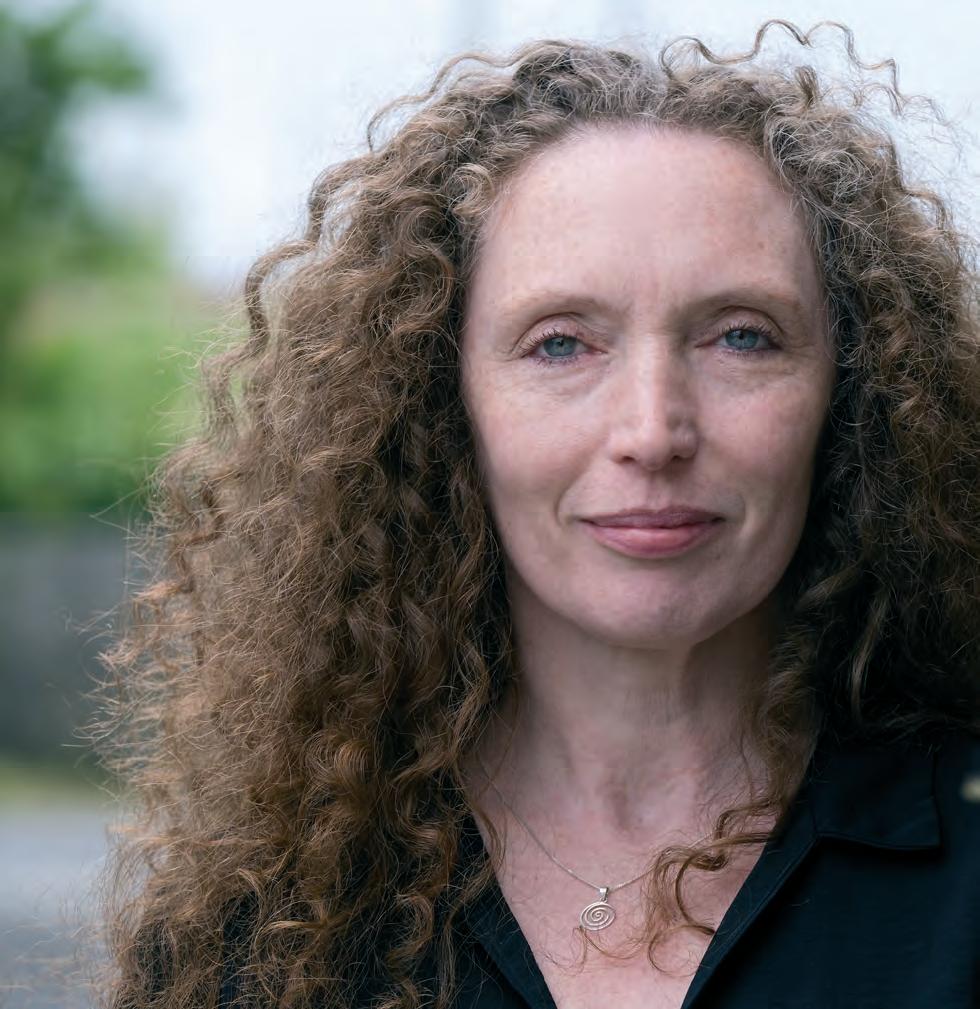
I loved this degree for its variety. Everything felt fresh, exciting and like an opportunity to try out writing we might never have thought of doing otherwise. It was also good to see that the lecturers practiced what they taught and were working writers and artists themselves.
Since I graduated, I have been working for the Educational Training Board (ETB) teaching English in a residential centre, holding creative writing workshops and editing poetry for Drunk Muse Press, all of which I find hugely enjoyable. My poetry collection Silver Spoon was published by Salmon Poetry and the novel I began writing, during Year 3 of studying Writing and Literature, has attracted representation by a literary agent in New York City as well as a contract for publication by Lilliput Press in Dublin.
AU929 (On Campus) | Level 8 | Bachelor of Arts (Honours)
AU930 (Online) | Level 8 | Bachelor of Arts (Honours)
This unique degree combines a strong focus on the craft of creative writing with in-depth study of literature, drama and film. Students develop skills in fiction, non-fiction, poetry, screenwriting, playwriting, cultural journalism and other forms, with coursework anchored in creative practice and critical analysis. The programme is taught by bestselling novelists, award-winning poets, acclaimed filmmakers, non-fiction writers and literary scholars.
atu.ie/AU929
atu.ie/AU930
306 (On Campus Level 8 2024)
305 (Online Level 8 2024)
3 Years Minimum Entry Requirements PLUS
• Garda Vetting
• Maths not required
52 Places
cao.sligo@atu.ie
During this degree, students work on diverse projects including podcasts and short films, offering them ample space to find their own creative voice. Writing practice is developed through tutor and peer feedback and bolstered by the study of literature from a wide range of genres and periods. Students have regular opportunities to attend events and guest lectures with authors and publishing professionals, and to perform their own work for live audiences.
In the final year, learning culminates in the portfolio project. Students work closely with a mentor to produce a sustained body of creative work. Our students graduate with a diverse creative writing skillset and a broad critical understanding of literature.
As well as becoming writers, our graduates can pursue careers in publishing, theatre, public relations, academia, education, journalism, arts and event management, marketing and communications, cultural tourism, film, television and digital media. Recent graduates from the Writing and Literature programme have published novels and short story collections with prestigious Irish and international publishers, signed with major literary agents, had TV concepts optioned and become journalists on national newspapers.
Our combined focus on creative practice and literary studies allows a wide range of postgraduate options, with students going on to study creative writing in various specialisms, English literature, drama and theatre studies, journalism and publishing at Master’s level. Other progression routes include postgraduate work in community arts and literary tourism. Graduates may also undertake a Professional Master of Education (PME) to teach English at secondary school.
Writing and Literature is available with on-campus delivery (AU929) and it is also offered fully online (AU930) to enable maximum access to this innovative degree. The online programme features live virtual classroom experiences, direct support from lecturers and fully interactive workshops and seminars, allowing students to develop an active community of creative writing peers.
Year 1
• Introduction to Drama, Literature and Film
• Literature: The Critical Voice
• Greek Theatre
• Literature: The Short Story
• Digital Storytelling
• Writing and Practice
• Introduction to Writing
Year 2
• Film Studies
• Writing and PracticeScreenwriting
• Writing and Practice -Playwriting
• Experimental Literature, Drama and Writing
• Yeats and Contemporary Irish Poetry
• Modernism in Drama and Literature
• Facilitation and Drama
• Writing for Television
Year 3
• Contemporary Irish Writing
• Postmodern Performance
• Introduction to Portfolio
• Literature: The Novel
• Publishing and Professional Practice
• Writing and Practice: Portfolio
Each academic year, the Writing and Literature programme teams up with Sligo Central Library to organise The Word, a monthly series of talks with high-profile national and international authors. Each edition of The Word includes a student-led open mic, giving our students the chance to embed themselves in Sligo’s vibrant writing and arts scene with its regular events and performance opportunities. Our students also edit the annual Scrimshaw Journal of New Writing and Visual Art, which features contributions from students and staff across all ATU campuses.
AU965 | Level 8 |
AU730 | Level 6 |
• Occupational Safety and Health
• Environmental Science with Ecology
• Biomedical Science
• Pharmaceutical Science with Drug Development
The Science (Common Entry) programmes give students an exceptional level of flexibility. The programme builds a core foundation in key science disciplines in Year 1 and is an excellent choice for those who know they want to study science but are unsure about the exact area at the time of application. Students are given advice during the year to help guide their decisions. Students also get to choose from elective science subjects in Year 1 before selecting their speciality at the end of that year.
atu.ie/AU965
atu.ie/AU730
2/4 Years
402 (Level 8 2024)
168 (Level 6 2024)
Minimum Entry Requirements
24 Places
Work Placement
Erasmus+
cao.sligo@atu.ie
This programme allows students the opportunity to discover the many aspects of science and the flexibility to choose their specialism at the end of Year 1. This enables students to make a much more informed decision on which field of science is where their true passion lies.
Professional accreditations are available in many of the specialist fields of study from Year 2.
Our science programmes are hands-on, with a big emphasis on developing practical skills. This means our students graduate with the skills employers want. Students spend 50% of their time in labs and have access to state-of-the-art, industry-spec equipment throughout their studies. Small class sizes ensure students always have their own lab space and are fully supported by our expert academic staff throughout their learning. We also focus on soft skills such as teamwork and communication. These skills are highly valued by potential employers.
Leaving Certificate science subjects are not an entry requirement for this programme. The first year of study will cover all key science disciplines from the start.
Students may leave after two years with a Higher Certificate in Science in their chosen discipline. Level 6 graduates may progress to the Level 7 and then the Level 8 of their chosen discipline.
Level 8 graduates may apply for postgraduate study in taught masters programmes as well as Doctoral PhD research programmes. There is also a wide range of online programmes at masters level in ATU to suit graduates in the workplace.
Year 1
• Chemistry
• Physics
• Biology
• Mathematics for Science
• Information Technology
• Environmental Science [E]
• Drug Discovery & Development [E]
• Biomedical Science [E]
Occupational Safety and Health
Year 2
• Hazard and Risk Control
• Electricity, Machinery and Fire Safety
• Environmental Water Quality
• Occupational Hygiene
• Safety Legislation
• Construction Technology
• Manual Handling Instructor
• Workstation Assessor Training
• Data and Statistics in Health
• Biological Health Hazards in the Workplace
Year 3 (Level 7 and Level 8)
• Safety and Health Legislation
• Occupational Health and Health Promotion
• Occupational Hygiene
• Environmental Topics in the Workplace
• Management of Hazardous Materials and Processes
• Construction Safety and Contractor Management
• Safety Statement and Risk Assessment
• Applied Statistics and Data
• Environmental Management for the Safety Practitioner
• Occupational Hygiene
• Hazard and Risk Management
Year 4 (Level 8)
• EHS Management Systems and Auditing
• Behavioural Based Safety Programs
• Ergonomics
• Project Management for OSH Professionals
• Regulatory Affairs
• Training and Development
• EHS Management Systems Project
• Management of Workplace Health and Wellbeing
Environmental Science with Ecology
Year 2
• Aquatic Ecology
• Water Quality
• Environmental Regulation
• Environmental Enquiry Based Learning
• Climate Science
• Terrestrial Ecology
• Introduction to Geographic Information Systems
• Environmental Microbiological Monitoring
• Soils and Environment
• Wastewater Enquiry Based Learning
Year 3 (Level 7 and Level 8)
• Occupational Safety and Health
• Ecological Monitoring
• Environmental Toxicology
• Water and Wastewater Treatment Theory
• Environmental Ethics
• Data Management
• Work Placement
• Environmental Instrumental Analysis
Year 4 (Level 8)
• Advanced Geographic Information Systems
• Environmental Legislation and Policy
• Project
• Biomolecular Technologies
• Environmental Management Systems and Auditing
Additional elective modules are available throughout the programme.
Biomedical Science
Year 2
• Biochemistry
• Microbiology
• Bioethics
• Analytical Techniques
• Biomaterials and Medical Devices
• Mathematics for Science
• Molecular Biology
• Medical Pharmacology
• Medical Immunology
• Process Microbiology
Year 3 (Level 7 and Level 8)
• Medical Device Technologies
• Animal Cell Culture
• Statistics for Scientists
• Protein Biotechnology
• Biopharmaceutical facilities and Utilities
• Legislation, Quality and Auditing Systems
• Implant Biocompatibility
• Immunodiagnostics
• Microbial Biotechnology
• Advanced Therapy Medicinal Products
• Research Development and Communication for Biomedical Science
Year 4 (Level 8)
• Recombinant Cell Engineering
• Cell Culture Processing
• Medical Diagnostics
• Research Project
• Industry Placement and Case Studies
• Recombinant Cell Engineering
• Formulation and Delivery Systems of Biopharmaceuticals
• Biopharmaceutical Validation
• Protein Purification
• Analytical Testing of Biopharmaceuticals
Pharmaceutical Science with Drug Development
Year 2
• Microbiology
• Organic Chemistry
• Inorganic Chemistry
• Physical Chemistry
• Biochemistry
• Introduction to Biopharmaceuticals
• Organic Chemical Synthesis
• Pharmaceutical Analytical Methods
• Pharmaceutical Microbiology
• Environmental Health and Safety
Year 3 (Level 7 and Level 8)
• Pharmaceutical Processing and Medical Device Manufacture
• Biopharmaceuticals
• Pharmaceutical Chemistry
• Scientific Communications
• Statistics for Scientists
• Pharmaceutical Pre-Formulation Studies
• Pharmaceutical Formulation
• Pharmaceutical Quality Systems
• Pharmaceutical Analysis
• Active Ingredient Synthesis
Year 4 (Level 8)
• Industry Placement
• Biopharmaceutical Analysis
• Advanced Organic Chemistry
• Pharmaceutical Project
• Pharmaceutical Research Methods
• Pharmaceutical Legislation
• Pharmaceutical Operations Excellence
• Pharmaceutical Pharmacology
• Drug Structure
• Compliance Auditing & Validation
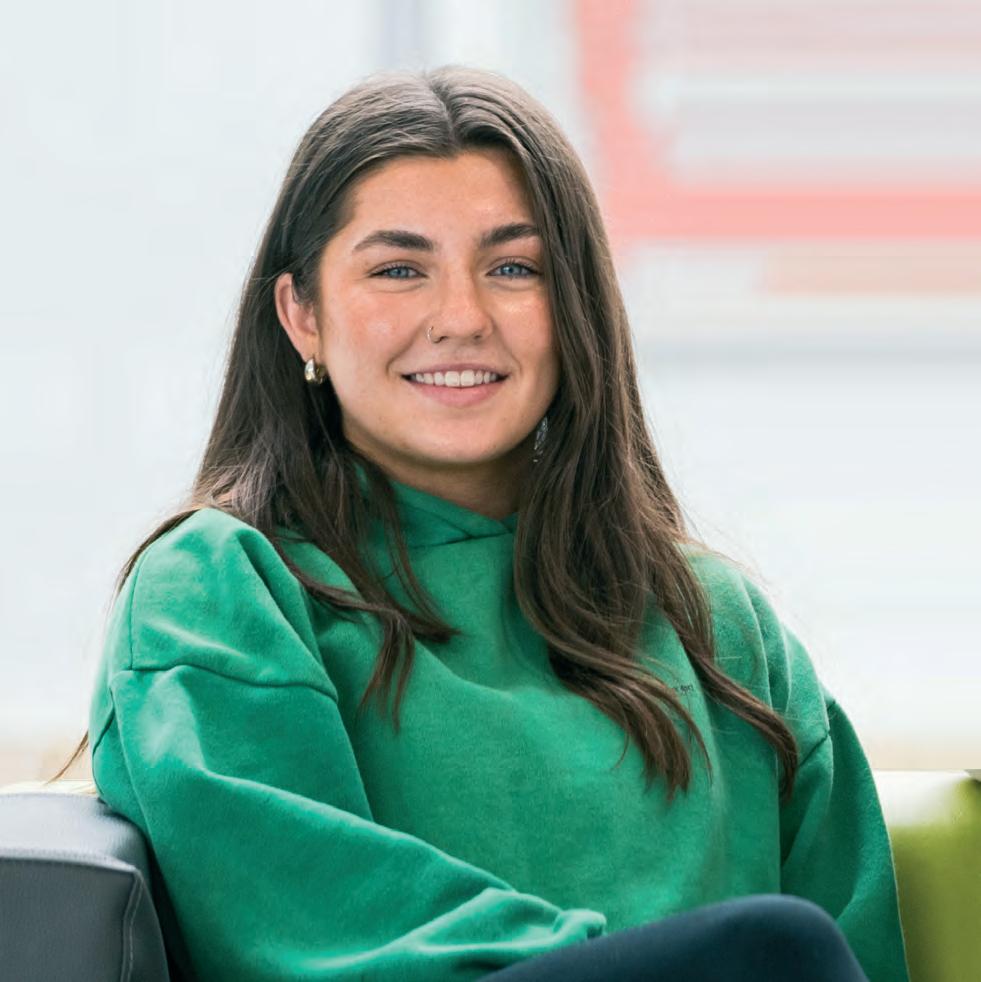
I chose to study the common entry science degree because of the choice it gave me at the end of Year 1. I knew I wanted to study something in the science field but I wasn’t quite sure of what that was exactly. This degree is perfect as it allowed me to study different aspects of science before choosing one of the four specialism options on offer.
The balance of theory and lab-based learning is something I love about studying science in ATU Sligo. What we learn in class is constantly reinforced through practicals in the state-of-the-art labs. This really helps understanding different topics. I continued my studies in the BSc (Hons) in Biomedical Science after Year 1.
AU967 | Level 8 | Bachelor of Science (Honours)
AU856 | Level 7 | Bachelor of Science
This programme equips students with the knowledge to protect workers from injuries and fatalities, prevent illness caused by work, promote health and wellbeing, advise employers on health and safety laws, and work in groups to solve workplace safety issues. Graduates have the skills to prepare, implement and monitor safety management systems in a wide range of sectors.
atu.ie/AU967
atu.ie/AU856
3/4 Years
310 (Level 8 2024)
246 (Level 7 2024)
Minimum Entry Requirements
32 Places
Work Placement
cao.sligo@atu.ie
Our degree blends theoretical and practical learning which includes lectures, lab-based monitoring, site visits, case studies and enquirybased learning. Final year honours degree students also complete a five-month paid work placement. In Year 2, students qualify as manual handling trainers and workstation assessors. Students can confidently offer manual handling training and carry out workstation assessments for employers while on work placement and after graduation.
Our programme incorporates enquiry-based learning (EBL) which is a teaching method that allows students to work in teams to collaboratively solve work-based problems. Lecturers design assessments to mirror what graduates will encounter in the workplace.
There are excellent employment opportunities and salaries, both nationally and internationally. Graduates work in both the private and public sector as safety advisors, health and safety officers, safety training consultants, site safety officers and safety coordinators in a wide range of industries including pharmaceuticals, chemicals, electronics, the food and beverage sector, mining, construction, commercial, wholesale, transport, retail and in the health sector.
Level 7 graduates may progress to Year 4 of our BSc (Hons) in Occupational Safety and Health. Level 8 graduates may progress to our two-year online MSc in Environmental Health and Safety or other awards in ATU or other higher education institutions.
This degree is essentially applied science rather than the science students may know from school. Occupational safety and health in the workplace covers areas such as chemical safety, occupational health, exposure to noise, dust and gases.
This is the longest running occupational safety and health honours degree programme in Ireland.
Year 1
• Introductory Biology
• Chemistry and Chemical Hazards
• Physics
• Mathematics for Science
• Information Technology
• Occupational Safety and Health Enquiry Based Learning
• Biological Science
Year 2
• Hazard and Risk Control
• Electricity, Machinery and Fire Safety
• Occupational Safety and Health Enquiry Based Learning
• Environmental Water Quality
• Occupational Hygiene Physical Agents
• Safety Legislation
• Construction Technology
• Manual Handling Instructor Training
• Workstation Assessor Training
• Data and Statistics in Health
• Biological Health Hazards in the Workplace
Year 3
• Safety and Health Legislation
• Occupational Health and Health Promotion
• Occupational Hygiene
• Environmental Topics in the Workplace
• Occupational Safety and Health Enquiry Based Learning
• Management of Hazardous Materials and Processes
• Construction Safety and Contractor Management
• Safety Statement and Risk Assessment
• Applied Statistics and Data Management
• Environmental Management for the Safety Practitioner
• Occupational Hygiene – Control of Hazardous Substances
• Hazard and Risk Management
Year 4 (Level 8)
• EHS Management Systems and Auditing
• Behavioural Based Safety Programs
• Ergonomics
• Project Management for OSH professionals
• Regulatory Affairs
• Training and Development
• EHS Management Systems Project
• Management of Workplace Health and Wellbeing
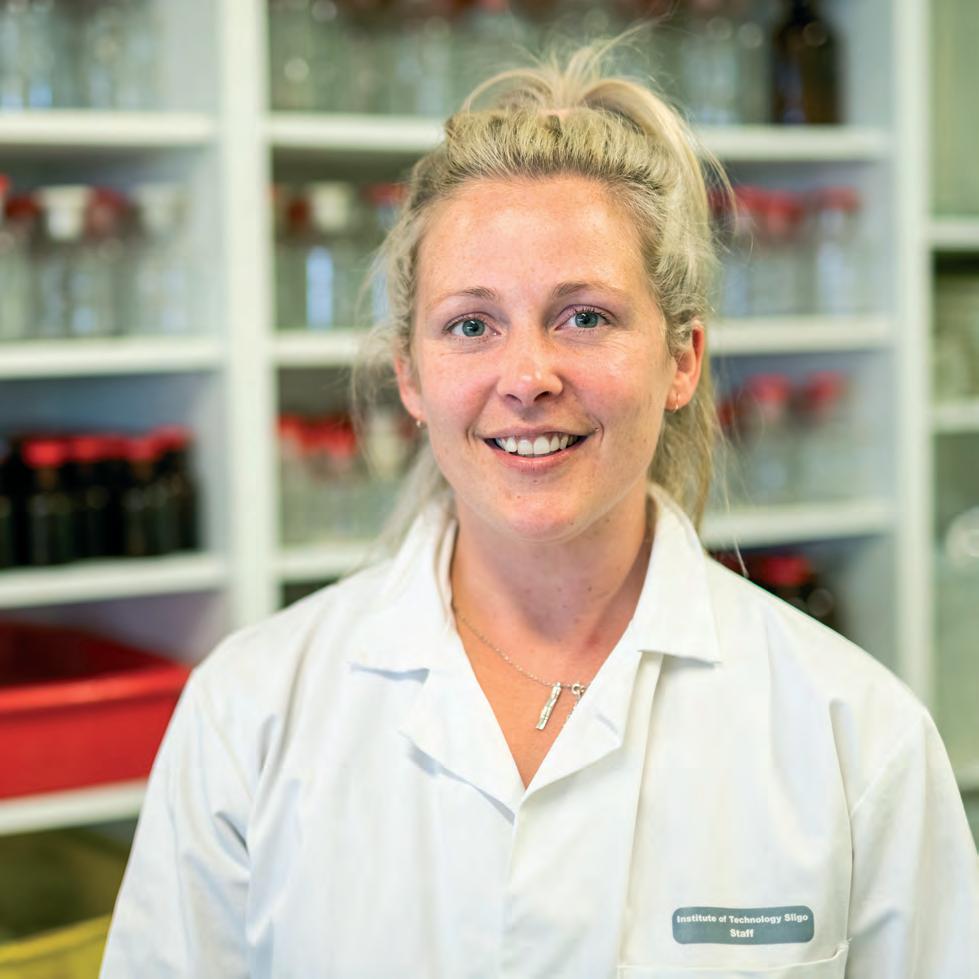
A lot of time is dedicated to practical labs which I love, whilst field trips explore environmental issues with real life examples. Sligo has an array of environmental sites and is the perfect location to study this degree. The modules also interlink with each other, so what you learn in one class is relevant in another.
The lecturers have a wealth of knowledge, not only academically, but within the professional working environment too. I spent Year 3 studying at Mid-Sweden University which was an amazing experience. After I graduated with my honours degree, I secured employment as a Graduate Development Officer with The National Federation of Group Water Schemes.
AU966 | Level 8 | Bachelor of Science (Honours)
AU855 | Level 7 | Bachelor of Science
This programme equips students with the skills to manage our manmade and natural resources. Through a mix of outdoor fieldwork, high-tech laboratory experiments, computer mapping, site visits and classroom activities, students learn about the environment and the natural world around us in an applied way. The environment, climate change and the drive towards sustainability has never been more important. Our graduates help drive that change.
atu.ie/AU966
atu.ie/AU855
3/4 Years
339 (Level 8 2024)
280 (Level 7 2024)
Minimum Entry Requirements
40 Places
Work Placement
Erasmus+
cao.sligo@atu.ie
Students have the option to study abroad with our partner university in Sweden as part of the Erasmus+ programme. There is also an option to take part in a two-week international summer school in the Netherlands or Sweden. This is a hands-on programme where 50% of coursework includes fieldwork and labs. Assessments are designed to develop skills that employers value highly, including scientific report writing, presentations, group work and practical skills.
In Year 3, students undertake a 12-15 week work placement. This can take place in a variety of settings including environmental protection authorities, environmental consultancy firms, the energy sector, state agencies and lots more.
Graduates have many career opportunities. They are needed in industry, environmental and ecological consultancies, local authorities and in state agencies such as Uisce Éireann (Irish Water), the Environmental Protection Agency, Inland Fisheries Ireland and the National Parks & Wildlife Service. Graduates can apply for graduate programmes and pursue a range of careers across Ireland and the world, from field-based, lab-based and office-based roles such as environmental scientists, ecologists and environmental protection officers.
Level 7 graduates may progress to Year 4 of the BSc (Hons) in Environmental Science with Ecology. Level 8 graduates may progress to Level 9 and Level 10 postgraduates studies in environmental health and safety, water services management or an applied research masters or PhD in the Centre for Environmental Research Innovation and Sustainability (CERIS) in ATU.
A recent report from Columbia University, citing LinkedIn data, highlighted that the number of green job openings worldwide over the past number of years has outpaced the number of people who have an environmental degree qualification.
Accreditation


What will I study?
Year 1
• Introduction to Environmental Science
• Cell Biology
• Introductory Chemistry
• Mathematics
• Communications in Science
• Information Technology Computer Apps for Ecology and Environment
• Environmental Physical Science
• Earth Sciences
• Diversity of Life
• The Environment Around Us
Year 2
• Aquatic Ecology
• Water Quality
• Environmental Regulation
• Environmental Enquiry Based Learning
• Climate Science
• Terrestrial Ecology
• Introduction to Geographic Information Systems
• Environmental Microbiological Monitoring
• Soils and Environment
• Wastewater Enquiry Based Learning
Year 3
• Occupational Safety and Health
• Ecological Monitoring
• Environmental Toxicology
• Water and Wastewater Treatment Theory
• Environmental Ethics
• Data Management
• Work Placement
• Environmental Instrumental Analysis
Year 4 (Level 8)
• Advanced Geographic Information Systems
• Environmental Legislation and Policy
• Project
• Biomolecular Technologies
• Environmental Management Systems and Auditing
Additional elective modules are available throughout the programme.
AU969 | Level 8 | Bachelor of Science (Honours)
AU858 | Level 7 | Bachelor of Science
Biomedical science is the study and application of biological systems for diagnostic and therapeutic purposes. Did you ever wonder how diseases are diagnosed in hospital labs or where insulin comes from? Did you know that many modern day drugs for cancer and rheumatoid arthritis are produced using biological systems? Biomedical science is a revolutionary industry that has a major impact on the production of drugs, hormones and diagnostics.
atu.ie/AU969
atu.ie/AU858
3/4 Years
351 (Level 8 2024)
262 (Level 7 2024)
Minimum Entry Requirements
48 Places
Work Placement
cao.sligo@atu.ie
This programme gives students access to the latest industry innovations and advancements. Unique and interactive teaching methods on the programme include the use of enquiry-based learning, social networking, game-based learning, industrial workshops and visits to leading biopharmaceutical companies.
There is an industrial work placement in the summer of Year 3. Students undertake training in the National Institute of Bioprocessing Research and Technology (NIBRT) in Blackrock, Dublin in Year 4. This gives students a distinct advantage when applying for roles in the biopharmaceutical industry.
A strong practical element allows students to build their competencies and skills. Lab skills which students develop include microbiology, molecular biology and DNA analysis, cell culturing and medical diagnostics.
Employability is extremely high from this degree. Graduates work across many biomedical and bio-based industries and careers including diagnostics, medical devices and biopharmaceuticals. They gain roles as technologists, lab and process scientists, instrumentation scientists, cell culture scientists, and protein and drug analysts.
Students may exit after three years with an ordinary degree. Level 7 graduates may progress to Year 4 of the Level 8 BSc (Hons) in Biomedical Science. Level 8 graduates may progress to Level 9 masters or Level 10 PhD studies, pursuing research and careers in the public or private sectors.
In Year 4, the focus moves to the biopharmaceutical industry. Students complete a research project on a specific area of interest. Important transferrable skills such as teamwork, communication, problem solving, data presentation, information sourcing and scientific technical writing are also incorporated into this degree.
Ireland continues to be the third largest exporter of pharmaceuticals globally, accounting for €116+ billion in exports annually according to IDA Ireland. In April 2025, RTÉ reported that over 50,000 people are employed in BioPharma companies here. With 90+ companies and 19 of the world’s top 20 pharmaceutical firms in Ireland, the demand for skilled graduates is at an all-time high.
Year 1
• Biology
• Chemistry
• Physics
• Mathematics for Science
• Information Technology
• Introduction to Medical Biotechnology
Year 2
• Biochemistry
• Microbiology
• Bioethics
• Analytical Techniques
• Biomaterials and Medical Devices
• Mathematics for Science
• Molecular Biology
• Medical Pharmacology
• Medical Immunology
• Process Microbiology
Year 3
• Medical Device Technologies
• Animal Cell Culture
• Statistics for Scientists
• Protein Biotechnology
• Biopharmaceutical facilities and Utilities
• Legislation, Quality and Auditing Systems
• Implant Biocompatibility
• Immunodiagnostics
• Microbial Biotechnology
• Advanced Therapy Medicinal Products
• Research Development and Communication for Biomedical Science
Year 4 (Level 8)
• Recombinant Cell Engineering
• Cell Culture Processing
• Medical Diagnostics
• Research Project
• Industry Placement and Case Studies
• Recombinant Cell Engineering
• Formulation and Delivery Systems of Biopharmaceuticals
• Biopharmaceutical Validation
• Protein Purification
• Analytical Testing of Biopharmaceuticals

This is a very interesting degree and I loved the hands-on approach to learning. The opportunity to use industry standard equipment in the science labs means you graduate work ready. These skills are very relevant in my current role as an Associate Scientist with Pfizer in Dublin.
The lecturers are brilliant and are always on hand to offer advice and help. Some of my favourite modules were Microbiology, Protein Purification and Cell Culture Processing. The whole degree is so relevant to the manufacture of medication and medical devices and understanding the cause and treatment of disease. We also gained lots of soft skills such as teamwork and communication which are increasingly important with employers.
AU970 | Level 8 | Bachelor of Science (Honours)
AU859 | Level 7 | Bachelor of Science
This degree encompasses the application of a forensic investigative approach using advanced analytical science for the provision of scientific data and evidence. The underlying analytical science combines forensic, biological, chemical, communication and information technology skills. These skills can be applied to the investigation of crime, testing for toxins or illicit drugs, DNA profiling or statistical analysis. Students learn both forensic and analytical science through a range of biology and chemistry modules.
atu.ie/AU970 atu.ie/AU859
3/4 Years
317 (Level 8 2024)
260 (Level 7 2024)
Minimum Entry Requirements
48 Places
Work Placement
cao.sligo@atu.ie
A major focus of this programme is the development of excellent practical analytical science skills which are in high demand by employers and for postgraduate research.
Learning experiences include simulated crime scenes with practising forensic investigators, training in molecular biology techniques for the development of DNA profiles, collection and chemical analysis of gunshot residue, learning how to test for toxins and illicit drugs, expert witness training and activities to enhance communication skills.
In the summer of Year 3, students complete a one to three-month work placement. In Year 4, students complete a forensic based research project on a topic of interest to them.
Graduates work in a wide range of industries where analytical science is required and initially take up roles as analysts, scientists and technical officers. Graduates have found employment in a broad range of sectors including in The State Laboratory, forensic science, teaching and in companies such as Abbott, AbbVie and Coca-Cola.
Students may exit after three years with an ordinary degree. Level 7 graduates may progress to Year 4 of the Level 8 BSc (Hons) in Forensic Investigation and Analysis. Level 8 graduates may continue to Level 9 or Level 10 postgraduate studies. Our Level 8 degree is aligned with the Teaching Council of Ireland’s registration requirements for secondary school teaching. Graduates may complete a Professional Master of Education (PME) to teach Chemistry to Leaving Certificate level and Science to Junior Certificate level.
This programme is accredited by the Chartered Society of Forensic Sciences in the UK for the component standards Interpretation, Evaluation and Presentation of Evidence, Crime Scene Investigation and Laboratory Analysis. As the first higher education degree on the island of Ireland to achieve this accreditation, it gives our graduates the assurance that they have an internationally recognised qualification and are ready to undertake a professional career in forensic science.
Year 1
• Biology
• Chemistry
• Physics
• Mathematics for Science
• Learning for Forensic Science
• Forensic Science and Law
• Information Technology
Year 2
• Microbiology
• Biochemistry
• Organic Chemistry
• Crime Scene Investigation
• Analytical Chemical Techniques Theory
• Forensics Chemistry
• Physical Chemistry
• Communication for Scientists
• Data Processing, Molecular Graphics and Instrumentation
• Inorganic and Classical Analysis
Year 3
• Statistics for Scientists
• Quality Systems
• Human Genetics
• Spectroscopy and Atomic Spectrometry for Forensic Analysts
• Forensics Chemistry
• Molecular Biology
• Research Skills for Analytical Scientists
• Immunodiagnostics with Forensics Applications
• Separation Science for Forensics
• Laboratory Computing and Instrumental
• Advanced Chemistry
Year 4 (Level 8)
• Forensics Molecular Biology
• Research Project
• Industry Work Placement
• Forensics Chemical Analysis
• Crime Scene Management
• Analytical Toxicology
• Forensic Evaluation and Court
• Environmental Forensics
Professional Accreditation

This programme allows students to train as a clinical measurement physiologist in all five disciplines: neurology, respiratory, vascular, gastrointestinal and cardiology. Clinical measurement physiologists are healthcare professionals who perform diagnostic tests for patients, reporting and acting on the outcomes. They are a vital part of the interprofessional team looking after patients. This degree was developed in collaboration with the professional body for clinical measurement physiologists, the Irish Institute of Clinical Measurement Physiology.
atu.ie/AU973
465 (Level 8 2024)
4 Years Minimum Entry Requirements PLUS
• Min H6 or O4 in Maths
• Min H4 in one of: Applied Maths, Physics, Chemistry, Biology, Physics/Chemistry, Agricultural Science, Engineering or Technology
• Garda Vetting
24 Places
Work Placement
cao.sligo@atu.ie
There is a strong emphasis on students learning to adopt a patientcentred and professional approach. Key skills acquired will be the ability to deliver valid clinical diagnostic data to colleagues and patients, broad clinical knowledge, critical thinking and research skills.
Students have access to state-ofthe-art facilities, hospital standard equipment and individual lab spaces. Students will reinforce their learning by doing, in a real clinical environment.
Graduates take up employment in clinical settings such as hospitals and community based diagnostic hubs. Graduates are in high demand to meet a growing skills shortage in Ireland and globally, with the demand forecasted to significantly grow in the coming years. The most recent Government’s Critical Skills Occupations List included clinical measurement physiology as an area with significant shortages in qualified professionals. Clinical measurement physiologists may also work as technical consultants or device specialists for companies that provide equipment or devices used in diagnosing or treating patients.
Graduates may undergo internationally recognised accreditation in specific procedures or groups of procedures they carry out. These are run by professional bodies or scientific groups and mostly involve self-directed learning. Some will undertake MSc or PhD by research or structured programmes.
Working in healthcare allows many opportunities for further study and continuous professional development, which is vital to keep up to date with advancements in technology.
In Year 3, students undertake two minor clinical placements in two of the five disciplines. Each minor placement is a minimum of 300 hours.
Year 1
• Mathematics for Science
• Physics
• Information Technology
• Chemistry
• Introduction to Clinical Measurement Physiology
• Human Anatomy and Physiology
• Clinical Measurement Techniques 1
• Introduction to Professional Practice
Year 2
• Health Biochemistry
• Human Anatomy and Physiology
• Clinical Measurement Techniques 2 and 3
• Biology of Disease
• Instrumentation and Imaging I & II
• Applied Health Statistics
• Medical Pharmacology
• Research Methods
• Clinical Measurement Physiology and Pathology
Year 3
• Physiological Systems
• Professional Practice I
• Core Placement Skills
• Clinical Measurement Instrumentation
• Minor Placements (two electives from chosen five disciplines, gastrointestinal, neurology, vascular, respiratory, cardiology)
• Advanced Clinical Measurement Applications
Year 4
• Minor Placement (third elective chosen from three of remaining disciplines)
• Medical Imaging
• Professional Practice II
• Advanced Medical Pharmacology
• Advanced Clinical Biochemistry
• Major Placement (elective, chosen from one of the three disciplines undertaken as a minor placement)
• Final Project
In Year 4, students undertake a third minor placement in one of the remaining three disciplines and then a major clinical placement of 480 hours in one of the minor disciplines they previously undertook. Clinical placements are provided nationwide.
Understanding and promoting an active lifestyle, proper nutrition, and the positive impact it has on people’s lives forms the basis of this degree. Students obtain a strong academic base in health science disciplines related to physical activity and exercise, ideal for those interested in pursuing a career in human health. Graduates have the capacity to apply knowledge and skills to direct and support the general population, distinct population groups and those managing chronic conditions through physical activity and structured exercise programmes.
atu.ie/AU971
321 (Level 8 2024)
4 Years Minimum Entry Requirements PLUS
• Garda Vetting
24 Places
Work Placement
cao.sligo@atu.ie
This degree is comprised of several inter-related subject streams including health promotion and public health, physical activity, exercise physiology, nutrition sciences, and research methods. Graduates gain a unique blend of practical skills and knowledge in a broad range of health-related fields. In Year 3, students complete a research project on a topic of interest. In Year 4, they complete a 10-week work placement. Embedded within this degree are REPS Ireland recognised Fitness Instruction, Personal Training, and Exercise for Health Specialist awards. The degree is also accredited by the International Union for Health Promotion and Education (IUHPE), meaning graduates hold qualifications recognised worldwide.
Graduates work across a wide range of roles related to health and physical activity, including sports development, exercise science, physical activity and health promotion, and specialist physical activity prescription for managing long-term conditions.
Graduates may progress to Level 9 and Level 10 postgraduate programmes, including the MSc in Clinical Measurement Physiology at ATU. They may also gain entry to professional programmes in allied health areas such as physiotherapy, speech and language therapy, radiography, and occupational therapy, both in Ireland and abroad.
This degree emphasises lab and practical learning. Students have access to state-of-the-art equipment including a Biodex Isokinetic System 4 for testing muscular fitness, a Cortex Gas Analyser for VO2 max testing, a G-Walk used in clinical settings, and a BodPod, the gold standard for measuring body composition. A new teaching gym for health science degrees opened in 2025.

Year 1
• Human Biology
• Foundation Chemistry
• Introduction to Kinesiology and Exercise Instruction
• Human Anatomy and Physiology
• Information Technology
• Mathematics for Science
• Health Communications
• Health Promotion Practice
• Determinants of Health
• Introduction to Health and Fitness
• Facilitation and Group Work Skills
• Human Anatomy and Physiology
• Health Biochemistry
• Functional Anatomy and Kinesiology
• Health Psychology
• Research Methods
• Exercise Physiology
• Biomechanics of Human Movement
• Health Microbiology
• Determinants of Health
• Promoting Healthy Behaviour
• Physical Testing and Evaluation
Year 3
• Human Nutrition
• Exercise Physiology
• Public Health Practice
• Resistance Training and Programme Design
• Health Statistics and Data Analysis
• Health Science Project
• Research Methods
• Health Promotion Practice
• Physical Activity across the Lifespan
Year 4
• Exercise as Medicine
• Clinical Exercise Prescription
• Physical Activity Project Management
• Applied Statistics in Public Health
• Enterprise and Innovation in Health
• Applied Epidemiology
• Qualitative Research Methodologies
• Work Placement
• Facilitation & Group Work Skills
• Settings Based Approach to Physical Activity
Additional elective modules are available throughout the programme.

I knew I wanted a career involving health and fitness, but I wasn’t sure exactly what that was. This degree was perfect for me as it provided a taste of many different subjects and lots of career and further study options. I love the practical focus of the Health Science degrees in Sligo as it helps reinforce theory learnt in class.
After graduating from ATU, I continued to a BSc (Hons) in Physiotherapy at York St John University, England. Now fully qualified, I am employed as a musculoskeletal physiotherapist at Total Physiotherapy in Sydney, Australia. Previously, I worked as a physiotherapist at a private practice in Manchester, England and part-time as an academy physiotherapist for Oldham Athletic F.C.
The focus of this programme is on understanding, promoting and maintaining health and wellbeing through health behaviours including diet and physical activity. It is the perfect choice for students who have a strong interest in health but may be unsure of what aspect they wish to focus on. Modules are aligned to three main study strands: health promotion, exercise and nutritional science, and research methods for health.
atu.ie/AU861
3 Years
273 (Level 7 2024)
Minimum Entry Requirements PLUS
• Garda Vetting
24 Places cao.sligo@atu.ie
The Register of Exercise Professionals (REPS) Ireland recognised Fitness Instruction Award is built into the programme, thus graduates are eligible to register with Ireland’s professional body representing exercise professionals. This degree is also accredited by the International Union for Health Promotion and Education (IUHPE). Core modules are complemented by supporting modules in IT, communications and sports injuries. Students are equipped with a unique blend of practical skills and knowledge in a broad range of health-related fields. This affords graduates numerous and varied opportunities to specialise in their favoured area and offers a diverse range of career paths.
Graduates may pursue further studies in allied health professions such as physiotherapy, speech and language therapy, radiography and occupational therapy.
By exploring different aspects of health science on this flexible programme, students can make informed decisions about career paths and further study. Graduates work across private, voluntary and state sectors in sports development, exercise science, physical activity prescription for health and wellness, health promotion, and health research.
Graduates may progress to the oneyear add-on BSc (Hons) in Public Health and Health Promotion or Year 4 of the Level 8 BSc (Hons) in Health Science and Physical Activity. Many graduates of our health science degrees pursue further study in allied health professions such as physiotherapy, speech and language therapy, radiography, occupational therapy and other health-related disciplines, in Ireland and abroad. Level 8 graduates may also progress to Level 9 and Level 10 postgraduate programmes, including the MSc in Clinical Measurement Physiology at ATU..
A new teaching gym opened at ATU’s Sligo campus in 2025. This state-of-the-art facility includes Concept2 rowing machines, stationary bikes, ski ergometers, high-spec treadmills, and cross trainers. The commercial-grade resistance suite also features dualpurpose fixed-weight machines, a functional training cable machine, heavy-duty half racks, Olympic weightlifting platforms, and a range of free weights. A central sprungfloor space supports flexibility work, fitness testing, or group activity sessions.
Year 1
• Foundation Chemistry
• Human Anatomy and Physiology
• Mathematics for Science
• Introduction to Health and Fitness
• Introduction to Kinesiology and Exercise Instruction
• Health Communications
• Health Promotion Practice
• Information Technology
• Determinants of Health
• Facilitation and Group Work Skills
Year 2
• Human Anatomy and Physiology
• Health Biochemistry
• Functional Anatomy and Kinesiology
• Health Psychology
• Exercise Physiology
• Physical Testing and Evaluation
• Biomechanics of Human Movement
• Health Microbiology
• Determinants of Health
• Promoting Health Behaviours
• Research Methods
Year 3
• Exercise Physiology
• Human Nutrition
• Research Methods
• Public Health Practice
• Resistance Training and Programme Design
• Health Statistics and Data Analysis
• Health Science Project
• Health Promotion Practice
• Physical Activity across Lifespan
Professional Accreditation

AU972 | Level 8 | Bachelor of Science (Honours)
AU862 | Level 7 | Bachelor of Science
This programme combines several scientific disciplines to provide a thorough understanding of the role of diet and nutrition in health, and in the prevention of major diseases such as cardiovascular disease, cancer, diabetes and osteoporosis. Students study basic sciences, physiology, biochemistry, psychology, food science, food product development, public health nutrition, clinical nutrition and sports nutrition. Graduates have the skills to work as a nutritionist or a food scientist across a broad range of disciplines and sectors.
atu.ie/AU972
atu.ie/AU862
3/4 Years
341 (Level 8 2024)
281 (Level 7 2024)
Minimum Entry Requirements PLUS
• Garda Vetting
24 Places
Work Placement
Erasmus+
cao.sligo@atu.ie
Graduates from our Level 8 degree are eligible for direct entry as registered associate nutritionists with the Association for Nutrition (AfN, AC289).
Students take part in a virtual mobility experience with students from the Hague University in the Netherlands in Year 1 and Year 4.
Graduates use the experience and knowledge gained in this programme to work in food and nutrition-related industries in areas such as research, product development, food safety, regulation, consumer information and marketing. Graduates are also qualified for a variety of roles in health promotion and public health nutrition.
Level 7 graduates may progress to Year 4 of our Level 8 BSc (Hons) in Human Nutrition. Graduates from our Level 8 honours degree can pursue a wide range of Level 9 and Level 10 postgraduate programmes in ATU or other higher education institutions. ATU offers a range of Level 9 postgraduate programmes in public health nutrition, sports and exercise nutrition, and health promotion. Many students also undertake this degree as a pathway to dietetics and progress to an MSc in Dietetics. Our expert staff ensure students receive appropriate references and advice prior to application and subsequent interview for further studies in areas such as dietetics.
In Year 4, students complete a minimum 12-week professional work placement. This takes place in food-related industries, academia, health promotion, public health agencies, in hospitals and with sports nutritionists in Ireland or abroad.
Level 8 students complete a research project in Year 4. Topics can be lab or population based and cover a wide range of topics in public health nutrition, clinical nutrition, food product development, food science, sustainability and health.
Professional Accreditation
Year 1
• Chemistry
• Culinary Nutrition
• Mathematics for Science
• Introduction to Nutrition
• Foundations of Health Promotion Practice
• Human Anatomy and Physiology
• Information Technology
• Determinants of Health
Year 2
• Nutritional Biochemistry
• Food Science
• Analytical Techniques
• Human Anatomy and Physiology
• Health Psychology
• Food Microbiology
• Behavioural Interventions
• Essential Skills for Nutritional Sciences
• Nutrition through the Life Stages
Year 3
• Advanced Nutrition
• Public Health Nutrition
• Food Legislation and Quality Systems
• Nutrition Assessment
• Sports and Exercise Nutrition
• Clinical Nutrition
• Product Development for the Nutrition and Food Industries
• Research Methods
• Health Statistics and Data Analysis
• Personal and Professional Development
Year 4 (Level 8)
• Industrial Placement
• Clinical Nutrition
• Nutrition Research Project
• Molecular Nutrition
• Current Issues in Food and Nutrition
• Food Toxicology and Immunology
• Global perspectives in Nutrition
• Food Marketing, Innovation and Entrepreneurship
AU976 | Level 8 | Bachelor of Science (Honours)
AU857 | Level 7 | Bachelor of Science
Pharmaceutical science is a broad, ever-evolving field, combining a range of scientific subjects that are vital in the discovery, design, development, processing and manufacturing of a diverse spectrum of drugs and therapies. Our programme produces highly skilled and employable graduates equipped with scientific, analytical and transferable skills to assume positions of responsibility in the diverse and expanding area of pharmaceutical science in Ireland and beyond.
atu.ie/AU976
atu.ie/AU857
3/4 Years
300 (Level 8 2024)
241 (Level 7 2024)
Minimum Entry Requirements
48 Places
Work Placement
Erasmus+
cao.sligo@atu.ie
Level 8 students benefit from a work placement in Year 3 where they can apply their learning and skills across a range of world-leading companies. This can be for four months or a full year. Some students have taken the opportunity to travel to the USA, Italy, Malta and the UK to complete their work placement.
This applied multidisciplinary programme allows students to develop a range of skills covering scientific, engineering, regulatory and quality issues, as well as delivering excellent communication skills. Modules are based around the core pharmaceutical sciences but with emphasis also placed on modern technology and advances within the sector.
Graduates have a broad but thorough background in chemical, biological and technological disciplines relating to the study of medicinal products. Graduates work in a diverse range of roles in the pharmaceutical, biopharmaceutical, biomedical and medical device sectors in areas such as formulation, analysis, validation, production, quality systems and legislation and regulatory affairs.
Students may exit after three years of study with an ordinary degree. Level 7 graduates may progress to Year 4 of our BSc (Hons) in Pharmaceutical Science with Drug Development. Level 8 graduates may pursue a wide range of Level 9 and Level 10 postgraduate programmes in ATU or other higher education institutions.
Ireland continues to be the third largest exporter of pharmaceuticals globally, accounting for €116+ billion in exports annually according to IDA Ireland.
In April 2025 RTÉ reported that over 50,000 people are employed in the BioPharma industry in Ireland and 90+ companies operate here. With 19 of the world’s top 20 companies based in Ireland, the demand within the pharmaceutical and medtech industries for skilled graduates is at an all-time high.
Year 1
• Mathematics for Science
• Physics
• Chemistry
• Biology
• Introduction to Pharmaceutical Science
• Introduction to Drug Discovery and Development
• Information Technology
Year 2
• Microbiology
• Organic Chemistry
• Inorganic Chemistry
• Physical Chemistry
• Biochemistry
• Introduction to Biopharmaceuticals
• Organic Chemical Synthesis
• Pharmaceutical Analytical Methods
• Pharmaceutical Microbiology
• Environmental Health and Safety
Year 3
• Pharmaceutical Processing and Medical Device Manufacture
• Biopharmaceuticals
• Pharmaceutical Chemistry
• Pharmaceutical Pre-Formulation Studies
• Scientific Communications
• Statistics for Scientists
• Pharmaceutical Formulation
• Pharmaceutical Quality Systems
• Pharmaceutical Analysis
• Active Ingredient Synthesis
Year 4 (Level 8)
• Industry Placement
• Biopharmaceutical Analysis
• Advanced Organic Chemistry
• Pharmaceutical Project
• Pharmaceutical Research Methods
• Pharmaceutical Legislation
• Pharmaceutical Operations Excellence
• Pharmaceutical Pharmacology
• Drug Structure
• Compliance Auditing & Validation
Students can apply for an Abbott Excellence and Science Award, where students can get an internship and work experience with one of the many leading pharmaceutical companies in our region.
This MPharm programme is a five-year, full-time, Level 9 Master of Pharmacy programme based at the Sligo campus. This future-focused programme is designed to develop well-rounded pharmacists with the knowledge and skills for contemporary pharmacy practice. The programme meets the mandatory requirements set out in pharmacy law, enabling students to develop the competencies necessary to become a registered pharmacist and practice in Ireland. It integrates evidence-based clinical pharmacy practice with cuttingedge healthcare and pharmaceutical sciences research.
atu.ie/AU975
NEW Programme
5 Years Minimum Entry Requirements PLUS
• Maths at O4/H6
• English O6/H7
• Chemistry or Physics/ Chemistry H4
• Physics or Biology or Applied Mathematics or Geography or Geology or Computer Science or Agricultural Science at H4.
• Physics/Chemistry may not be presented with Chemistry or Physics to satisfy requirements.
• Garda Vetting
Work Placement
36 Places pharmacy.sligo@atu.ie
Over five years, students will learn from pharmacists, clinicians, and other experts, while undertaking structured placements across pharmacy and healthcare. Alongside mandatory placements, the programme includes scheduled site visits and workplace experiences to enhance understanding of pharmacy practice, health services, and the pharmaceutical, biopharmaceutical, and MedTech industries.
Each subject will include lectures, labs, workshops, and practical classes, enabling students to see how all the learning fits together. Students will gain significant experience in the Model Pharmacy and Pharmacy Professional Practical Centre, using dispensing systems, practising interactions with simulated patients, and using clinical equipment, so that graduates are confident and competent to undertake these roles in clinical practice.
This MPharm programme enables graduates to work as pharmacists in Ireland. It offers diverse and rewarding career pathways to graduates, who will have opportunities to work in clinical roles in community and hospital pharmacies, across the pharmaceutical and MedTech industries, as well as in regulatorypolicy, academic, research, and management roles.
Under the Pharmacy Act 2007, pharmacists must engage in continuous professional development (CPD) to maintain competency through ongoing education and training.
ATU MPharm graduates will be wellprepared for further study across pharmacy disciplines, including clinical pharmacy at MSc or PhD level.
At the time of printing, this programme is in the final stages of approval by the Pharmaceutical Society of Ireland (PSI).
Year 1
• Physiology of the Human Body and Drug Action
• Pharmaceutical Chemistry
• Cellular Regulation of the Human Body
• Pharmacy Practice 1
• Physical Properties of Drug Molecules
• Pharmaceutics 1 and 2
• Microbiology and Infectious Disease
Year 2
• Medicines From Bench to Patient
• Natural Sources of Medicines
• Pharmacy Practice 2
• Pharmacology and Clinical Therapeutics
• Drug Molecules and Biopharmaceutics
• Pharmaceutics
Year 3
• Pharmacology and Clinical Therapeutics
• Pharmacy Practice 3
• Public and Population Health
• Sterile Products and Pharmaceutical Biotechnology
• Advanced Therapeutics
• Advanced Formulation and Delivery
Year 4
• Work Placement
• Professional Practice
• Professional Personal Skills Development
• Organisation and Management Skills
• Research Project
• Industrial Pharmacy
• Evidence Informing Practice
• Advanced Pharmaceutical Care
Year 5
• Current and Emerging Challenges
• Professional Practice and Public Health
• Innovation in Drug development
• Advanced Integrated Pharmacy Skills
• Research Project
• Work Placement
• Supply of Medicines, Organisation and Management
• Leading Safe Use of Medicines
A fee will apply to the 5th Year of the programme.
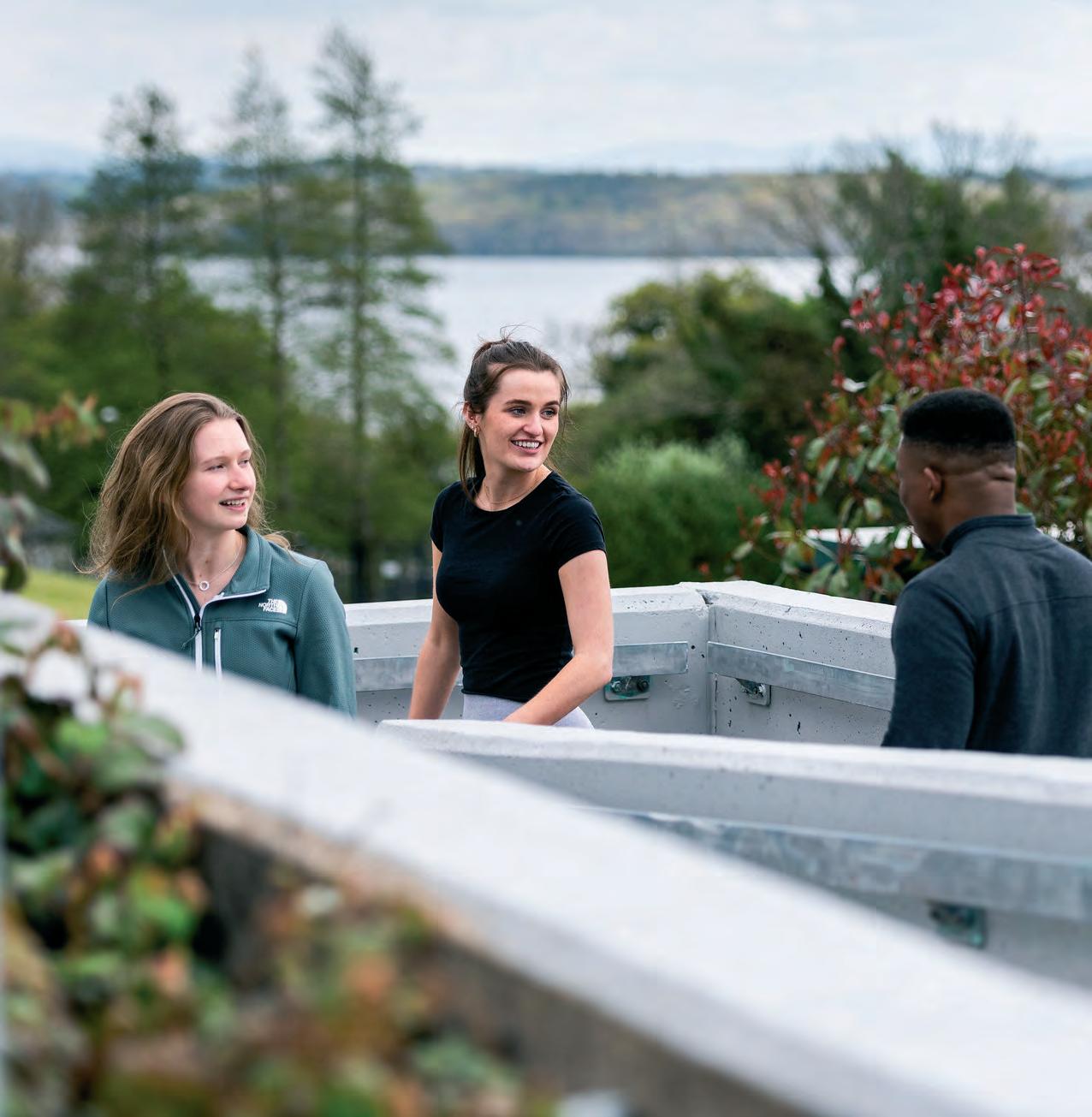

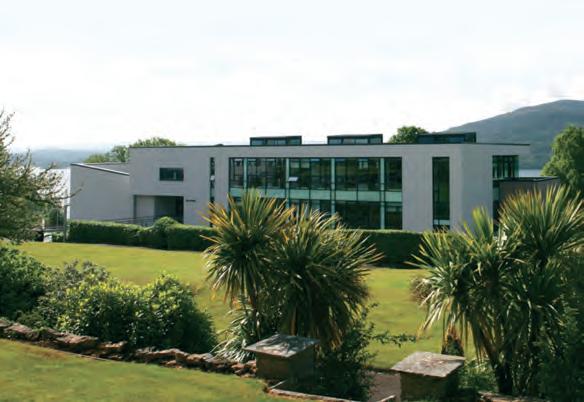
Our clinical and community skills simulation resource, the Dudley Practice Area, is the only facility in the country where student nurses can book sessions outside of timetabled hours to enhance their learning and skills. Other state-of-the-art facilities include food labs, a food sensory analysis suite, science labs, textiles, fashion and design studios, multimedia suites, microteaching rooms, lecture theatres and a spacious auditorium.
With small class sizes, we pride ourselves on our sense of community. A personal approach means every student is important and fully supported throughout their academic journey. We empower students to achieve academic excellence.
Our academic staff are professional, compassionate and engage with their students. As experts in their fields, their knowledge is evident by the high calibre of graduates each year. We also welcome guest lectures from across Ireland and around the world through our global partners, introducing students to an international experience during their studies.
Located in Áras Michael and overlooking Lough Gill, the McKeown Library provides an important intellectual and social space. The service comprises of a physical library, an online library and a knowledge resource. This includes a collection of more than 40,000 volumes in addition to the extensive range of eBooks and eJournals thanks to the integration of services across all ATU libraries.
Complimenting theory with practical skills is evident throughout our programmes. This prepares students for placements in education, nursing, healthcare, community and industry, but also provides a valuable foundation for a rewarding career. With a range of postgraduate opportunities available, graduates can also pursue professional development and career advancement with ATU.
Centre of Excellence
The National Centre of Excellence for Home Economics provides a platform for the future growth and development of the discipline, acknowledging both its historical importance and existing prominence. The centre encapsulates distinguished academic expertise in Home Economics and will be a vehicle through which the teaching and research strengths of Home Economics will continue to be developed and extended.
The Bachelor of Education in Home Economics and Biology is a full-time, concurrent teacher education degree leading to a National Framework of Qualifications (NFQ) Level 8 honours degree. Upon graduation, students will meet all the Teaching Council requirements to be registered as a Newly Qualified Teacher (NQT) of home economics and biology.
Year 1
• Education Studies 1
• General Pedagogics
• Specific Pedagogics: Home Ec
• Specific Pedagogics: Biology
• Inclusive Teaching and Learning
• School Placement 1
• Food Nutrition and Skills
• Introduction to Textiles and Design
• Family Resource Management (FRM): Home Economics Theory and Practice
• Botany
510 (Level 8 2024)
4 Years Minimum Entry Requirements PLUS
• Maths at O6/H7
Paula Doherty Programme Director Paula.Doherty@atu.ie atu.ie/AU985 Erasmus+
• English or Irish at O6/H7
• Biology or Chemistry or Physics or Physics with Chemistry or Agricultural Science or Home Economics at O6/H7
• Garda Vetting
32 Places
Work Placement
Graduates of this programme are qualified to teach home economics and biology in Post Primary to Leaving Certificate higher level. Graduates are provided with a professional and academic qualification enabling them to also pursue careers in a wide range of fields including education, home economics and applied science.
Postgraduate opportunities include Structured PhD (Home Economics), MEd (Home Economics); MA (Contemporary Innovations in Education); MSc (Food Innovation); MSc (Home Economics, Nutrition and Health Promotion). Graduates may also proceed to postgraduate study in education, home economics, biology or related areas in other HEI’s.
School placement is a core element of the teacher education programme. Student teachers undertake school placement on a block release basis in the spring term of every year of their Bachelor of Education programme which is completed in a variety of schools and educational settings.
This four-year programme is the only concurrent initial teacher education programme in home economics and biology in Ireland and fully equips graduates to teach home economics, science and biology in the post-primary sector.
• Animal Diversity
• Human Anatomy and Physiology 1
Year 2
• Education Studies 2
• Specific Pedagogics
• General Pedagogics and Inclusive Teaching & Learning
• School Placement 2
• Food Studies
• FRM: The Family Home
• Human Anatomy and Physiology 2
• Molecular Biology
• Biochemistry 1
Year 3
• Critical Perspectives in Education
• Educational Research Methods
• General and Specific Pedagogics
• School Placement 3
• Applied Food Microbiology
• Textiles, Fashion and Design
• FRM: Resource Management and Consumer Empowerment
• Ecology and Ecosystems
• Biochemistry 2
• Microbiology: Food and Water
Year 4
• Critical Perspectives in Education 2
• School Placement 4
• Nutrition, Diet and Health
• Home Economics Practice in Everyday Life
• FRM: Family and Society
• Environmental Biology
• Molecular Cell Biology
• Biochemistry 3
The Bachelor of Education in Home Economics and Religious Education is a full-time, concurrent teacher education degree leading to a National Framework of Qualifications (NFQ) Level 8 honours degree. Upon graduation, students will meet all the Teaching Council requirements to be registered as a Newly Qualified Teacher (NQT) of home economics and religious education.
atu.ie/AU986
424 (Level 8 2024)
4 Years Minimum Entry Requirements PLUS
• Maths at O6/H7
• English or Irish at O6/H7
• Biology or Chemistry or Physics or Physics with Chemistry or Agricultural Science or Home Economics at O6/H7
• Garda Vetting
48 Places
Work Placement
Erasmus+
Paula Doherty Programme Director Paula.Doherty@atu.ie
School placement is a core element of the teacher education programme. Student teachers undertake school placement on a block release basis in the spring term of every year of their Bachelor of Education programme which is completed in a variety of schools and educational settings.
Graduates of this programme are qualified to teach Junior Cycle and Leaving Certificate home economics and religious education. Graduates are provided with a professional and academic qualification which enables them to also pursue careers in a wide range of fields including education, home economics and religious education.
Further Study Options Postgraduate opportunities include Structured PhD (Home Economics), MEd (Home Economics); MA (Contemporary Innovations in Education); MSc (Food Innovation); MSc (Home Economics, Nutrition and Health Promotion). Graduates may also proceed to postgraduate study in education, home economics, religious education or related areas in other HEI’s.
This four-year programme is the only concurrent initial teacher education programme in home economics and religious education in Ireland and fully equips graduates to teach both subjects at all levels in the postprimary sector.
Year 1
• Education Studies 1
• General Pedagogics
• Specific Pedagogics: Home Ec
• Specific Pedagogics: RE
• Inclusive Teaching and Learning
• School Placement 1
• Food Nutrition and Skills
• Introduction to Textiles and Design
• Family Resource Management (FRM): Home Economics Theory and Practice
• Introduction to Theology
• World Religions
• Introduction to the Bible and Sacred Texts
Year 2
• Education Studies 2
• Specific Pedagogics
• General Pedagogics and Inclusive Teaching and Learning
• School Placement 2
• Food Studies
• FRM: The Family Home
• Christianity: The Crucified God
• Theoretical Perspectives on RE
• Introduction to Ethics
3
• Critical Perspectives in Education
• Educational Research Methods
• General and Specific Pedagogics
• School Placement 3
• Applied Food Microbiology
• Textiles, Fashion and Design
• FRM: Resource Management and Consumer Empowerment
• RE Research Paper
• The Sacred and the Profane
• Applied Ethics in a Globalised World
• Critical Perspectives in Education 2
• School Placement 4
• Nutrition, Diet and Health
• Home Economics Practice in Everyday Life
• FRM: Family and Society
• Philosophies of Secular Belief
• Critical Debates in Theological and Scriptural Studies
• The Call to Justice
The Bachelor of Education in Home Economics and Irish is a full-time, concurrent teacher education degree leading to a National Framework of Qualifications (NFQ) Level 8 honours degree. Upon graduation, students will meet all the Teaching Council requirements to be registered as a Newly Qualified Teacher (NQT) of Home Economics and Irish.
• Education Studies 1
• General Pedagogics
• Specific Pedagogics: Home Ec
• Specific Pedagogics: Gaeilge
• Inclusive Teaching and Learning
• School Placement 1
• Food Nutrition and Skills
• Introduction to Textiles and Design
• Family Resource Management (FRM): Home Economics Theory and Practice
• An Gearrscéal sa Ghaeilge
429 (Level 8 2024)
4 Years Minimum Entry Requirements PLUS
• Irish at H4
• H5 in one other subject
• English at O6/H7
• Maths at O6/H7
• Biology or Chemistry or Physics or Physics with Chemistry or Agricultural Science or Home Economics at O6/H7
• One other subjects recognised for entry purposes at O6/H7
• Garda Vetting
48 Places
atu.ie/AU987 Erasmus+
Work Placement
Paula Doherty Programme Director Paula.Doherty@atu.ie
School placement is a core element of the teacher education programme. Student teachers undertake school placement on a block release basis in the spring term of every year of their Bachelor of Education programme which is completed in a variety of schools and educational settings.
Graduates of this programme are qualified to teach Junior Cycle and Leaving Certificate home economics and Irish. Graduates are provided with a professional and academic qualification which enables them to also pursue careers in a wide range of fields including education, home economics and Irish.
Postgraduate opportunities include Structured PhD (Home Economics), MEd (Home Economics); MA (Contemporary Innovations in Education); MSc (Food Innovation); MSc (Home Economics, Nutrition and Health Promotion). Graduates may also proceed to postgraduate study in education, home economics, Irish or related areas in other HEI’s.
This four-year programme is the only concurrent initial teacher education programme in home economics and Irish in Ireland and fully equips graduates to teach both subjects at all levels in the post-primary sector.
• Teanga na Gaeilge 1
• Teanga na Gaeilge 2
• Education Studies 2
• Specific Pedagogics
• General Pedagogics and Inclusive Teaching and Learning
• School Placement 2
• Food Studies
• FRM: The Family Home
• Athbheochan na Gaeilge
• An Béaloideas agus An Fhilíocht Bhéil
• Teanga na Gaeilge 3
• Critical Perspectives in Education
• Educational Research Methods
• General and Specific Pedagogics
• School Placement 3
• Applied Food Microbiology
• Textiles, Fashion and Design
• FRM: Resource Management and Consumer Empowerment
• Drámaíocht agus Scannánaíocht sa Ghaeilge
• An tSochtheangeolaíocht
• Teanga na Gaeilge 4
• Critical Perspectives in Education 2
• School Placement 4
• Nutrition, Diet and Health
• Home Economics Practice in Everyday Life
• FRM: Family and Society
• An Fhilíocht sa Ghaeilge
• An tÚrscéal sa Ghaeilge
• Teanga na Gaeilge 5
Cúrsa oiliúna tosaigh do mhúinteoirí is ea an Baitsiléir Oideachais san Eacnamaíocht Bhaile agus Gaeilge, agus bainfidh céimithe amach cáilíocht ag Leibhéal 8 ar an gCreat Náisiúnta Cáilíochtaí. Sásóidh céimithe cáilithe riachtanais na Comhairle Múinteoireachta chun clárú mar Mhúinteoirí Nuacháilithe san Eacnamaíocht Bhaile agus Gaeilge.
atu.ie/AU987 Erasmus+
Deiseanna Gairme
Céard iad na hábhair a dhéanfaidh mé staidéar orthu?
Bliain 1
• Stáidéar Oideachais 1
• Oideolaíocht Ghinearálta
• Oideolaíocht: Eacnamaíocht Bhaile
• Oideolaíocht: Gaeilge
• Foghlaim agus Múineadh Ionchuimsitheach
• Socrúchán Scoile 1
• Cothú agus Scileanna Bia
• Teicstílí agus Dearadh
• Bainistiú Acmhainní Teaghlaigh
• An Gearrscéal sa Ghaeilge
• Teanga na Gaeilge 1 & 2
429 (Leibhéal 8 2024)
4 Bliana Riachtanais Iontrála
• Gaeilge ag H4
• H5 in ábhar amháin eile
• Béarla ag O6/H7
• Matamaitic ag O6/H7
• Bitheolaíocht nó Ceimic nó Fisic nó Fisic le Ceimic nó Eolaíocht Talmhaíochta nó Eacnamaíocht Bhaile ag O6/H7
• Ábhar amháin eile atá aitheanta chun críocha iontrála ag O6/H7
• Grinnfhiosrúchán an Gharda Síochána
48 Áit
Socrúchán Oibre
Paula Doherty
Stiúrthóir Clár
Paula.Doherty@atu.ie
Gnéithe Speisialta
Is bunghné den clár oideachais múinteoirí é an socrúchán scoile. Tabharfaidh múinteoirí faoi oiliúint faoin socrúchán scoile i mbloic i dtéarma an earraigh gach bliain le linn an chúrsa i scoileanna agus timpeallachtaí oideachais éagsúla.
Beidh céimithe ón gclár seo cáilithe chun Eacnamaíocht Bhaile agus Gaeilge a mhúineadh sa tSraith Shóisearach agus san Ardteistiméireacht. Beidh cáilíocht phroifisiúnta agus acadúil ag céimithe agus beidh siad in ann dul i mbun oibre in go leor earnálacha, lena n-áirítear oideachas, eacnamaíocht bhaile agus Gaeilge.
Deiseanna maidir le Tuilleadh Taighde
Imeasc na ndeiseanna iarchéime áirítear PhD Struchtúrtha (Eacnamaíocht Bhaile);
M.Ed. (Eacnamaíocht Bhaile); MA (Nuálaíochtaí san Oideachas); MSc. (Nuálaíocht Bhia); MSc (Eacnamaíocht Bhaile, Cothú agus Cur Chun Cinn na Sláinte ). Mar aon leis sin, féadfaidh céimithe tabhairt faoi staidéar iarchéime san oideachas, san eacnamaíocht bhaile, sa Ghaeilge nó i réimsí gaolmhara in ionaid ardoideachais eile.
An raibh a fhios agat?
Tá an cúrsa ceithre bliana seo ar an aon chúrsa oideachais tosaigh do mhúinteoirí san Eacnamaíocht Bhaile agus Gaeilge in Éirinn, agus leis an gcúrsa seo tugtar scileanna do chéimithe an dá ábhar a mhúineadh ag gach leibhéal san earnáil iar-bhunscoile.
Creidiúnú Proifisiúnta
Bliain 2
• Staidéar Oideachais 2
• Oideolaíocht Ábhair
• Foghlaim agus Múineadh Ionchuimsitheach
• Socrúchán Scoile 2
• Eolaíocht Bhia agus Cothú
• An Baile – Dearadh Teicstílí agus Intí
• Athbheochan na Gaeilge
• An Béaloideas agus Filíocht Bhéil
• Teanga na Gaeilge 3
Bliain 3
• Peirspictíochtaí Criticiúla san Oideachas
• Modhanna Taighde Oideachais
• Oideolaíocht Ghinearálta
• Socrúchán Scoile 3
• Micribhitheolaíocht Bhia
• Teicstílí, Faisean agus Dearadh
• Bainistiú Acmhainní & Cumhachtú Tomhaltóirí
• Drámaíocht & Scannánaíocht
• An tSochtheangeolaíocht
• Teanga na Gaeilge 4
Bliain 4
• Peirspictíochtaí Criticiúla san Oideachas 2
• Socrúchán Scoile 4
• Cothú, Aiste Bia agus Sláinte
• Eacnamaíocht Bhaile sa Saol Laethúil
• An Teaghlach agus an tSochaí
• An Fhilíocht sa Ghaeilge
• An tÚrscéal sa Ghaeilge
• Teanga na Gaeilge 5
The Bachelor of Education in Home Economics is a full-time, concurrent teacher education degree leading to a National Framework of Qualifications (NFQ) Level 8 honours degree. Upon graduation, students will meet all the Teaching Council requirements to be registered as a Newly Qualified Teacher (NQT) of Home Economics.
• Food Studies
• Introduction to Textiles and Design
• Family Resource Management (FRM): Sociology of the Family
• Introduction to Scientific Concepts
• Home Economics Studies 1
• Education Studies 1
• General Pedagogics
• Specific Pedagogics: Home Ec
• School Placement 1
475 (Level 8 2024)
4 Years Minimum Entry Requirements PLUS
• Maths at O6/H7
• English or Irish at O6/H7
• Home Economics at O6/H7
• Garda Vetting
16 Places
atu.ie/AU988 Erasmus+
Work Placement
Paula Doherty Programme Director Paula.Doherty@atu.ie
School placement is a core element of the teacher education programme. Student teachers undertake school placement on a block release basis in the spring term of every year of their Bachelor of Education programme which is completed in a variety of schools and educational settings.
Graduates are recognised by the Teaching Council and are fully qualified to teach Home Economics to the highest post-primary level. Graduates are provided with a qualification which enables them to also pursue careers in a wide range of fields including home economics; education; food; textiles; social and family studies.
Graduates have the option to pursue further studies at postgraduate, Masters and PhD Level in home economics and education. Postgraduate opportunities include Structured PhD (Home Economics), MEd (Home Economics); MA (Contemporary Innovations in Education); MSc (Food Innovation); MSc (Home Economics, Nutrition and Health Promotion). Graduates may also proceed to postgraduate study in other HEI’s.
This four-year programme is the only concurrent initial teacher education programme in home economics in Ireland and fully equips graduates to teach both subjects at all levels in the post-primary sector.
• Inclusive Teaching and Learning
• Food Studies
• FRM: The Family Home
• Home Economics Studies 2
• FRM: Sustainable Household Ecology
• Education Studies 2
• Specific Pedagogics: Home Ec
• General Pedagogics and Inclusive Teaching and Learning
• School Placement 2
• Food Studies
• Nutritional and Sensory Sciences
• Textiles, Fashion and Design
• FRM: Resource Management and Consumer Empowerment
• Home Economics Studies 3
• Critical Perspectives in Education 1
• Educational Research Methods
• General and Specific Pedagogics
• School Placement 3
• Food Quality, Nutrition and Health
• Dissertation Home Economics
• FRM: Family and Society
• Home Economics Practice in Everyday Life
• Optional Pathway (see website)
• Critical Perspectives in Education 2
• School Placement 4

BEd
My passion for home economics began in first year at secondary school and I knew even at that early stage that my interest would build into a something I really enjoy learning. Wanting to become a home economics teacher felt like a natural progression and I knew ATU St Angelas was the place to do this.
Not only does the course offer a balance of practical lab work with theory, but I also get to experience school placement each year and this is a great insight into my future career as an educator.
Our small class sizes mean our group connected straight away in year one and we’re all supporting one another along the way. I look forward to registering with the Teaching Council towards the end of my degree and putting everything I’ve learned into practice.
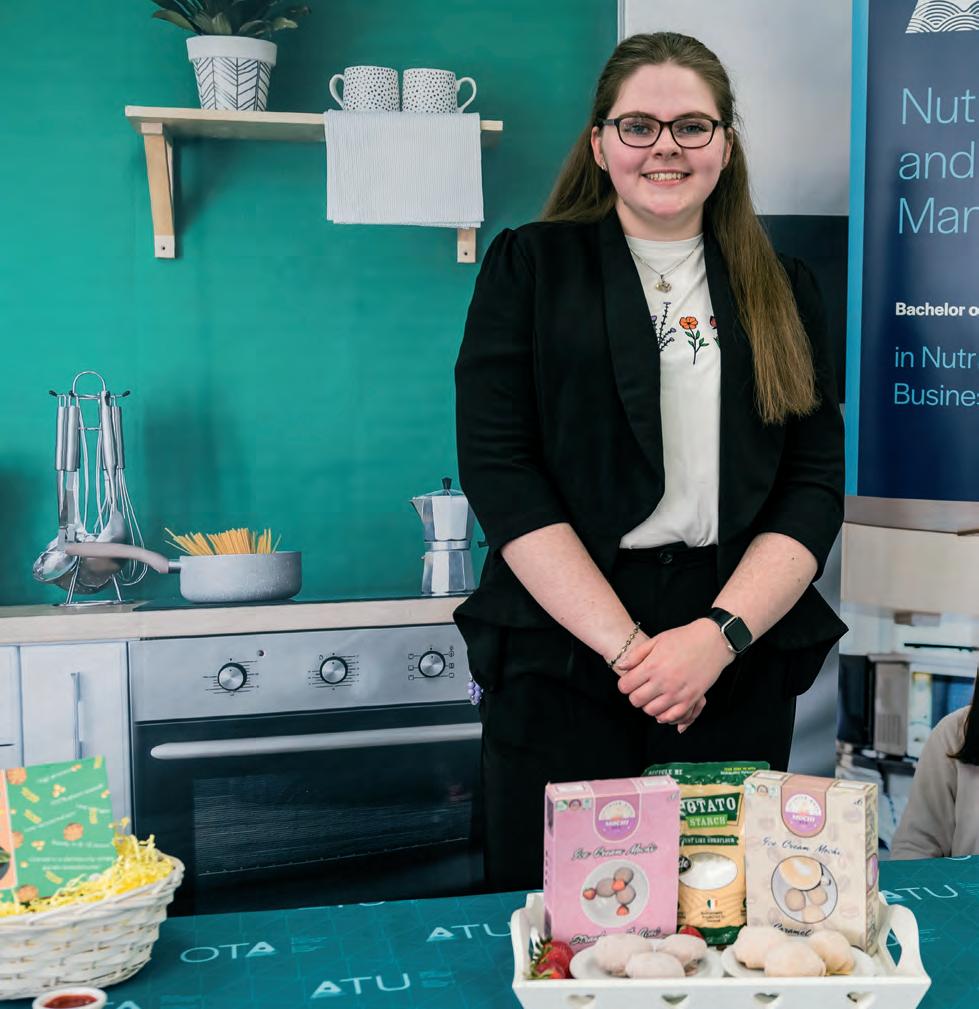
I’ve always been passionate about food and nutrition, and discovering this degree opened my eyes to the many different pathways into the food industry. While I’ve enjoyed all the modules, I’ve especially loved the food and nutrition ones, where I’ve been able to take a creative approach.
One of the best aspects of the degree is the 20-week industry placement in Year 3, which gives you real hands-on experience and a true sense of working in the food industry. My favourite module was New Product Development, where I had the incredible opportunity to create my own food product from start to finish, with the support of my helpful and extremely knowledgable lecturers.
This four-year honours degree programme aims to support students who are passionate about food and nutrition and motivated to acquire business knowledge to excel in the food and beverage sector. Students discover the science and strategy behind the food industry as they explore nutrition and sensory evaluation, food law, and the global trends shaping trade, regulation, and sustainability. Students also learn how modern food production & innovation technologies and labelling legislation impact the market, balancing a blend of academic and practical learning in our dedicated food technology and science laboratories.
Year 1
• Nutrition 1: Nutrition, Diet and Health
• Food Science
• Microbiology 1
• Food Preparation and Culinary Skills
• Introductory Marketing and Finance
• Business Management and Food Legislation
Year 2
• Nutrition 2: Nutrition Through the Life Cycle
• Food Science and Applied Culinary Skills
atu.ie/AU989 Erasmus+
Lead, R&D Process Development Technologist and Food & Drink Analyst.
• Industrial Scale Food Production
• Microbiology 2
• Marketing and Consumer Behaviour
300 (Level 8 2024)
4 Years Minimum Entry Requirements PLUS
• Maths at O6/H7
• English or Irish at O6/H7
16 Places
Work Placement
Roisín Lydon
Programme Director Roisin.Lydon@atu.ie
With many of our graduates employed by large national and multinational Food/Beverage organisations, this degree provides invaluable expertise and skills to graduates as they navigate their career development within the agri-food sector.
Graduates are prepared for a future career in a wide range of roles including: New Product Innovation Lead/ Manager, Sales & Marketing Executive, Market Activations Manager, Packaging Buyer, Compliance Manager, Lead Specification Technologist, Technical / Quality Manager, Operations Team
As students advance through the degree, they build commercial expertise, business planning skills, and leadership abilities. During lectures and placement, students gain hands-on experience in management and strategic decision-making, in preparation for successful careers in the agri-food sector. With a strong foundation in entrepreneurship & enterprise, and a deep understanding of business operations, graduates be ready to lead and innovate in the fast-paced world of food business management.
A core part of this programme is Work Placement in Semester 2 of Year 3. Students get the opportunity to complete a 20 weeks in a food producing company which includes an option for international placement through Erasmus+.
The salaries for graduate Food Technician/NDP roles range between €26,000 to €43,000 and the salary for graduates progressing to Food Product Development. Manager roles range between €45,000 to €90,000, not including car, bonuses, pension and health insurance.
• Principles of Sensory Sciences
Year 3
• Nutrition 3: Lifestyle, Health and Disease
• Digital Marketing
• Operations Strategy
• Marketing Research
• Innovations in Food Processing and Preservation
• 20-week Placement
Year 4
• Public Health Nutrition
• Food Quality Management and Auditing
• Strategic Management
• Research Skills
• Training in HACCP and BRC Principles
• Food Innovation and New Product Development
• International Food Policy
• Entrepreneurship and Enterprise Development
Additional certification can be achieved through the programme:
- Food Safety Professionals Association (FSPA)
- Marketing Instutite of Ireland (MII)
The role of a Home Economist in communities is very much established worldwide. This level 8, four-year degree fulfils the gap that is currently demanded and required within Irish society. It is designed to attract applicants who are passionate about home economics and aspire to be home economists advocating for sustainable health and wellbeing of individuals, families and communities.
atu.ie/AU990
Year 1
• Food Preparation and Culinary Skills
• Nutrition, Diet and Health
• Introduction to Textiles and Design
• Sociology of the Family
• Child Development
• Strategic Communication
• Consumer and Family Financial Literacy
Year 2
• Interior and Textiles Design
• Food Science and Nutrition
350 (Level 8 2024)
4 Years Minimum Entry Requirements PLUS
• Maths at O6/H7
• English or Irish at O6/H7
• Home Economics at O6/H7
• Garda Vetting
32 Places
Work Placement
Erasmus+
Sonya Coffey Programme Director
Sonya.Coffey@atu.ie
Year 4 of the programme allows students to specialise within a specific area of home economics i.e. food or textiles, fashion, design or family resource management. This year will also allow students to investigate and research an area of interest.
Graduates will find job opportunities in governmental or NGO’s focusing on family and child wellbeing; consumer advocacy; and health promotion. Graduates can work with both private and state organisations as food advisors, or community home economists. Commercial pathways in the private sector (e.g. food, textiles, fashion) are also possible.
*Please note, the BA in Home Economics is not an initial teaching qualification.
Postgraduate programmes (Masters and Doctoral level) can be pursued in the areas of education*, home economics, health promotion; food and nutrition; health coaching and wellbeing; child development; child, youth and community, textiles and fashion. Students who successfully complete the BA in Home Economics may progress to a Professional Master of Education (PME) which will enable graduates to teach home economics to Junior Certificate and Leaving Certificate levels.
• Family and Consumer Affairs
• Health Promotion
• Health and Wellbeing Economics and Policy
Year 3
• Food Microbiology, Processing and Preservation
• Sensory Sciences
• Textiles, Fashion and Design
• Family Resource Management and Consumer Empowerment
• Preparation for Placement
• Work Placement / Study Abroad (Erasmus+)
Year 4
• Family: Policy and Practice
• Home Economics Artisan Enterprise
• Home Economics Studies
• Family Advocacy in the Community
• Public Health Nutrition
• Home Economics Research Project
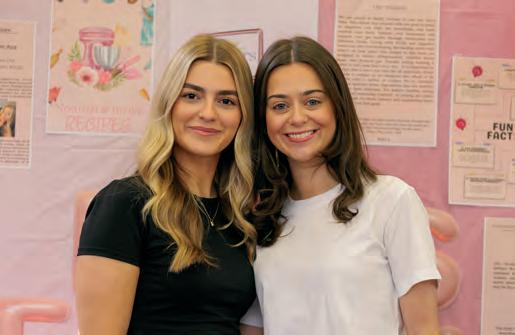
General Nurses care for persons of all ages, in hospitals, GP practices and in the communities - working as part of a team of healthcare professionals who look after a person’s physical; psychological; spiritual and social wellbeing. Caring for persons with various types of conditions (acute & chronic physical illnesses), Nurses also have a key role in helping those who have had an illness to recover to their optimum well-being.
atu.ie/AU991
4 Years
346 (Level 8 2024)
Minimum Entry
Requirements PLUS
• Maths at O6/H7
• English or Irish at O6/H7
• Biology or Chemistry or Physics or Physics with Chemistry or Agricultural Science at O6/H7
• Garda Vetting
• Medical Clearance
92 Places
Work Placement
Erasmus+
Dr Evelyn McManus Programme Director Evelyn.McManus@atu.ie
Graduates will be eligible to register as a General Nurse with the Nursing and Midwifery Board of Ireland (NMBI) having obtained a universityaccredited honours degree. The programme is offered in conjunction with Sligo University Hospital and other Health Service Executive (HSE) organisations and groups in the Western region.
Graduates will be in a position to work in various settings such as ward based nursing, community or in specialists’ areas. Graduates may decide to specialise in other disciplines of nursing (e.g. midwifery); management or education. As a nurse, there are career opportunities available at regional, national and international levels.
Many graduates choose to undertake further study to enhance their nursing practice and career opportunities. We offer a number of postgraduate options which include nursing studies, international healthcare management, disability studies, applied health and wellness coaching as well as a suite of flexible learning standalone modules to choose from.
In each semester students will undertake at least one clinical module whereby time will be spent in the hospital or community learning the art of general nursing. Students spend over half of the programme in the hospital or community settings. In the final year students are in the hospital or community from January to September and are very much part of the team of health care professionals delivering care.

Year 1
• Applied Biological Sciences 1
• Applied Social Sciences 1
• Theory and Practice of Nursing
• Across the Lifespan in Acute and Community Setting 1
• Nursing Practice and Clinical Decision Making 1
• Nursing Practice Skills 1
• Foundations of Communication
• Health and Health Promotion
• Professional Foundations of Nursing
• Practice Assessment
• Applied Biological Sciences 2
• Applied Social Sciences 2
• Principles of Pharmacology
• Theory and Practice of Nursing Across the Lifespan in Acute and Community Setting 2
• Nursing Practice and Clinical Decision Making
• Nursing Practice Skills
• Health and Health Promotion
• Introduction to Research
• Practice Assessment
Year 3
• Applied Biological Sciences 3
• Applied Social Sciences 3
• Theory and Practice of Nursing Across the Lifespan in Acute and Community Setting 3
• Nursing Practice and Clinical Decision Making 3
• Nursing Practice Skills 3
• Health and Health Promotion 3
• Older Person Care
• Nursing Leadership 1
• Practice Assessment
Year 4
• Theory and Practice of Nursing Across the Lifespan in Acute and Community Setting 4
• Nursing Practice and Clinical Decision Making 4
• Nursing Practice Skills 4
• Research for Nursing Practice
• Nursing Leadership 2
• Practice Assessment
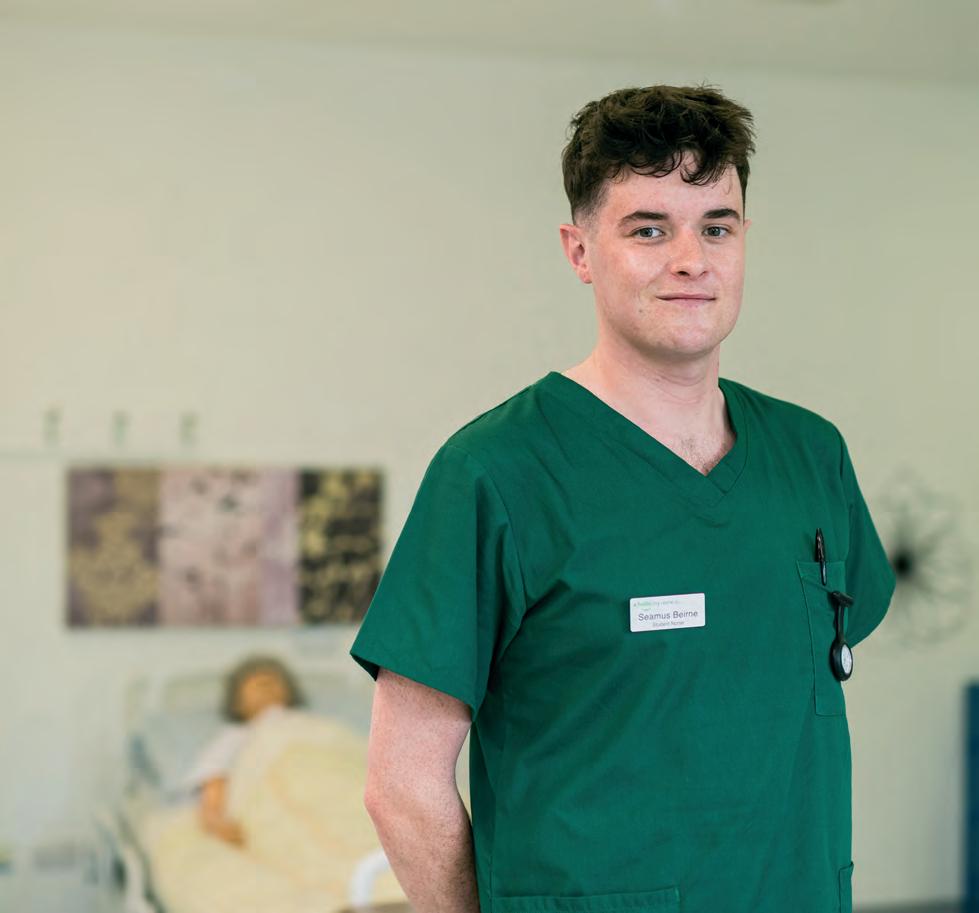
I have wanted to be a nurse for as long as I can remember. From a young age, I recognised the importance of having empathetic, dedicated professionals in our society to support people with additional needs and promote their independence and quality of life - and that is exactly what Intellectual Disability Nursing embodies.
For anyone considering this degree, just know that you will be so well supported by dedicated and passionate staff both on campus and during each practice placement in the community. This is one of the most rewarding careers out there, and it’s that sense of purpose which will get you through any challenging times ahead.
This is a four-year degree pre-registration programme focusing on the theory and practice of Intellectual Disability Nursing to support people throughout their life span. The aim of the programme is to prepare practitioners as analytical, reflective and independent thinkers who will practice as competent, accountable, registered nurses who support inclusive and fulfilling lives for people with an intellectual disability.
Year 1
• Applied Biological Sciences 1
• Applied Social Sciences 1
• Professional Foundations of Nursing
• Nursing Practice Skills 1
• Foundations of Communication
• Health and Health Promotion 1
• Concepts and Paradigms of Disability
• Human Rights and Equality
• Person-Centredness
• Intellectual Disability Nursing Studies 1
4 Years
282 (Level 8 2024)
Minimum Entry Requirements PLUS
• Maths at O6/H7
• English or Irish at O6/H7
• Biology or Chemistry or Physics or Physics with Chemistry or Agricultural Science at O6/H7
• Garda Vetting
• Medical Clearance
35 Places
Work Placement
Ursula.Gilrane@atu.ie atu.ie/AU992 Erasmus+
Graduates work within the community or with families and other professionals or professional services such as schools, respite services and supported employment agencies. Graduates may also specialise and work with persons who have particular challenges such as complex physical health needs, autism spectrum disorders, behaviour or mental health challenges.
Many graduates choose to undertake postgraduate study to enhance their nursing practice and career opportunities. These include nursing studies, cognitive behavioural therapy, international healthcare management, applied health and wellness coaching as well as a suite of flexible learning standalone modules to choose from.
Ursula Gilrane Programme Director
In each semester students will undertake at least one practice module whereby time will be spent in intellectual disability services, and schools learning how to support persons with an intellectual disability in their lives.
Intellectual disability nursing is based on the principles of human rights, equality, person-centredness and empowerment. These principles underpin the achievement of autonomy, active participation, inclusivity for the person and the delivery of quality life, health and social care. Registered Nurses Intellectual Disability (RNID) collaborate with the person with intellectual disability, their family, advocates and members of the multi-professional and multiagency teams to enable the person to live within their community.

• Person Centred and Empowering Support 1
• Practice Assessment
Year 2
• Applied Biological Sciences 2
• Applied Social Sciences 2
• Nursing Practice Skills 2
• Health & Health Promotion
• Introduction to Research
• Principles of Pharmacology
• Intellectual Disability Nursing Studies 2
• Intellectual Disability, Life and Social Skills 1
• Person Centred and Empowering Support 2
• Practice Assessment
Year 3
• Applied Biological Sciences 3
• Applied Social Sciences 3
• Nursing Practice Skills 3
• Health and Health Promotion 3
• Nursing Leadership 1
• Older Person Care 5
• Intellectual Disability Nursing Studies 3
• Intellectual Disability, Life and Social Skills 2
• Person Centred and Empowering Support 3
• Practice Assessment
Year 4
• Research for Nursing Practice
• Nursing Leadership 2
• Intellectual Disability Nursing Studies 4
• Nursing Practice Skills 4
• Person Centred and Empowering Support 4
• Practice Assessment
Clár Rochtana
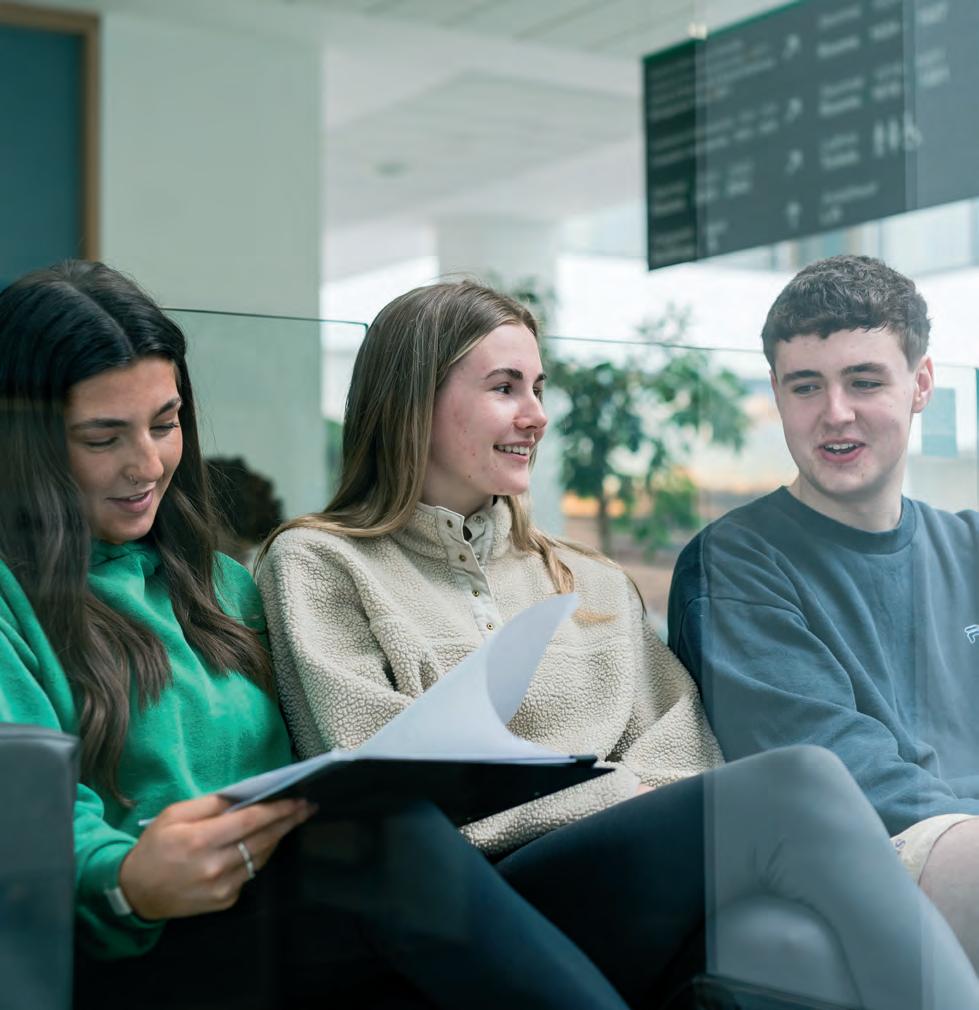
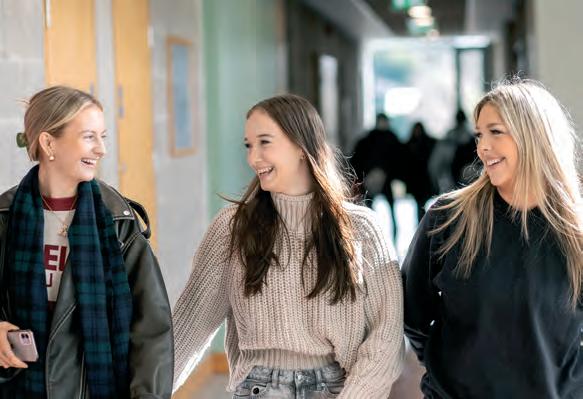
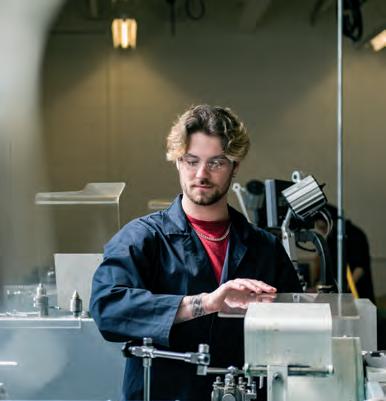
This programme is designed to provide participants with an alternative route into university. Students who are successful on this programme will have the educational qualification for admission to higher education programmes in a wide range of disciplines at ATU. This will not depend on the particular electives chosen. The skills, knowledge and competencies developed by students during this programme should ensure a reasonable prospect of success in subsequent studies.
atu.ie/access-for-higher-education
On successful completion of this certificate, students are eligible to apply for undergraduate programmes across ATU (quotas apply on some programmes).
Applications are made directly through ATU and not through the CAO. To apply or to receive more information, please email access.donegal@atu.ie
Semester 1
• Application of Numbers
• Learning Skills and Personal Development
• ICT
• College Skills and Career Planning
Semester 2
STEM Stream
• Academic Writing
• Maths for STEM
Plus 2 from
• Science
• Introduction to Computing
• Introduction to Engineering
Humanities Stream
• Academic Writing
• Research Fundamentals
Plus 2 from
• Social Care and Education
• Business and Law
• Tourism and Sport
• Introduction to Design Principles
Electives are offered subject to sufficient demand
074 91 86170
access.donegal@atu.ie
• School leavers between the ages of 17-22 years who have been out of school for at least two years and who meet the socio-economic and academic criteria as set down by the university.
• Adult students 23 years of age or over on 1st January of the year of application to the Access Programme. There are no specific entry requirements, such as Leaving Certificate, but applicants may have to sit an aptitude test or undergo an interview.
• Current LCA students who have 160 credits may apply.
There are no fees to study this programme. The Certification in Access for Higher Education (Access Programme) is free.
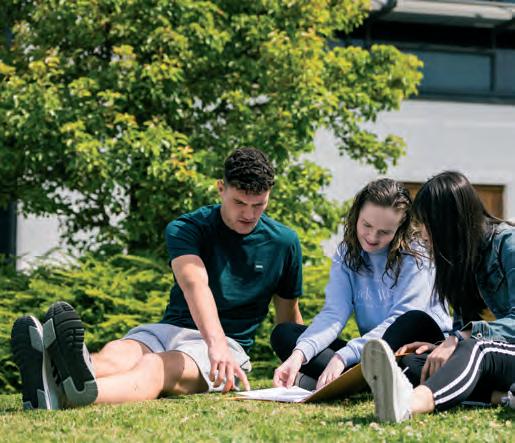


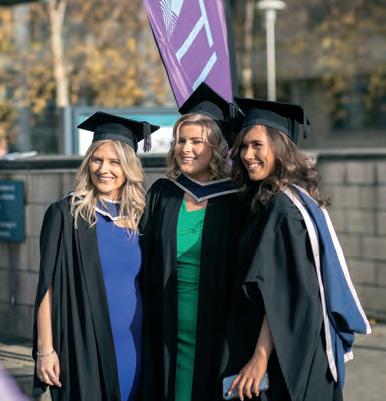
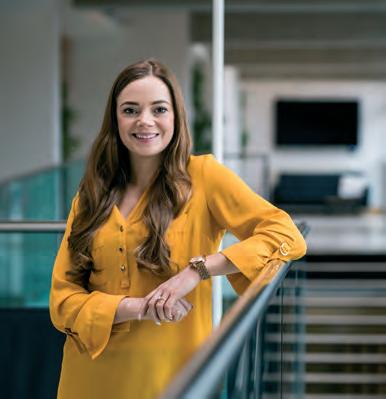
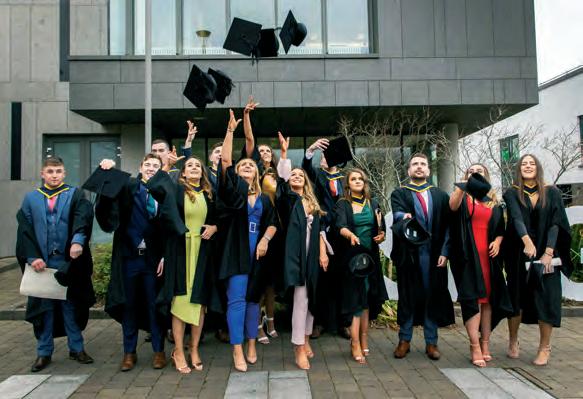
With a variety of postgraduate options available, many of our students continue their studies with ATU. Our students also become members of The ATU Alumni Network.
At ATU, we understand that every student’s journey is unique. We provide 120+ flexible, part-time and full-time study options from a wide range of disciplines to suit your needs and aspirations. Whether you’re looking for an immersive on-campus experience, the convenience of online learning or something in between, we have the perfect masters for you.
Built on the expertise of our academic team and in collaboration with business partners and industry leaders, our programmes are developed for the real-world. We offer programmes in areas such as business, education, design, arts, engineering, technology, science and health. For more information, please visit atu.ie/masters
ATU Alumni is a vast network of ATU graduates, leaders and innovators living and working across the globe. As a university our connection with our alumni is a lifelong one. The ATU Alumni Network keeps alumni connected to each other and to the university through lifelong learning, networking opportunities and invitations to participate in a range of alumni programmes and events.
For current students, our ATU Alumni Mentorship Programme offers valuable guidance and support to help students transition from university life to professional careers. We also offer graduates of an ATU level 8 degree a 20% reduction on academic fees if they choose to pursue a taught masters programme at ATU. For more information, please visit atu.ie/alumni
ATU offers over 470 part-time, online and flexible learning programmes that respond to student demand and deliver skills needed in industry. Our programmes support students at all stages, regardless of location, to access and continue lifelong learning and develop new skills. From short courses to masters, study part-time in a flexible learning environment designed to suit you. For more information, please visit atu.ie/flexible
Roghanna Eile Staidéir
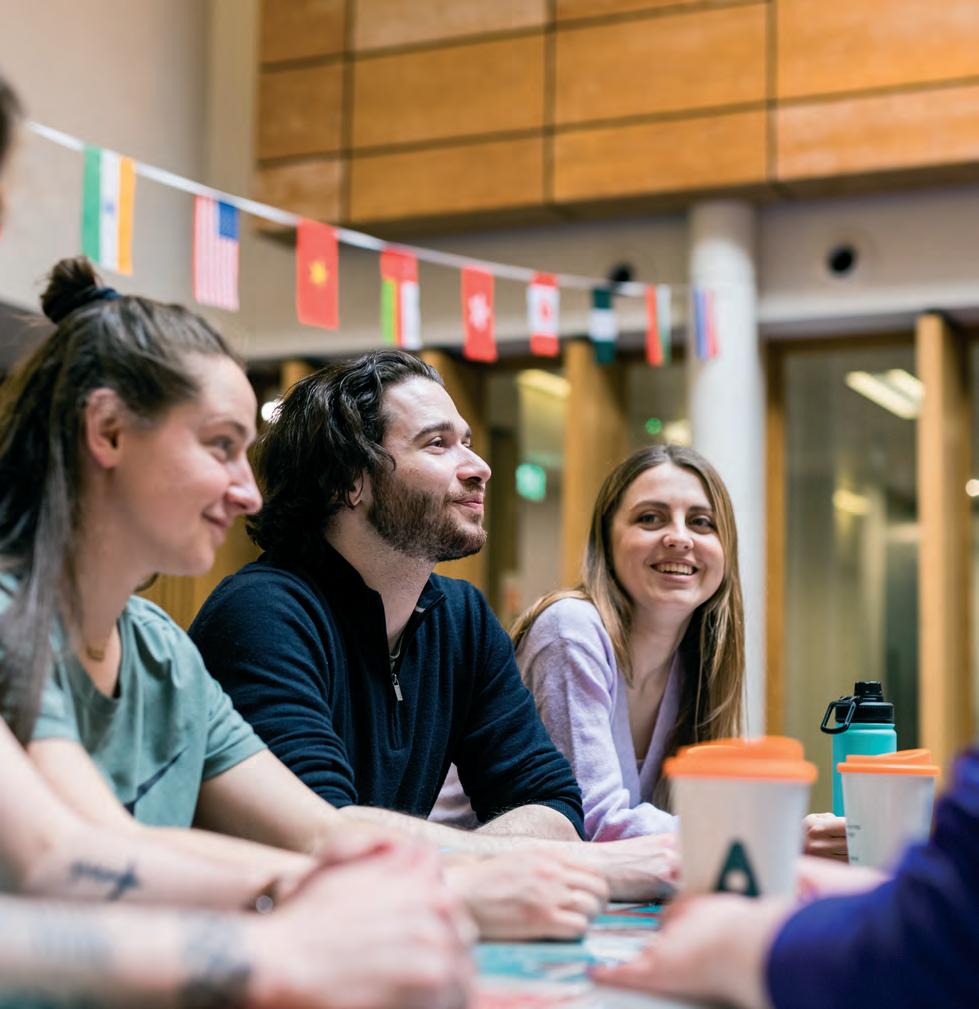

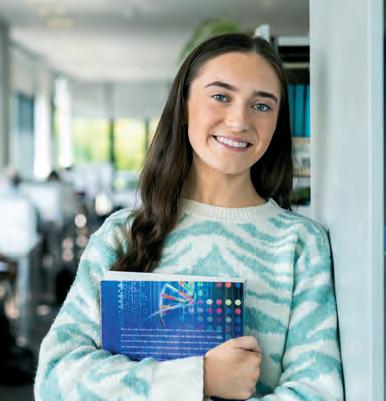

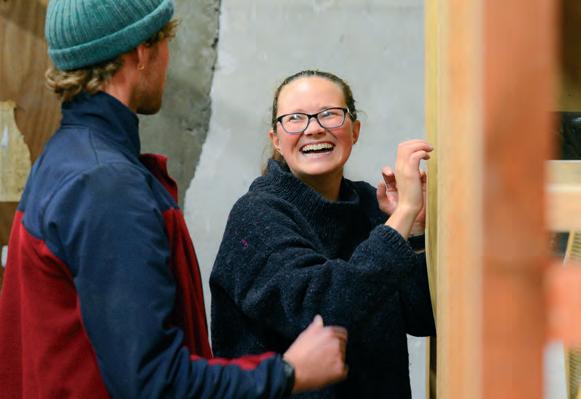
Alongside our extensive range of full-time on campus CAO programmes,
ATU is proud to offer a wide variety of study options and ways in which you can take the next step in your academic journey.
With trade, professional and industry-led apprenticeships, ATU continues to improve our facilities and resources to increase the capacity and range of apprenticeships available across our campuses. To learn more about the apprenticeships on offer, please go to page 316.
Dedicated progression pathways now exist across our region to enable students to start a degree in their local Education Training Board (ETB) before completing a degree at one of the ATU campuses in the region. For more information and to discover the degree options available, please go to atu.ie/tertiarydegrees
Students who successfully complete our Certification in Access for Higher Education (Access Programme) will obtain the educational qualification for admission to Higher Education programmes in a wide range of disciplines. For more information, please go to page 310.
ATU offers over 470 part-time, online and flexible learning programmes that respond to student demand and deliver skills needed in industry. Our programmes support students at all stages, regardless of location, to access and continue lifelong learning and develop new skills.
From short courses to masters, study part-time in a flexible learning environment designed to suit you. Our graduates are equipped with the skills and confidence to excel in their chosen career, create change and build their future. For more information, please visit atu.ie/flexible
Project WAVE (working towards academic and vocational equity) provides individuals with intellectual disabilities the opportunity to attend university. The comprehensive programme addresses students’ social, academic and vocational needs. Students in Project WAVE experience university life at ATU by attending classes and participating in clubs and societies.
Students can choose between four different ATU campus locations to study, where the same mandatory subjects will be covered. Additional elective subjects will be available, depending on the campus chosen. For more information or to apply, please go to atu.ie/wave

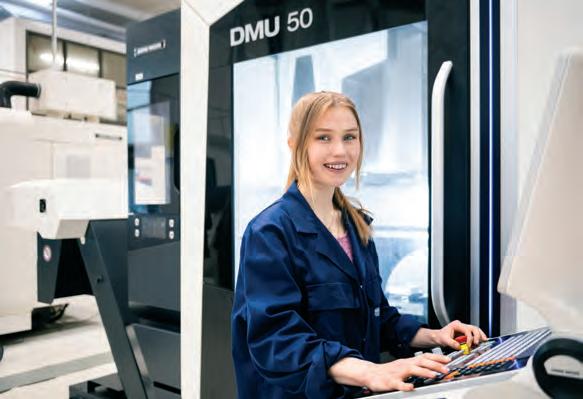
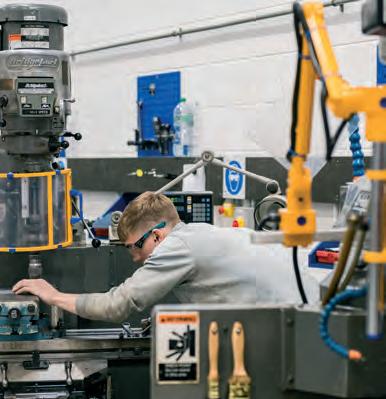

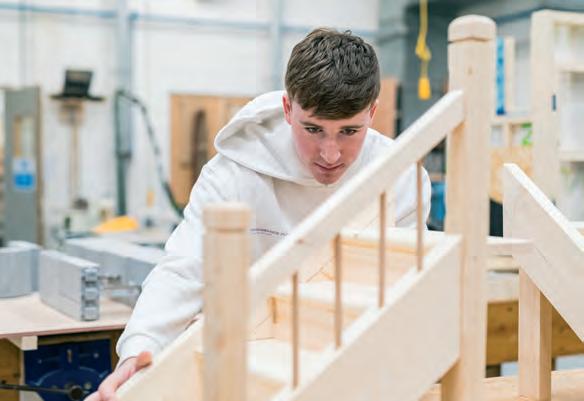
Apprenticeships are structured education and training which formally combines and alternates learning in the workplace with learning in an education and training centre. ATU offers a number of professional and trade focused apprenticeship programmes.
ATU Galway Mayo Apprenticeship Programmes
Electrical
Motor Mechanic
Wood Manufacturing and Finishing
ATU Donegal Apprenticeship Programmes
Electrical
Metal Fabrication
Refrigeration and Air Conditioning
ATU Sligo Apprenticeship Programmes
Carpentry and Joinery
Electrical Toolmaking
ATU Galway Mayo Professional Apprenticeships
Civil Engineering
Manufacturing Engineering
ATU Sligo Professional Apprenticeships
Civil Engineering
Insurance Practice
Manufacturing Engineering
Transport Operations and Commercial Driving
All apprentices apply through www.apprenticeship.ie
Iarratais agus Riachtanais Iontrála



At ATU we provide many entry routes to ensure equality of opportunity to higher education. Whether you’re a mature student, have completed an FET-QQI course, are an EU applicant, or are a Leaving Certificate applicant, we have a route for you to achieve your educational goals.
We offer common entry routes across many disciplines where you can study a broad range of subjects before choosing what area to specialise in. Have a look at our undergraduate programme pages for more information on the common entry options available across our campuses.
ATU offers programmes from Levels 6 to 10 on the National Framework of Qualifications. This “ladder system” of progression between programmes provides a pathway for students to progress from Higher Certificate to Ordinary Bachelor Degree and on to Honours Bachelor Degree and Postgraduate levels. Students can choose to progress to an add-on directly after completing their qualification or they can return at a later stage.
Progression from a Level 6 or Level 7 programme is a useful option. Level 6 and Level 7 programmes often have lower points and entry requirements than the level 8 option for the same programme. The initial commitment is reduced, allowing for flexibility, but applicants can choose to progress to the Level 8 degree along with their classmates if they so wish. Graduates of a Level 6 or Level 7 programme can also return to complete the Level 7 or Level 8 degree at a later stage. Level 6
Applications for entry to ATU’s first-year full-time undergraduate programmes, at Levels 6-8, are made through the Central Applications Office (CAO). The CAO website cao.ie provides helpful videos and information on all aspects of the CAO process. Applications open during November for programmes starting in September of the following year.
Filling out the CAO form can seem complex, but a small amount of initial research can make this an easy process. The CAO website has lots of valuable video resources, including a detailed demonstration of the application process – it is worth investigating these resources before commencing the application process. Check the CAO website to make sure you are aware of their opening and closing dates and ensure you complete your application on time as no exceptions are made for missed deadlines. Your Career Guidance Counsellor, family or friends who have experience with the CAO application process may help you with your options and perhaps support you to complete your application correctly.
It is important to reflect on the programmes you select in your CAO application and to consider where they are situated in your order of preference. Investigate if there are alternative routes to the programme and career you wish to enter – the more limited your CAO application is, the more limited your options will be. Students can apply for up to twenty courses on their CAO application – ten on the level 8 list and ten on the level 6/7 list. Therefore, if students only complete the level 8 list, and ignore the level 6/7 list, they will halve their chances of getting an offer of a college course.
Applicants for Direct entry, i.e. to Year 2 or higher of an undergraduate programme, or for postgraduate programmes, must apply directly to ATU. If you wish to apply for direct entry, you must have already achieved sufficient higher education credits in a related area.
There are five main application types:
1. Application based on the Irish Leaving Certificate
2. FETAC and QQI applicants
3. School leavers from EU/EEA countries and from UK/NI
4. Mature Applicants
5. International Applicants from outside the EU/EEA
The entry requirements vary depending on the type of applicant you are and the level of the programme for which you apply. Some entry requirements apply across all or most programmes. For instance, you will always need to present either Irish or English. For most programmes, you will also need to present maths. Students are expected to be physically and mentally able to participate in their programme of study.
Additional specific requirements may also be required on programmes such as garda vetting, occupational health screening, vaccination, and mandatory practice or work placements that may require students to travel to attend and the ability to perform certain tasks e.g. swim 50 meters. The requirements vary per programme and are normally listed on programme webpages or publications. Please contact admissions@atu.ie if you require more information.
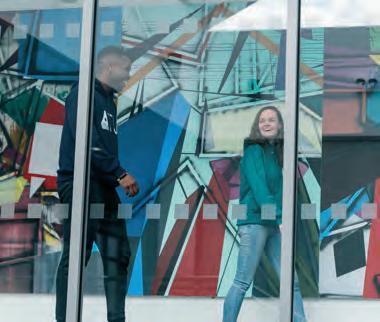
Higher Certificate (Level 6) and Ordinary Degree (Level 7)
5 Leaving Certificate subjects at grade O6/H7 or better
Subjects must include either English or Irish
Minimum points score of 160 points
Maths with a minimum grade of O6/H7 or F2* is the minimum requirement for most programmes. However, there are a few programmes for which Mathematics is not an entry requirement and others for which foundation maths may not be sufficient or for which the minimum grade required is higher, e.g. H5 or better. It is important to check individual programme descriptors for specific maths requirement.
Honours Degree (Level 8)
6 Leaving Certificate subjects
A minimum of 2 subjects at grade H5 or better
Remaining subjects at grade O6/H7 or better
Subjects must include either English or Irish
Maths with a minimum grade of O6/H7 or F2* is the minimum requirement for most programmes. However, there are a few programmes for which Mathematics is not an entry requirement and others for which foundation maths may not be sufficient or for which the minimum grade required is higher, e.g. H5 or better. It is important to check individual programme descriptors for specific maths requirement.
* Foundation Level Mathematics is accepted for the purposes of entry requirements in the case of any programme where Higher or Ordinary Level Mathematics is not a requirement.
Foundation maths at and above grade F2 (80%) is accepted as meeting the maths requirement for most, but not all, programmes. Typically, foundation maths is not accepted for our engineering, education or nursing programmes. Nor is foundation maths accepted for some ab initio level 8 programmes. Please check individual programme descriptors to see the minimum maths requirement.
Where accepted, points for qualifying Foundation Maths are:
20 points
F2 12 points
Bonus points for Honours Maths
Students who achieve grade H6 or better in the Higher (Honours) maths exam will receive 25 additional points. Bonus points will also apply to Honours maths results from previous years. For maths results from 2016 and earlier, applicants will need to have achieved a grade of HD3 or better to qualify for bonus points.
English/Irish
You will need O6/H7 or better in either English or Irish in the Irish Leaving Certificate (or equivalent) for all programmes.
Applicants whose first language is not English will also need to provide an internationally recognised qualification in English, e.g. IELTS Level 6 or similar.
Irish Leaving Certificate Grades and associated Points
The Leaving Cert grading system changed in 2017; for those presenting Leaving Certs from 2016 or earlier the equivalent minimum grades are:
Information on the Common Points scale as well as a Calculator Tool that can be used to work out points based on Leaving Certificate results, are available via the Applicant Resources section of the CAO website, cao.ie
ATU reserve a quota of places for QQI FET applicants on all programmes. Applicants must apply through the Central Applications Office and provide their Personal Public Service Number (PPSN) on the CAO application form. Applicants must be studying for or have achieved a full major QQI FET Level 5 or higher award. A component certificate (minor award) will not meet the minimum entry requirements. If you have accumulated your major award over several years you will need to apply to QQI for the major award.
The following minimum entry requirements will apply to graduates of QQI/FET Major Award at Level 5 or 6.
Level 6 Higher Certificate: A pass in any QQI/ FET Level 5 or Level 6 Major Award.
Level 7 Bachelor’s Degree: A pass in any QQI/ FET Level 5 or Level 6 Major Award.
Level 8 Honours Degree: A pass with distinction grade in at least three components in any QQI FET Level 5 or 6 Major Award.
Additional specific requirements apply to some programmes. Several programmes require an essential major award in a related discipline and specific modules to meet the minimum entry requirement. Please refer to the relevant Undergraduate course page on www.atu.ie for specific details on QQI Entry Requirements for these courses; they can also be viewed on the QQI FET Applicants section on the CAO website cao.ie
QQI FET results cannot be added to Leaving Certificate points. Where applicants have taken both exams, the QQI FET award will be considered for Round 0 and if not successful, the Leaving Certificate results will be considered for Round 1. For programmes having a specific QQI FET quota, results are considered in CAO Round 0 (early August). QQI FET scores will not normally be considered after Round 0 where the quota had been met. If the quota remains unfilled after Round 0 additional offers for this quota may be made in subsequent rounds.
Advanced Entry application can be used by an applicant to apply for entry to stage 2 of a programme at ATU, following completion of a related QQI FET Level 6 major award. Please see the Advanced Entry page at atu.ie
Iarrthóirí ón Ríocht Aontaithe agus Ó Thuaisceart Éirinn
An award at Level 3 on the UK framework is the minimum entry standard for year one.
Applicants who have completed a recognised award at UK Framework Level 3 or higher are eligible for consideration for Year 1.
Standard Applicants: those presenting a combination of GCE A-levels, AS-levels and GCSEs.
Non-Standard Applicants: those presenting Awards other than GCE/GCSE combination. Non-Standard Applicants include BTEC, AVCE, Foundation Degree and IGCSE award holders.
Applicants must meet the minimum entry requirement for the programme they are applying for before they can compete for a place.
The subject entry requirements for each programme and any extra entry requirements, (e.g. a Portfolio may be required for some Art Courses) must also be met.
The CAO issues offer of places based on a points competition. Applicants Examination results are “scored”, with the highest grades getting highest points. The more points you achieve the better your chance of getting an offer.
All applications for entry to full-time undergraduate courses in ATU are made via the Central Applications Office at cao.ie
Applications open in November each year for entry the following September.
The CAO have an informative and helpful guide titled “Applying for the CAO with GCE/A/AS Level & GCSE Qualifications”
The CAO Handbook gives details of the application process.
For ATU Level 6 or Level 7 programmes
applicants will need:
Five different recognised GCSE/GCE subjects.
These must include at least one GCE A-Level at grade E or better.
The remaining four may be drawn from GCSE (Grades A-C only) or AS grades A-E.
Subjects must include either English or Irish - minimum acceptable grade, GCSE at C or higher.
In most cases applicants will be required to present maths, where required, the minimum acceptable grade is usually GCSE grade C, but a higher grade may be specified for some programmes, especially in engineering or computing.
Where specific other subjects are required the minimum acceptable grade, GCSE at C or higher.
For ATU Level 8 ab initio programmes
applicants will need:
Six different recognised GCSE/GCE subjects.
These must include at least two GCE A-Levels at grade C or higher.
The remaining 4 can be drawn from GCSE (Grades A-C only), or from A-Levels or AS grades A-E.
Applied A-Level subjects may be used to meet the minimum requirements.
It is possible to meet the minimum requirements through a combination of exams taken over more than one year.
Meeting the minimum requirements outlined may not be sufficient to guarantee selection. Entry is competitive and ranking is based on points. Points are derived from GCE A-Level grades. The better your GCE results the better your chance of selection.
Selection is a two-step process. First, you must matriculate or meet the minimum requirements outlined for the programme. Only then will we move to step 2, the calculation of points. GCSEs count toward matriculation but are not awarded any points. Centralised and automated scoring via CAO is based on A-levels and (where applicable) AS-level results only.
See cao.ie for details of the scoring mechanism.
CAO can generally get current year results directly from Exam Boards, provided you have given them appropriate information about your exam centre, exam number, etc.
If you wish to have GCE/ GCSE (or other UK Level 3 awards) from previous years considered, you must supply CAO with evidence. Certified photocopies of Awards or statements of results - as produced by an Examining Board - should be supplied to CAO. A certified photocopy is one that has been signed by your school or by a notary public as a true and unaltered copy of the original.
It is important to submit supporting documentation on time. Normally, supporting documentation is expected to reach CAO within 10 days of applying.
If you supply late documentation, you should alert the ATU Admissions office to make sure that it is not overlooked. The final deadline for submission of supporting documents is 12 days before the issue date for any round of offers. Documents submitted after this deadline will be considered on the next available round, provided places are still available.
Awards other than GCE/GCSE combination are regarded as non-standard and are not included in CAO centralised automated processing. If you are including UK awards other than the standard GCE/GCSE combination as part of your application, you will need to submit supporting documents. Details of the alternate qualification(s) should be supplied to CAO (if applying for entry to the first year) or directly to ATU (if applying for advanced entry, i.e. entry to Years 2, 3, or 4).
Whether or not a non-standard award will be recognised, and to what degree, will depend on the framework level, the learning outcomes achieved, and how those learning outcomes fit in with the prerequisites of the programme for which application is being made.
ATU will consider awards at UK Framework Level 3 or higher, including BTECs, AVCs, GNVQs, etc.
Please attach the following for any non-standard awards you may be presenting at UK Level 3 or higher
1. The Award Certificate
2. A transcript of results - showing subject is taken and grades achieved
3. A copy of the syllabus or the programme schedule showing modules are taken, credits that apply and expected learning outcomes.
Except for GCSE certificates at grade C or higher, awards below UK framework Level 3 do not contribute to matriculation and will be disregarded.
CAO points are assigned to the exam grades presented by candidates who meet the minimum entry requirements. Below is our points scoring system:
Please Note:
For more information, please visit atu.ie/northern-ireland or email admissions@atu.ie
BTEC Award TitlesBTEC Award Titles Generally, Meets Matriculation for Other
90 Credit Diploma
Extended DiplomaDiploma (2010)
Subsidiary Diploma Level 6/7 only For some high–demand programmes there is a very limited quota of places for those presenting vocational awards, such as BTEC or QQI Level 5 awards from ROI
Diploma Certificate (pre-2010)All L6 /L7/L8 Programmes, however conditions or restrictions or limited vocational quotas may apply for high-demand programmes
For pre-2010 BTECs a National Certificate is the lowest acceptable award. Each module is scored, pass 1, merit 2, and distinction 3. The total score is then derived using the following formula (sum of scores/ number of modules x 3) x 390.
Applicants presenting any award at Level 4 or higher on the UK framework may be considered for Advanced Entry into a cognate area. Applicants for Advanced Entry should apply directly to ATU and not via the CAO. Applicants should use ATU’s Direct Entry Applications Portal via the website atu.ie
Please include with your ATU application form details of both your Level 4 syllabus –e.g. HND or other and of your results.
Our ability to accommodate advanced entry applicants will depend on several factors including: Available vacancies in the advanced class group
The “fit” between the learning outcomes you have already achieved and the programme for which you are applying
Whether or not it will be possible to make up any deficit, or missed element, including any placement requirements, etc.
Every case is different. First offers for advanced entry are normally issued in late July. However, as we sometimes need to await the outcome of autumn exams to resolve any space issues, offers may issue as late as September.
Since advanced entry is not guaranteed, some advanced entry applicants may decide, as a fall-back position, to also apply for Year 1 via the CAO. This is permissible. Whether you apply directly to ATU and/ or via the CAO it is important to include all relevant supporting documents.
ATU reserve a quota of places for mature students on all programmes. Applicants must apply through the Central Applications Office and must be over 23 on January 1st of the calendar year of application. Mature applicants are not required to have met the standard entry requirements and are assessed based on their relevant work/life experience and any accredited courses they have completed. As part of the CAO mature application process applicants must provide a detailed statement of interest. Please visit atu.ie/mature and cao.ie/mature
Additional specific requirements apply to some programmes e.g submission of an e-portfolio for some Art programmes and sitting a mature applicant assessment test with the NMBI for Nursing programmes. Please refer to the relevant Undergraduate course page on atu.ie for specific requirements.
Mature Applications are considered in CAO Round A (early July). Mature applicants will not normally be considered after Round A where the quota has been met. If the quota remains unfilled after Round A additional offers for this quota may be made in subsequent rounds.
If English is not your first language, proof that you meet the English Language Requirement must be provided. Details of acceptable proof can be found on the CAO website.
All mature applicants will be assessed on previous qualifications and their personal statements. For high demand programmes, applicants will be ranked in order of merit or called for interview. Mature applicants applying for nursing will be selected on the basis of an external test organised by the Nursing Board. Please check individual programme descriptions for more information.
ATU is a multicultural university with over 90 nationalities represented in the student population. ATU has participated in the Erasmus+ programme for over 25 years. The majority of our incoming Erasmus+ exchange students come from Germany, France, Spain, Czechia, Italy and Austria. The majority of our non-EU students come from India, Malaysia, the USA, Canada, Indonesia, East Africa, Nigeria and China.
For Year 1 entry we look for school-leaving awards that are approximately equivalent to the Irish Leaving Certificate or NFQ Level 5 awards. Acceptable exams are normally State/National exams taken at the end of the upper cycle at second level. For exams from the EU/EFTA please see the guidelines posted on applicant section of the CAO website. Go to Applicant Scoring, then Entry Requirements Criteria for EU/EFTA applicants, cao.ie

For Erasmus+ partners and students please use the following contact details:
For Programmes in Contact e-mail
Phone ( +353 for Ireland)
Donegal erasmus.donegal@atu.ie +353 74 918 6063
Galway and Mayo erasmus.galwaymayo@atu.ie +353 91-753161 (Ext: 2253)
Sligo erasmus.sligo@atu.ie
St Angelas international.stangelas@atu.ie
+353 71 9137298
+353 71 91 35623
+353 86 0324238 (WhatsApp mobile)
Information for international applicants: www.atu.ie/international www.stangelas.ie/international
International Applicants who are presenting exams from outside the EU/EFTA area as a basis for entry must apply directly to the International office at the relevant ATU campus and not via the CAO.
To apply to study in ATU as an exchange or non-EU international student, please see atu.ie/ international The relevant contacts are as follows:
For Programmes in Contact e-mail
Donegal international.donegal@atu.ie
Galway and Mayo international.galwaymayo@atu.ie
Sligo international.sligo@atu.ie
St Angelas international.stangelas@atu.ie
For more information, please visit atu.ie/international
Phone ( +353 for Ireland)
+353 74 918 6068
+353879669196 (WhatsApp, mobile)
+353 91 753161 (Ext: 2349)
+353 71 91 35623
+353 86 0324238 (WhatsApp, mobile)
The University provides opportunities for students of all backgrounds to find a pathway to higher education at various stages of their lives and career.
ATU participates in the HEAR and DARE access schemes that target applicants from groups who are currently under-represented in Higher Education. The schemes facilitate flexibility on points and provide specific post-entry supports for eligible applicants. Please see www.accesscollege.ie for details of these schemes.
Being eligible for HEAR /DARE does not, necessarily, guarantee selection. There is a limited quota of HEAR/DARE places available. If there are more eligible HEAR/DARE applicants than there are quota places available, ATU will prioritise applicants who are eligible for both the DARE and HEAR entry routes and who have met all the criteria for the schemes. Additional places may be offered to applicants coming through the supplementary access route and place may be filled outside the normal CAO process.
The maximum allowance on points for eligible HEAR/DARE applicants is 50 points below the standard cut-off. However, no applicants will be admitted with fewer than 160 points. Please note that some programmes require Garda vetting and professional fitness to practice policies may apply.
A wide range of supports is available to HEAR/DARE applicants when they start their programme. These are based on needs assessment and may include:
dedicated orientation sessions
small group tuition and workshops
reading/writing/referencing skills
maths support
library orientation and library skills
tuition revision techniques
exam preparation
special accommodations during exams
access to assistive technologies
money management skills training
peer mentoring
ATU runs a qualifying maths programme, Enabling Maths, for applicants who are otherwise eligible but who do not meet the maths requirement for the programme to which they may have applied. The programme is typically held online after the Leaving Certificate results become available. Please see the ATU website for details of dates and times. Passing a qualifying maths programme at ATU will compensate for failure to matriculate in maths via the Leaving Certificate or equivalent school-leaving exam. Passing a qualifying maths course will not compensate for any other deficit in the entry requirements. Students passing the Enabling Mathematics Course will be eligible for a place on ATU programmes where the Maths entry requirement is Ordinary Level Maths at 06/H7. There are some programmes where the Enabling Mathematics course is not accepted for entry.
In all cases applicants must meet the other minimum entry requirements and the current points for the programme they wish to attend. Entry requirements will vary depending on your chosen programme
ATU offers a FREE Certificate in Access for Higher Education to provide students with an alternative route into university. This programme is available on ATU’s Letterkenny and Sligo campuses.
Candidates apply directly to ATU for entry at atu.ie/access-for-higher-education On successful completion of this Certificate, candidates can apply through the CAO for undergraduate programmes across ATU (quotas apply on some programmes).
Recognition of Prior Learning (RPL) is a process whereby evidence of learning (formal, nonformal, or informal) that has taken place prior to enrolment in higher education is recognised and given value. It is a means by which prior learning is formally identified, assessed and acknowledged.
RPL involves awarding the applicant recognition in the form of entry or advanced entry to a programme, and/or exemption(s) from element(s) of a programme. The prior learning can be certified or experiential (non-certified).
Prior Certified Learning is learning that has already been accredited by an awarding body such as Quality and Qualifications Ireland (QQI) or other state-recognised universities, colleges/ institutes. Prior certified learning can also include qualifications achieved abroad.
Prior Experiential Learning involves the valuing of learning from experience. Often, this is learning that is unintentional, taking place through life and work experience.
For further information, please contact the RPL team at rpl@atu.ie
ATU welcomes applications to Years 2, 3 and 4 of many of our full-time undergraduate programmes. If you have successfully completed a relevant further or higher education programme, to a suitable level, you are eligible to be considered for direct entry.
Advanced Entry application can be used by an applicant to apply for entry to stage 2 of most programmes at ATU (except for 3-year Honours Degree programmes), following completion of a cognate QQI FET Level 6 Major award. Applicants are required to present a full QQI FET Level 6 award which is in the same/cognate field of study to the programme for which the advanced entry is sought.
ATU are currently working with FET providers in the region to identify suitable pathways onto ATU programmes for holders of Level 6 QQI FET awards.
ATU will only accept verified transcripts or statement of results containing a college logo or stamped by a college to support your application.
Interviews and assessments may be required in certain instances.
Advanced entry is not permitted for some programmes which are regulated by a professional body.
The Application Portal opens in February of the year of entry and closes at the end of May.
Late applications may be accepted after the May deadline for certain programmes.
Students from other Higher Education Institutions (HEIs) can apply to transfer to the second, third or fourth year (also known as an add-on year) of a cognate ATU programme.
An applicant must be currently completing, or have successfully completed, a minimum of one year of study at Level 6 or 7 in a HEI or equivalent.
Applicants must have passed the stage examinations and have achieved the learning outcomes for progression to the ATU programme.
External transfer is not permitted for some programmes which are regulated by a professional body.
Applications will be considered subject to places being available on that programme where applications exceed available places for a programme, ranking will apply
ATU will only accept verified transcripts or statement of results containing a college logo or stamped by a college to support applications.
Offers are issued when verified transcripts have been received, the application has been assessed, and the availability of places has been confirmed.
The Academic Year commences in September for full-time undergraduate programmes, but it may be late August or early September before offers are made for high demand programmes.
Simply choose the programme you wish to gain advanced entry to and click the link Apply for Year 2, 3 or 4
Students who have fully completed one or more years of a programme, have taken a break and would like to progress to the next stage of that programme are welcome to reapply subject to the following:
If there is an absence of 5 years or more, or where the programme content has changed, the Head of Department must review the application.
If the learning is not deemed up to date, the applicant may be advised to complete bridging modules or re-register for a lower stage of the programme.
ATU welcomes all past students returning to complete the next level of their studies. ATU graduates who have competed their Level 6 or Level 7 programmes in the past are welcome to apply to complete the next level of that programme. This is dependent on the programme currently being offered and the content remaining the same.
Students who have partially completed a year and need to repeat modules to gain the necessary credits to progress to the next academic year must contact the relevant school office and complete a repeat attend/exam only form.
Students wishing to transfer between programmes at the beginning of semester one should first check with the Central Applications Office (CAO) to ascertain whether available places are advertised for the programme into which they wish to transfer. Applications should then be made through cao.ie
Internal Transfers apply to students who have accepted an ATU offer via CAO and are registered on Stage 1 of that ATU programme in the current year who wish to transfer to a different programme. Students are strongly advised to consult with the ATU Careers Service and the Head of Department of the programme you wish to transfer to, to help ensure that you make an informed programme choice.
The following criteria apply:
A place must be available on the programme to which the transfer is sought.
Applicants must have achieved the minimum entry requirements and have attained at least the minimum of the cut off points for the programme which they wish to transfer onto.
Applications for transfers during the CAO Season will normally only be permitted for programmes listed on CAO Available Places. However, if wait lists are exhausted, transfers can be considered.
If you require any assistance, please contact us, clearly stating the campus and programme you wish to apply for.
Donegal (074) 918 6125
Galway and Mayo (091) 742 140
Sligo (071) 931 8510
St Angelas (071) 917 9621
admissions@atu.ie
admissions@atu.ie
admissions@atu.ie
admissions@atu.ie
We have taken great care in compiling the information contained in this prospectus, which we believe to be accurate at the time of going to print. However, the provision of programmes, facilities, accreditation and other arrangements described in the prospectus are regularly reviewed and may with good reason be subject to change without notice. We recommend that you check the ATU website atu.ie for the most up to date information before making an application.
Photography by the ATU Marketing team, Aengus McMahon, Aidan Haughey, Brad Anderson, Ciaran Mc Hugh, COADY Architects, Conor Doherty, Eric Barry, Islander Visual, James Connolly, Jamie Keaveney, Jessica Priddy, Paul McGuckin, Pink Lime, Sean Mullery, Sligo Tourism, Tourism Ireland and Tadgh Conway. Rights to the photography images and graphics used belong to their respective owners. For queries contact marketing@atu.ie
ATU Galway City
T: +353 (0)91 753161 (Dublin Road Campus)
T: +353 (0)91 770661 (Wellpark Road Campus)
E: admissions@atu.ie
ATU Connemara
T: +353 (0)91 74 2650
E: admissions@atu.ie
ATU Mayo
T: +353 (0)94 90 25700
E: admissions@atu.ie
ATU Mountbellew
T: +353 (0)90 96 79205
E: admissions@atu.ie
ATU Donegal Letterkenny
T: +353 (0)74 91 86000
E: admissions@atu.ie
ATU Donegal Killybegs
T: +353 (0)74 91 86600
E: admissions@atu.ie
ATU Sligo
T: +353 (0)71 91 55222
E: admissions@atu.ie
ATU St Angelas
T: +353 (0)71 91 43580
E: admissions@atu.ie

Whether you want to attend an open day, take a campus tour or talk with a member of our team, there are lots of ways we can help you get all the information you need.
There is nothing quite like spending a day experiencing university life before you even get started. Open days are a great way to meet lecturers, staff and current students.
Open Day (Wellpark Rd campus)
Day (Dublin Rd & Wellpark Rd campuses)
Evening (Dublin Rd campus)
21st October 202511am - 1pm
28th November 202510am - 2pm
22nd January 2026 6pm - 8pm
Day (Dublin Rd & Wellpark Rd campuses) Saturday 18th April 2026 10am - 1pm
Open Day Wednesday 1st October 2025 10am - 12pm
Day Wednesday 11th March 2026 10am - 12pm Connemara
Day
4th March 2026 10am - 12.30pm
Open Day (Letterkenny campus) Thursday 6th November 2025 10am - 1pm Open Day (Letterkenny campus) Saturday 8th November 2025 10am - 1pm Open Evening (Letterkenny campus) Wednesday 21st January 2026 4pm - 6.30pm Open Evening (Letterkenny campus) Thursday 7th May 2026 4pm - 6.30pm Sligo and St Angelas
Day
13th November 2025 10am - 2pm
Day Saturday 15th November 2025 10am - 2pm Open Evening Tuesday 27th January 2026 6pm - 8pm Open Day Saturday 25th April 2026 10am - 1pm
Our experienced team are here to support students, parents, guardians, teachers and guidance counsellors. They can answer questions on programmes, accommodation, entry requirements, pathways and lots more. The team will also work with schools to arrange visits, talks, career events, subject-specific workshops, taster days and much more.



Amy Nolan
Schools Liaison Officer
Atlantic Technological University (Galway & Mayo campuses)
Email: amy.nolan@atu.ie
T: 091 74 2390
M: 086 172 5187

Victoria Wilson
Schools Engagement Officer
Atlantic Technological University (Donegal campuses)
Email: victoria.wilson@atu.ie
T: 074 91 86104
M: 086 204 2587
Jacqueline Mellett
Schools Engagement Officer
Atlantic Technological University (Sligo campus)
Email: jacqueline.mellett@atu.ie
T: 071 93 05982
M: 087 930 0057

Christina Cuffe
Schools Engagement Officer for Northern Ireland
Atlantic Technological University (ATU all campuses)
Email: christina.cuffe@atu.ie
T: +353 (0) 74 91 86108
M: +353 (0) 86 204 2588
For the most up to date CAO information please go to atu.ie/CAO and follow ATU on social media

Seán Kelly
Schools Liaison Officer
Atlantic Technological University (St Angela’s campus)
Email: sean.p.kelly@atu.ie
T: 071 91 79612
M: 087 928 0852
Leona Barron
Marketing Support Officer (Apprenticeships)
Atlantic Technological University (ATU all campuses)
Email: leona.barron@atu.ie
T: 074 918 6048
Discover each programme in more detail, check out student life, register for an open day and much more.
Scan the QR code to access our CAO Hub.
When you have finished with this prospectus please recycle it.